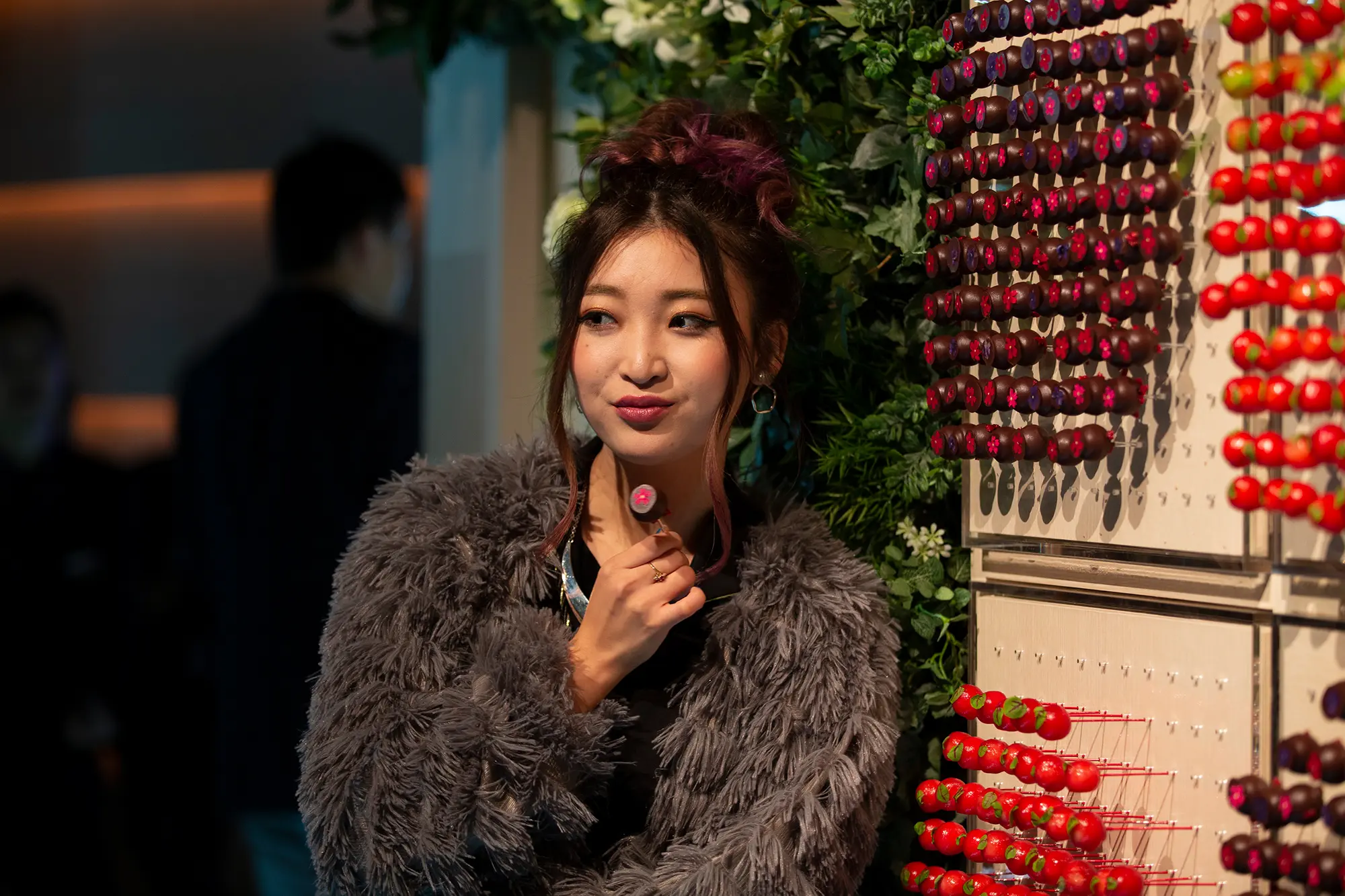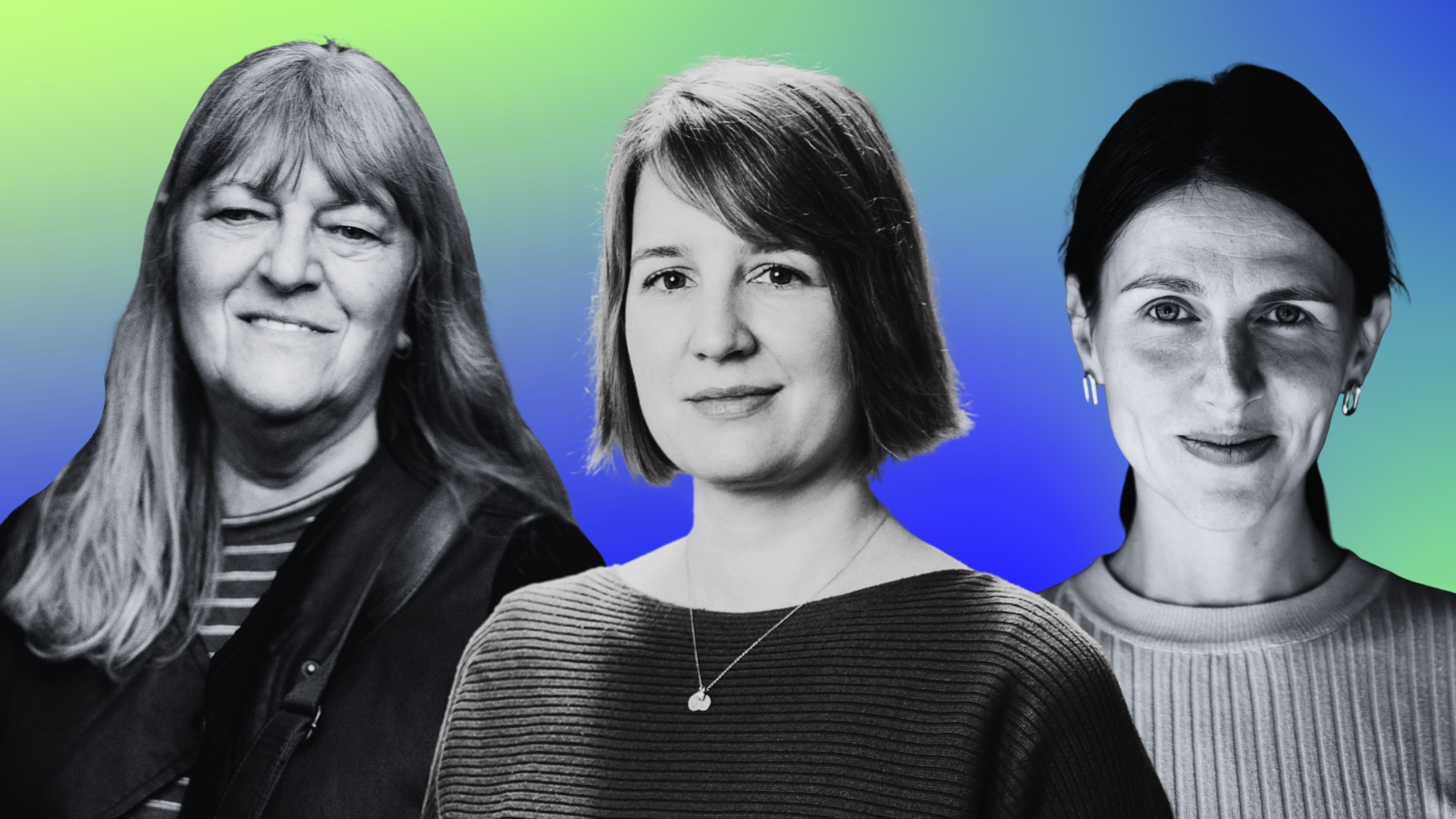

By Judith Hoch
Honestly, we should probably ask her directly. But from our many chats over the years, three things stand out. First, variety: every BRS project is brand-new terrain. One week, we’re decoding Spanish withholding-tax rules, and the next, we’re tackling Swiss invoicing rules. That constant puzzle-solving keeps her curious. Second, creative energy: Even though she’s a numbers person, she loves being surrounded by highly creative work. And third, the team, she sits at the heart of a crew that spans ages 22 to 73 and half a dozen nationalities. That mix lights her up.
In two words: depth and calm. She’s done fashion, travel, theatre, no compliance riddle scares her. In the early days, that breadth was priceless; it still is today. Whenever a “mission-critical” topic threatens to derail a deadline, Liane’s love of numbers settles the room. Her ability to view a problem through several industry lenses is now baked into our culture: we invite and challenge critical viewpoints from our teams. There’s always a solution to a problem, and there’s a way forward to create and produce a new concept. That diversity of thought keeps us flexible in each department and project.
Liane jokes, “Why leave if the ride’s still fun?” It tells me two things: she still finds purpose here, and we’ve managed to keep the process as enjoyable as the outcome. That’s the best compliment founders can receive.
Johanna brings a rare mix of production insight and funding know-how, shaped by her work across theatre and the independent arts. Her background supports our team where creative planning meets operational detail, a valuable asset, even in a smaller role today.
Liane anchors the ship; Johanna adds more sails. Liane’s institutional memory provides stability, while Johanna’s fresh, cross-disciplinary eye helps refine accounting and controlling with our project leads. Together, the extended team of accounting, finance, and project leads give every production a 360-degree financial view, from concept through to final invoice.
Find the right people to run with early. The systems, processes, and mindset you set up in year one becomes your cultural bedrock. Choose teammates whose ethics and curiosity align with yours; they’ll shape not just your balance sheet but your client experience. That alignment is still paying dividends for us 13 years later.
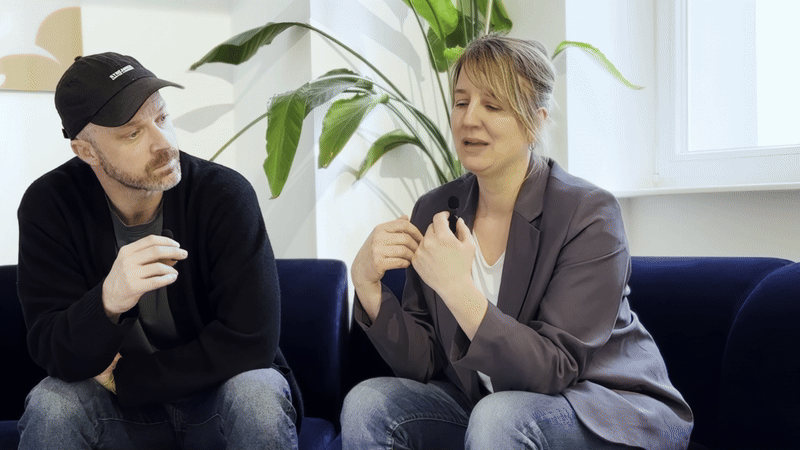

By Judith Hoch and Brendan Shelper
JH: A year ago, we believed our leadership role was to provide clear direction and ensure the team had a structured path forward. We now realise that the most effective leadership often comes from creating space for positive impulses.
BS: Some of our biggest breakthroughs have come from situations where we didn’t have the full picture or a clear plan, just the right people, mindset, and confidence to navigate the unknown together. Leadership isn’t about certainty but enabling your team to thrive in ambiguity.
For example, we’ve invested in our digital storytelling, motion design, deck design services, and architecture and spatial design teams. We’ve also added Account Management for some core clients and new creative team members, all to deliver better end-to-end offerings for our clients.
This was as much due to demand as our preparation for the unknown, so we felt quite safe making those additions to the organisation.
BS: The hardest decisions are always the ones that impact our team directly. With rising costs and market volatility, we had to re-evaluate how we structure our projects, whether to scale up, lean down, or pivot. The toughest call was delaying a major expansion into a new market. It wasn’t easy because we had momentum, but after analysing the risks and our already full calendar for 2025, we realised that a strategic pause would allow us to build more resilience. It was a difficult but necessary decision that ultimately positioned us for smarter long-term growth.
BS: We’ve taken our fair share of calculated risks, but one that stands out was a major pitch for a global project we did in 2022. We decided to throw out the standard approach completely. We went in on a full event design with a new visualisation software, a radically difficult venue that was heritage protected, etc. We knew it was bold, but we agreed it was worth a chance. Not only did we win the project, but it also set a new benchmark for how we innovate at BRS.
JH: We’re making continuous leadership decisions in tandem, sometimes split; other times, we finish each other’s sentences. I’m happy to say we have rarely made big decisions we regretted or that backfired; most of our risks are calculated, and most of the time, they pay off substantially.
The lesson is that fear is the biggest blocker for most unsung successes. If you don’t have someone to share that fear with you, I can understand how many would never jump into the murky swamp water. Together, you only need to carry 50% of that fear, making the journey so much lighter. Of course, once you’re in the midst of the process, you realise it was never as bad as you thought.
BS: When it comes to AI and automation, we actively experiment with new tools while keeping a human-first approach. We’ve divided responsibilities in a way that allows us to test new technologies quickly without losing the essence of what makes our work unique. It’s a constant process of pushing forward while maintaining creative integrity.
At the speed of things, you have to look at new tools and adjust on a monthly/weekly basis. This also demands that the whole team follow trends and opportunities, so we have regular touchpoints on AI.
JH: Investing further in our mid-level management teams. We used to rely heavily on other partner production companies to help us realise more demanding events, which we still do, but most of what we do now is in-house: architecture, spatial design, content management, etc.
It felt like a big shift at the time, but now I wish we’d done it two years earlier. It’s changed how we invent, design, and execute ideas for our clients who want something more unique than an agency structure.
JH: We’ve stopped trying to replicate the in-office experience remotely. Instead, we’ve built our model around how people actually work best. That means structured in-person moments for high-energy collaboration and trust-based flexibility for remote work.
Something that is very important as a base for a company that works internationally, as we are often not in the same place or time zone.
We also put a lot of effort into keeping creativity alive across digital spaces, whether through virtual brainstorming, live creative sprints, or simply making space for spontaneous conversations that aren’t just about deadlines.
“Lead by example” is often misunderstood. Many think it means working the hardest or being the most visible, but real leadership isn’t about being in the spotlight but enabling others to thrive. The best leaders I know aren’t the loudest voices in the room; they’re the ones who create the conditions for their team to do their best work.
A year later, BRS continues to evolve, innovate, and challenge the traditional leadership playbook. Through strategic risks, a strong co-leadership approach, and a commitment to creativity, Judith and Brendan have built a model that embraces uncertainty and adapts in real time.
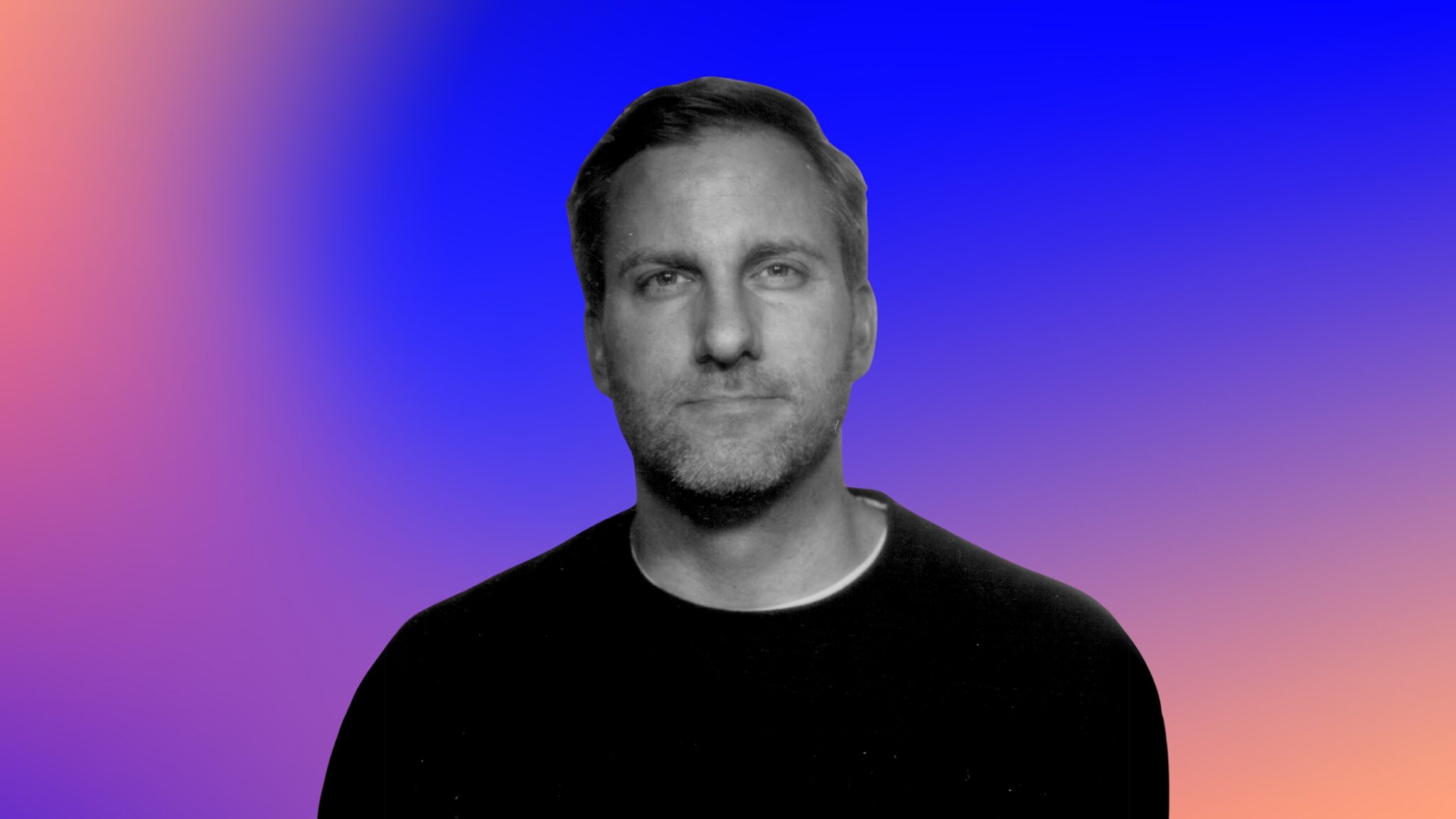

By Christian Müller
My career started in movie and content production, which gave me a solid foundation in the art of storytelling and managing large scale projects. I moved into client service where I learned to marry creative concepts with strategic execution, ensuring that every project aligns with business objectives. This laid the groundwork for my shift into business development, where I see the impact of strong storytelling in driving client engagement and long-term growth.
Over the years, I’ve had the privilege of working across industries, from technology, automotive and entertainment to lifestyle, which has shaped my approach to business development. I believe that great stories are the backbone of any brand, but it’s the ability to integrate emerging tech, data, and creative concepts that elevates storytelling into memorable, immersive experiences.
As the Director of Business Development/Digital Storytelling, I am focused on building a team and department that combines these elements to help brands connect with their audiences on a deeper, more impactful level through content that supports brand experiences, digital content production and experience marketing at scale.
I think my biggest strength is my ability to bridge creative vision with business impact, taking bold ideas and turning them into strategic, results-driven solutions. I thrive where storytelling meets strategy, ensuring that every project is not just creatively compelling but also aligned with clear business objectives.
Beyond that, I am deeply passionate about building and leading high performing teams. I believe that the best work happens when collaboration, creativity and clarity come together. Whether it is aligning interdisciplinary teams around a shared vision, guiding projects from concept to execution, or keeping stakeholders engaged, I focus on creating an environment where ideas can flourish while staying rooted in business goals.
This approach has allowed me to expand client relationships, foster trust, and drive long term growth. It is also what makes BRS so exciting: a place where creativity, strategy, and tech come together to shape the future of brand experiences in powerful, measurable ways through digital content production and agile, experience marketing.
What attracted me to BRS is its focus on creating emotional connections through experiential marketing. The idea that a brand’s story goes beyond just a logo or tagline and becomes a lasting experience is something I deeply believe in. Over the years, I have seen first-hand how powerful this approach can be in driving audience engagement and brand loyalty.
I see my role at BRS as an opportunity to elevate and expand its digital storytelling capabilities. With my background in business development, content creation, and emerging tech, I am excited to help the agency stay ahead of the curve by integrating new tools like AI, immersive media, and data-driven insights into our storytelling processes.
My focus will be on enhancing BRS’s ability to create cross-platform, seamless brand experiences that engage and inspire audiences. By combining creativity, technology, and strategy, we will continue to set trends and ensure our work is not only visually compelling but also delivers measurable results for our clients.
Clients are looking for more than just great campaigns. They want authenticity that fosters genuine emotional connections. They need agencies to be innovative and agile, delivering experiences that engage, interact, and create lasting memories.
They are looking for a partner who can quickly adapt to changing market dynamics, integrate new technologies and deliver creative solutions that are strategically sound and highly adaptable.
In addition, there’s a strong focus on measurable outcomes. Clients no longer want vague metrics. They need agencies that can connect the dots between creativity/concept and results. BRS is well-positioned to meet these shifts, with its unique ability to combine sharp creativity, data and strategic insight to help brands stay relevant and thrive through experience marketing, digital content production and insight-led brand experiences.
Digital storytelling is a powerful driver of ROI, creating immersive, emotionally resonant experiences that foster deeper customer connections. By leveraging AI for e.g. content personalisation and motion design and video for heightened emotional impact, we can boost engagement while optimising resources.
At BRS, we are already integrating digital in-event tools to enhance consumer engagement in real time, and we’re actively expanding this further. Our next steps include developing ROI measurement tools to quantify event impact, helping brands gain clearer insights into their audience interactions and campaign effectiveness.
BRS’ multidisciplinary approach is what makes this possible. By blending creative expertise, technology, and strategy, we craft seamless brand experiences across multiple touch points. This ensures our content is not just engaging, but also measurable, scalable, and strategically aligned with client goals. With a focus on innovation and efficiency, we maximise both impact and long-term value.


By Catalina Figliolia
The most rewarding part of this work is knowing you’re shaping moments that leave a lasting impact. It goes beyond how a space looks to how it makes you feel. When an experience resonates emotionally, it becomes a memory, something that lingers and even shapes perception.
The most powerful ones make you pause, give you chills, or stir something unspoken inside. Seeing those reactions, knowing a space has truly connected with someone, perhaps even become part of their story, is what drives me to keep going.
For me, balance comes from treating storytelling and functionality as equals. A strong narrative is the heart of any experience, but design ensures people can fully engage with it. The two should work together, not compete.
I always start by defining the core message, what do I want people to take away from there? every design decision reinforces that story while ensuring accessibility, flow, and engagement. When storytelling and design align, the experience feels natural and intuitive.
My creative process always begins the same way, with a vision and key questions that define the challenge. The core goal stays the same; what shifts is how the experience is shaped.
For large activations, the focus is on broad impact, engaging many people at once through high-energy interactions and a dynamic flow. Smaller, more intimate spaces, on the other hand, allow for deeper, detail-driven experiences. It’s about understanding how scale influences interaction and then adapting the design accordingly.
Living and working in different environments has sharpened my adaptability and broadened how I approach design and life. Every place and person brings a unique perspective, teaching me to question, listen, and embrace different ways of thinking.
I often find myself moving beyond simply looking for solutions to rethinking the questions themselves. Working in diverse settings feels like an ongoing mental exercise, constantly challenging how I interpret and shape ideas.
First, trust what you believe, stay focused on your dreams, work hard, and don’t be afraid to make bold decisions, even when they feel uncertain. My journey has shown me that carving out your path takes resilience, adaptability, and a willingness to take risks. Every challenge is a chance to learn and refine your craft, but above all, stay true to the passion that drives you!
Nothing more than: Go for it! And do it with passion, dedication, and curiosity.
My experience has helped me blend creative vision with practical solutions, designing engaging and achievable spaces while truly understanding needs.
With a foundation in formal architecture, I’ve developed a natural way of thinking through challenges and finding solutions. At the same time, my artistic background has shaped my perception of space, allowing me to bring fluidity and emotion into my approach. That side of me adds depth and soul to every project I take on.
Combining this with my enthusiasm and team-oriented mindset, I’m excited to share my perspective with the BRS team, collaborating to create experiences that genuinely connect with people and open new ways of seeing.
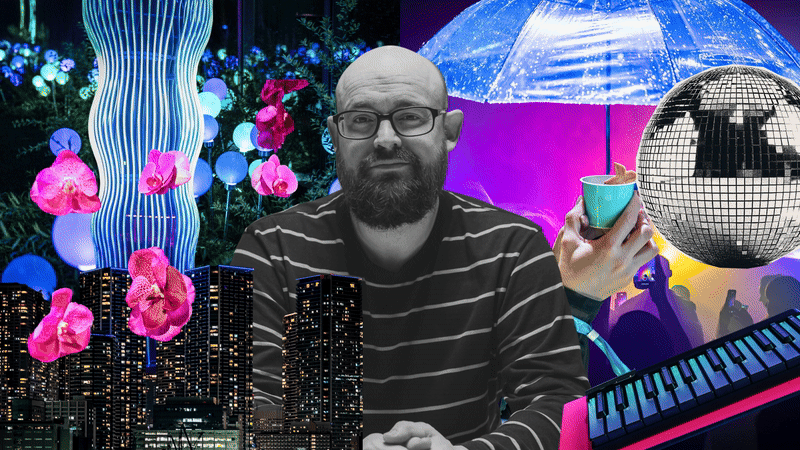

By Jonathan Buckles
When we began planning our major immersive experience in Tokyo, we knew it would be a complex, ambitious project. What we didn’t realise was just how many curveballs would come flying at us along the way. Now that the dust (and the artificial rainbow mist) has settled, I thought it was worth reflecting on three of the biggest challenges we faced during the project.
First on the list is cultural adaptation. One of our main activations, a beautifully intricate immersive event, took significantly longer to set up than expected. Now, we’ve worked internationally plenty of times, but Tokyo introduced us to a whole new dynamic: nobody ever says no. Not outright, anyway.
Our Japanese counterparts were unfailingly polite, accommodating, and dedicated. But the way they communicated was different from what we were used to. If you asked, “Can this be done by tomorrow?” the answer would always be “Yes,” but with no mention of how or when it might happen. It turns out specific timelines are not always part of the equation. So while we fretted over delays, wondering if we’d misstepped or pushed too hard, the head of their tech team was quietly putting in 16-hour days to make it happen.
It gave us pangs of guilt watching their relentless work ethic. We’d circle back for updates, subtly hoping they might admit they needed more time or resources, but the response was always the same: “It will be done.” And then, on the morning of the event, there it was, like magic. They had worked through the night, solving every issue, and delivered flawlessly. It was equal parts inspiring and humbling, and it taught us a valuable lesson: sometimes you have to trust in the process, even if it’s entirely different from your own.
The second challenge was one of our most ambitious creations: a multi-sensory room designed to blend lasers, projection mapping, light, scent, and a bilingual narrative. Guests were led by immersive performers through a communal drinking ritual that culminated in an artificial storm, which then plunged the room into a walkable, tastable rainbow. Sounds simple, right?
Of course not. It was as complex as it sounds, and it seemed as though the tech gods were determined to test us at every step. It was never going to be a straightforward setup, but it spiraled into a marathon of technical issues, magnified by miscommunications in the translations of roles, what an operator is versus a designer versus a programmer for the tech. In Japan, these roles are more distinct and fragmented, with little overlap, meaning that even with the help of our translators, it was a challenge to get everyone in the room at the same time to troubleshoot the system as a whole.
Lasers weren’t aligning properly, the ever-changing humidity from an unseasonably warm Tokyo made the scent emitters and haze machines react differently with each run, and every pass seemed to reveal a new wrinkle to be ironed out. In short, I spent most of the lead-up locked away in the room, running tests, tweaking settings, and mumbling increasingly desperate prayers to the gods of tech which were finally answered with a resounding “yes”!
And due to all this, the event itself didn’t offer much reprieve, either. Instead of checking in intermittently from a calm, strategic distance as planned, I spent the entire event shoulder-to-shoulder with the audience, troubleshooting on the fly, constantly tweaking the scent levels, adjusting the fans, and rebalancing the multiple haze and fog curtains.
The silver lining? I had the rare opportunity to experience the room as the guests did, round after round. This proximity gave us the chance to refine the fantastic immersive actors’ performances and dynamically adjust the interactions with each group. By the end, the communal “Kanpais” over bespoke-flavoured shots, as each new rainbow wave swept through, making all the effort feel worth it. Watching the guests’ delight unfold in real time was the ultimate reward.
And finally, we come to the classic event production challenge: the last-second client pivot. With literally hours to go, and the beast that was the multi-sensory rainbow room finally under control, the client’s legal team swooped in with a bombshell. This key event feature needed to be renamed and updated or worse, canceled entirely. Their decision was final, leaving us with no choice but to act. And so, Rainbow was dead. Long live the Cloud!
Now, this kind of last-minute curveball could have caused a full-blown meltdown. But one of the benefits of working with a long-time client is that you develop an unspoken understanding of how these things go. No matter how much you plan or how many approvals you’ve collected, there’s always something lurking at the 11th hour. And when it arrives, you can either laugh or cry. We chose the former.
With a mix of good humour and stoicism, we scrambled to make it work. The new name was agreed on, ticking the legal boxes. We quickly recut the recorded audio, rewrote and re-rehearsed the performers’ live scripts, updated the projected visuals, and even managed to tweak the event’s digital map with the new title. It was a whirlwind few hours, but by the time the doors opened, the audience had no idea anything had changed. It’s the kind of moment that reminds you why having a flexible, quick-thinking team is just as important as a great concept.
Looking back, what’s clear is that every one of these challenges, as frustrating as they were in the moment, became an opportunity to learn, adapt, and grow. Whether it was navigating cultural communication styles, wrestling with cutting-edge technology, or pivoting at the last second for a client, the goal remained the same: to deliver an unforgettable experience for our audience.
At the heart of it all was a team of incredibly talented, dedicated people from the local crew in Tokyo to the immersive performers, tech specialists, and client partners. Together, we turned chaos into something extraordinary. And if there’s one thing I’ve learned from this project, it’s that flexibility isn’t just a skill in event production, it’s a superpower.
So, here’s to the challenges, the chaos, and the magic that happens when it all comes together. And if you’re ever in the middle of a multi-sensory tech meltdown, just remember: even the most impossible clouds are worth chasing.


By Judith Hoch
After an intense and rewarding 2024, the team took a well-deserved two-week break over Christmas and New Year. This pause allowed everyone to recharge and return with renewed energy for what lies ahead. Kicking off 2025 on this refreshed note has set a positive tone for tackling the exciting and ambitious goal we’ve set for the year.
One of the most exciting developments for us in 2025 is our team’s growth. Following the addition of four exceptional colleagues who joined us in late 2024, we’re now welcoming four more talented professionals at the start of this year. It’s inspiring to see such experienced professionals eager to join our journey. Of course, this expansion comes with challenges, particularly in ensuring workflows, processes, and remote work setups scale seamlessly alongside the team.
We’re also navigating tighter office space, which is a testament to our growth while continually looking for ways to optimise how we work. A standout in this process has been my colleague Susana, who has made onboarding new team members into an art form. She’s honed this process so effectively that feedback from our newcomers is consistently glowing. With senior talents joining, it’s critical to equip them quickly so they can take ownership of their roles and projects early on. Ensuring a smooth transition is key to maintaining our creative strategy and workflow efficiency.
If there’s one major takeaway from 2024, it’s this: success hinges on having the right team in place. Understaffing projects or trying to make do with too few people leads to unnecessary strain. Thinking beyond individual projects and planning long-term for both goals and resources has proven essential. These lessons have shaped our strategy for 2025, and we’re building a strong foundation for sustainable growth.
Maintaining balance is critical, especially in our fast-paced industry. We’ve implemented flexible work schedules to accommodate part-time, remote work, and individual working hours. After intense on-site periods, we encourage team members to take time off to recharge instead of diving straight into the next project.
We’ve also fostered an environment of open communication through regular cross-team meetings and department check-ins. These moments ensure the team has space to voice their workload and discuss where support might be needed. Our focus is always on ensuring that the team feels supported, heard, and able to thrive rather than just getting through peak periods We all want to also enjoy the process and not just the final event day.
I’ve found that starting the day with intention and keeping it screen-free has been incredibly grounding. My mornings focus on the usual logistics, breakfast, getting the kids to school, and my commute, but I avoid checking my phone during this time. In fact, I now leave my phone in a different room overnight to keep me from seeing emails and messages before i’ve had a chance to fully transition from rest. Instead, I use the commute to listen to a podcast or some relaxing music, which helps ease me into the day. A small but mindful change I’ve made is saving my first coffee for the office and starting the morning with green tea at home. This simple shift has added a layer of calm to my routine and has been surprisingly effective in setting a soft, intentional tone for the day.
Evenings are when I take time to reflect and wind down. I resist the urge to stay online, choosing instead to unplug, often by reading a good book or catching up on the news. It’s a moment to consider how the day went, what went well, what was challenging and to find some clarity before fully stepping away from work mode. These intentional offline moments, whether in the morning or evening, have been invaluable in maintaining focus, reducing mental fatigue, and staying balanced through busy periods.


By Roxanne Myburgh
I have been in touch with BRS for almost two years, regrettably turning down an opportunity because I was based in Frankfurt and not ready to relocate. But the impressive portfolio of high-profile clients and the groundbreaking events highlighted on the website stayed with me. Now, the time feels right to join the team, bring my expertise to the table, and help BRS make the impactful mark on the industry that it strives for!
I bring a wealth of technical, construction, and production expertise that I’m eager to contribute to the company. With over ten years of experience in booth building and contracting across the GCC region, I’ve had the opportunity to work on complex, high-profile projects that many would consider challenging to execute. I can lend this knowledge to the creative team to collaborate and ensure that innovative concepts are not only inspiring but also feasible in terms of design and execution.
One of my proudest achievements is successfully managing projects that, on the surface, may seem straightforward but actually require extensive groundwork, coordination, and meticulous planning to ensure flawless execution. I take great pride in my ability to blend strong organisational and communication skills with technical expertise. This combination allows me to fully understand a client’s vision and transform it into reality, all while staying within budget and ensuring the highest standards of quality.
Balancing big-picture strategy with on-the-ground execution requires clear communication, effective delegation, and a deep understanding of both the project’s goals and practical realities. I ensure the overall vision aligns with the client’s objectives and key performance indicators. During execution, I focus on managing every detail, overseeing logistics, and troubleshooting issues as they arise. I empower the team with the resources and support they need while keeping the strategic goals front and center. The result is a seamless balance between strategy and execution, ensuring the project’s success.
Building strong relationships starts with clear, transparent communication, ensuring that everyone’s vision and expectations are aligned from the outset. I make it a priority to listen actively, respect each team’s expertise, and foster a collaborative, problem-solving environment. By maintaining regular check-ins, offering support, and being responsive, I ensure that creative, technical, and client teams feel valued and engaged throughout the entire process.
One key lesson I’ve learned is the importance of thorough pre-event planning and risk assessment. Understanding the unique challenges of each location helps mitigate potential issues and ensures smooth execution. Flexibility and adaptability are crucial, as unexpected challenges are inevitable, and the ability to pivot quickly is essential for success.
To maintain calm, clear communication and focus on solutions, not problems. I believe in empowering team members by delegating tasks based on their strengths, which fosters trust and keeps everyone motivated. Staying adaptable and ensuring regular check-ins allows us to address any challenges quickly, ensuring we stay on track even during fast-paced productions. By staying hands-on and approachable, I can make quick adjustments when needed, ensuring we stay on track without losing sight of the larger vision.
I’m particularly inspired by the rise of immersive technologies, like AR and VR, which are transforming how audiences engage with events and brands in exciting new ways. The increasing focus on sustainability, from eco-friendly materials to carbon-neutral practices, is also a trend that aligns with my values and is becoming a major priority in event planning. Additionally, the use of data analytics to personalise attendee experiences and optimise event outcomes is an innovation that I’m excited to explore further at BRS.
I wish someone had emphasised the importance of proactive communication from day one. In production management, anticipating challenges and keeping all teams informed can prevent many problems before they arise. It’s also crucial to stay flexible, as unexpected situations are inevitable, and a calm, solution-oriented approach can make all the difference.
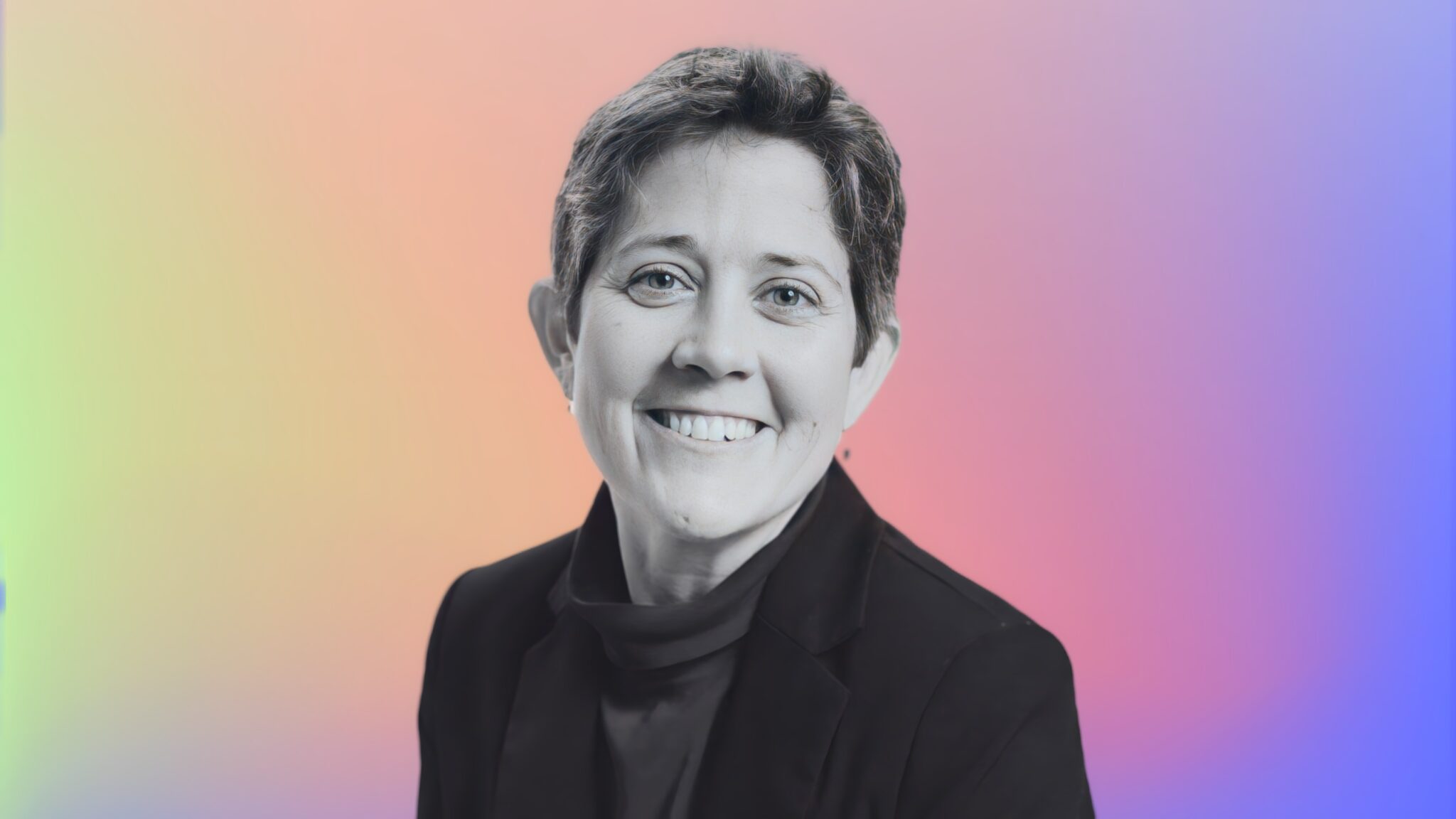

by Ky Lloyd
Our latest project in Tokyo was one of those rare, career-defining experiences that leaves you with more than just stories, it leaves you with lessons that stick. It pushed me to step out of my comfort zone, adapt to new challenges, and grow in ways I hadn’t expected. These reflections aren’t a blueprint, but a glimpse into what I took away from managing a large-scale production. Here are three key lessons I’ll carry moving forward.
Cultural differences can shape a multinational team in unexpected ways. In Japan, for example, communication often revolved around group discussions rather than individual instructions. This meant rethinking how meetings ran or how tasks were received and executed. I learned the value of patience and listening, especially when team decisions required consensus rather than a top-down approach. It took longer, but the results felt more thorough.
What I found most inspiring was the team loyalty. The mindset of “no one is done until the last one is done” created a shared sense of responsibility that was motivating and humbling to witness. It reminded me that cultural differences aren’t just challenges but opportunities to grow.
Large-scale projects like this can test a team’s ability to stay connected and aligned. Onboarding new team members mid-project, juggling shifting timelines, and integrating different working styles wasn’t easy. I realised just how important centralised project lead communication is and how messy things get when it’s missing.
What stood out, though, was how adaptable our team was under pressure. They pulled together, found solutions, and kept things moving. It reinforced that even when things aren’t perfect, the right mix of flexibility and teamwork can get you across the finish line. It also reminds me again of the special collaborative and dedicated nature of the people working in our business. This is not to be taken for granted and deserves another shout-out to the amazing people we worked with.
One of the most unique aspects of this project was managing immersive elements. These weren’t just nice-to-have features; they were entire experiences that needed careful planning, their own workflows, and a lot of technical focus. Looking back, I think we need to give dedicated focus to tight teams to handle the design, production, and execution of these areas.
Immersive experiences are enriching and now a standard for our productions, but they come with their challenges. I learned that giving these elements the respect and resources they deserve is key to making them shine.
Producing in Tokyo taught me lessons I never anticipated. It reinforced that cultural adaptability, clear communication, and a deep respect for the complexity of immersive experiences aren’t just tasks to check off, they’re the foundation of a truly successful production. If you’ve tackled a large-scale project like this, I’d love to hear your insights. What challenged you? What surprised you? Let’s keep the conversation going and continue learning from one another.
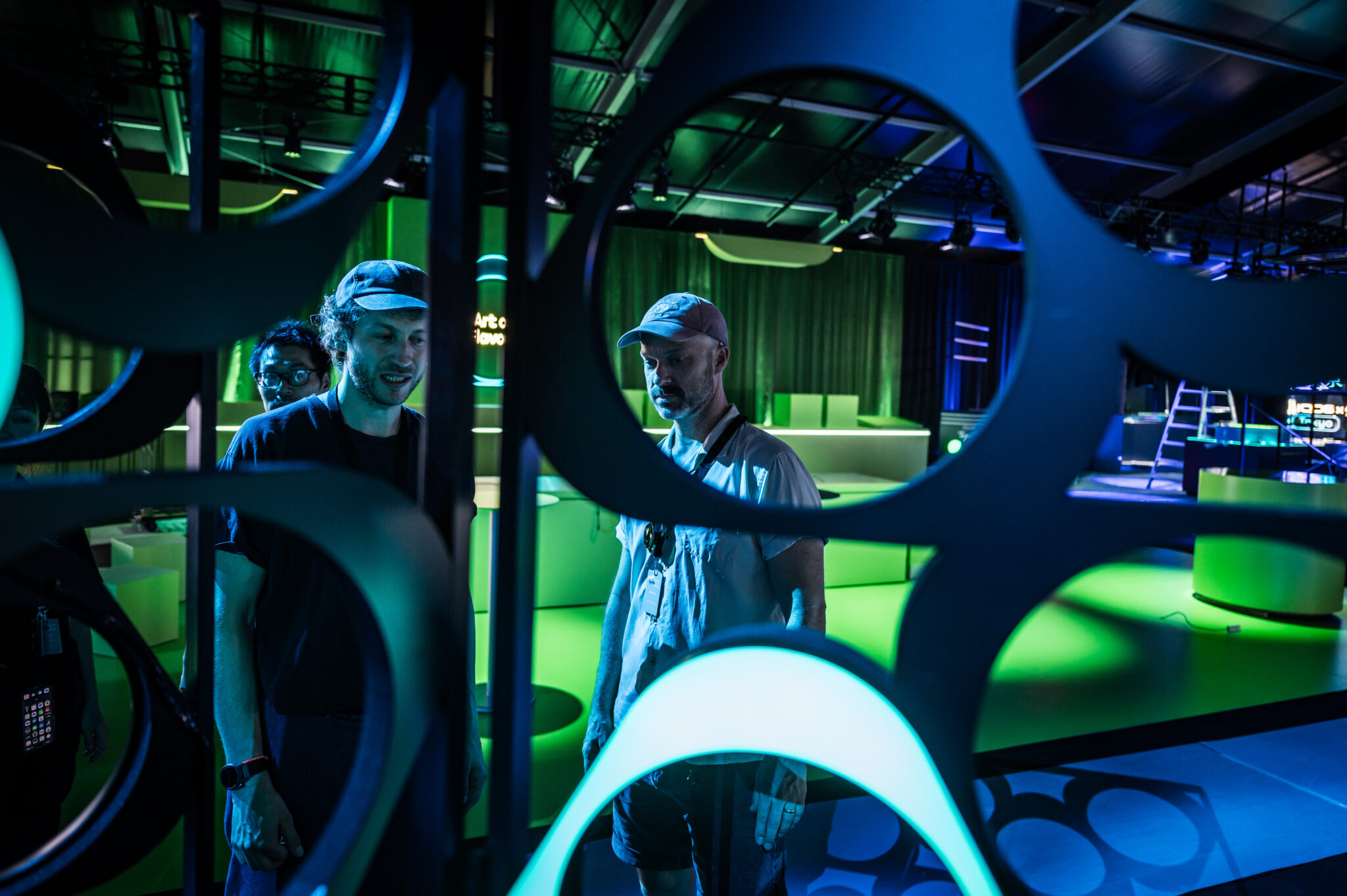


By Chrissie Overton
So much! It feels like stepping into a world where creativity knows no limits. In one of my very first creative meetings, I found myself thinking, “Wait… we can actually do that?” and that sense of possibility hasn’t stopped. Collaborating with a team that doesn’t just create events, but crafts experiences is endlessly exciting; it feels like there’s always another boundary to push.
This global account brings its unique mix of complexity and precision. It’s about being strategic and dynamic, balancing big ideas with sharp execution, and that’s my happy place.
For clients, it’s about delivering on trust, ensuring their visions feel tangible, and elevating their ideas without overwhelming them. For creatives, it’s about championing their brilliance while giving them the structure to land the ideas. And for the production team, it’s recognising that they’re the ones who take all those bold ideas and make them a reality, often with an attention to detail that’s borderline wizardry.
I sometimes imagine it as hosting a dinner party with the most eclectic guest list: clients, creatives, and production, each with their rhythm. Conversations flow, ideas warm up, and the production team is the powerhouse in the kitchen, making sure everything arrives on the table perfectly. My approach is to be the perfect host: listening, mediating, and sometimes topping up the metaphorical wine glass. Clients need to feel heard, creatives need space to dream big, and I am there making sure every voice finds its moment.
Even with the most gorgeously structured run of show, the unexpected will happen and that’s where the magic lives. Events like Tech Open Air are a dance between meticulous preparation and staying light on your feet.
The insight is still that planning is non-negotiable, but flexibility is your superpower. Also, there’s no overestimating the value of having a spare extension cord and two fully charged battery packs on your person at all times.
It’s about ensuring everyone is working towards the same bold and brilliant outcome. Clients often come up with bold ideas that can be ambitious and abstract, and creatives bring the kind of concepts that take those ideas to another level. My role is to make sure these perspectives come together seamlessly to make the perfect client experience where we elevate the vision rather than diluting it.
Asking the right questions to define clear objectives and turning phrases like “this needs more oomph” into tangible direction has always worked well for me. From there, it’s about fostering collaboration where clients trust the process and creatives have the freedom to push boundaries. The goal is always to deliver something extraordinary.
Immersive events are the closest thing we have to modern-day magic tricks, they pull people into a story and leave them wondering how it all happened. What excites me most is the power of personalisation, making an experience so tailored that even in a crowd, you feel like it was designed just for you.
And of course, new technology. When it’s subtle and smart, it’s the extra layer of stardust that makes everything shine without shouting for attention. The sweet spot is where innovation enhances the story rather than stealing the spotlight, creating moments that people don’t just see but feeeeel. That’s the kind of storytelling I want to be part of.
Empathy, agility, and clarity.
Empathy, because at the heart of it, is all about people – listening, understanding, and knowing when to step in or step back. Agility, because plans change, and you’ve got to flex with them, preferably with grace. Clarity, because confusion is the enemy of creativity, and a clear path always leads to better ideas.
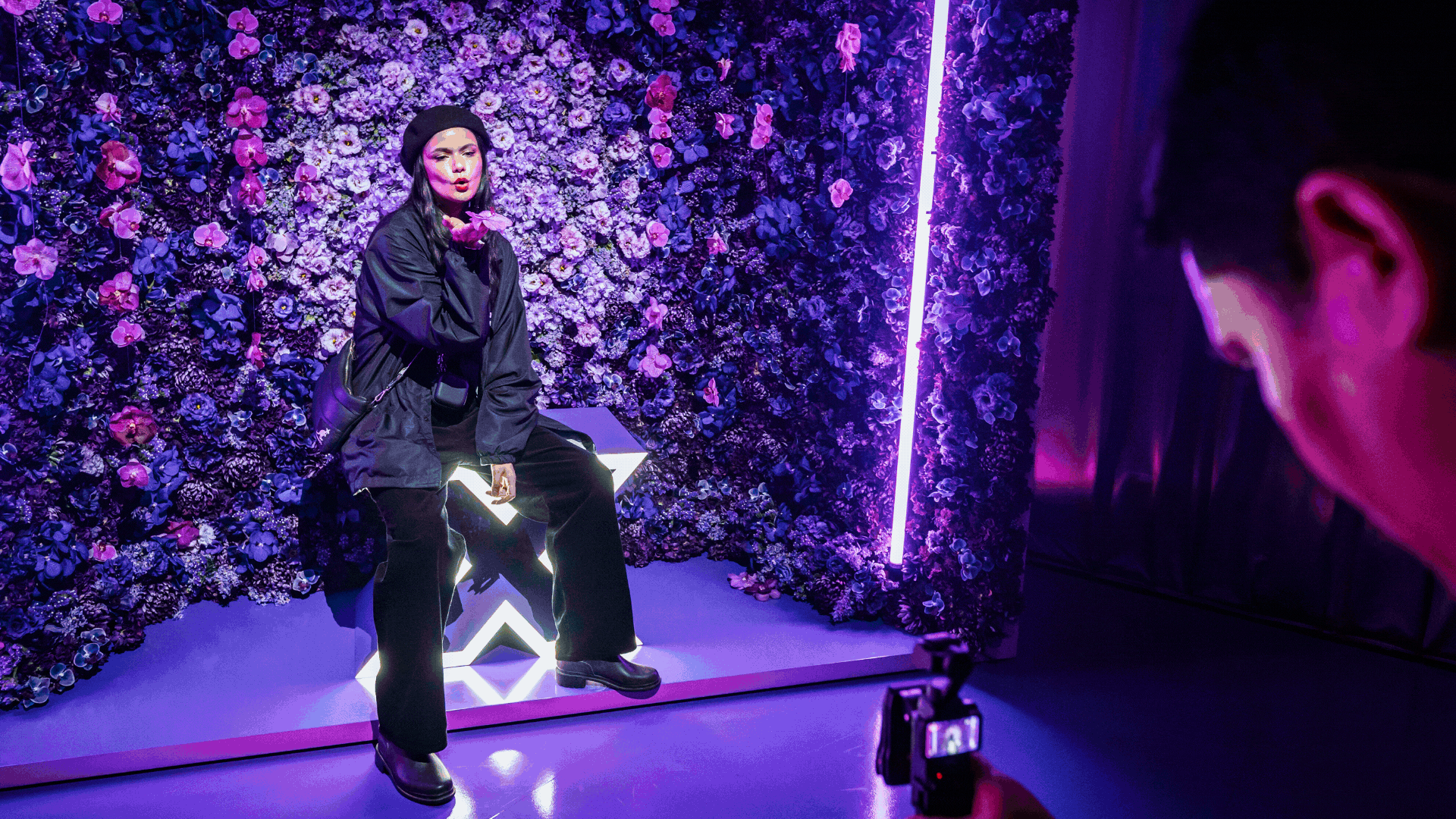

By Brendan Shelper
We’ve been championing this approach for years, and with the explosion of experience-based entertainment, it’s now mainstream. From immersive theatre to experiential dining, this movement has reshaped expectations. Still, there’s plenty for events, especially corporate events, to learn. Attendees crave connection and interaction, not just passive observation. Whether it’s hands-on product activations or fully immersive brand worlds, the challenge is to build meaningful touchpoints that linger long after the event ends.
When it comes to corporate events, sustainability and wellness are no longer optional, they’re expected. From eco-friendly materials to moments of calm and reconnection, this shift isn’t just about doing good but feeling good. At BRS we’re taking control of newly available tools which allow us to calculate carbon footprint of any given event and find suppliers who are on track for carbon conscious services.
But wellness is also moving into the spotlight as a standalone experience. Ticketed wellness events that merge entertainment with unique offerings, think immersive sound baths, theatrical fitness sessions, or meditation art experiences are set to soar. The reward isn’t just the entertainment; it’s leaving feeling better than when you arrived. In 2025, feeling good becomes the ultimate luxury.
This isn’t just about generative AI anymore; it’s about AI agents taking the reins. From streamlining event logistics, think seamless sign-ups, intuitive check-ins, and tailored itineraries, to revolutionising immersive storytelling and personalisation, AI agents are going to be transformative. Imagine your event concierge is an AI seamlessly collaborating with other AI systems to deliver a bespoke journey for each guest.
And it’s not just for attendees, organisers will feel the benefits too. This is a pinnacle moment for all industries, where AI agents are talking to AI agents, unlocking unprecedented efficiency and creativity. We actually explored this topic a year ago in the video in the link ‘Know your Agent’, and now, it’s quickly becoming reality.
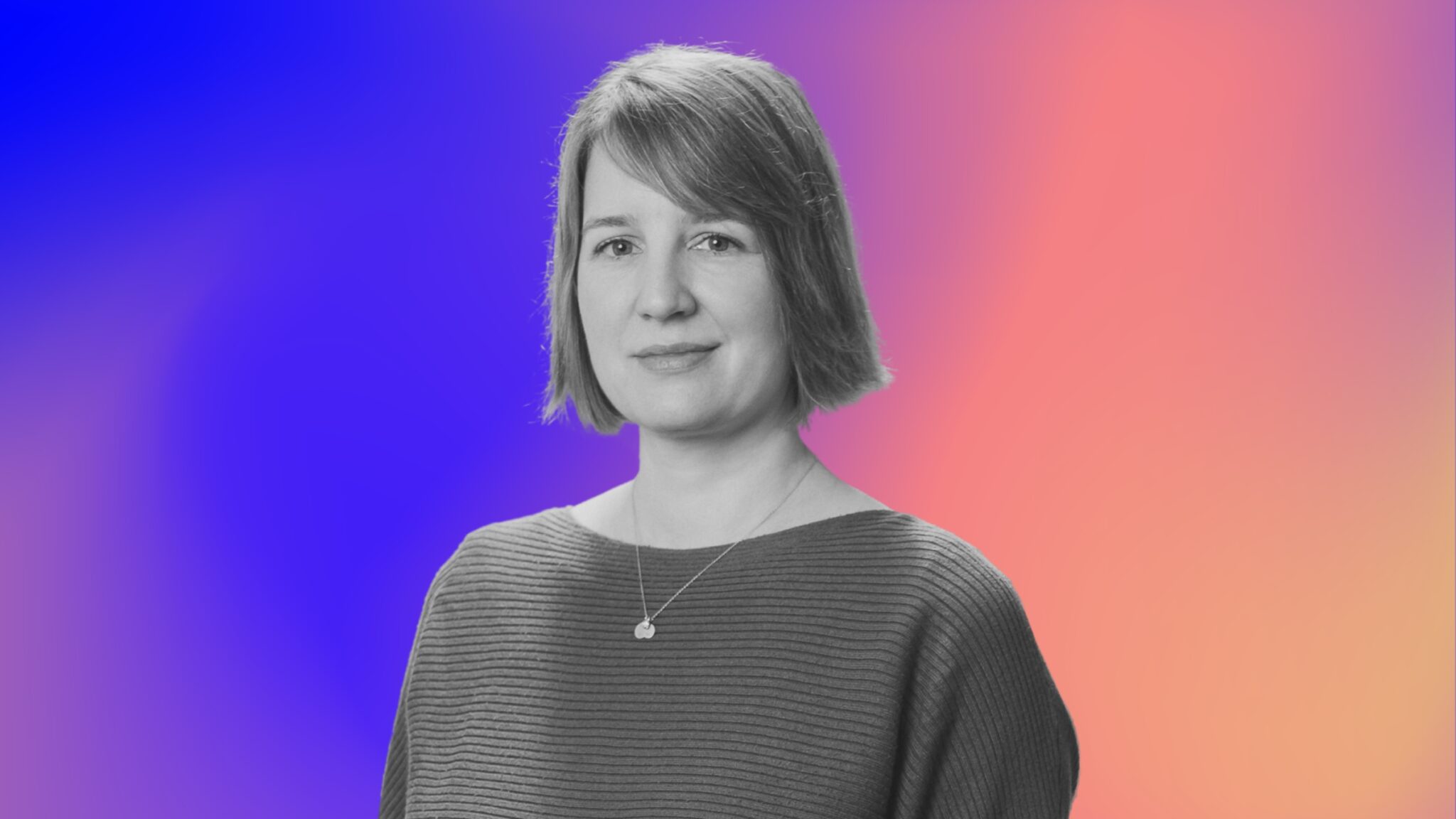

by Judith Hoch
Let’s be honest, how many 14-year-olds really know 100% what they want to do when they finish school? Early work experiences, even if completely unrelated to your future profession, teach valuable skills on so many levels.
To begin, these jobs often teach us things we don’t learn in school, like understanding and following a process. Most student jobs are simple enough tasks with clear steps and manual work, but they require precision. The goal is to learn and follow the process without making mistakes.
One of my first jobs was at a bakery. It didn’t take long for me to learn how to set up the sales counter, operate the cash register, and bake bread. But figuring out how to do it quicker each week (I worked Sunday shifts for years) is what made it interesting. The faster we completed setup, the sooner we could “chill” and wait for customers.
Working with a diverse customer base was another invaluable experience. And problem-solving? That came in spades. What do you do when the cash register breaks? Or when there’s a big order, but you’ve run out of stock? Or when your colleague, who stayed out too late the night before, oversleeps and has the keys while you’re stuck with a line of customers outside?
At 16, there was no senior manager to step in and help, this bakery had outsourced the Sunday shift to three pupils of similar ages. I had to take responsibility and figure things out on my own. It was a crash course in accountability and creative problem-solving, lessons that have stayed with me ever since.
Working, traveling, or even studying abroad is an incredible experience if you have the chance to do it. I was lucky enough to do all three during my formative years and early career. As you said, it’s all about stepping out of your comfort zone: not knowing your way around, struggling to express yourself at first because you’re not speaking your native language, and taking responsibility of your own life and managing things on your own.
But for me, the biggest takeaway was being exposed to new cultures and perspectives. It’s one thing to know that people approach problems in their own way, but it’s another to experience that firsthand. When you stay within your home culture, you tend to see more similarities in how things are done. Working and studying abroad taught me to truly value other approaches and perspectives. It fostered adaptability and open-mindedness, qualities I carry into my work today.
The simplest answer? There are always different solutions to a problem.
At BRS, my team comes from all over the world. Each person brings their own “backpack” of experiences such as different cultures, companies, and projects. This diversity gives us unique insights and leads to more innovative solutions. It also provides a broader understanding of global markets.
For us, this diversity is the backbone of our creativity. It’s what allows us to deliver projects that are both comprehensive and culturally relevant, and it’s a major driver of our success.
As I said earlier, I see immense value in diverse perspectives. Knowing the capabilities of our extended team, I feel confident that we can always find a solution.
One thing I’ve learned is that I don’t need to be the smartest person in the room, I just need to know who is. Leadership, to me, is about empowering those people to step in, help, or take over the task. It’s about trusting your team and recognizing their unique strengths.
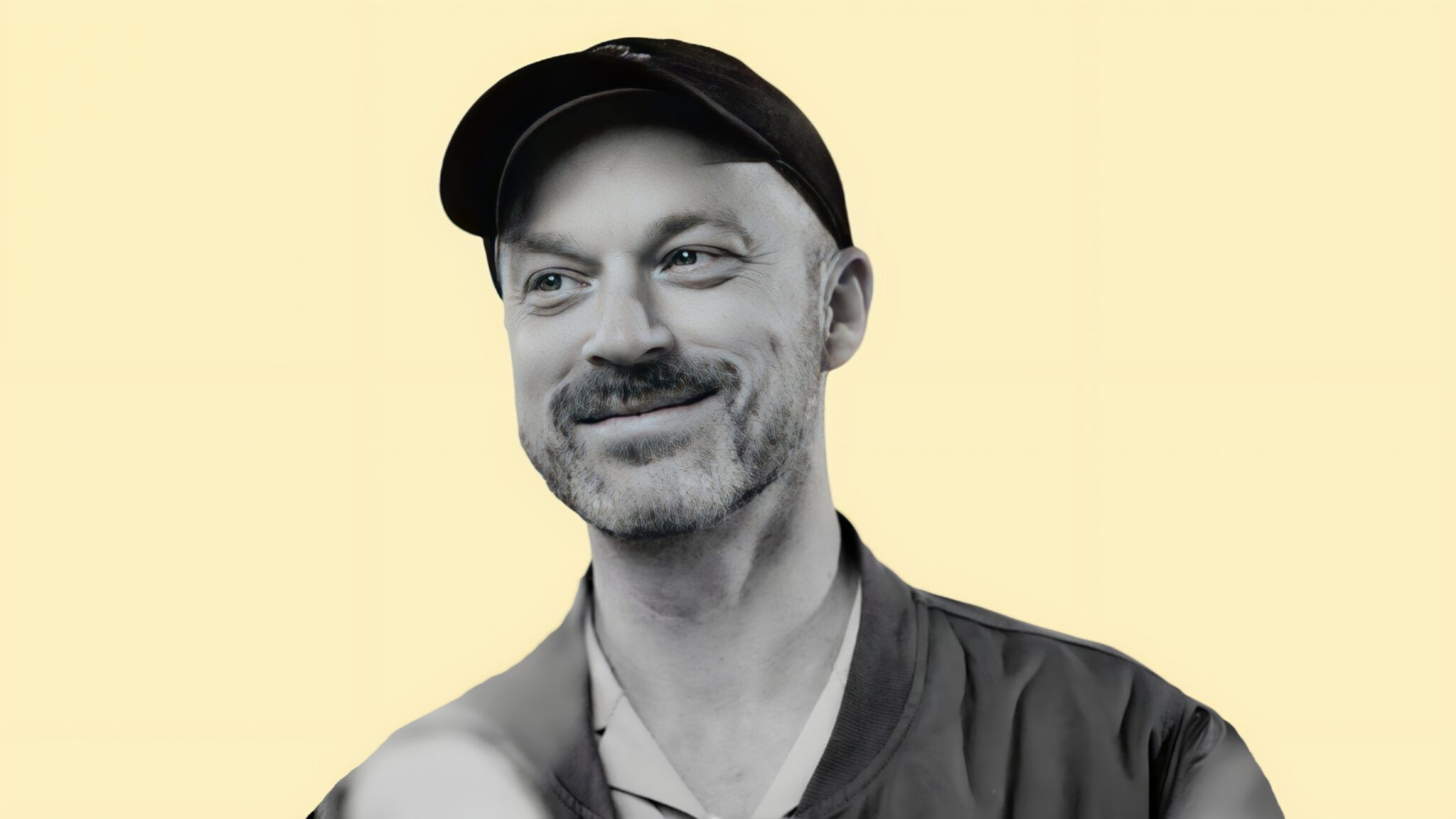

by Brendan Shelper
Do I remember the setlist or the intricate details of the show? No.
Do I remember the journey to get there, the thrill of sneaking past security? Absolutely.
Do I remember the energy of the crowd, the sweaty, electric atmosphere, and the stranger who handed me a joint as I found my spot near the stage? Oh, yes.
The act was the drawcard, but it wasn’t the experience.
This anecdote is a reminder of a profound truth: it’s not always the headline event, the grand spectacle, or the polished delivery that sticks with us. Often, it’s the smaller, unexpected moments, the surprises, the obstacles, the spontaneous sparks that become the most meaningful memories.
As we age, the world often feels increasingly familiar. The frequency of major discoveries diminishes, and with it, the effortless wonder we once experienced in our youth. New experiences and everyday marvels give way to routine and predictability, subtly dulling our curiosity and leaving us less open to the unexpected.
By introducing moments of surprise and delight, we can reignite that dormant spark and recapture the magic of new experiences. At Battle Royal Studios, our mission is to disrupt this cycle. Through meticulously crafted experiences, we offer individuals and brands the opportunity to rediscover the extraordinary, triggering emotions that transcend the ordinary and create lasting impressions.
Our brains are hardwired to spot patterns. We anticipate what comes next, often without realising it, and when things unfold exactly as expected, they fade into the background. This is why many Hollywood action films, despite their spectacle, fail to leave a lasting emotional impact. As The Psychology of Cinematography notes, “The overuse of predictable tropes and linear storytelling often dulls the viewer’s emotional response, as the mind disengages when the outcome is obvious.”
The same is true for experiences. When events follow a rigid, predictable structure, they fail to resonate deeply. A beautifully plated meal that arrives without context, a seamless path that offers no engagement, these might impress momentarily, but they rarely linger in the mind.
At their core, the memories that stay with us, the ones we revisit time and again are those tied to emotion. They’re the “soul or heart memories,” born from moments of surprise, wonder, and delight.
Consider the key memories that stay with us for a lifetime, those tied to deep emotions and past experiences. These “goosebump memories” are often triggered by sensory cues, intertwining to evoke the essence of early experiences from childhood or young adulthood, the joy of discovery.
Too often, event planners focus solely on creating a smooth, frictionless journey for participants. But friction, the unexpected twists and detours is where the magic happens. As my concert story illustrates, it was the effort to get in, the serendipitous interactions, and the raw energy of the moment that made it unforgettable.
In events, friction can take many forms: a scavenger hunt that leads to hidden delights, a spontaneous performance in an unexpected corner, or a moment where guests are invited to participate rather than passively observe. These “positive collisions” create surprise, discovery, and emotional resonance.
Designing events isn’t just about logistics or aesthetics; it’s about creating emotional imprints. Every detail, from the lighting to the way a guest is greeted, is an opportunity to evoke feeling.
As event planners, creatives, or marketers, we’re not just crafting moments; we’re building memories that last. We’re aiming for the kind of soul memories that live rent-free in the minds of participants for years to come.
The true magic of an experience lies in its ability to spark emotion, create surprise, and offer discovery. It’s in those moments where expectations are subverted and senses are awakened that we find something profound, the joy of connection, the thrill of the unexpected, and the delight of truly being in the moment.
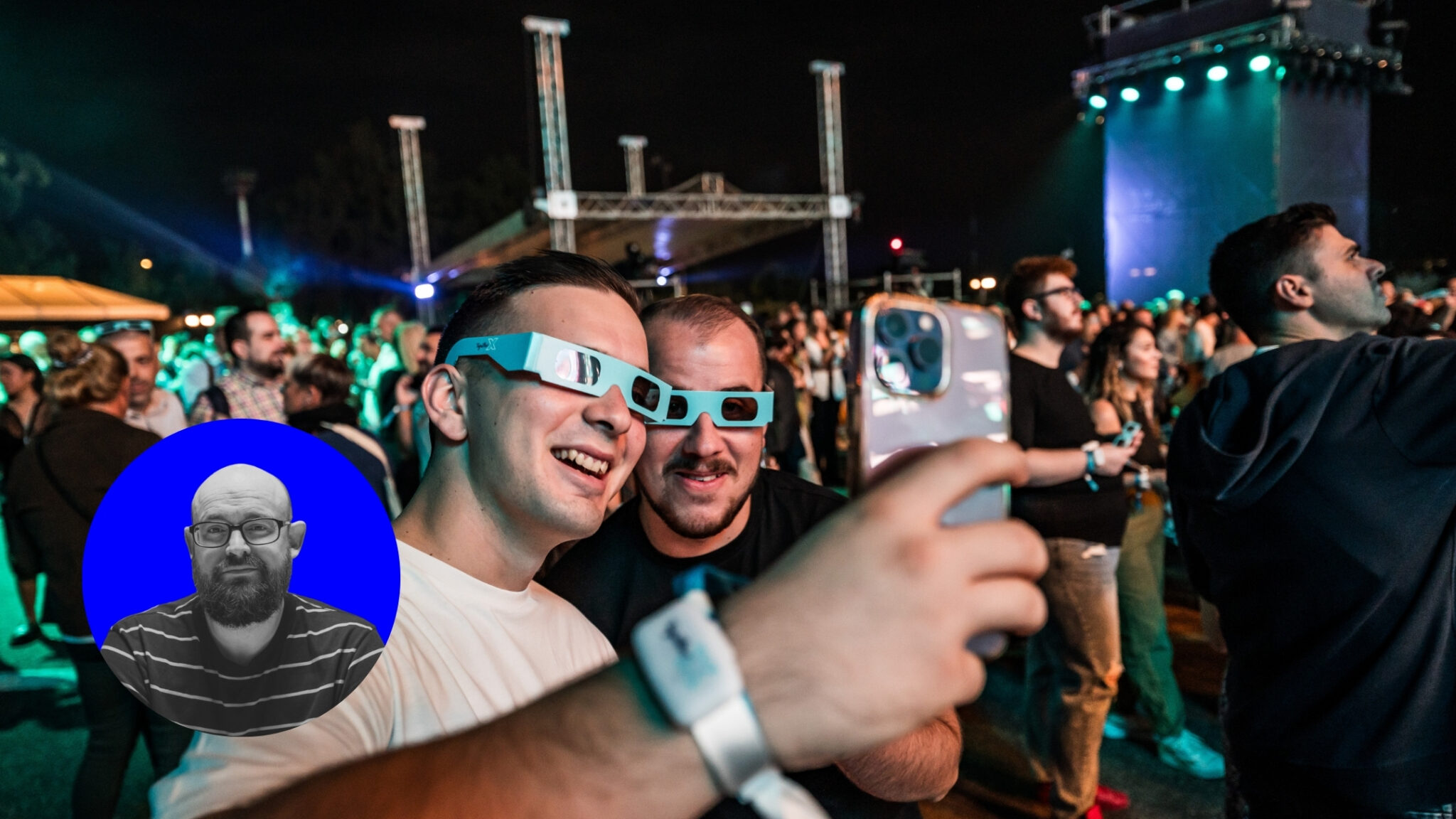

by Jon Buckels
When viewing event attendees, my focus has been treating them as collaborators rather than guests, giving them autonomy to choose how far they want to engage and at what pace, while still forging a collective experience. My goal was to create a flexible path where guests can explore and participate on their own terms, while still contributing to the bigger narrative.
While keeping updated on enhancing guest experiences at events, I discovered the term psychographics, which helps us get to the core of how people engage.
Psychographics goes beyond the surface-level demographics of age, gender, or income and instead, seeks to understand people’s values, attitudes, and behaviours, the deeper reasons why they make the choices they do. When we apply this lens to event design, we start to see why guests gravitate toward different levels of participation. It’s about more than just who they are; it’s about what drives them.
In our immersive events, we’ve organically been designing for these different engagement levels. From my first major event, we recognised that not everyone wants to jump into action in the same way. We created experiences that catered to what I have now called the Waders, Swimmers, and Mermaids, three psychographic profiles that reflect how deeply someone wants to dive in. The Waders prefer to watch from the edges, the Swimmers will engage but keep a sense of distance, and the Mermaids are fully immersed, front and centre, embracing every moment.
With psychographics, we can better understand why people fall into these groups, and more importantly, how we can encourage them to step out of these roles. As creators, we need to build mechanics that allow guests to fluidly move between levels of engagement, rather than locking them into one mode for the entire event. By designing events that adapt to these shifts, we can create more dynamic experiences that meet guests where they are—at any given moment.
Each market has its psychographic quirks and understanding them is key to creating an experience that feels authentic to the audience.
In Berlin, people are relaxed and embrace spontaneity and individual expression but on their terms. There’s a strong sense of personal freedom in how they navigate space, and it’s our job to design events that match that free-form approach. However, they are also often “too cool for school,” and if they feel you’re pushing them too hard in any direction, they’ll push back.
In our latest activation in Japan, it was clear to us the psychographics in Japan are a world apart from what we’re typically used to in Berlin.
In Japan, there is clear evidence of a deeper sense of social harmony and group consciousness at every corner. Guests may be more inclined to observe first, feeling out the collective mood before making a move. The emphasis here is on respect for the group experience, which means we’ve had to rethink how we introduce elements of participation.
Colleagues who installed Blue Man Group in Tokyo said they had to restructure the interactions and their expectations, as the locals sat respectfully in silence until they were invited to participate and then, once permission was given, the gloves came off and with it nearly the roof. A clear invitation that lets them know they can express themselves is essential, and we’re fortunate to have a team of multilingual immersive actors who will help deliver that message. By the end of the night, if things go to plan, all 2000+ individuals will have woven their journeys into a shared celebration of unity.
Whether it’s encouraging Berliners to explore at their own pace or crafting not-so-subtle nudges that invite Japanese guests to engage, the goal remains the same: to create an event where everyone, no matter their engagement style, feels like an integral part of the story.
As we head into this final stretch of planning for Japan, it’s clear that while psychographics gives us a powerful tool to understand audience behaviour, every event still comes down to flexibility. We create the framework, but our guests write the story.


by Kadambari Zokarkar
Thank you, it’s been a great start so far!
I’ve spent the past several years extensively building muscle in strategic planning, digital strategy, and research across the marketing and events initiatives of legacy brands and local startups alike.
Blending my understanding of brand building through creative solutions, decoding consumer behaviour, conducting market and business analyses and more have all helped shape the well-rounded perspective that I now have and hope to contribute to the immersive experiences strategies we design at BRS. Crucially, I want to help place real human insight and trends at the center of crafted concepts.
While the set-up of a boutique creative agency isn’t unfamiliar territory, I find it exciting to be in a reframed role as a Creative Strategist, with a scope that is expandable and grants end to-end visibility from concepts to execution. Here, taking the onus of staying on top of evolving digital tools and developing expertise in the dynamic world of emerging technologies will be integral to remaining successful. I also look forward to the extremely valuable learnings and exchanges drawn from my colleagues here at BRS and the potential for deeper cross-functional collaborations.
Research and analyses truly help to gain a grip on a brand and its DNA, the industry it functions in, and the target audience it wants to resonate with. The assimilation of this knowledge combined with awareness of emerging trends is what translates into original ideas and strategies for respective brands. When working on a specific brand, I like to think of myself as an implant in their company to help me think in the perception of stakeholder priorities and treat them like my own. At BRS, I hope to bring this structure and outlook to support our creative strategy internally.
A great deal of empathy. From personal experience as well as through proof of concept in BRS’ past activations, it is evident that a narrative where people are made to feel like protagonists is what makes an experience memorable. My storytelling approach seeks to structure consumer journeys in a way that inspires moments of creativity on a personal and social level, nail down real brand-consumer needs, and create solutions that activate multi-sensorial stimulation powered by purposeful technology.
When it comes to brand activations, the real question isn’t just “Did people show up,” it’s “Did we create a unique moment they will remember?” KPIs like foot traffic and participation rates are a solid start, but the magic lies in measuring engagement like the length of duration and conversion such as sign-ups and purchases.
In the long run, ROI, is of course, the ultimate proof but there are many means of value generation that go beyond traditional outlook. Qualitative feedback, traceable through exit interviews, surveys, or even social listening are powerful ways to measure how people felt about the experience. Physical-world tools like RFID trackers or heat maps can show how attendees moved through and interacted with your space. When people talk about your brand long after the event, you’ve nailed it.
When impact goes beyond numbers, that’s where emotional connections and resonance enter the equation, which in turn, drives brand love, the ultimate driver for brand sustenance.
In my view, experiential marketing is being reshaped by hybrid experiences and personalization through technology. Events that seamlessly blend virtual and physical elements allow brands to reach global audiences while still delivering that “you had to be there” emotion. Personalization, powered by AI, means activations can tailor experiences in real-time with, for example, customized interactions or AI-driven recommendations. Innovation surrounding immersive experiences will continue to grow, with brands competing for consumer share of mind. Further, with sustainability rightfully rising to center stage, efficient green choices will take precedence.
BRS continues to expand its creative thought leadership, envisioning solutions that not only speak to current climates but are also often ahead of their time. Having already championed a focus on hybrid events, building end-to-end services with an impressive portfolio that demonstrates volumes on the agency’s capabilities, BRS is set to grow and own emerging trends in experiential marketing. And of course, this is all made possible by the very versatile and talented pool of contributors, led by a team of brilliant, enterprising folks with deep roots in the world of experiential experiences and culture.
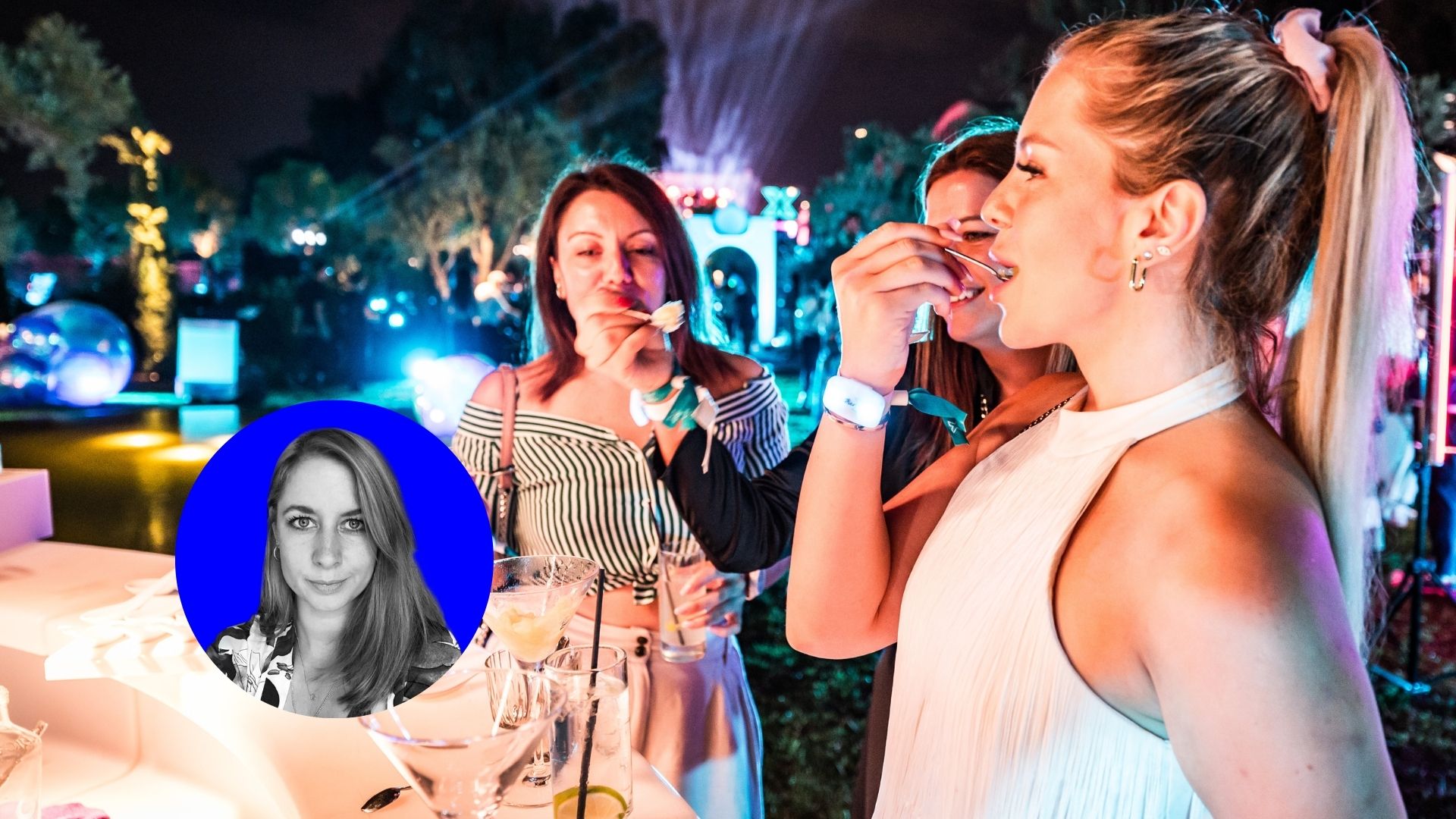

by Janina Schaffrath
Credits ©
Photography -Claudia Greco, Marcel Schwickerath
Food is deeply connected to emotions and memories, which is why we focus on stimulating all the senses through neuro-marketing, a strategy that taps into the brain’s response to sensory stimuli. The visual appeal of beautifully presented dishes, combined with the enticing aromas of fresh ingredients, immediately captivates guests and triggers positive memories. For instance, the smell of fresh bread can evoke feelings of comfort and nostalgia.
By carefully curating the environment, using complementary colours, lighting, and textures, we enhance the emotional impact of the dining experience. Warm lighting can make food appear fresher, while the right background music adds depth, making each bite feel more indulgent and immersive. This harmonious blend of sensory elements ensures that guests not only enjoy the food but also leave with a lasting emotional connection to the experience.
We transform passive dining into an interactive journey. At our Studio, we pride ourselves on creating immersive environments that encourage active participation. By using elements like LED wristbands, volumetric lighting, and other interactive installations, we craft a narrative that guests become a part of, not just spectators.
Our approach to event design, which we refer to as “breadcrumbs,” provides subtle clues and interactive touchpoints that guide guests through the experience. We make sure that each element contributes to a cohesive story, inviting attendees to explore, engage, and connect with the event on a deeper level. Whether it’s the crunch of fresh produce or the smoothness of decadent chocolate, the tactile aspects of food also play a critical role in building these lasting memories.
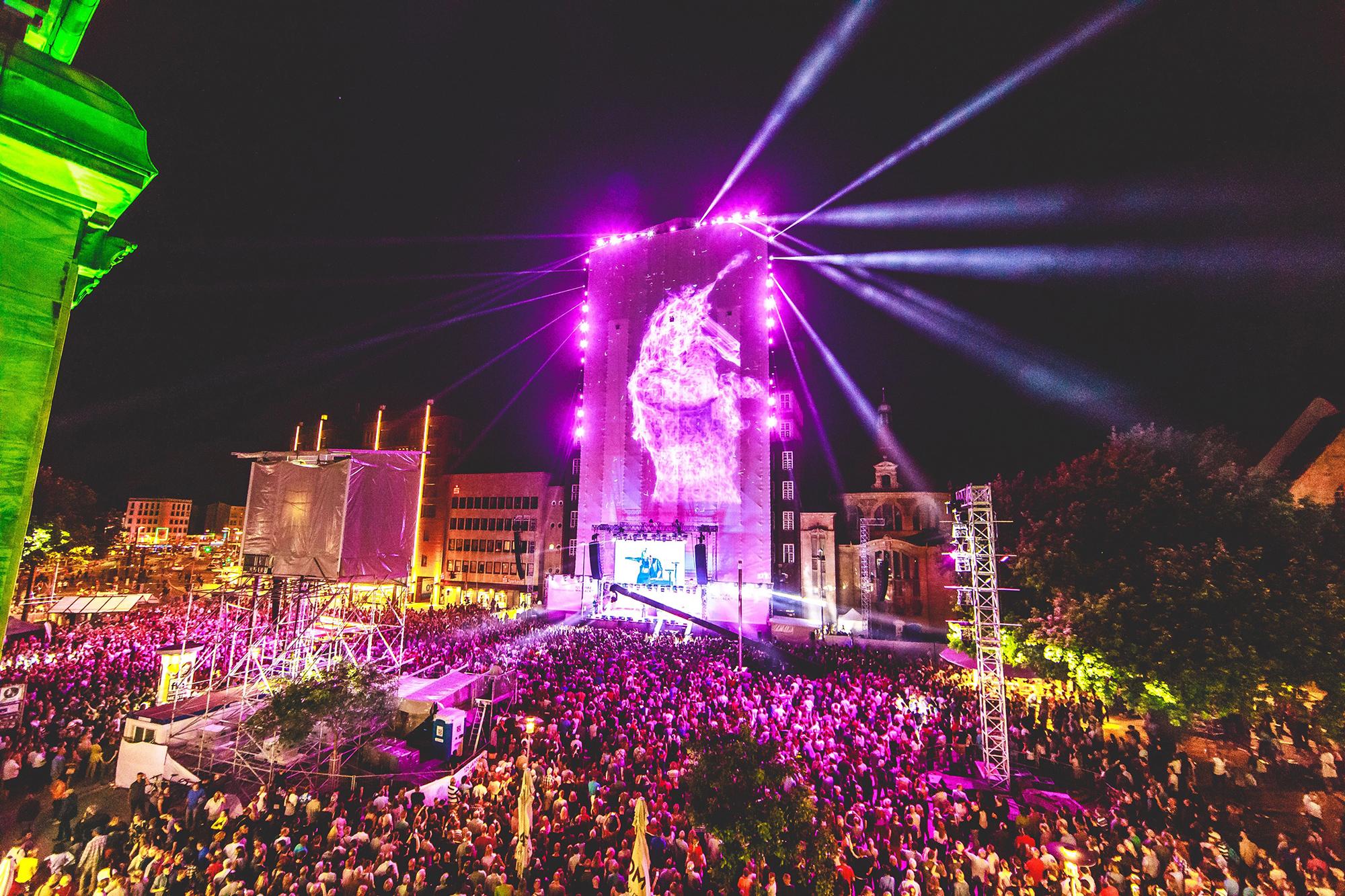

Immersive experiences are key drivers to making any brand experience truly unforgettable. By blending projection mapping with motion content design, brands can captivate audiences in interactive ways to enhance activations. Our approach goes beyond the ordinary, incorporating 3D video, Augmented Reality (AR), and Virtual Reality (VR) and even laser mapping to elevate these experiences. Whether projecting custom visuals onto architecture, products, or stages, we craft moments that amplify storytelling, deepen emotional engagement, and make lasting memories for our audiences.
A product launch today isn’t just about showing something new—it’s about drawing the audience into a shared journey. Projection mapping transforms physical spaces into living environments, where products come alive in a captivating story. Combined with motion content design, these visuals evolve in real-time, keeping guests emotionally connected.
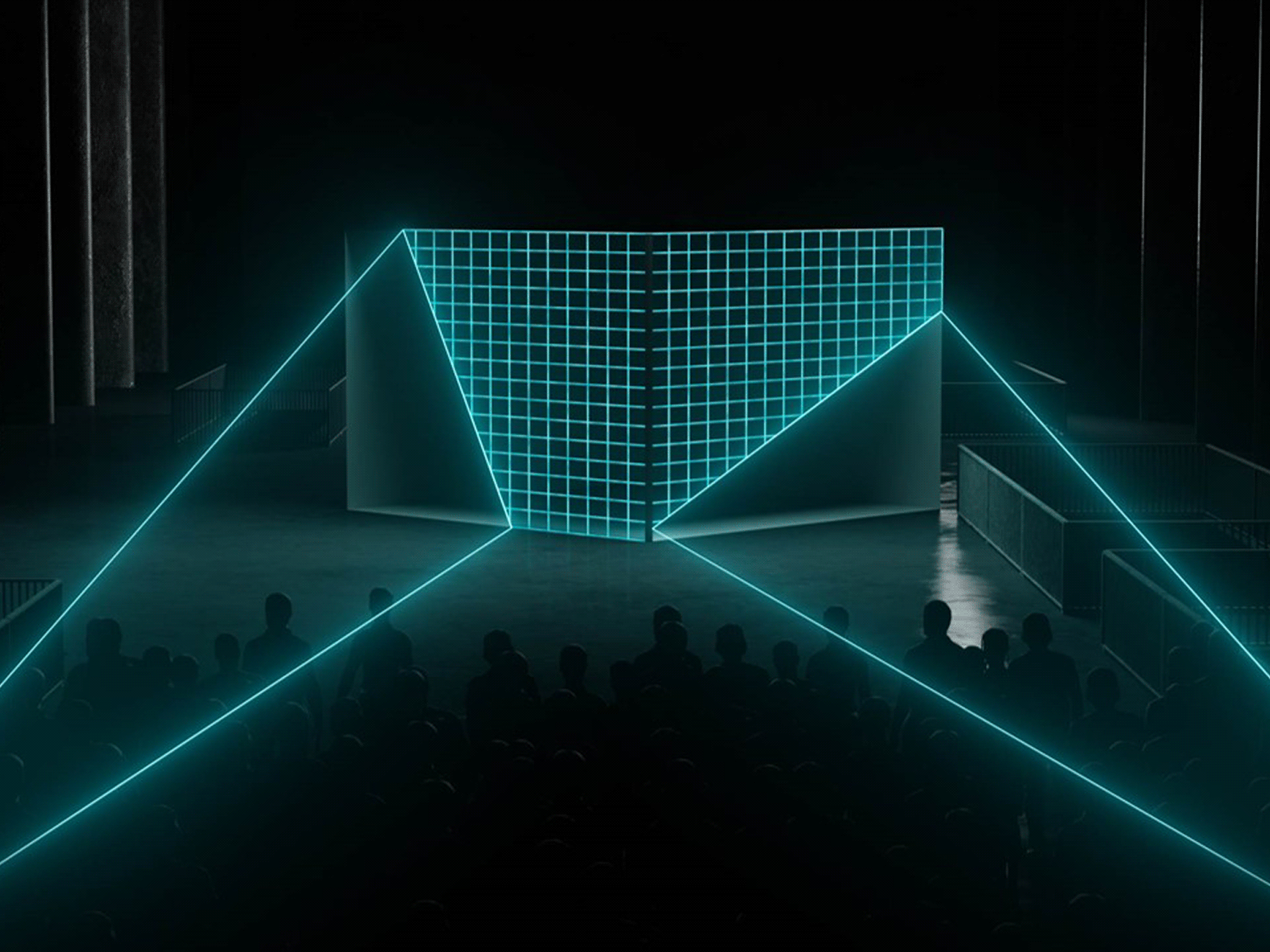
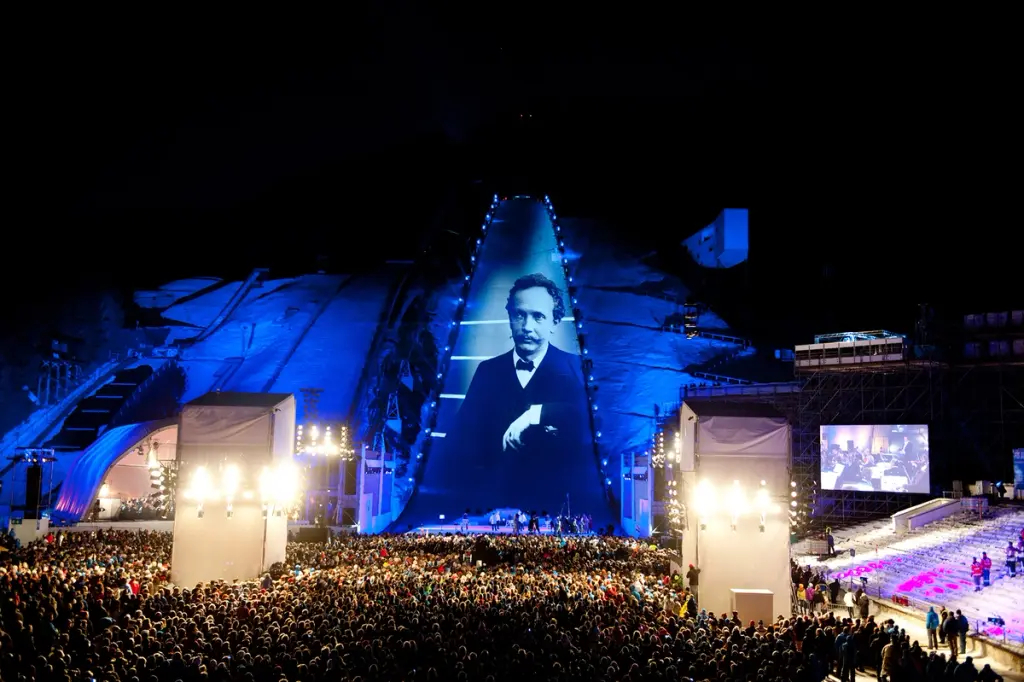
In ceremonies, projection mapping can change any stage, venue, or landscape to immerse attendees in the brand’s core message. This complements the storytelling, fostering emotional connections and building loyalty all at the same time.
Rather than passive observation, projection mapping brings the brand’s story to life, while AR, VR, and interactive elements elevate the experience further. This approach turns mundane communications into engaging, immersive narratives, resulting in deeper audience engagement and stronger connections to the brand.
Beyond launches and ceremonies, our expertise extends to interactive exhibitions that educate and engage. We design booths and environments tailored to specific themes, from environmental awareness to product storytelling. By incorporating multimedia elements, these spaces transform ordinary exhibitions into fully interactive learning experiences.
By focusing on immersive storytelling and emotional impact, brands can transform the way they communicate to create deeper bonds with their audience. Our projection mapping and motion content design services offer a way to tell your brand’s story through immersive formats.
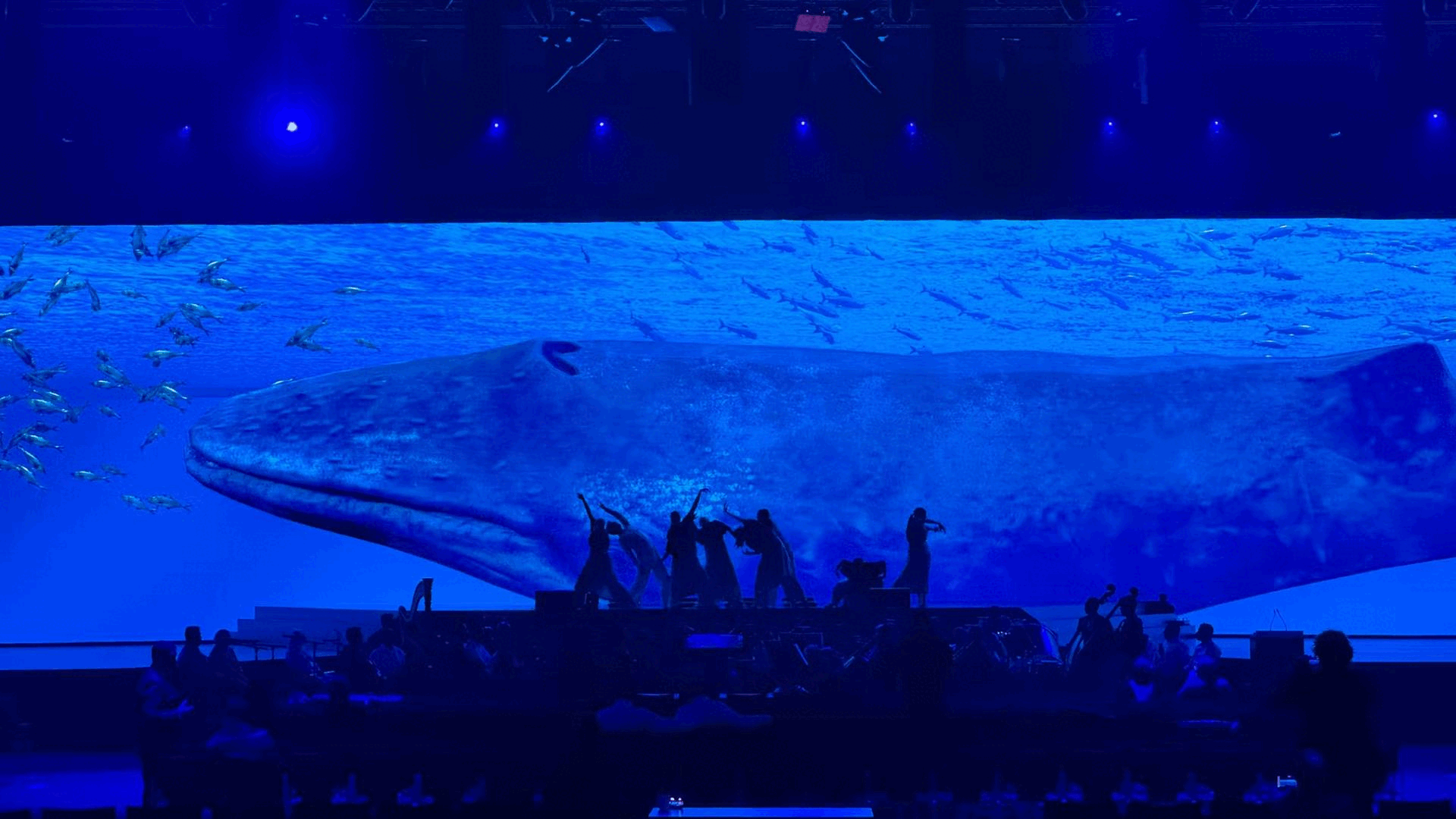

by Brendan Shelper
Live experiences have been increasingly blurring the line between the physical and digital realms since a few years now. But what audiences now expect is more personalised, interactive, and seamless integrations of technology that elevate the sensory impact of an activation. At BRS, we’re leaning into formats or models that combining our roots in theatrical storytelling with digital engagement tools infused with sensory experience. Our focus is on creating highly immersive activations that balance human connection with innovative tech and sensorial triggers, ensuring every experience feels meaningful and highly memorable.
We’re particularly excited about advancements in AR and AI-driven personalisation. AR has the power to create shared, yet deeply individualised experiences, while AI offers opportunities for real-time audience engagement and adaptive storytelling. At BRS, we’re also exploring how existing tech such as QR codes and microsites can be used to build captivating physical journeys within our events. Simple ideas with great design can transform the way audiences interact with live events. These tools allow us to push creative boundaries and reimagine how guests experienced and connect with brands and products or stories.
Sustainability is no longer an option; it’s a responsibility. We’re embedding eco-conscious strategies into the design and production phases of our projects and will launch a new initiative to better coordinate our supply-chain and clients under one common goal that aims to more accurately measure the environmental impact of each project. Future projects will aim to minimise the calculated environmental footprint and impower clients to off-set their footprint in meaningful ways. It needs all parties to take responsibility for this to work, but agencies have the centralised power to coordinate this much needed change.
Both have a role to play. Intimate, personalised experiences are becoming essential for fostering deep connections, particularly for brands targeting niche audiences. However, large-scale activations remain unparalleled in their ability to create shared cultural moments and generate mass impact. At BRS, we see these formats not as opposing forces but as complementary tools, leveraging their unique strengths to craft layered, multi-scale campaigns.
Experiential storytelling is evolving to be more participatory, placing audiences at the centre of the narrative. The days of passive consumption are over; people now want to co-create experiences with brands. This shift demands a rethinking of how we structure stories, with open-ended frameworks that adapt to audience input in real time. For brands, this kind of storytelling is crucial to building lasting emotional connections and fostering a sense of brand love or adoption.
Live experiences will continue to dominate, most people are desperate to find tangible spaces to exchange and interact, so live will thrive in 2025! Keep an eye on advancements in AI, and activations fuelled by the rise of micro-communities and platforms that empower co-creation. Check out character.ai, if you have teenagers, you’re probably aware, but kids are using this for their social interaction these days, powered by AI conversations.
What excites us most is the limitless potential for live experiences to inspire, connect, and transform. The industry is poised to become more creative, more inclusive, and more impactful than ever. Personally, my goal for Battle Royal Studios is to continue leading the charge in redefining experiential design, merging innovation with artistry. I want us to remain bold, constantly exploring new formats and technologies while staying true to our ethos of authentic, emotionally resonant storytelling.
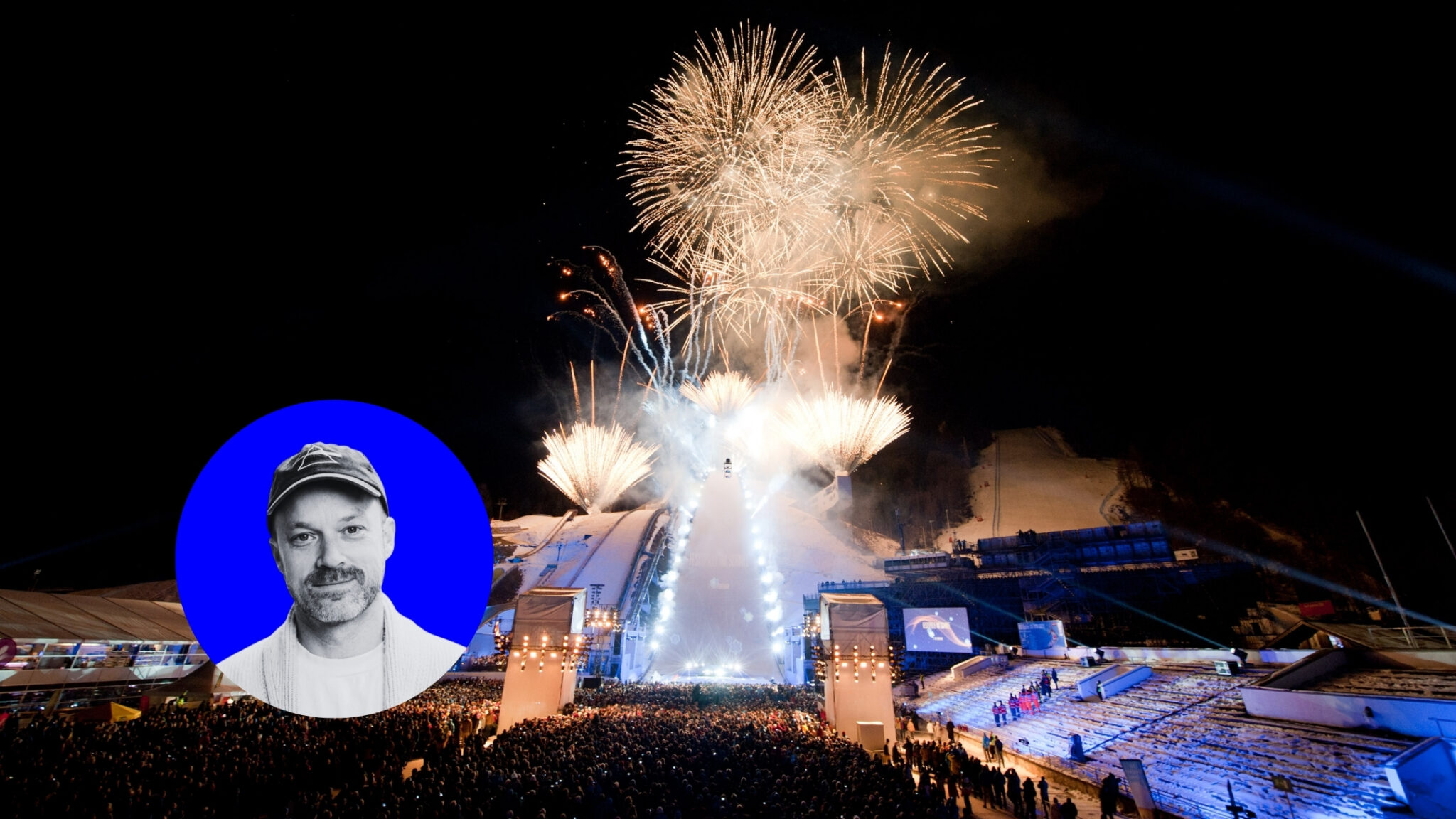

by Brendan Shelper
Credits ©
Photography – Claudia Greco
The pivotal moment came during my work on large-scale cultural and Olympic ceremonies, where I witnessed first-hand the incredible power of immersive storytelling to captivate and inspire mass audiences. Although we were already involved in numerous small brand experience projects and corporate events, the clear defining project that tipped us over into forming Battle Royal Studios was the GAP Ski WM 2011. This project was the brainchild of dreinull mediatainment (now PlusDrei) and my long-time friend from Berlin, Max Hassemer. Max was also the driving force suggesting that I establish my own entity, urging me to get a phone line/website and formalise Battle Royal Studios to make us more marketable within the industry. The Ski WM project was a huge milestone for all of us, and it marked the true birth of BRS. This experience not only shaped our vision but also solidified our commitment to pushing the boundaries of traditional event production and experiential marketing by blending theatricality with cutting-edge technology on a 100m high ski jump slope we used as a stage.
My background in theatre and bespoke show production instilled in me a deep appreciation for narrative and spectacle. I learned that the most impactful experiences are those that engage audiences on multiple levels, creating a sense of immersion that blurs the line between the audience and the performance. This ethos is at the core of Battle Royal Studios, we approach every project with the belief that it should be an immersive, multi-sensory journey. My experience has taught me that the best stories are those that allow audiences to become active participants, and this philosophy drives us to constantly explore new ways to engage and surprise our clients and their audiences.
One of the key challenges in the early days was building a team that could not only understand but also embrace the interdisciplinary nature of our work. We needed to find individuals who were not just experts in their field but also willing to step outside their comfort zones and collaborate across disciplines. Another challenge was convincing clients of the value of our unique approach, which was often more ambitious and unorthodox than what they were used to. Overcoming these challenges required perseverance, a clear articulation of our vision, and a commitment to delivering exceptional results. These early obstacles reinforced our belief in the power of collaboration and innovation, and they set the foundation for our approach to bespoke, boundary-pushing projects. I’m proud to say that many of the original BRS team are still with us today in some form, and we have a very diverse and extensive pool of regular collaborators that support our ambitious creations.
The fusion of art and technology at Battle Royal Studios stems from a desire to create experiences that are not only visually stunning but also deeply engaging on a conceptual level. This requires a constant exploration of new technologies and an understanding of how they can enhance the storytelling process. We cultivate this fusion by fostering a culture of curiosity and experimentation within our creative team. Innovation is driven by a willingness to take risks, to explore the unknown, and to embrace the possibilities that new technologies offer. We are constantly asking ourselves how we can push the envelope further, how we can create something that has never been seen before. This relentless pursuit of innovation is what keeps our work fresh, exciting, and relevant. Other times it’s about using existing or even old tech in interesting new ways. This reminds me more of the theatre approach where one’s access to the latest innovations is often not as accessible, but with time and an inspired group, magic is made.
Well, witnessing the impact of our work on audiences and clients alike. There is something incredibly fulfilling about seeing people’s reactions when they are truly moved or inspired by an experience we’ve created. This journey has also deepened my understanding of the power of experiential marketing, it’s not just about creating a memorable event, but about building lasting emotional connections.
Over the years, I’ve come to see that the most successful experiences are those that go beyond the moment, leaving a lasting impression that resonates with people long after the event is over. This has evolved my perspective on experiential marketing, reinforcing the importance of authenticity, creativity, and innovation in every project we undertake. It’s also nice to meet someone on the other side of the planet that has seen or heard of your work and is genuinely impressed. But that’s the beauty of word-of-mouth marketing.
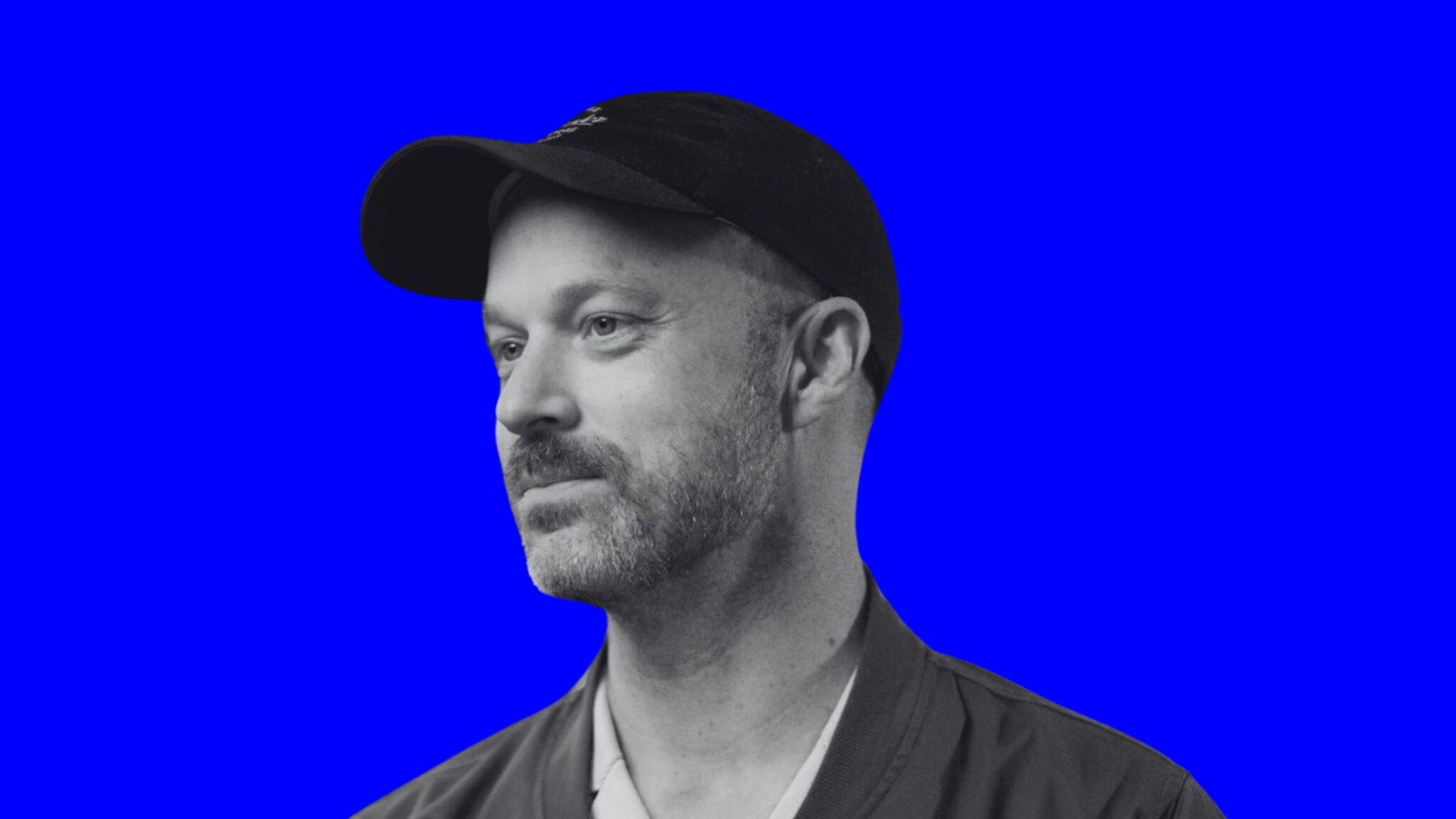

Drawing from personal experience as both a performance artist and event director, there is a profound understanding of how creativity flourishes when there’s a balance between artistic freedom and purposeful direction. This approach has been instrumental in producing unconventional and impactful work. However, in classic agency settings, this balance is often disrupted by tight deadlines and stringent client requirements, stifling creativity by eliminating the necessary time for experimentation and failure.
In performance art, creativity is not just about executing movements but about interpreting instructions in a way that emotionally connects with the material and the audience.
Performers fill the space with their unique expressions, bringing life to the director’s vision, while the director meticulously crafts each task to fit into the greater vision with an acute awareness of how each move influences the overall outcome.
This collaborative process thrives on exploration and a willingness to embrace failure as a pathway to innovation. It’s through trial and error that artists and directors uncover new possibilities, leading to work that defies convention and resonates deeply with audiences.
In contrast, classic agency environments often lack this dynamic. With pressing deadlines and the stress of meeting client expectations, there is little room for the iterative process that fosters true innovation. Teams of creatives are frequently required to deliver ideas that must be immediately successful, on budget, and perfectly aligned with client specifications.
Failure is an integral part of the creative journey. It’s through failed attempts that creatives learn, adapt, and eventually arrive at innovative solutions.
In performance art, rehearsals serve as spaces for experimentation, where ideas can be tested, discarded, or refined without the pressure of immediate perfection.
In agency work, however, the lack of time for failure often means the first or second idea must be finalised, leading to outcomes that are less original and more predictable. This not only hampers individual growth but also affects the overall quality and originality of the work produced.
– Without the opportunity to experiment, ideas remain surface-level and conventional.
– The fear of failure can lead creatives to stick with safe, familiar, or recycled concepts.
– Strict guidelines can make creatives feel like mere executors rather than contributors.
To bridge this gap, agencies can adopt strategies inspired by artistic processes and have more open conversations with clients to allow more time for creative development.
– Allocate time for experimentation and build schedules that allow for idea development and iteration.
– Encourage a safe environment for failure where unsuccessful attempts are viewed as learning opportunities.
– Empower creatives with autonomy to explore beyond the initial brief, fostering a sense of ownership and investment.
– Focus on the vision, not just the deliverables.
Early-stage startups often experience their most creative periods precisely because they operate without the fear of failure. In these initial stages, there’s a unique freedom to experiment, iterate, and embrace risks, as the focus is on discovering what works rather than adhering to rigid expectations. This environment allows for rapid innovation as teams test bold ideas without the constraints often found in more established companies.
Embracing failure as a necessary step towards success can transform how agencies operate, leading to work that is not just effective but also original and inspiring. Just as in performance art, where the journey of creation is as important as the final performance, agencies and their clients can benefit immensely from valuing the creative process as much as the end product.
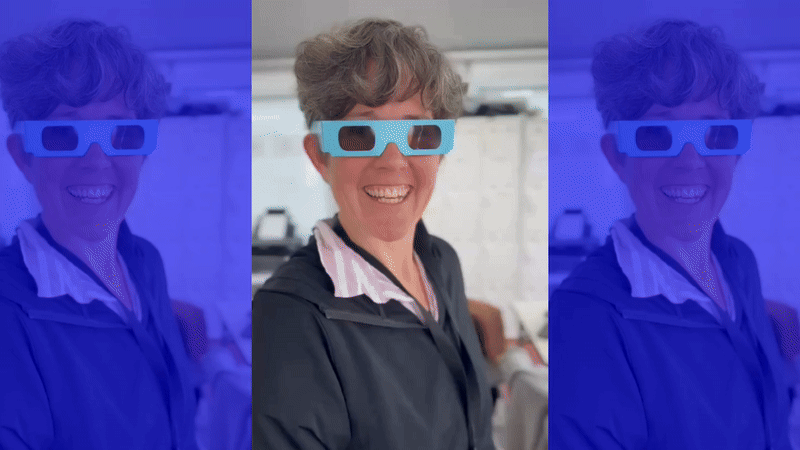

by Ky Lloyd
As my colleagues well know, scheduling rehearsals is no walk in the park—it’s like trying to play 3D Tetris with a bunch of odd-shaped pieces. There are so many moving parts: different availability, sensitivities, and a ton of parameters to juggle. It’s a real puzzle that needs strategic thinking, constant tweaks, and a lot of teamwork to get a sensible proposal together.
I started with the standard ChatGPT-4 model. It was quick, but for a more complex rehearsal schedule, it completely failed. It looked great on paper, but lots of facts and parameters just didn’t make any sense. So, I tried the new ChatGPT-4 o1-preview model to see if it could do better.
As it has a more thorough approach, I prepped my prompts differently this time. I fished all my prompts from the 4.0 model conversation and put them into a comprehensive two-page briefing. The o1-preview model response demonstrated a more in-depth approach. It adjusted based on my feedback, handled complex scenarios better, and made decent use of proposing parallel spaces and backstage area use—things the 4.0 model just couldn’t work with.
Definitely. The o1-preview model crashed after just six commands and kept crashing after this. It would be useful to have an “I give up” feedback to know concretely what the challenge was before crashing. Compared to the 4.0 model, the o1-preview was slow—I had to wait a full minute just to get a response after my two-page prompt. So, while it was more thorough, the slower speed takes getting used to and should be considered to make efficient use of work time.
As it is a preview model, o1-preview can’t import any attachments or photos, so I had to write out my scene-by-scene breakdown by hand, which was time-consuming. Plus, the chat takes things very literally—it didn’t really get banter or casual language, which made it feel a bit stiff as a sparring partner.
But I will say, it was a solid tool to frame and gather thoughts and information, and just to get the ball rolling. I felt it was like having an untrained but logical assistant, sparking new ideas and helping me refine my approach. For my next trial, I’m planning to draft the schedule personally and then see if the AI can spot any new efficiencies to improve upon. It’s not perfect, but it’s definitely worth experimenting with.
In the end, writing a good rehearsal schedule is more art than science. The o1-preview model shows promise, but there’s still a big gap between what AI can do and the nuanced decisions that come from hard-earned experience. This whole process has made me appreciate even more the complex work that goes into rehearsal scheduling. Kudos to all my colleagues who do this every day— I appreciate (even more) what we all do to pull a good rehearsal schedule together!
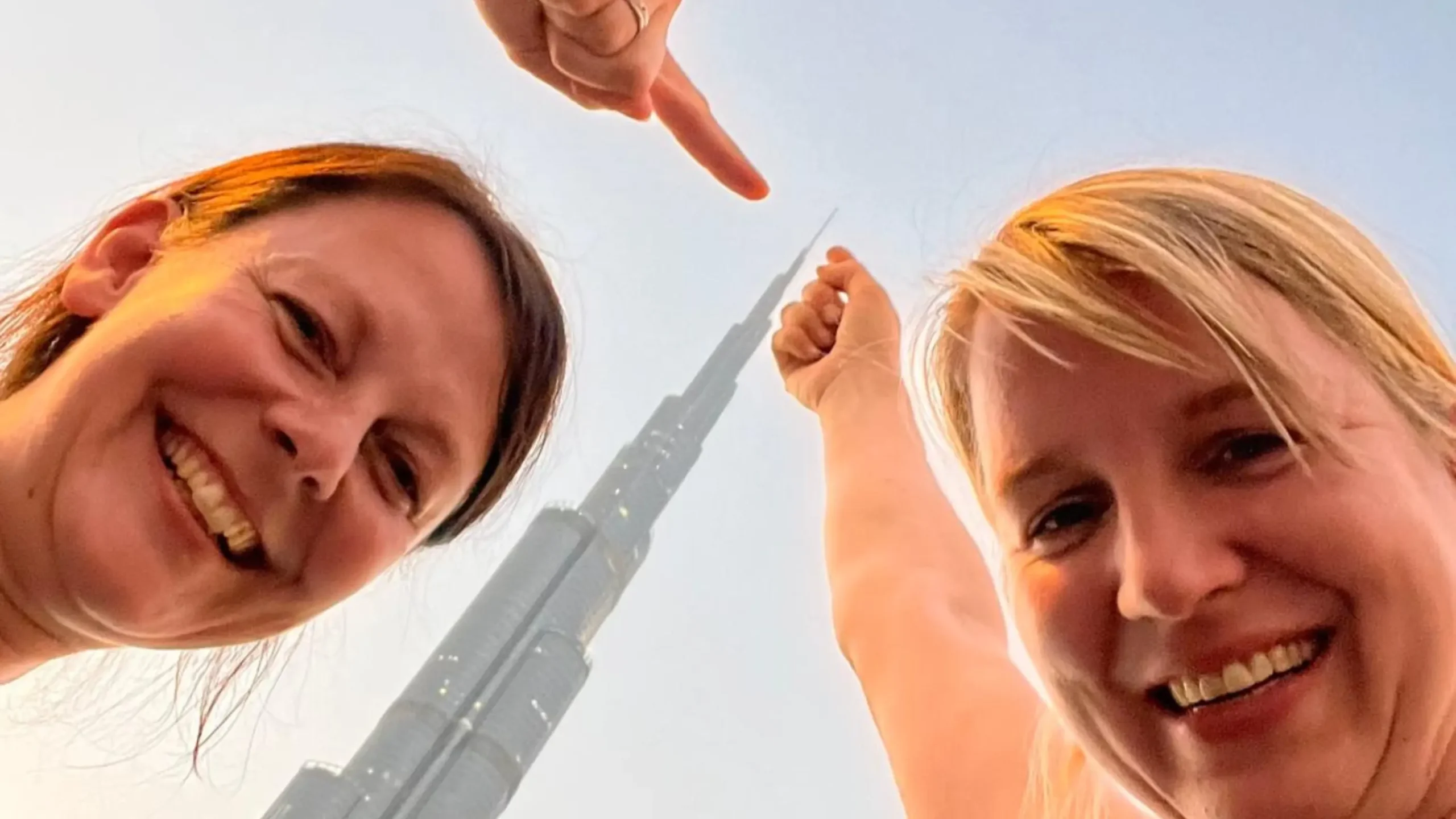

by Judith Hoch
The warmth of the people in Riyadh was as clear as the desert sun. Our meetings there were promising, backed by the view of Riyadh’s changing skyline, showing the city’s rapid development and its commitment to its heritage.
We engaged deeply with the local culture and our understanding of Saudi social and business etiquette has grown with each visit, enabling us to interact with both confidence and respect. Our discussions were an opportunity to deepen our appreciation of a culture rich in history and to fortify our ongoing partnerships in the region.
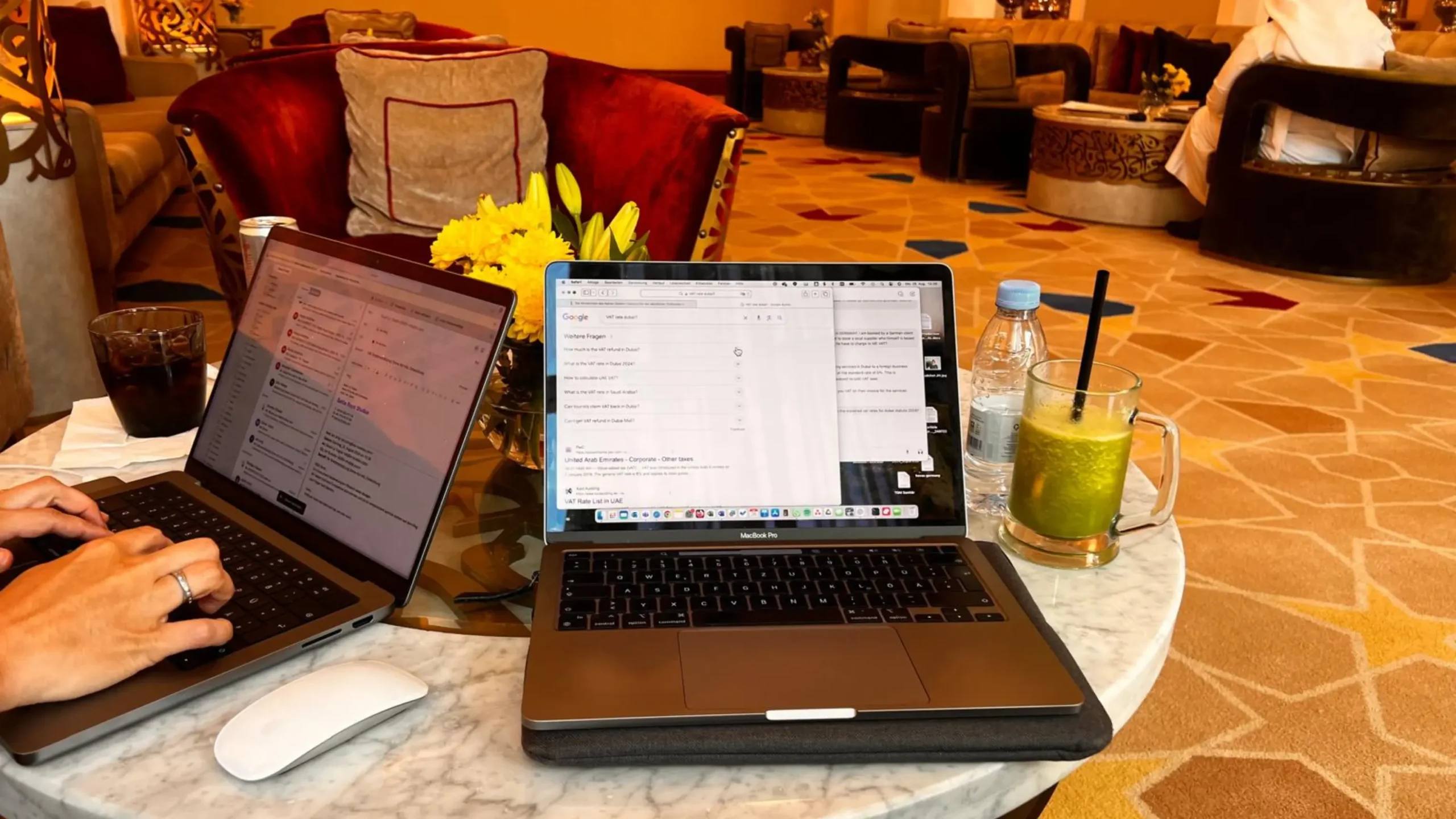
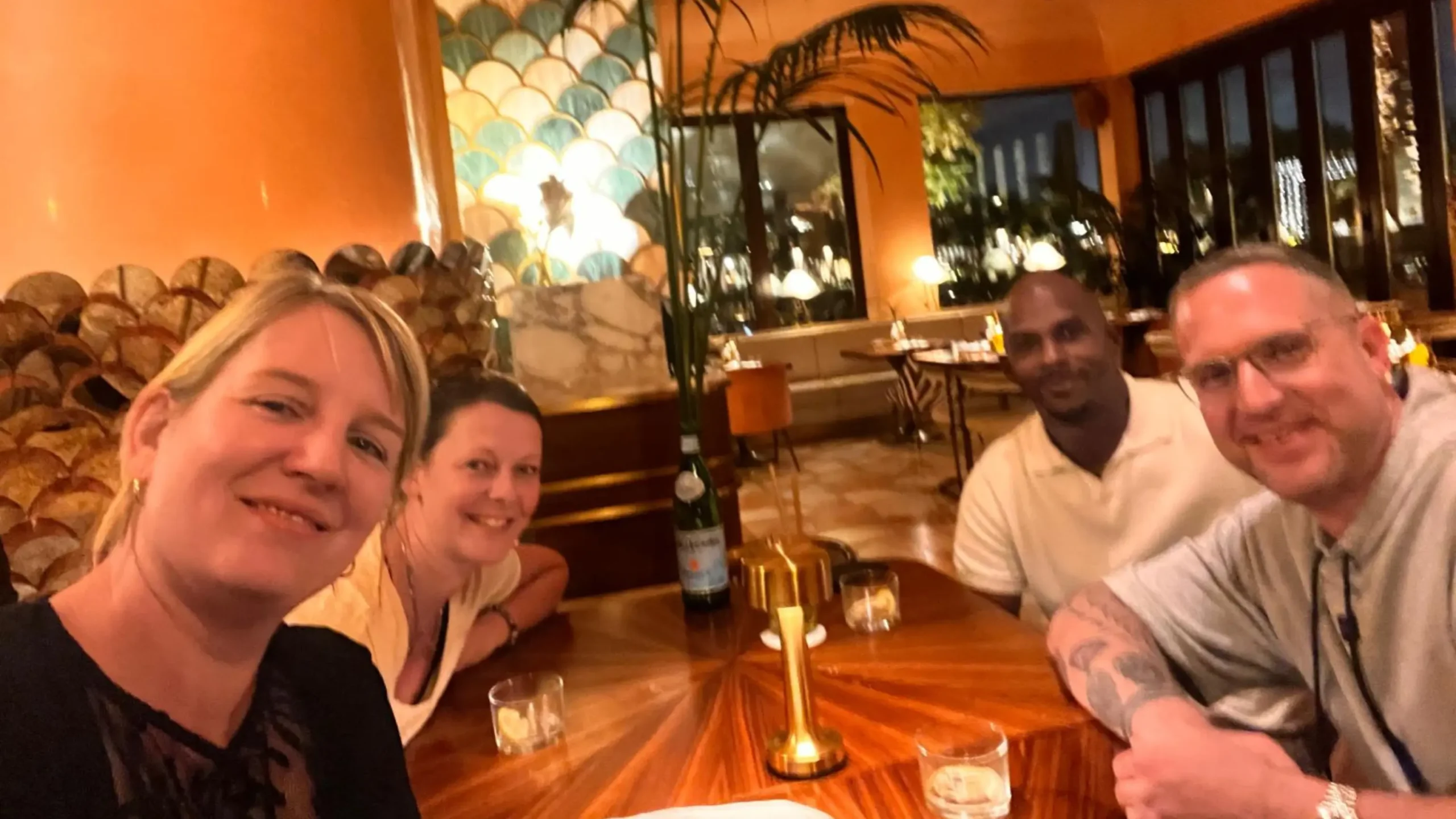
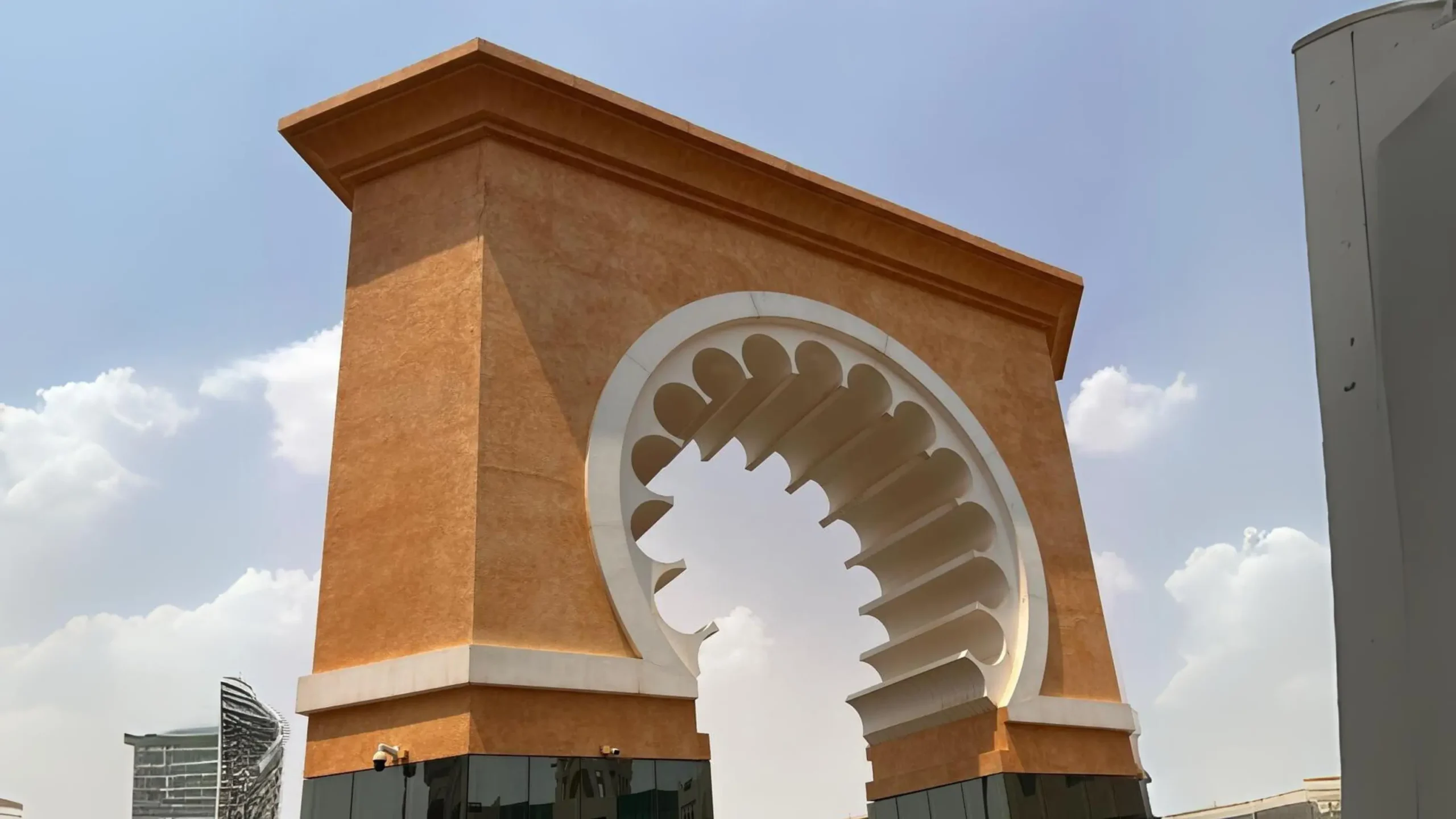
Exploring local cuisine is a staple of any business trip, and Riyadh did not disappoint with its unique and comforting flavors. Each meal was an event, offering more than just food but a glimpse into the local lifestyle and generous hospitality.
Even a normal dinner at the hotel restaurant became memorable as it led to an entertaining discussion with the head chef who came out especially to welcome us and exchange special dishes he could prepare for us. Another unforgettable experience was dining at the Najd Village, where despite the heat, we dined outside under fans, surrounded by carpeted walls, sitting on the floor.
A standout meal was on our final night in Riyadh at the Bujairi Terrace, overlooking the historic Diriyah fort. The meal there wasn’t just about the food but also about enjoying the beautiful view and feeling connected to the history of Saudi Arabia.
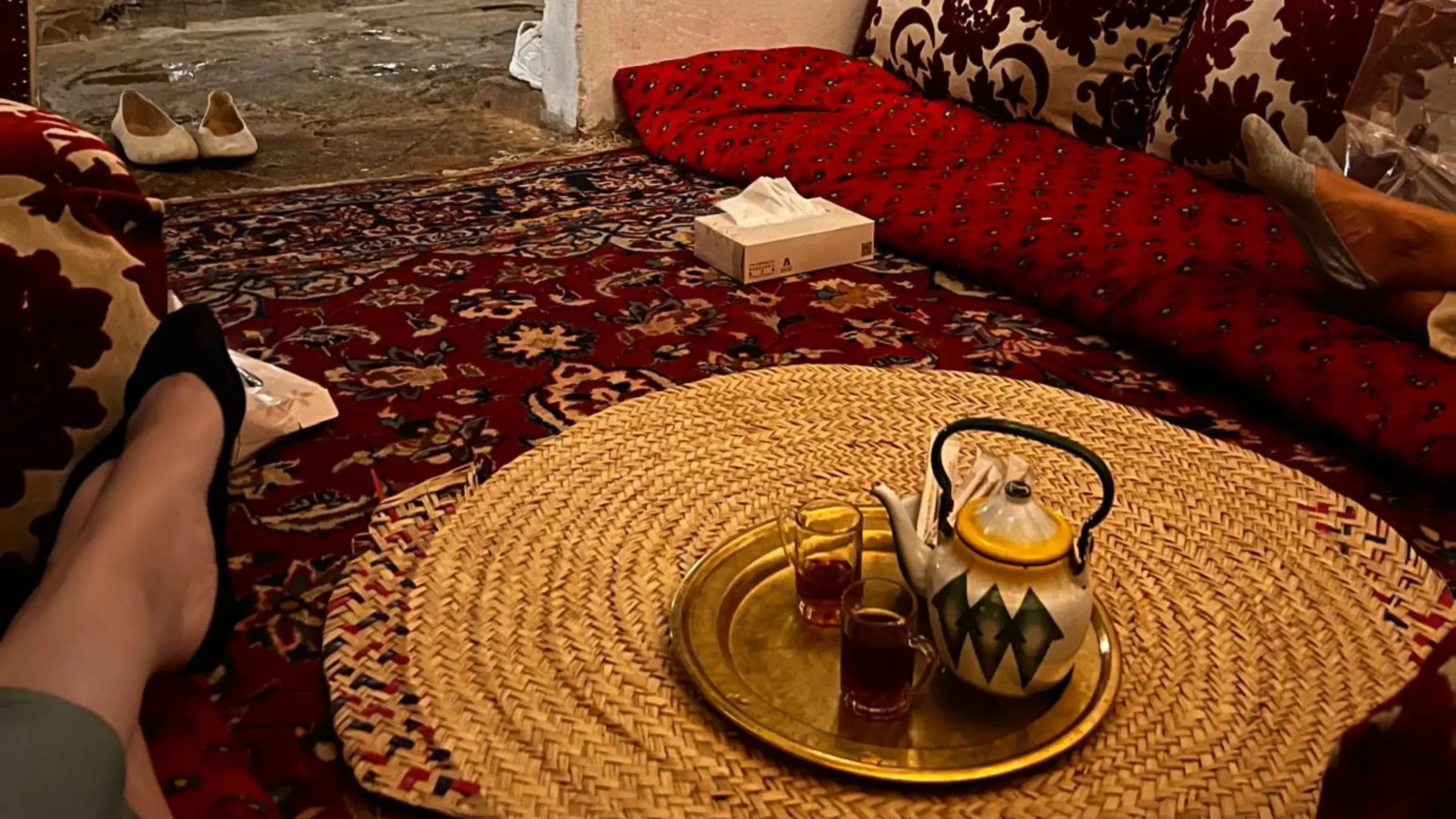
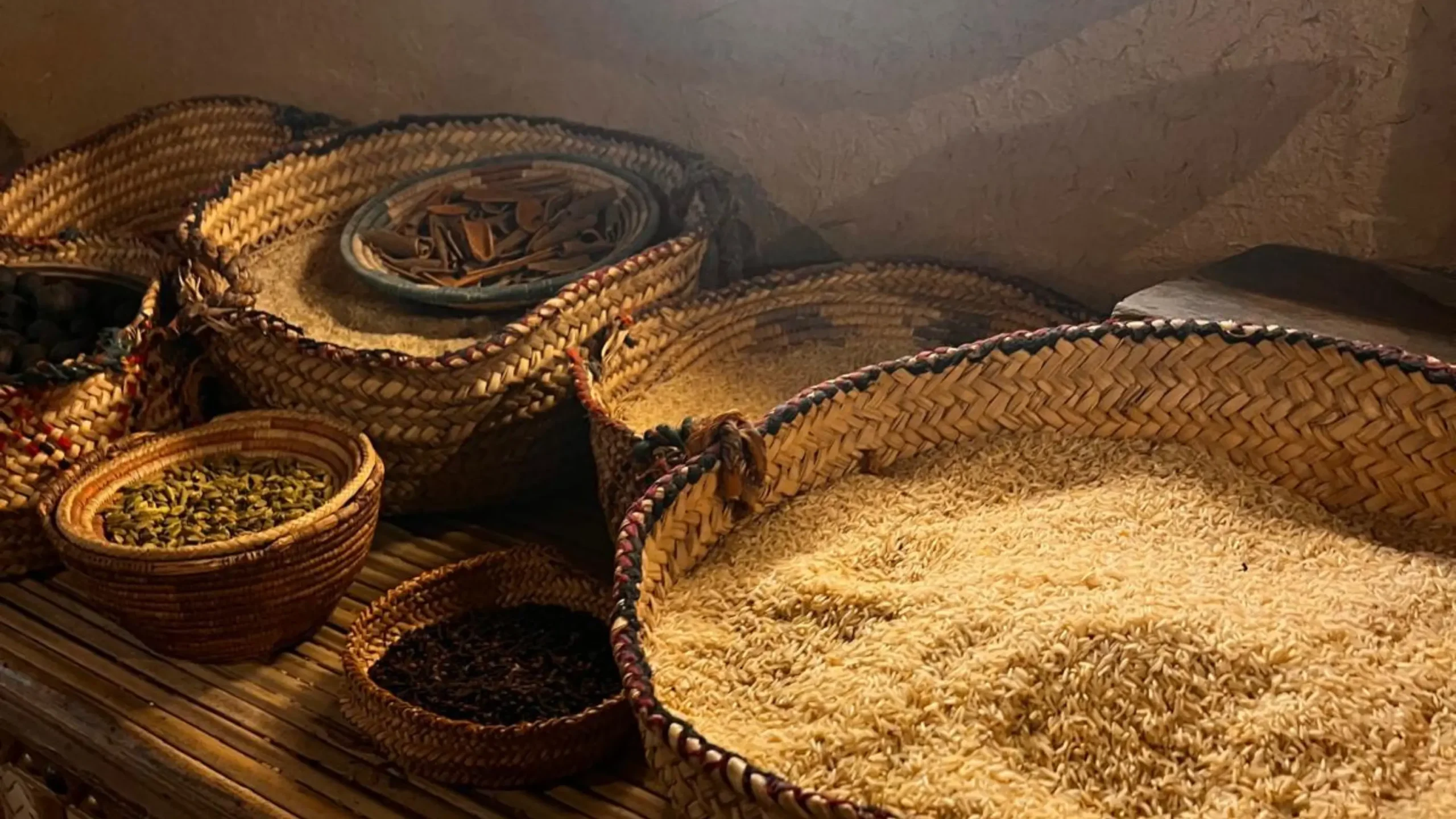
Our time in Dubai was brief but starkly different. The city’s buzz, much like Hong Kong or New York, was a contrast to Riyadh’s quieter atmosphere. The heat in Dubai was more humid and challenging, making our short time outside very intense.
But we could not miss the obligatory quick stop at the Burj Khalifa tower, stepping out just long enough to capture its staggering height and architectural grandeur in photos—a moment that underscored the vast differences between the two cities. These 10 minutes in the humid sun made us miss the dry 48 degrees of Riyadh.
We learned from a local contact about how the city adapts to summer; for example, the Dubai Mall opens early at 6 pm for joggers to exercise in the cool of the mall—an innovative way to promote fitness and well-being.
Since its inception in 2011, BRS has been crafting global experiences, and this trip has further enriched our international operations. We’ve been active in the UAE and Saudi regions for several years, but the purpose of this journey was to rejuvenate our presence and forge relationships with new partners.
The insights gained go beyond typical business interactions; they’re about establishing new connections and exchanging stories, reinforcing our shared goal of designing events that bridge diverse cultures. Each potential partner showed genuine interest in our unique approach to immersive activations, which introduces fresh perspectives to comprehensive event planning. This visit to Riyadh and Dubai has not only carved out new avenues but has also reaffirmed our readiness to be an integral part of these dynamic regions’ event landscapes.
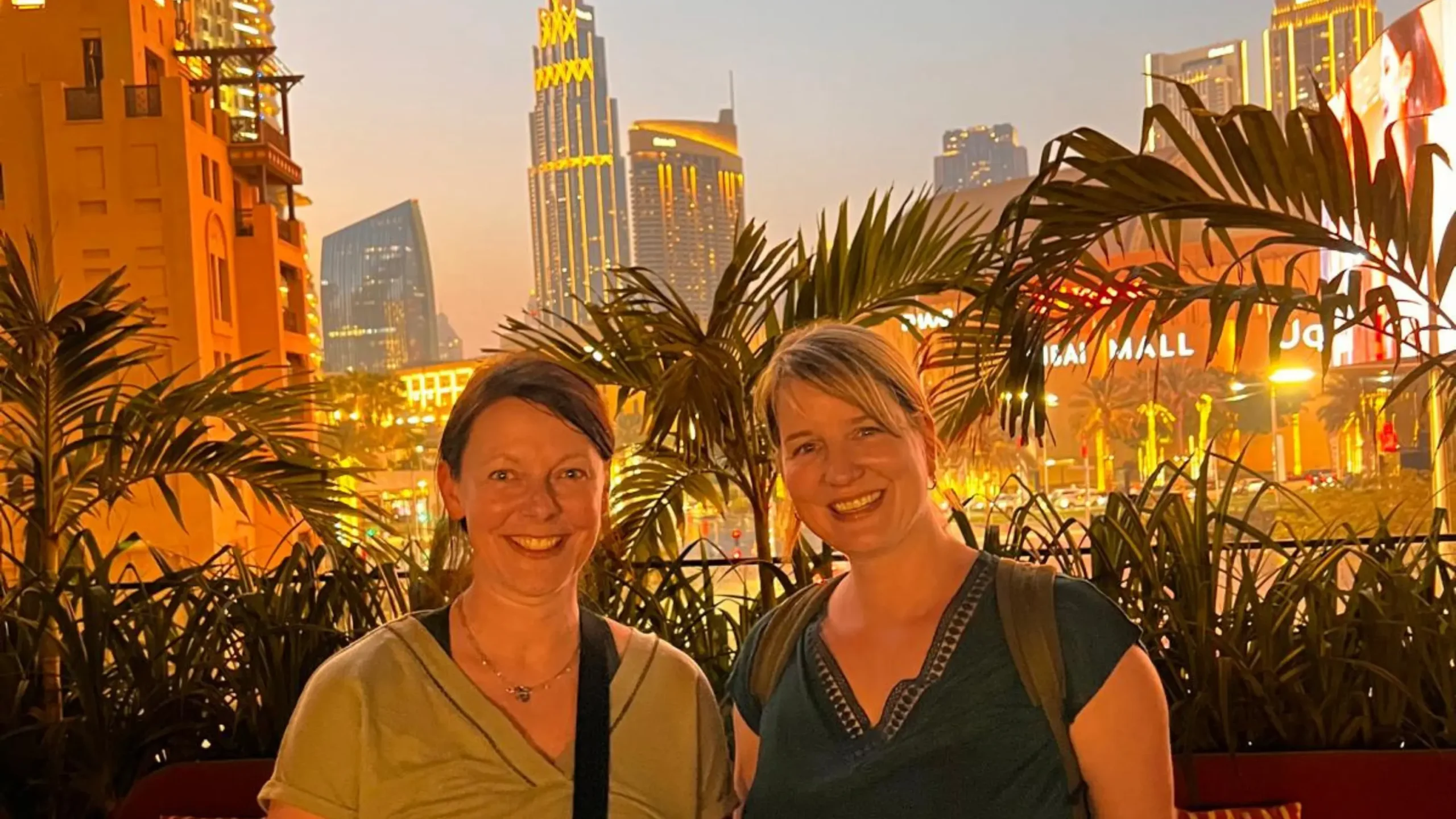
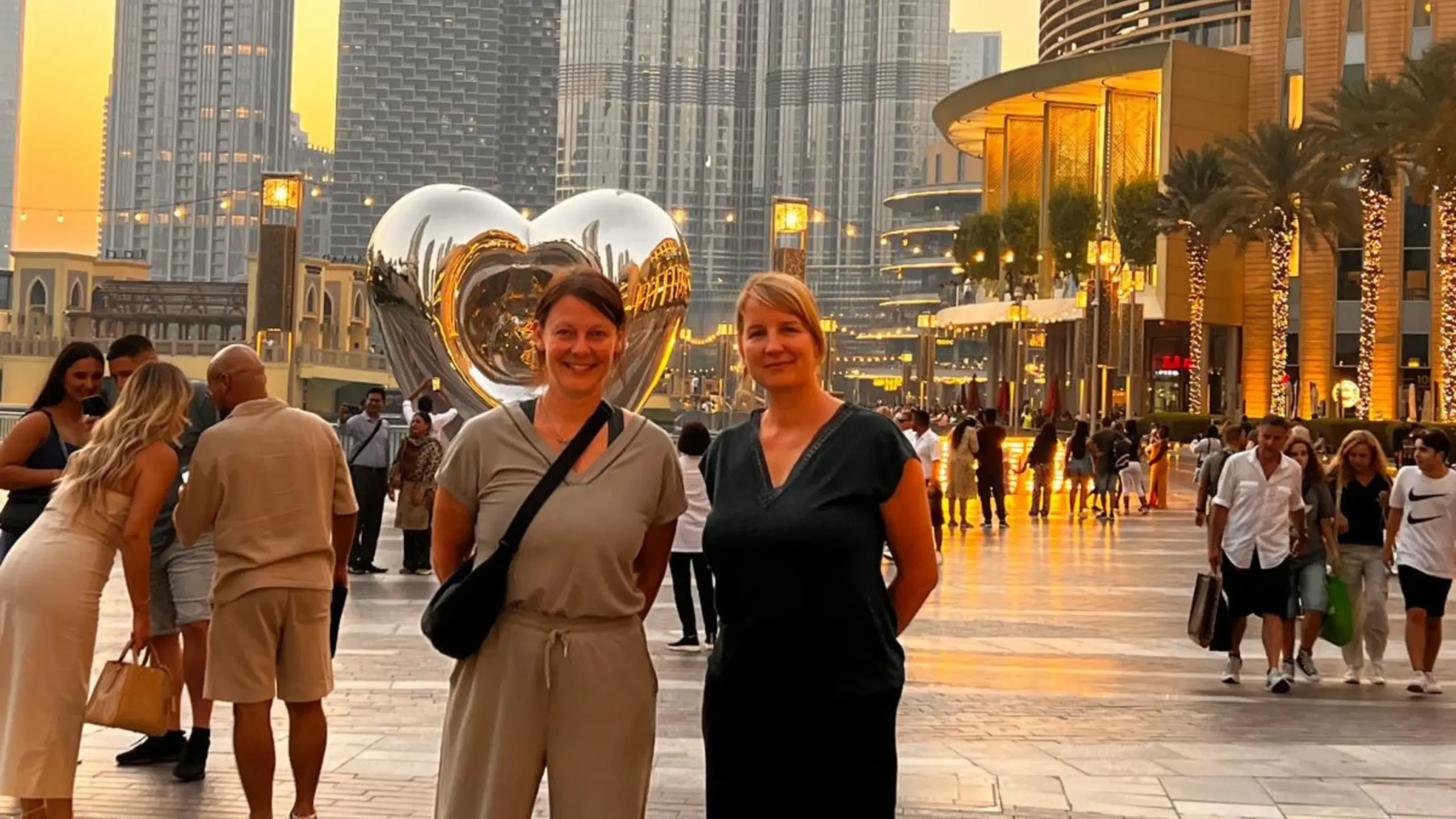
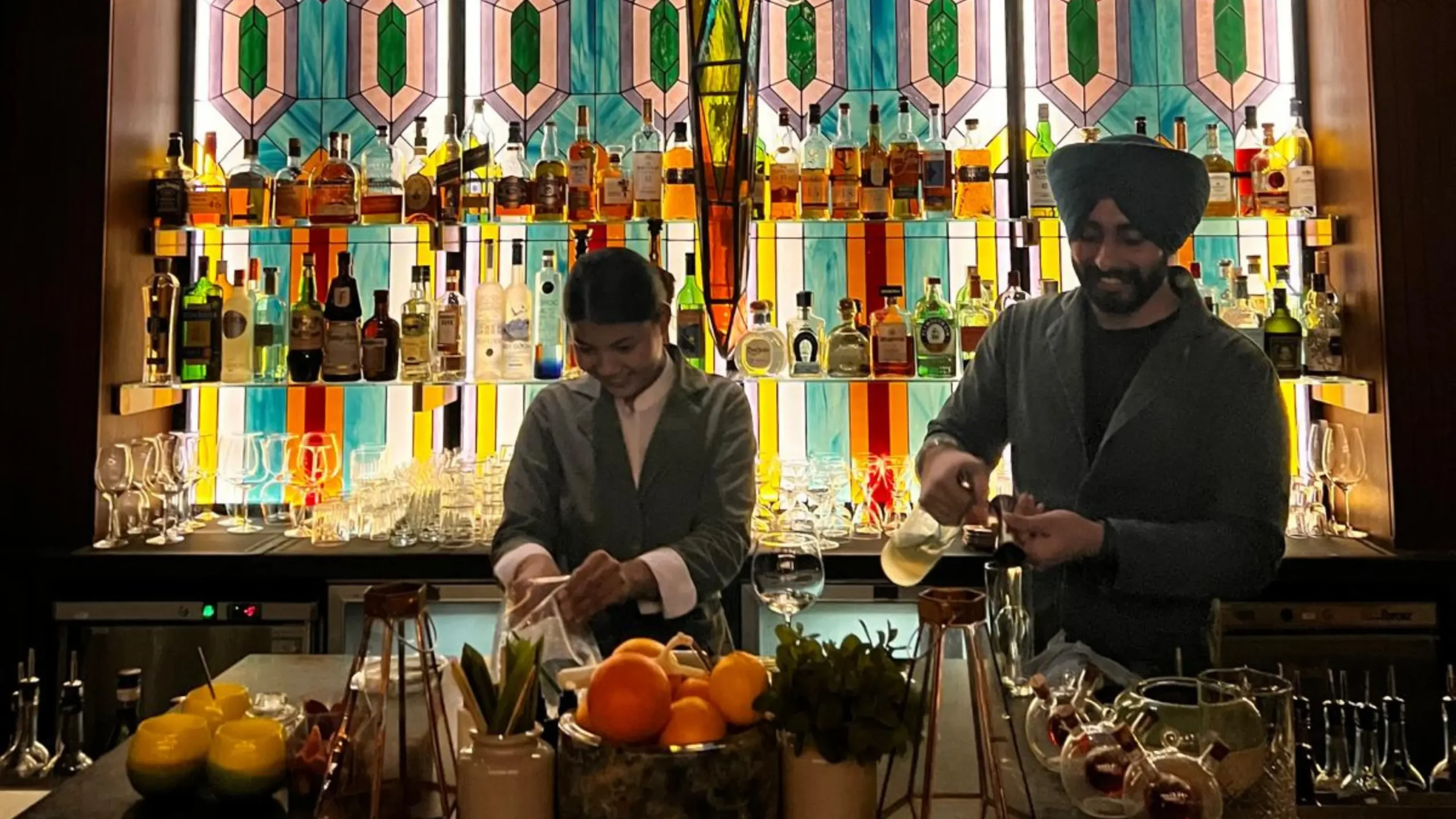
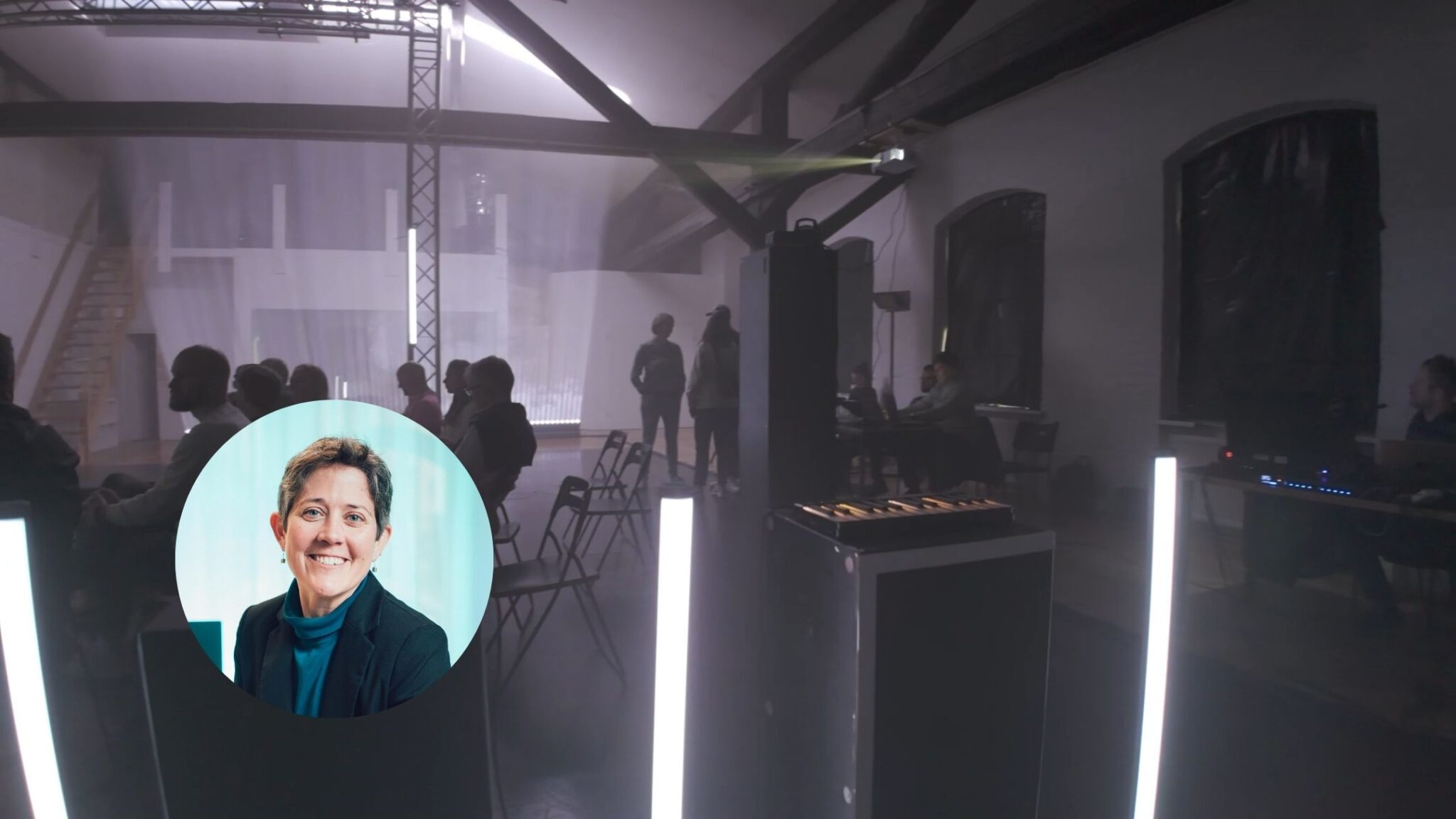

By Ky Lloyd
Absolutely. Our Kreuzberg studio was more than just a workspace—it was a creative hub where we rehearsed, trained, and collaborated. It was a place that allowed ideas to flourish, and it holds countless memories of breakthroughs and milestones.
It wasn’t easy, but as our projects grew in scope and diversity, we realized that a single space was no longer meeting our needs. We needed more flexibility to choose locations that would best support the unique demands of each project.
The impact has been significant. By not being tied down to one location, we can now select the perfect environment for each project, whether that’s a high-tech studio or an unconventional venue. This adaptability has allowed us to stay agile and responsive, which is crucial in an evolving industry.
The demand for more agile, efficient ways of working is growing, and our shift is a direct response to that. By embracing flexible spaces, we’re positioning ourselves to not just keep pace with these changes but to lead in how creative agencies adapt to new challenges.
I’ll miss the sense of community and the memories we built there, but I’m genuinely excited about the possibilities ahead. As someone who draws energy and inspiration from architecture, I’m eager for the new creative impulses that come from working in fresh spaces. Ultimately, this move opens BRS to more innovative approaches and lets us tailor our environments to support each project’s unique creative needs.
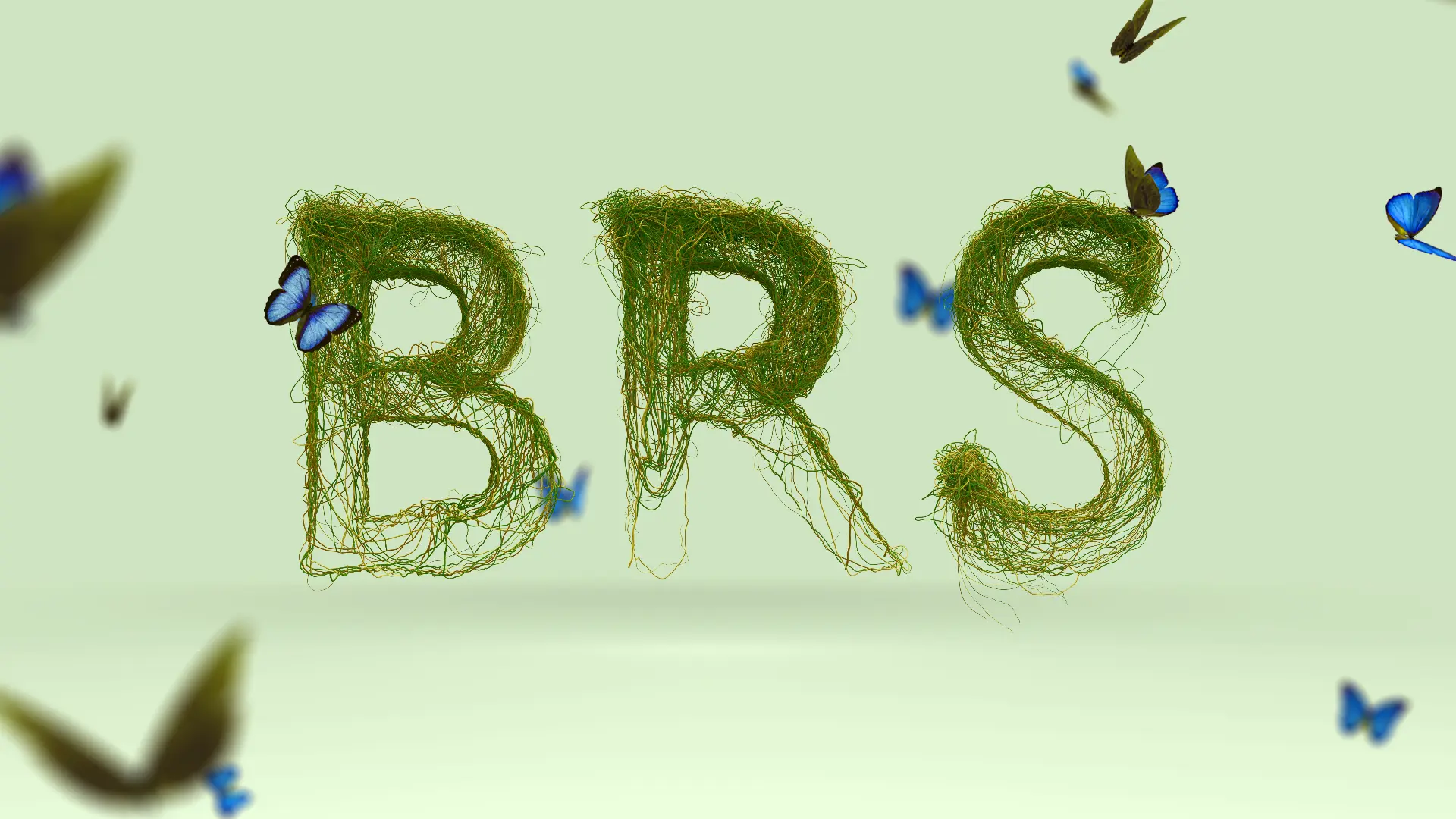

By Ky Lloyd
Credits ©
Artwork – Sofia Silva
More than ever, companies are being called on to adopt sustainable measures in a global effort to combat climate change. Decisions – large or small – can drastically impact one’s carbon footprint and help turn the earth into a greener, safer place.
In event production, we know firsthand how large-scale products can accumulate a large environmental footprint but as a leader in the field, we’re committed to remaining and improving our sustainability measures. Below are ways we’re making changes to our events, and how we’re already pulling them off.
1. Working with sustainable clients
Choosing the right partners to go green can help make for a winning green team. In a recent event, we worked with a sustainable-conscious client to produce biodegradable and recyclable products printed lanyards for 300 attendees.
2. Digitize your event
Using digital solutions such as QR codes and virtual tickets helps to minimize physical waste and paper usage. At a recent conference, we implemented QR code check-ins, which reduced paper waste by 70% compared to traditional methods.
3. Limiting Plastic and Single-Use Waste
Waste can easily accumulate for an event, so finding key areas to eliminate the usage of single-use plastics or paper is important. In one event, we worked with our partners to ensure our catering products for our crew and audience did not include single-use plastics and opted to use washable plates, cups, and cutlery where possible.
Another way to limit waste is choosing practical, sustainable, or biodegradable giveaways for the audience. In one of our previous large-scale events, we gifted branded refillable metal water bottles to people to use long past the event.
4. Go Local
Transporting resources can quickly add up and contribute to our carbon footprint. In a global event activation, we utilized local production companies, almost eliminating the need to transfer goods from one location to the next.
5. Rent where possible
Instead of buying new items, we first look to see if renting or using in-house materials can be an option for our team.
6. Choosing Green Methods of Traveling
Promote green travel choices to your team, your client, your suppliers, and your attendees. Where possible, we actively encourage our teams and participants to use greener methods of transportation like commuting via trains or buses over short flights.
7. CO2 Compensation
We’ve partnered with CO2 Positiv to analyze and offset emissions from all aspects of our business. This includes our facilities, travel, and purchases.
8. Upcycling and Recycling Event Materials
Work with organizations to upcycle materials post-event. For a recent workshop with 300+ attendees, we decided to donate unused items to local schools or non-profits. We also made the choice to change from individual packages for our guests to “creative material islands” that were shared among attendees, reducing waste significantly.
In another event, we also donated excess food to local shelters or food banks to further reduce waste.
9. Talk about it!
Share your sustainable practices with clients, teams, and suppliers. Our clients are firm partners in our events and key supporters, so we report on key sustainability points from their events.


By Brendan Shelper
Credits ©
Photography – Marcus Zumbansen
As brands seek more meaningful ways to connect with their audiences, the shift toward experiential marketing is gaining noticeable traction. The appeal of the immersive nature of these experiences offers a counterbalance to digital noise, providing a memorable touchpoint in a consumer’s journey.
Our work propels us to bring a brand world to life. We accept the challenge of distilling the essence of a brand — its story, values, and unique attributes — and creating a physical, real-world environment that consumers can engage with.
The tangible touch of in-person engagement holds unparalleled power. Human beings are sensory creatures, and when we can see, touch, hear, and even smell a brand, it resonates more deeply. This multi-sensory approach creates richer experiences, fostering stronger emotional connections and lasting memories.
When consumers step into a brand’s world, they aren’t just passive observers — they become active participants. Whether it’s the thrill of a live event, the comfort of a well-designed space, or the delight of discovering new product features in an interactive setup, active participation evokes emotions from our guests that are more likely to be remembered, cherished, and most importantly, shared.
Studies in neuroscience have shown that multi-sensory experiences enhance memory retention. When multiple senses are engaged, the brain creates stronger associations, making the experience — and by extension, the brand — more memorable. Our projects often involve a combination of visual spectacle, tactile elements, and immersive soundscapes simply for this reason. Engaging physically with a brand helps consumers build a personal connection to form a bond through shared experiences with like-minded people. For instance, an immersive event where a consumer is surrounded by other supporters can transform casual interest into deep brand loyalty.
The ultimate goal of any brand engagement is conversion — whether it’s through sales, sign-ups, or social shares and physical, immersive experiences can lead to higher conversion rates when done right. By focusing on understanding the audience and knowing how to engage them authentically, we gain consumers who experience a great brand world who leave feeling a genuine connection and understanding of the brand’s value.


By Ky Lloyd
Credits ©
Photography – Koone Chris Kuhnert
We’re constantly exploring ways to blend technology, storytelling, and human experience to create unforgettable events. Our focus is on crafting immersive activations that transcend the ordinary, using the latest audio-visual technologies to create enduring memories and ignite engagement.
Balancing time and budget constraints while adding new tech is definitely a challenge. It requires a lot of planning and collaboration with tech experts to integrate innovation into our narratives.
One exciting aspect is empowering attendees to influence live events through their interactions. In past events, we used dynamic lighting not only to captivate audiences but also to give them a measure of control over the event atmosphere. This direct interaction enhances the overall immersive experience, making each moment resonate longer.
There’s a few we’ve tried! We’ve implemented websites that allow attendees to upload content in real-time, that are then woven into creative video mosaics that evolve throughout the event. Additionally, we incorporate analog elements that attendees can shape and adapt during the event, creating legacy items that can make the event more memorable.
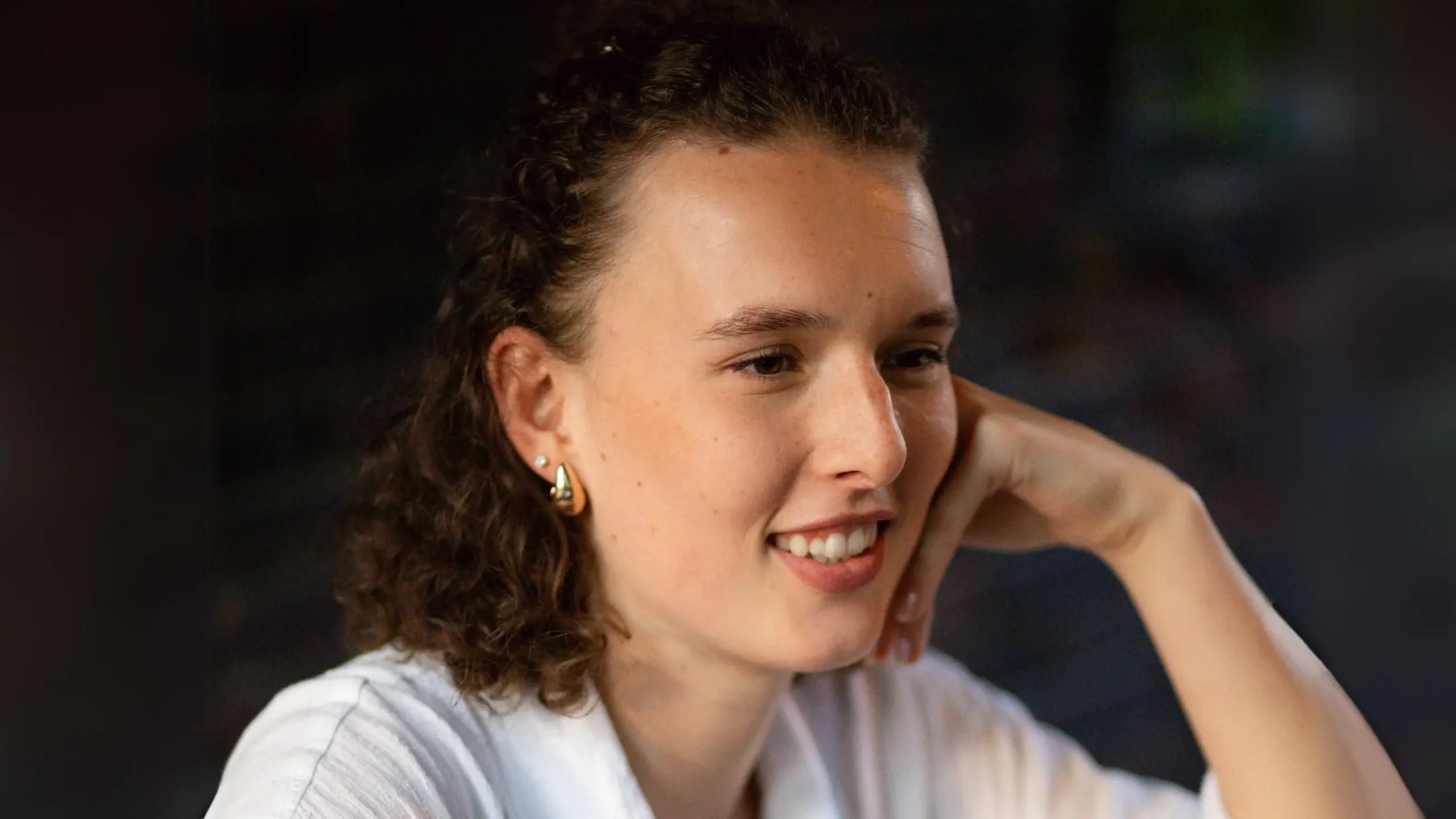

by Kaya Kepper
Credits ©
Photography – Claudia Greco
It was great! I primarily worked in the project management department as a runner where I received specific tasks within a department and focused on them during set time slots.
I was worried at first because I was expecting long working hours and stress on spontaneous tasks, but it was much better than I expected. The teamwork was excellent, which just led to an overall positive atmosphere.
I liked the ‘day out’ meetings where we often dined together in the evenings and how we ended the event with a celebration. It just made it feel more personal than just work interactions.
I wished I had been at Battle Royal Studios longer! I felt the pressure to learn as much in one week as you would in six months. It would be more beneficial to suggest to universities that students need longer practical experience since what we learn in school versus on-site are very different and pratical experience would be more beneficial.
Learning happens a lot faster in an on-site environment compared to theoretical studies. Events at a creative agency like Battle Royal Studios have a more creative aspect, which makes them stand apart from conventional event management that schools teach about.
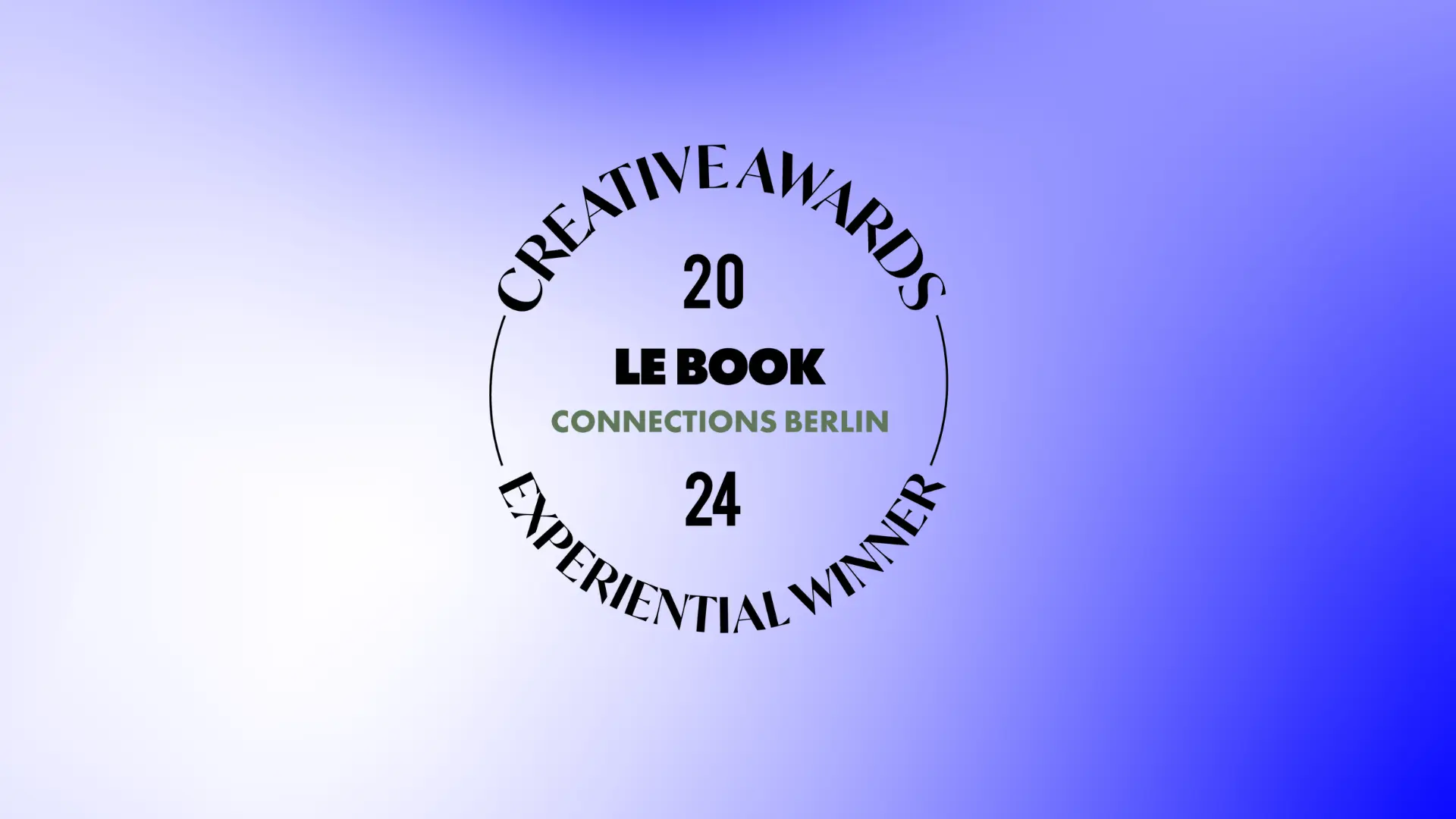

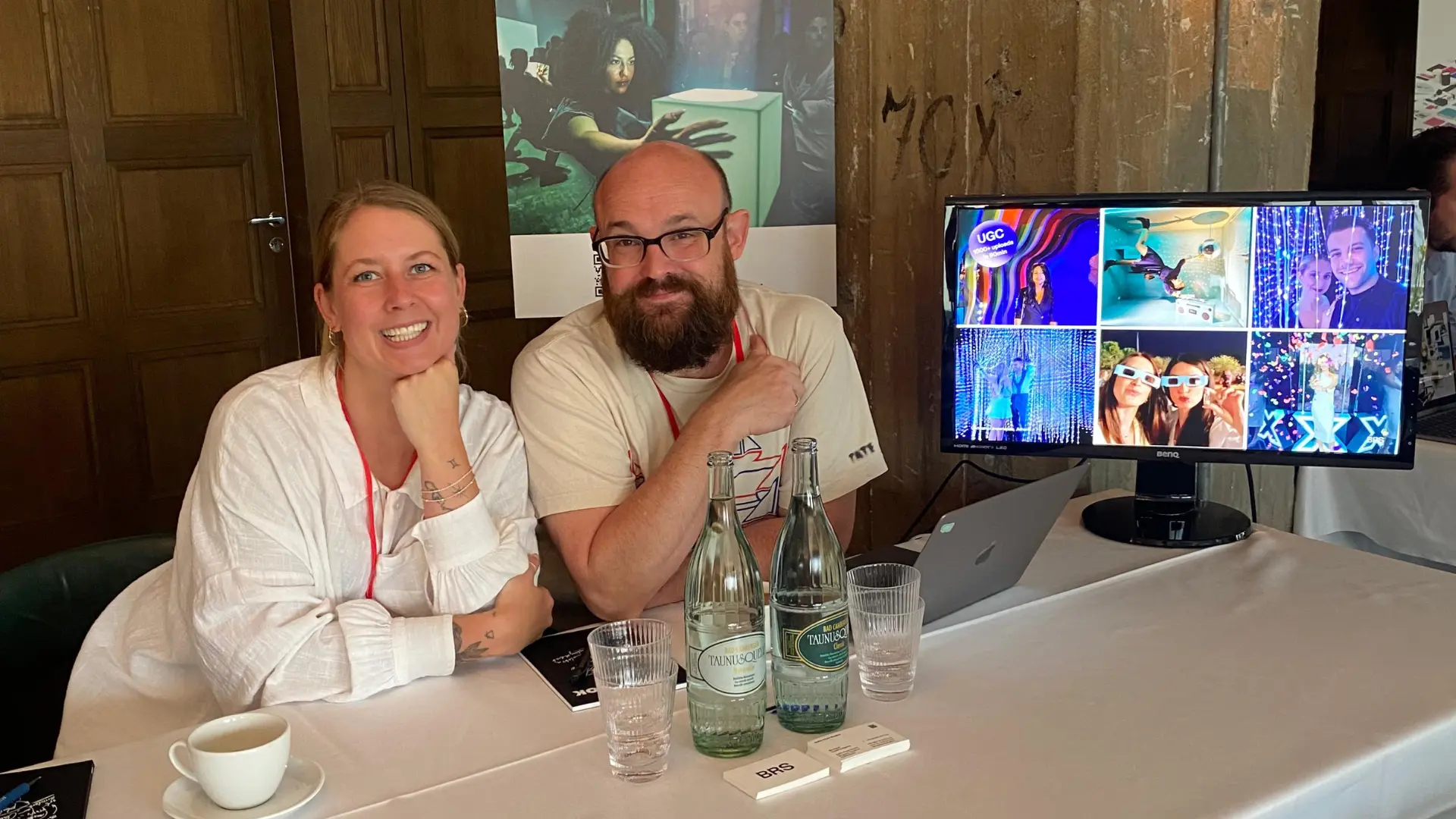
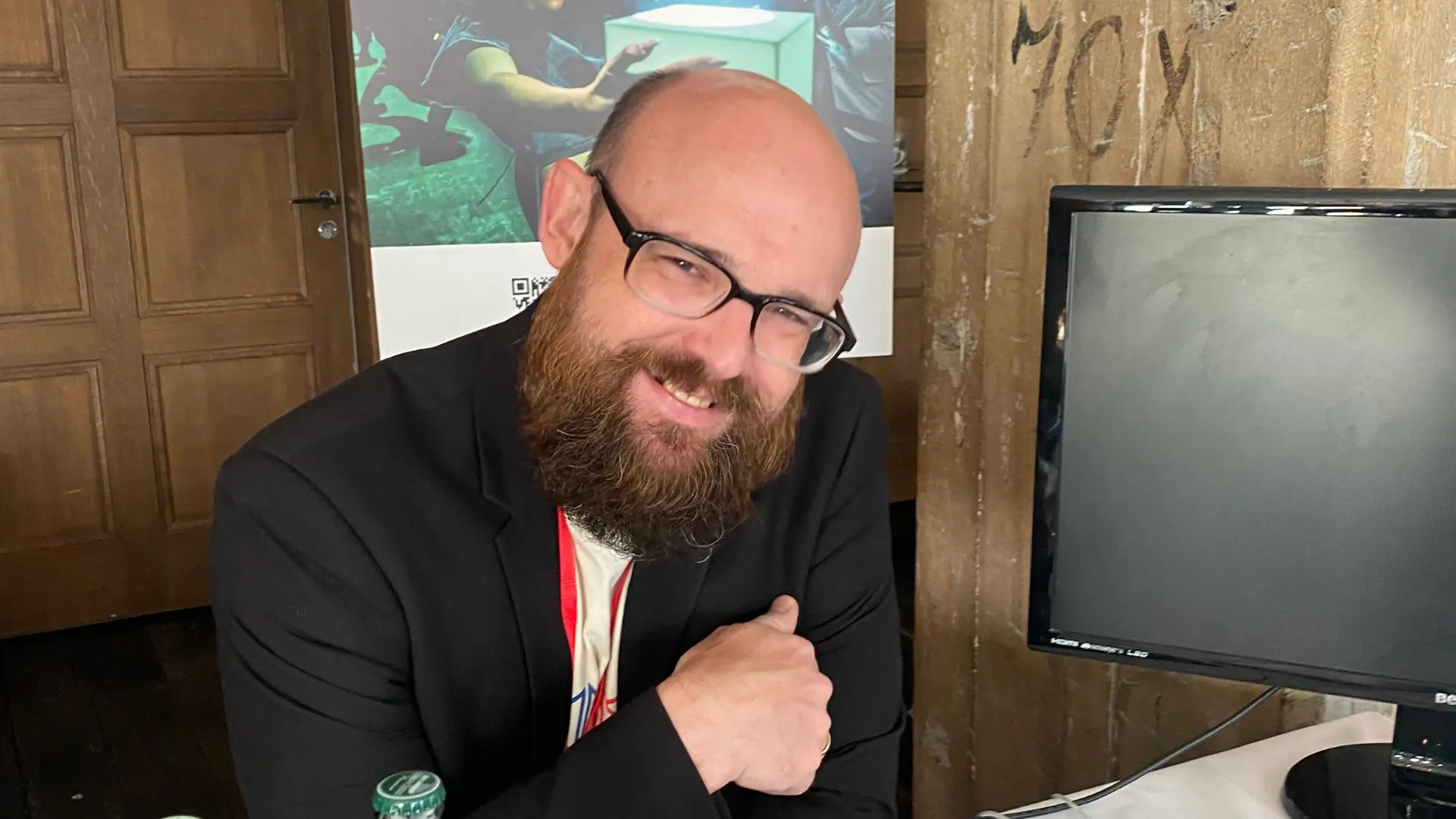
We’re honored to be a recipient of the 2024 LE Book Awards, in its “Experiential” category, for our project, Kraftwerk!
The groundbreaking project brought a sensory adventure of taste and flavour to 2,000 guests in Berlin, Germany that led to the highly anticipated reveal of the brand’s products.
Is an industry-wide recognition highlighting creative innovation and design in the creative industry. In its decision, LE BOOK points to the event’s cutting-edge innovation and creative storytelling. “By seamlessly integrating interactive installations, immersive performances, and sensory experiences, BRS created a product launch that was both engaging and unforgettable. This holistic approach ensured that attendees left with a strong, positive impression of the brand and its new product, solidifying their connection and loyalty.
Our experiential take on the Athens project also received a nomination as well. The recognition demonstrates our creative studio’s innovative leadership in the industry and highlights our commitment to delivering excellence in our events.
Our talented team is ready to continue creating award-winning immersive experiences that leave a lasting impact
Co-CEO/Managing Director – Judith Hoch
Executive Creative Director & Producer – Brendan Shelper
Event Producer – Moritz Borchardt
Head of Production – Ky Lloyd
Creative Director – Jon Buckels
Architect – Philipp Hohmann
Creative Producers- Catherine Hayward, Andy Machals, Emily Landers
Project Managers- Nadine Leder (Crew, Promoters, Logistics), Thalia Davies (F&B, Artists)
Project Coordinators – Alessia Avallone, Paula Dickmann
Back Office – Susana Beiro Shelper
Technical Director – Adhoc, Malte Joergens
Technical Managers – Marcel Reichelt, Hendrik Fabri, Kalle Reichert
Head Sound Engineer – Ben Kästner
Video Technical Manager – Peter Gombac
Show Caller, Director – Konstanze Agatz
Stage Managers – Florian Bücking, Laura Hähnel, Rebecca Bryant, Rich Herrick
Lead Motion Designer – Duncan McDade
Motion Designer – Achilleas Gatsopoulos
Video Producer – Stefan Spendier
Video Mock Up Artists – Daniele Bonaiuti, Dario Lospino
Audio Producer & Composer – Deimos Virgillito
Costume Design – Isabel Seidler
Tailor & Fittings – Anna Dyka
Hair & Make-up – Elisabeth Petrou
Scenic Consultant – Cordelia Ashwell
Graphic Design – Robert Gross, Sofia Silva
Lighting Designer – Chris Moylan
Light Operators – Daniel Gündner, Sebastian Huewig
Sound Technicians – Jan Wessolowski, Niko Karp, Mike Walter
Choreography & X-Crew Coordination – Terry Stewart
X-Crew Team- Billie Vee, GeroginaKotrostou, Eleanna Zoi, Danai Marques, Foteini Dritsakou, Anna Athanasiou, Abe Cohen, Alex Ennea Vangelis, Adonis, Konstandinos Katsoudas, Yannis Vasiliathis, Elena Evangelia
Accountant – Liane Hutterer
Traffic Coordinator – Gerrit Hotzel
Photography – Marcus Zumbansen
Acts- Konstantinos Argiros, Eleni Foureira,Pavlina Voulgaraki, Good Job Nicky
No/MAD Booking & Production – Dominik Lissl
Tour Manager – Martin Kultscher
DJs- Echonomist, Kid Angelo
Argiros & Foureira team:
FOH Engineer – Ilias Lakkas
Monitoring Engineer – Alexandros Kyrlis
Lights – Menelaos Orfanos
Manager of Konstantinos Argiros – Pavlo Argiros
Manager of Eleni Foureira – Haris Papatzanis
Manager of Good Job Nicky – Giannis Theodoropoulos
Manager of Pavlina Voulgaraki – Dimitris Ganios
Chef – Dimitris Skarmoutsos
LED Wristbands – Pixmob
Drone Show Europe by Spectrum Production
Fountains at the Ellinikon Experience Park’s Water Maze by Fontana Fountains
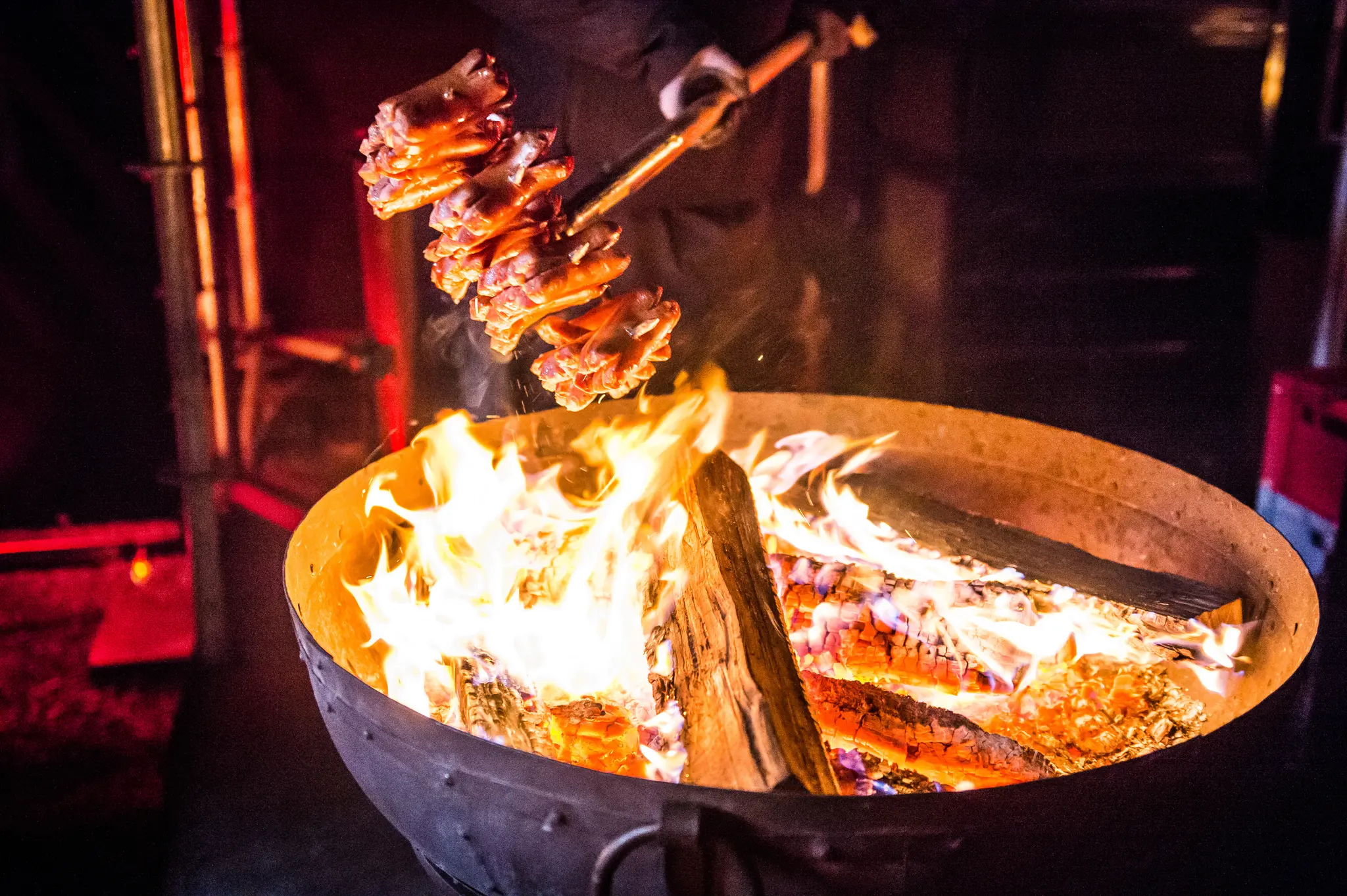

by Janina Schaffrath
Imagine a chilled gazpacho served as a refreshing starter on a hot summer evening. The cold temperature accentuates the crisp, fresh flavours of tomatoes and cucumbers, setting the tone right to a warm, comforting main course where the heat amplifies the rich, savoury flavours.
Incorporating temperature variations into event marketing requires a deep understanding of how heat and cold interact with different ingredients. Cold foods tend to numb our taste buds, reducing our ability to detect sweetness and saltiness while warm foods enhance the perception of these tastes, making flavours more pronounced.
Temperature, when used thoughtfully, enhances the narrative of a brand activation.
It works in tandem with other sensory elements like visuals, sounds, and textures to create a cohesive and immersive experience. Our approach ensures that every aspect of the event, down to the temperature of the food and drinks, is meticulously curated to align with the brand’s story and message, offering a holistic sensory journey that leaves a lasting impact.
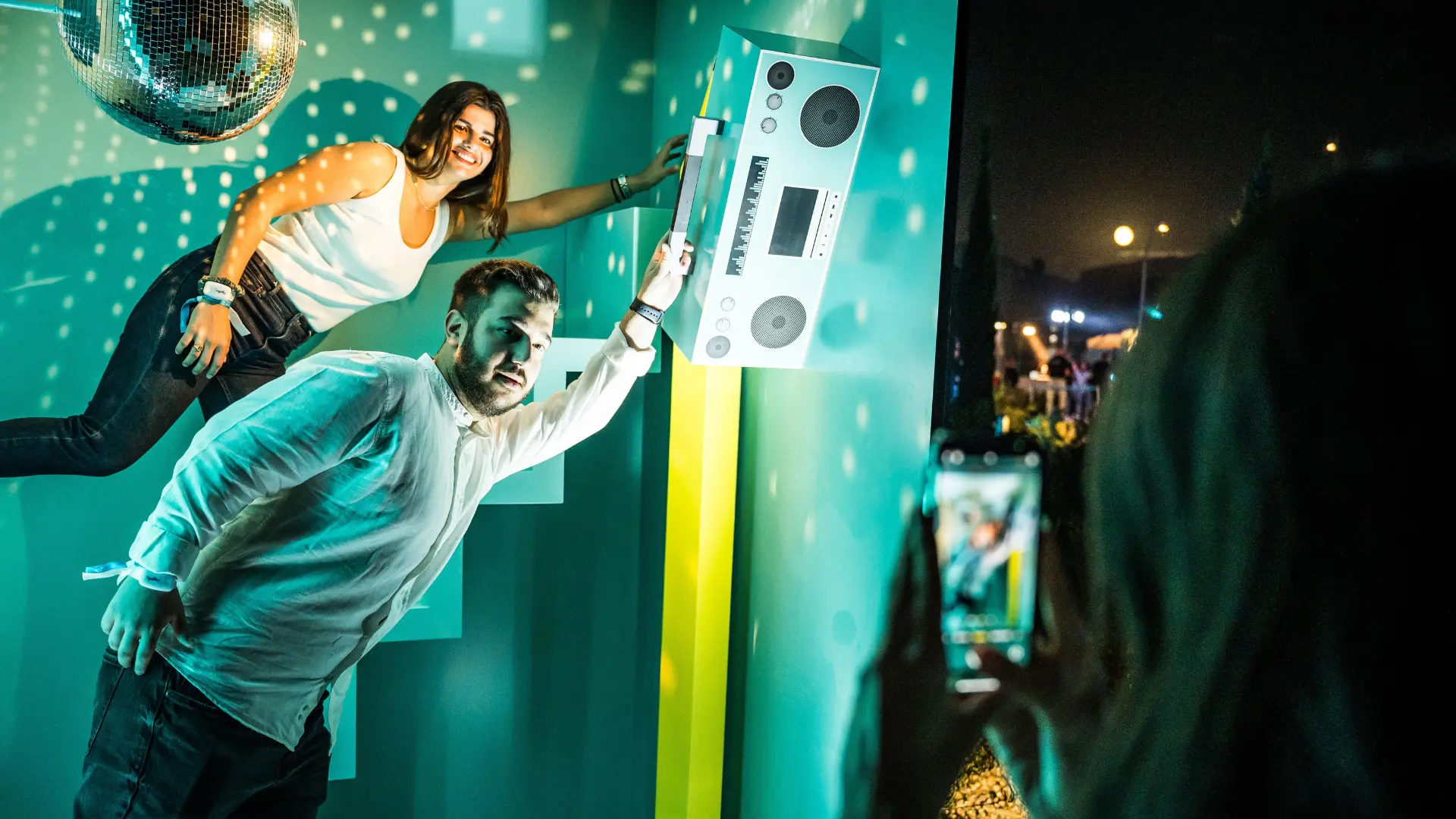
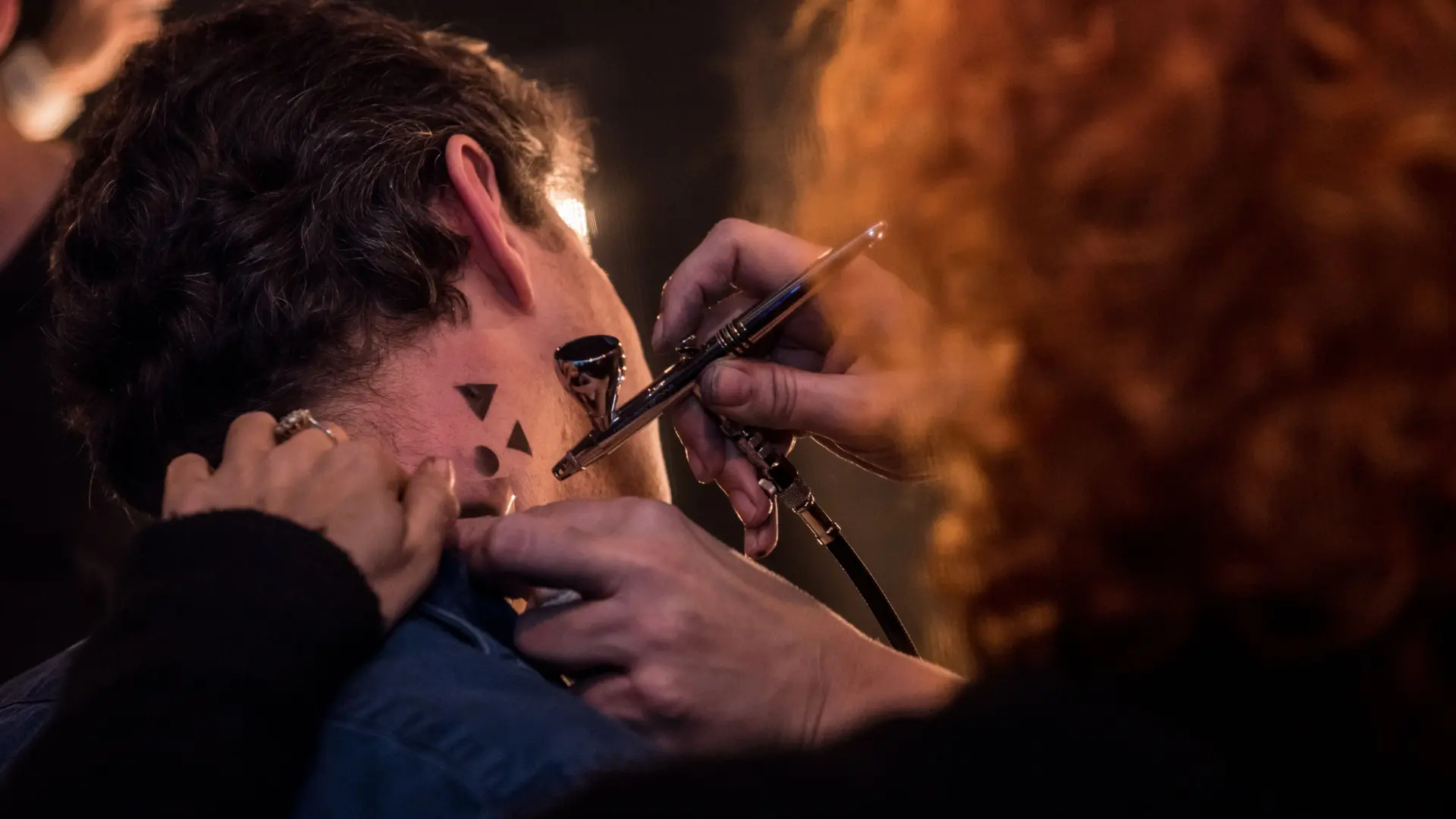
By innovatively using temperature, our partners can create a dining experience that engages guests’ palates in unexpected ways.
In the end, food is never just about food; it’s about creating moments to remember.
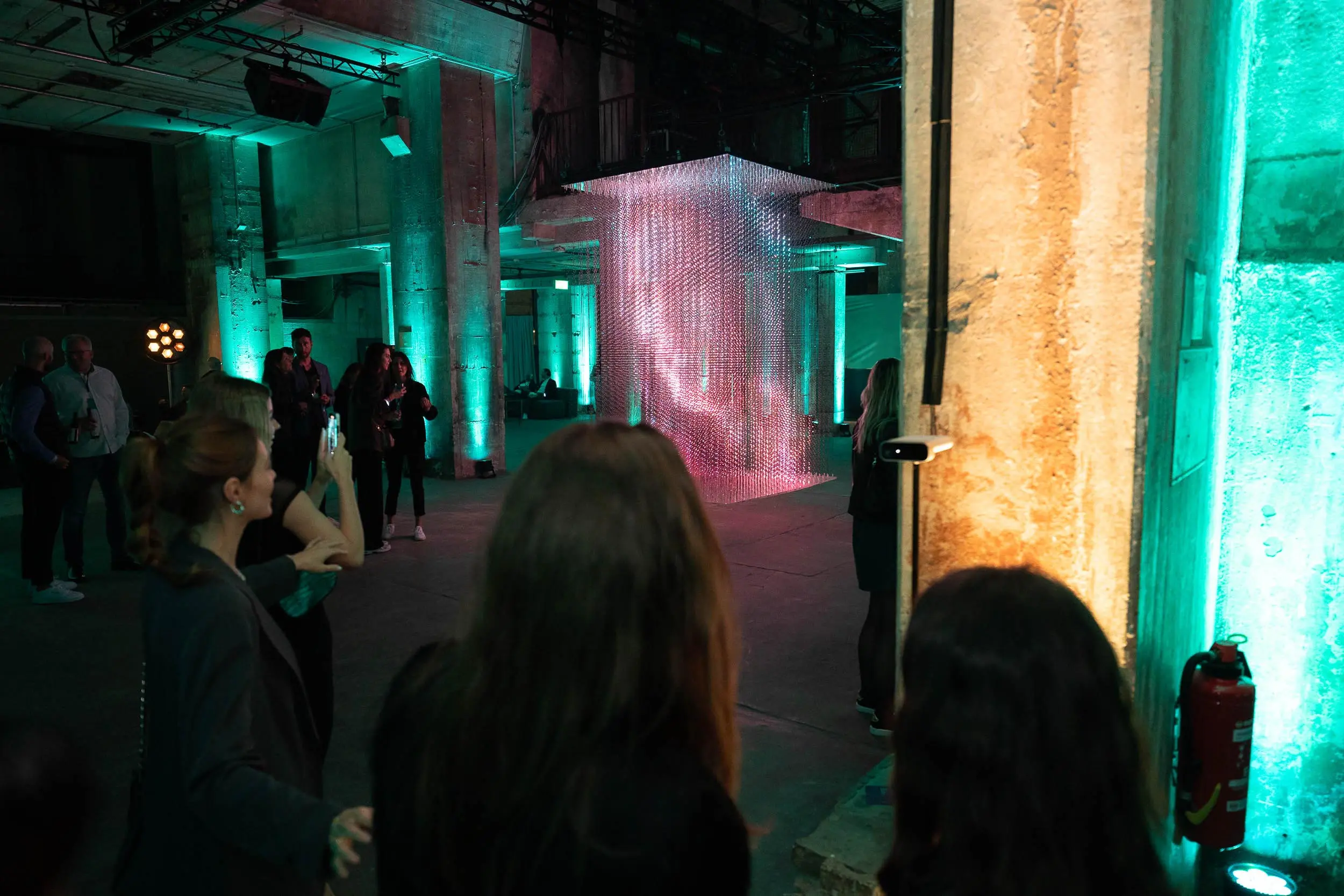

By Brendan Shelper
Credits ©
Photography – Marcus Zumbansen
Humans are inherently inquisitive, drawn to the unknown and the promise of discovering something new. At BRS, our approach to curating spaces revolves around the concept of “breadcrumbs” – subtle hints and clues that encourage exploration and immersion into the brand story or event themes.
This method not only informs the event design but transforms passive observation of our guests into active participation, fostering a deeper connection between the audience and the narrative.
The psychology behind this approach is rooted in the principles of cognitive engagement and emotional resonance. Quite simply, when guests are invited to explore on their own through making choices and accessing a hands-on experience, they become more invested in the activity and absorb more information.
We consider these key elements when curating interactive and immersive event spaces:
One Narrative: Ensure that every element of the space contributes to the overall narrative by having consistency in theme, style, and messaging. This creates a cohesive and compelling story that resonates with guests.
Interactive touchpoints: Incorporate relevant interactive elements that respond to guest actions such as touch-sensitive AI driven installations or physical interactions with real actors. Each touchpoint could offer a new layer of the narrative or brand story to the overall experience.
Guided discovery: While the goal is to encourage self-guided exploration, subtle guidance is essential to ensure guests don’t feel lost or overwhelmed. This can be achieved through strategically placed audio cues, lighting, or real actors within the space.
Multisensory engagement: Engage multiple senses to create a more immersive experience. Visual stimuli are powerful but combining them with other senses like sound or smells can make it more memorable.
Dynamic spaces: Design spaces that are dynamic or responsive. This adds an element of surprise and keeps the experience fresh, encouraging repeat visits and prolonged engagement.
Here’s a few case studies from previous BRS projects that support our approach.
In Berlin’s Kraftwerk, we transformed every attendee into an active participant in the brand’s narrative using LED wristbands and a volumetric light installation. The highlight of the event was a colossal LED cube lifting to unveil the product lounges beneath, leading eager guests to explore and interact with new devices. The event played out in three distinct phases, read more here.
In this event, we transported attendees from a historic industrial site to a symbol of modern sustainable manufacturing. The journey included a driving experience through the heritage site in cologne in a fleet of new Ford EVs, arriving onto the new multibillion Euro EV assembly line, to witness a full factory transformation, showcasing Ford’s commitment to sustainability. In a massive display of immersive lighting, over 300 LED titan tubes and a 30m LED screen flipped the ON switch for the rejuvenated heritage factory, embodying Ford’s vision for the start of their electrification of Europe.
As tech advances and audience expectations evolve, the future of curated spaces lies in the seamless integration of digital and physical elements. At BRS, we’re developing our own intuitive event assistants that not only brings the guests closer to the narrative and brand story but can spark interactive brand engagement and loyalty programs.
Our commitment to innovation and storytelling will continue to drive us as we create experiences that captivate and inspire our audiences.
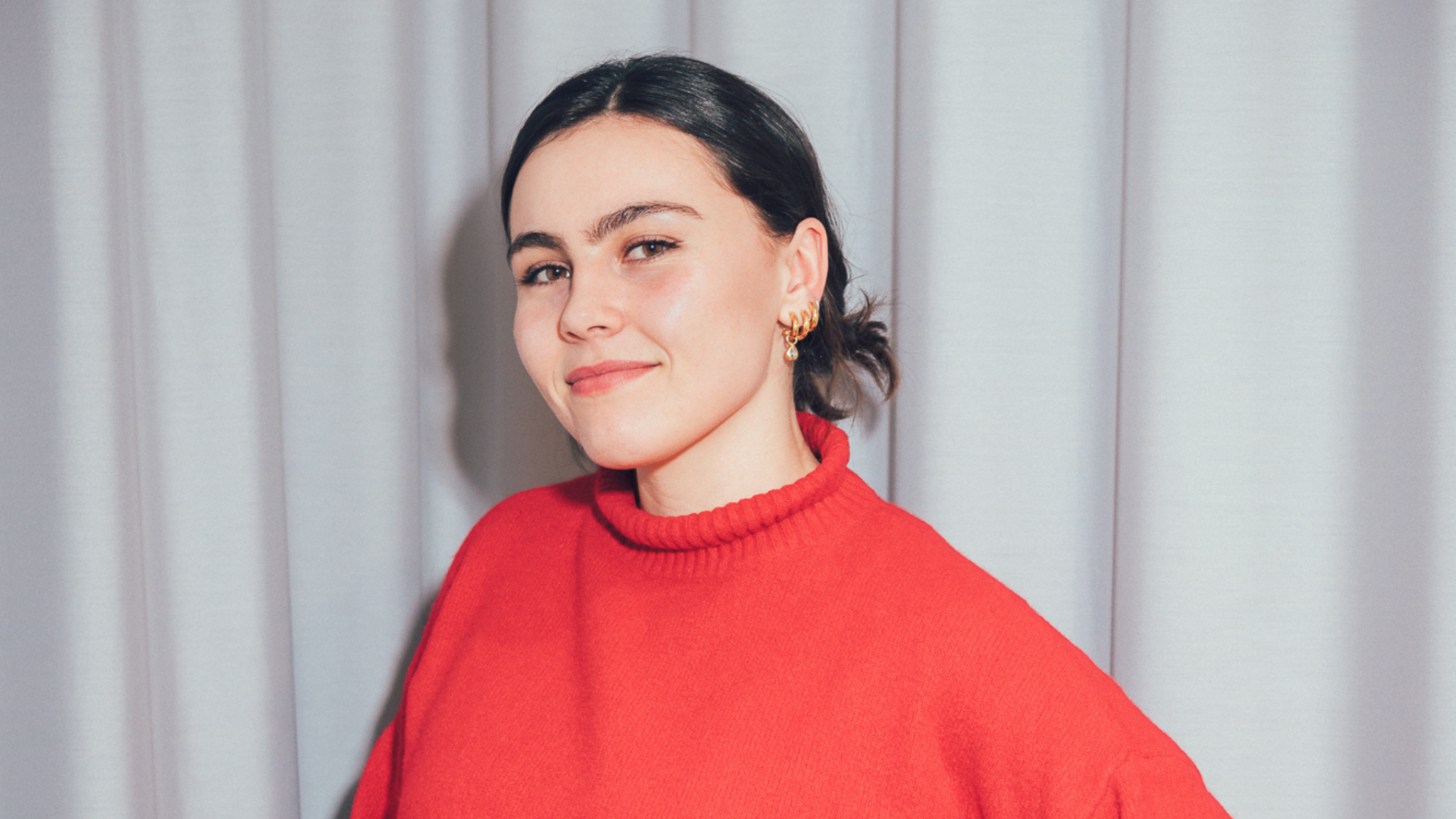

by Alessia Artikel
Credits ©
Image- Koone Chris Kuhnert
Australia is an amazing country with abundant nature and culture waiting to be discovered. Driving around in a camper van, enjoying sunsets at the beach, watching sunrises alongside wild kangaroos, and exploring the culture of the Aboriginals is incredibly exciting.
One of my most memorable experiences from my travels in Australia was witnessing the New Year’s fireworks in Sydney in front of the Harbor Bridge and the Opera House. Experiencing it was truly magical and it made me think about the event agency responsible for producing the New Year’s show. Working in this business means constantly analyzing other agencies’ creative strategies and learning from each other’s mistakes and advantages.
Being alone on a different continent, far away from home, and dealing with a major time difference taught me to find solutions and make decisions independently, without relying on friends and family for advice.
During my development phase as a project coordinator, I learned to express myself and communicate my needs and thoughts clearly which improved my way of working. I had the amazing opportunity to work abroad with a local event agency as a project coordinator.I was engaging with suppliers, obtaining quotes, and collaborating onsite with the local team that provided a valuable learning experience for me.
I was so surprised how welcome and friendly everyone was. I’ve observed that Australians tend to cultivate a more laid-back and relaxed vibe at work, which is different from what I’m accustomed to in Germany. There’s a greater focus on building a positive work environment here, often through social gatherings and team-building activities, which was refreshing to experience.
I’ve also observed that Australians place a strong emphasis on achieving a healthy work-life balance. They often offer flexible work arrangements, opportunities for remote work, additional leave days for birthdays, and special social holidays, all contributing to a more relaxed and enjoyable work environment.
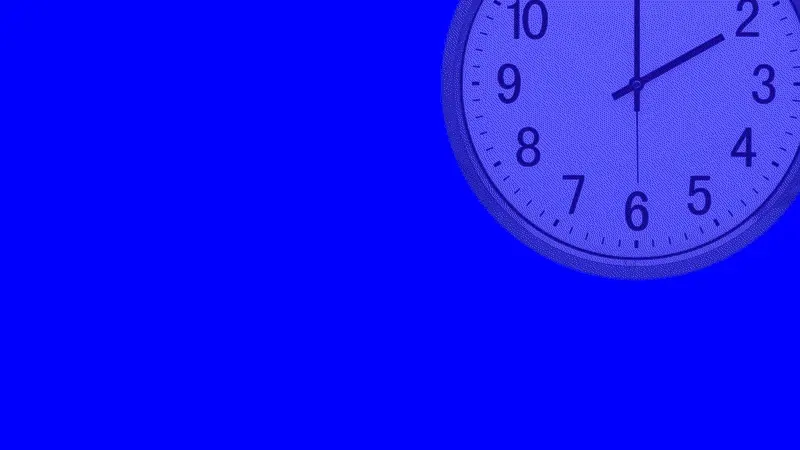

By Alessia Artikel and Ky Lloyd
Alessia: During my time abroad in Australia, I experienced a significant time difference compared to Germany, with the maximum gap of 10 hours during the German winter. My motivation for working remotely was to gain more work experience abroad and to get some extra income.
Ky: I recently experienced the challenges and rewards of remote work across time zones firsthand while working from the West Coast in the United States of America while based in Berlin.
Alessia: Working across different time zones allowed me to complete my tasks without interruptions. Often, I would receive tasks or briefings from colleagues during the night in Australia and work on them during the day, enabling my colleagues in Germany to have all the necessary information during their working hours. It felt like two gears seamlessly interlocking, working together to efficiently accomplish tasks and reach our goals. This arrangement felt incredibly productive to me.
Ky: Balancing family time with work commitments proved to be the most significant challenge, given the 8-hour time difference between the West Coast USA and Berlin. To align with Berlin working hours, I opted to work from 1 AM to 10 AM USA time, leading to confusion, especially with my child, who couldn’t understand my unconventional schedule.
Despite efforts to maintain a presence during active team hours, the double workload of completing tasks at the start of the USA workday took its toll. Sleep deprivation and strain on family dynamics outweighed the benefits of real-time interactions with the team.
Alessia: Working across different time zones can be manageable for a certain period depending on the role one holds. Clear and concise briefings are crucial to ensure smooth workflow and prevent any hindrances or delays.
Ky: While remote work across time zones offers flexibility and opportunities for collaboration, it’s essential to carefully consider the implications on personal well-being and family dynamics. My experience has highlighted the importance of balance and clear communication in navigating remote work effectively.
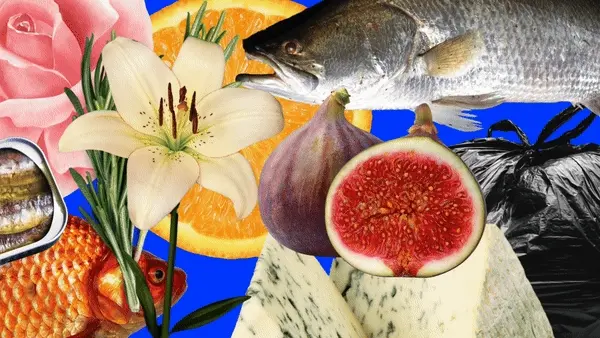

by Karla Menzel
Brands are beginning to understand the importance of scent in immersive experiences. For example, when artist Sissel Tolaas used David Beckham’s sweat to craft cheese for VIPs at the London Olympics to then making blood-and-money scents for Balenciaga’s fashion show in 2020, Tolaas intentionally leveraged the powerful tool of smell.
Smell affects mood, memory, and emotions, making it a powerful tool for building brand loyalty. Studies show that customers are more likely to buy and pay more in fragranced environments, and can better remember brands when associated with pleasant smells.
However, the integration of scent goes beyond mere consumer attraction—it taps into the primal areas of the human brain. The olfactory bulb, which processes smells, is directly connected to the limbic system, the part of the brain responsible for emotions and memory. This deep connection explains why a particular scent can evoke vivid memories or emotions, making it an exceptionally potent tool for brands aiming to create lasting impressions.
By creating emotional associations, this technique leverages the sense of smell to influence consumer emotions and behaviour, shaping stronger sensory memories and strengthening the bond between the brand and the consumer.
Engaging multiple senses helps our activations stand out by creating lasting impressions and enhancing the overall brand experience.
In addition to scent, other sensory elements can also be integrated to craft a more immersive experience. Visuals, sound, and even tactile feedback work in harmony to create a multi-sensory environment that fully engages the consumer. For instance, we are experimenting with scents and special effects, like simulating a summer rain shower where you can smell and taste the freshness after a storm. This creates a tangible bond to the moment, enhancing the overall experience. The use of synchronized soundscapes can enhance the mood set by fragrances, while textured materials can provide a tactile connection to the brand’s narrative. This holistic approach ensures that each interaction with the brand is memorable and impactful, driving deeper emotional connections and brand loyalty.
So what are you waiting for? Add smell in your next immersive brand activation with us as your partners.


by Judith Hoch
Credits©
Photography – Marcus Zumbansen
Our aim is to ensure our team remains at the cutting edge of both technology and creative execution. We support a variety of training initiatives in our creative agency such as external workshops on the latest event technology, creative leadership programs, and courses from prestigious platforms like Harvard’s online offerings.
Open dialogues with our team are very important to us. We always aim to understand their views and align their training needs with management’s insights and then we personalize the selection of training courses to match each team member’s role, interests, and career aspirations.
The selected courses aim to enhance both the hard and soft skills of our team members. We are dedicated to fostering a mindset of continuous improvement and agility, ensuring that our team not only keeps up with industry trends but also sets them.
During a major cultural opening ceremony project, one of our core team members participated in multiple coaching sessions as part of their annual training. These sessions were specifically tailored to their evolving role and responsibilities within the project. The coaching had a profound effect on their approach to work, enhancing their focus and management skills, particularly in leading multiple suppliers. The growth of the team members and the successful execution of the project are testaments to the transformative impact of our targeted training efforts.
We foster an environment where technology and creativity complement rather than compete. This culture of curiosity — looking beyond just the task at hand and understanding how colleagues apply their skills — has evolved naturally within our team culture.
We hold weekly meetings that showcase current work but also feature ‘How To’ presentations, promoting knowledge sharing across the team. This integrated environment allows team members to explore new ways of applying their technical skills within creative contexts, ensuring that our innovations are both imaginative and practically executable.
Mentorship is a cornerstone of our development programs. Our new and younger members are paired with seasoned mentors who provide guidance and support throughout their journey at BRS. This one-on-one mentorship helps newer team members navigate their roles effectively, ensuring they apply their training in real-world scenarios and learn from the experiences and insights of their mentors.
Our secret in our creative agency lies in our culture of curiosity and a structured yet flexible approach to professional development. We encourage our team members to pursue their interests within and beyond their professional roles, offering both the time and resources necessary for this exploration. A unique aspect of our approach is allowing team members to dedicate time on a regular basis to research and do training, fostering an environment where continuous improvement is part of the daily routine.
Our strategy combines the balance between creativity and production within our HR processes. We meticulously identify individuals who are genuinely enthusiastic about their prospective roles, ensuring a perfect fit. Once on board, we offer ongoing support and development tailored to their unique aspirations and skills, fostering a culture where personal growth and continuous innovation are at the core of everything we do. ❤️
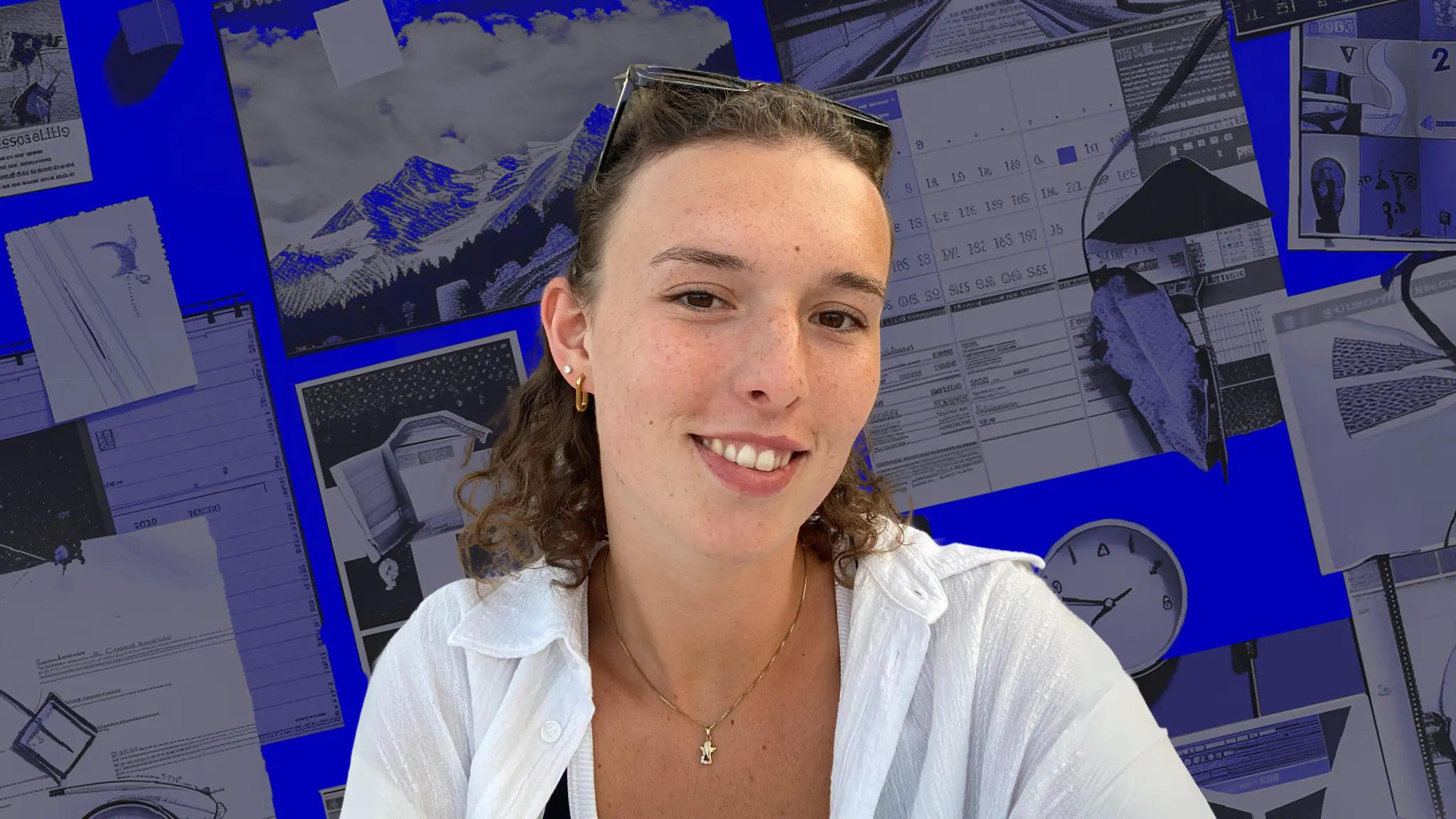

by Kaya Knepper
Credits©
Artwork – Sofia Silva
Most of the time I will help my colleagues with their tasks and lend a hand wherever help is needed. At the event, I will be responsible for the crew check-in, setting up the production office and setting up the crew catering. To be well prepared, I have looked at the timesheets and the various work schedules to get an overall view of the event to know where I must be and what my rough daily schedule will look like. I think that a lot of things will happen on site, and I will learn a lot from it.
I started organizing all kinds of things like school trips and graduation balls and I really enjoyed that. I started working in an event company and that’s how I got into the real industry. I especially liked seeing how a detailed event is created out of nothing from a location and how many components are needed for it that you don’t even think about at first. As I have opted for a dual study program, I ended up at BRS and am learning a lot.
I’m really looking forward to learning more about the whole process of putting on such a large-scale event, especially in an international environment like Switzerland. Working with different people, teams and artists requires a lot of planning so it will be super exciting to see how all the planning turns into a real event. I’m also curious to see how the guests behave and whether their expectations are met.
I’m really looking forward to the event, so I’m very excited to learn a lot from this first experience. As this will be my first major event in this company, I hope that I will get a good insight into the future creative agency industry and hope that it can better prepare me for other events. I hope that I can be of help to people on the ground and provide support everywhere.


by Sarah La Tragna
Credits©
Artwork – Sofia Silva
I’m excited to create an excellent team vibe where everybody knows what his or her strengths and weaknesses are. Our team members have great things to offer, so I’d love to build the team up to the strongest potential each one has.
I love the final picture where everything comes and plays together, but I love leading the team through the journey. There’s always intense creative work,, the technical planning and the production of these events while always keeping an eye on the finances that just excites me.
Touring made me the person who I am. Performing on stage or being a tour manager gave me some of my most hard and happiest lessons.
Every project is so different and I’m looking forward to conquering the challenges in different countries. The trick is to keep everything and everyone on track and happy.
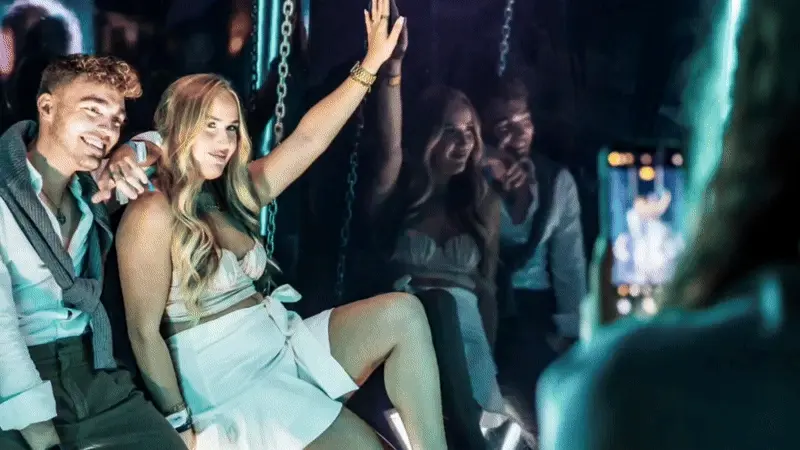

by Jon Buckels
Credits ©
Photography- Marios Kourouniotis, Marcus Zumbansen, Koone Chris Kuhnert
Artwork- Sofia Silva
Consider the most moving film or sound you’ve encountered — what made it resonate so deeply? Often, it’s the interplay of two elements: shadow and light with sound and silence.
From my experience as a dancer, I knew lighting taps into something almost primitive and universal. In the realm of dance, traditional lighting techniques focus on showcasing the precision of movements to keep the dancers safe from falling off the stage or into each other. But when lighting is used to captivate the audience, the potential for emotional connection can be immense. Lighting acts as a bridge, making the metaphoric and grandiose emotions not only visible but palpable.
Distinguishing this as a creative director shaped my approach to using light and content not just as tools, but as emotional alchemists in
immersive experiences.
Well-designed video content is more than just projecting images; it’s about creating emotional landscapes between performers and spectators. The best videos are when the environment becomes a character itself, one that’s capable of telling a story that might not be possible through performance alone.
But it’s not just the imagery alone. In the influence of cinema — with its powerful scoring and cinematography — we see how instrumental both visual and auditory cues are in storytelling.
In immersive design, it is the same. A successful live event is still a carefully crafted symphony of sound, dialogue, and visuals that evokes the right emotions.
By integrating cinematic techniques in live events, we can transform spectatorship into an immersive spectacle where every attendee not only watches but feels the narrative unfold around them
The magic blend of lighting and video content lies in its ability to craft experiences that are as moving and transformative as any great film or song. As creators and designers of a digital creative agency, our challenge is to harness this potential and turn each event production into a gateway to new experiences that are as emotionally enriching as they are visually spectacular. It’s not just design; it’s emotional alchemy.
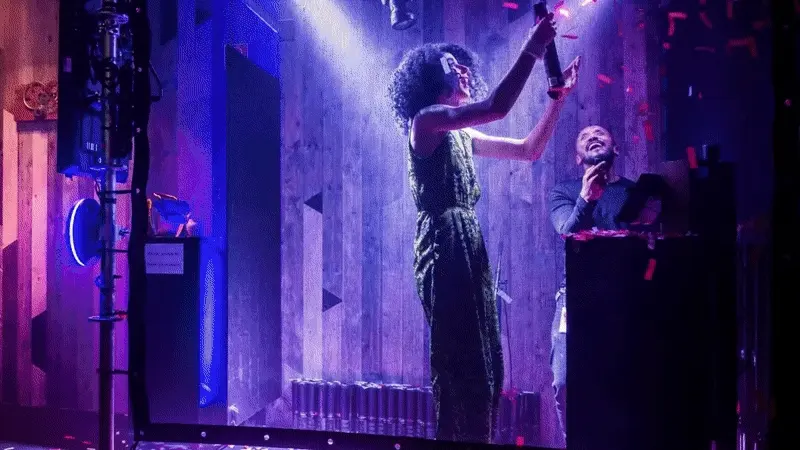

Sources: [Business Research Insights]. [Marketing Eye]. [EventTrack]
Credits ©
Photography- Markus Zumbansen, Marcel Schwickerath
The heart of the matter lies in the belief that some things such as masterful handcraft skills—can’t fully be conveyed through written or oral communication. They need to be lived, demoed, or experienced.
What if we apply this understanding to how we interact with brands? Picture the difference between viewing an advertisement for an iPhone and actually holding the sleek device in your hand. That direct, tactile sensation is the driving force behind experiential marketing, where brands are not just seen but felt.
The appeal of this marketing approach is booming. As of 2021, it was valued at over $47 billion and is projected to grow to around $63 billion by 2030, increasing steadily at more than 3% each year.
This growth demonstrates that more companies are recognizing the unique value of creating memorable, interactive brand experiences. [Business Research Insights]
Consider the impact. After such immersive experiences, 70% of attendees turn into regular customers. It’s like, once they physically experience what a brand stands for, they’re hooked [Marketing Eye].
Moreover, a survey from the Event Marketing Institute found that 74% of attendees feel more inclined to buy the products after they’ve engaged with them in a live, branded environment. It’s not just about observing a product but interacting with it in a meaningful way that drives this kind of conversion.
The effect extends beyond the event itself. Virtually all consumers who attend these events—over 90% of them—tend to create digital or social content while they’re there. What’s even more incredible? They all (100%) share this content too.
This means every photo and post has the potential to reach hundreds, if not thousands, propelling the brand into new networks through organic, viral marketing. This organic amplification through social sharing and word-of-mouth is priceless for a brand, spreading their message far wider and more authentically than any traditional ad could. [EventTrack].
So, the takeaway here? If a brand can craft an event that’s not only engaging but also deeply resonant and unique, the effects are profound.
It’s about crafting moments that not only attract attendance but create experiences so impactful they linger, inspire shares, and cultivate loyalty.
This is where experiential marketing and tacit knowledge meet—learning through active, dynamic engagement.
At BRS, we understand that true engagement is more than just showing up. Our custom experiential events are designed so that every guest doesn’t just passively observe but actively participates—choosing, engaging, and ultimately advocating. Via experiential, we can earn their enduring loyalty.
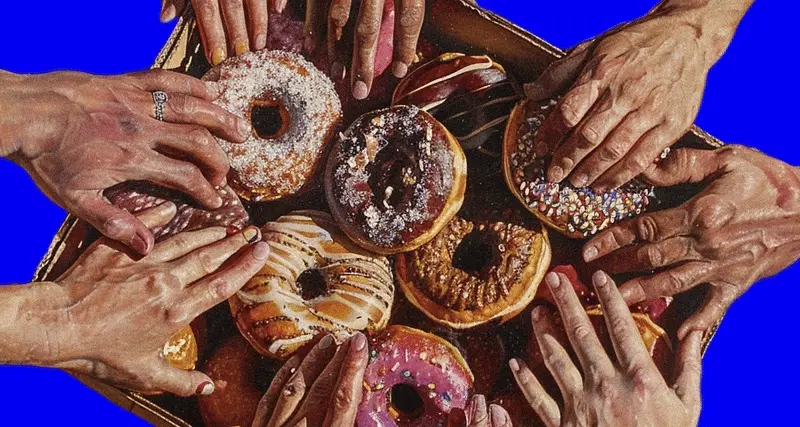

by Judith Hoch
Credits ©
Artwork- Sofia Silva
In our studio, diversity and inclusion are not just integral to our work—they are at the core of our mission as a creative agency. In terms of teams, we actively seek out and recruit diverse talent from all walks of life. From our headquarters in Berlin—a city rich with diverse talent—to our global team members and partners, we embrace varied perspectives in every experiential marketing project. This decentralised approach enriches our team with unique voices and insights. We also conduct regular in-house diversity workshops to ensure our core team members not only understand but also appreciate the value of diverse viewpoints and take this perspective into the bigger teams and networks.
While we pride ourselves on having multinational teams that collaborate across continents, we acknowledge that the journey towards true diversity is continuous. Recognising the need for broader ethnic and minority representation, we are refining our recruitment strategies to better capture the full spectrum of talent available, moving beyond traditional hiring paradigms to tap into a more diverse talent pool.
Diversity aligns directly with our goal to break down the stereotypical notions of the ‘ideal candidate‘ in our industry. We’ve learned to look beyond traditional criteria and redefine creativity, recognising that true innovation stems from this. This shift in perspective has taught us that embracing diversity goes beyond filling quotas—it’s about enriching our creative culture and opening our doors to a wider spectrum of talent, which enhances our capabilities in event production and immersive experiences.
This ensures our services are vibrant and resonate with a broad audience, making every event production we touch not just innovative, but inclusive and globally relevant. 🌐
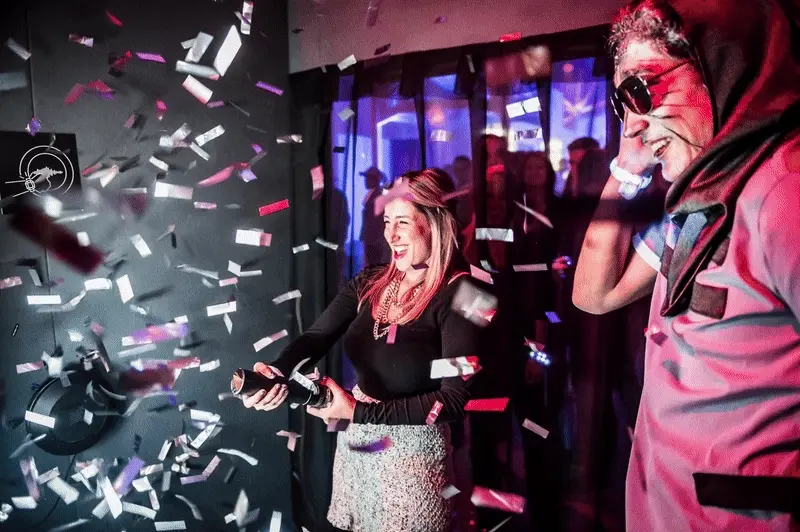

by Ky Lloyd
Credits ©
Photography- Erste Auswahl
Artwork- Sofia Silva
It’s about broadening the line of sight, so every little detail contributes to the larger event. This approach requires us to shift how our departments think and operate; we interlink them more closely than ever, ensuring the outfits, the set designs, and even the minor props, carry the thematic threads of the main story. In our world, everything on site is a stage — literally. From the food and beverage areas, which we treat as secondary stages, to the way we manage our catering — everything is an act in the play. Even the flavours are cast like characters, each adding to the narrative we’re creating through the event production.
It’s a massive orchestration, where clear roles and responsibilities are crucial. We’ve increased both our team size and the scope of their responsibilities. Every team knows their lane but also understands how it intersects with others. This isn’t just about having more bodies on the ground; it’s about empowering each person with the responsibility to see their role as part of a grander vision. Every light, every fabric, every taste — it’s all meticulously planned to enhance the immersive journey, not just serve as background.
One of the biggest challenges is ensuring that these integrated elements remain accessible and impactful. For instance, at one event, figuring out how to make the registration process — a typically mundane first step — into an engaging, thematic immersive experience was tough. We had to connect technology with human interaction seamlessly, making sure it set the tone for what was to follow. It’s about turning every potential stumbling block into a stepping stone for deeper engagement.
The future is about pushing these boundaries even further. Every event will be a multisensory journey where the line between performer and audience blurs. We’re moving toward a place where tech, live events, performance, and guest interaction merge to create not just moments, but memories that linger in consumers. As we evolve, the challenge will be to keep innovating while ensuring these technologies and narratives genuinely enhance the experience and don’t just serve as decoration.
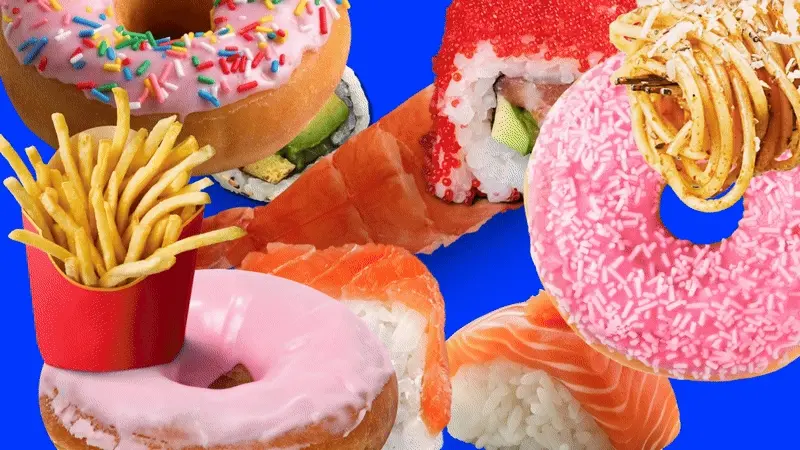

by Janina Schaffrath
Choosing what goes onto your plate is one of the most personal decisions you can make, a choice rooted in experiences that trace back to before you were born. Why does the taste of a dish linger in our memories, tugging at our emotions long after the meal has ended? This profound connection between flavour and feeling is at the core of an intriguing field known as flavour psychology.
Central to our bespoke concepts is the intimate link between flavour and feeling. The relation between a sweet, ripe strawberry or the allure of dark chocolate isn’t random; these are emotional narratives crafted meticulously through our menus. Picture a romantic dinner where each course tells part of a story—light, whimsical starters give way to a rich ending in a comforting, sweet dessert, each designed to resonate with the diner on an emotional level.
Our immersive taste activations combine unexpected flavours or reimagining traditional ones to provoke specific feelings and responses. The setting, food presentation, and even menu descriptions are all crafted to complement this flavour journey.As this field grows, psychologists and culinary experts are joining forces to dive deeper into how flavours can influence mood, recall memories, or even alter behaviour. This isn’t only transforming how we experience dining through events but is also spilling over into food therapy and wellness. In essence, flavour psychology isn’t just about what’s on your plate; it’s about what those flavours evoke within you.
As we continue to explore this connection, expect to see menus that go beyond listing dishes, offering a guide to emotional and sensory discovery designed to leave a lasting impression on our menus and ultimately your audience.
@trio.berlin is the latest venture by restaurateur Vadim Otto Ursus, in partnership with Eva Alken and Clemens Roesch, who are all acquainted with Otto. The modern tavern, located between Volksbühne and Soho House, has become the talk of the town after just its opening weekend, even making it into the New York Times as a ‘Stylish Take on the German Pub.
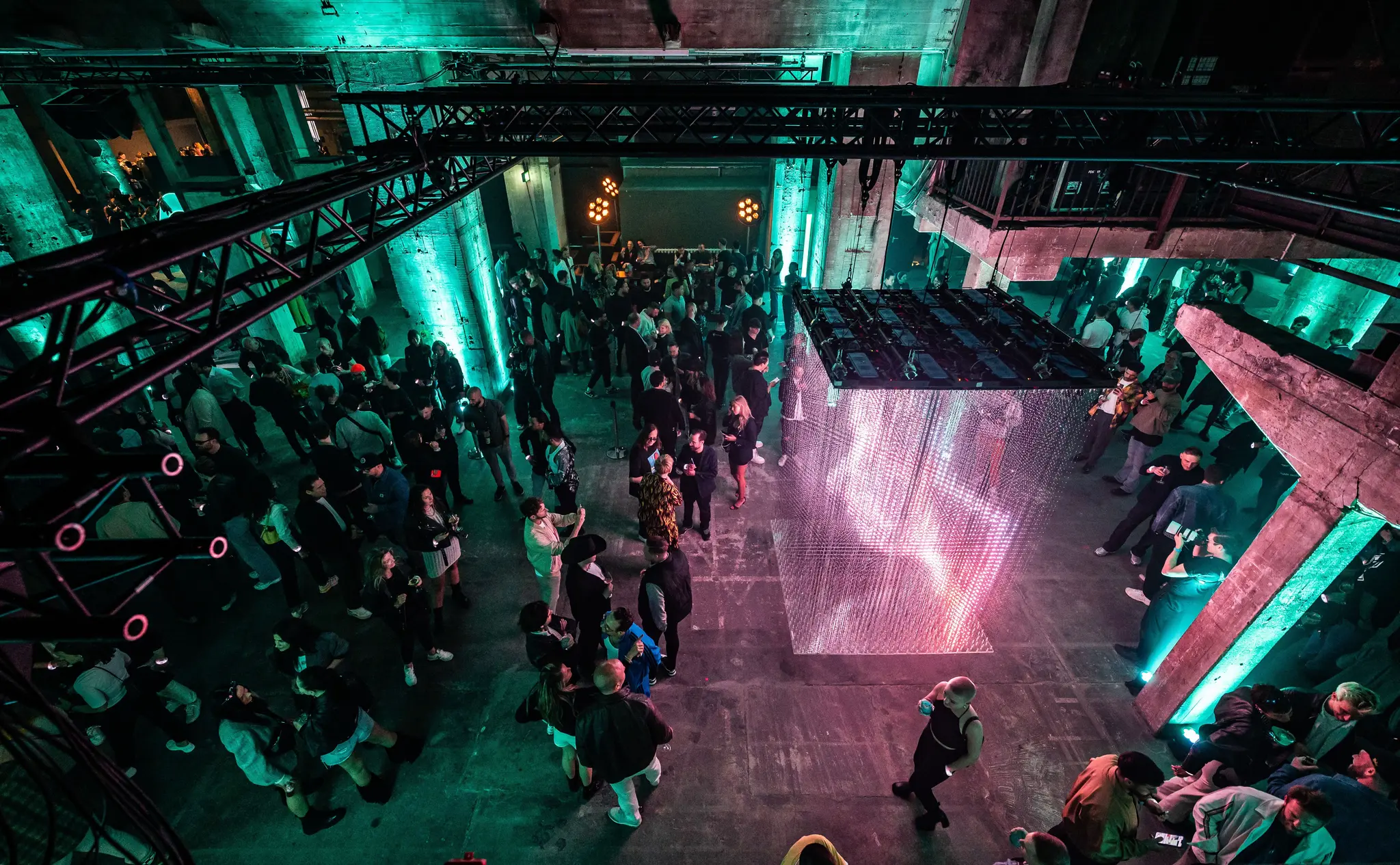

by Brendan Shelper
Credits ©
Photography – Koone (Denis Koonert), Marcus Zumbansen, Chris Moylan, Client
Navigating German supplier-chains or any foreign market can be daunting for international firms. The key? Partnering with the right local agency that understands how to manage the complexities of international projects. In the world of bespoke experiential marketing, grasping cultural nuances is not just beneficial—it’s essential.
At the heart of building effective international connections is our ability to craft compelling brand stories that come alive, breaking through cultural and linguistic barriers. Our boutique agency, situated in Berlin, is dedicated to helping international brands establish and grow via experiential marketing, we offer experiential event marketing in Germany. We specialise in creative consulting and producing live events, ceremonies, and immersive experiences that truly connect with audiences and forge loyalty.
How is our approach different? It’s simple: we see ourselves not just as service providers, but as partners. Our collaboration with brands from all corners of the globe — BMW, TikTok, and Porsche — has honed our expertise in creating events that captivate and engage. From the pomp of major ceremonies to the intimacy of immersive experiences, our portfolio stands as a testament to creative experiential solutions.
Our services are tailored to the needs of international brands and agencies aiming to make a splash not just in Germany, but across Europe. With a network of partners throughout Europe and a team that blends creativity with logistical finesse, we offer:
Navigating the nuances of the German market requires a blend of creativity and strategic thinking. Our consulting services are designed to unearth innovative solutions that align with your brand’s global vision.
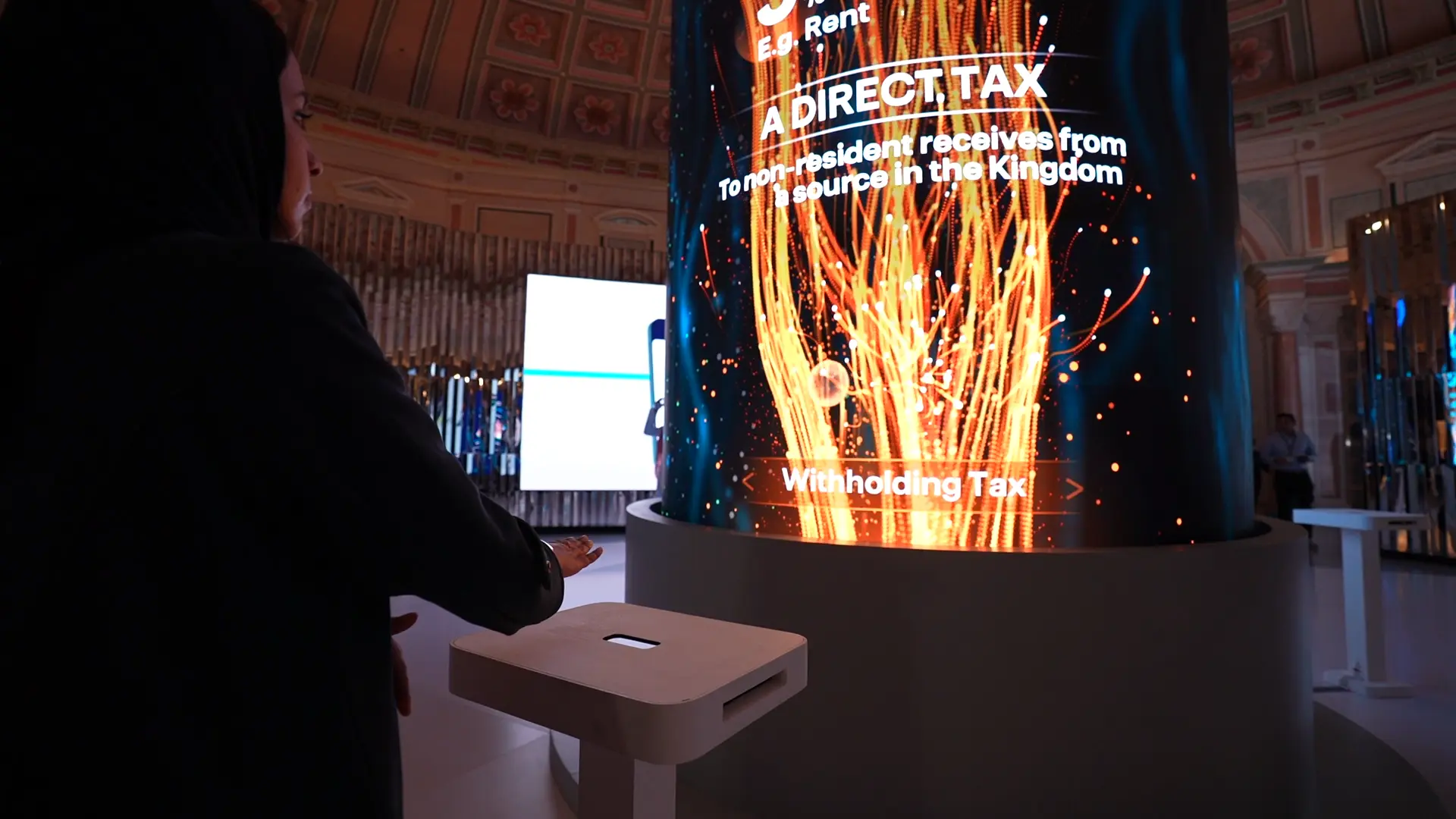
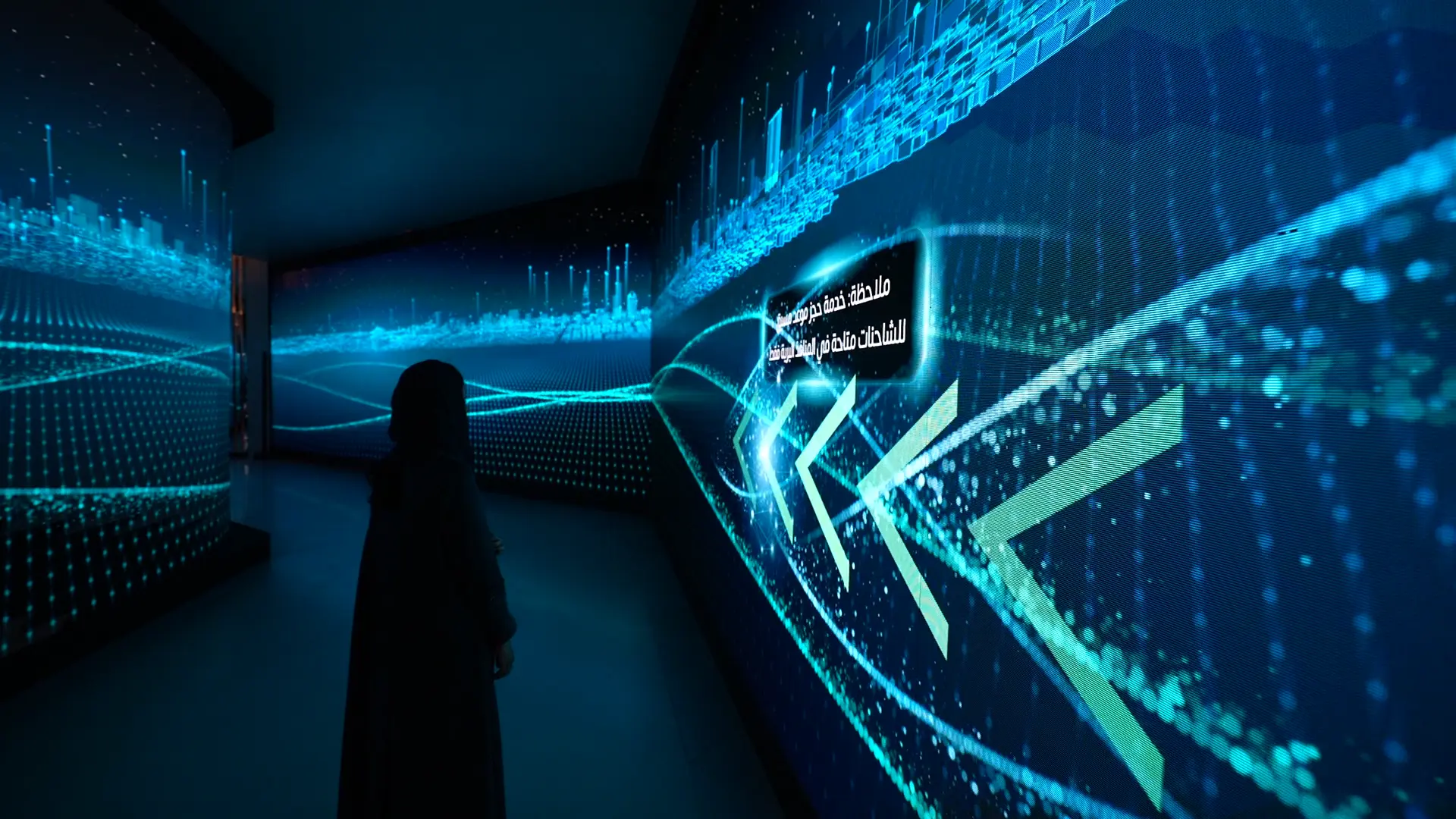
Our approach intertwines digital tools with the essence of live events, designing the desired consumer journey together with our clients to highlight new products, build a knowledge base, or simply creating joyful engagement via immersive experiences with purpose.
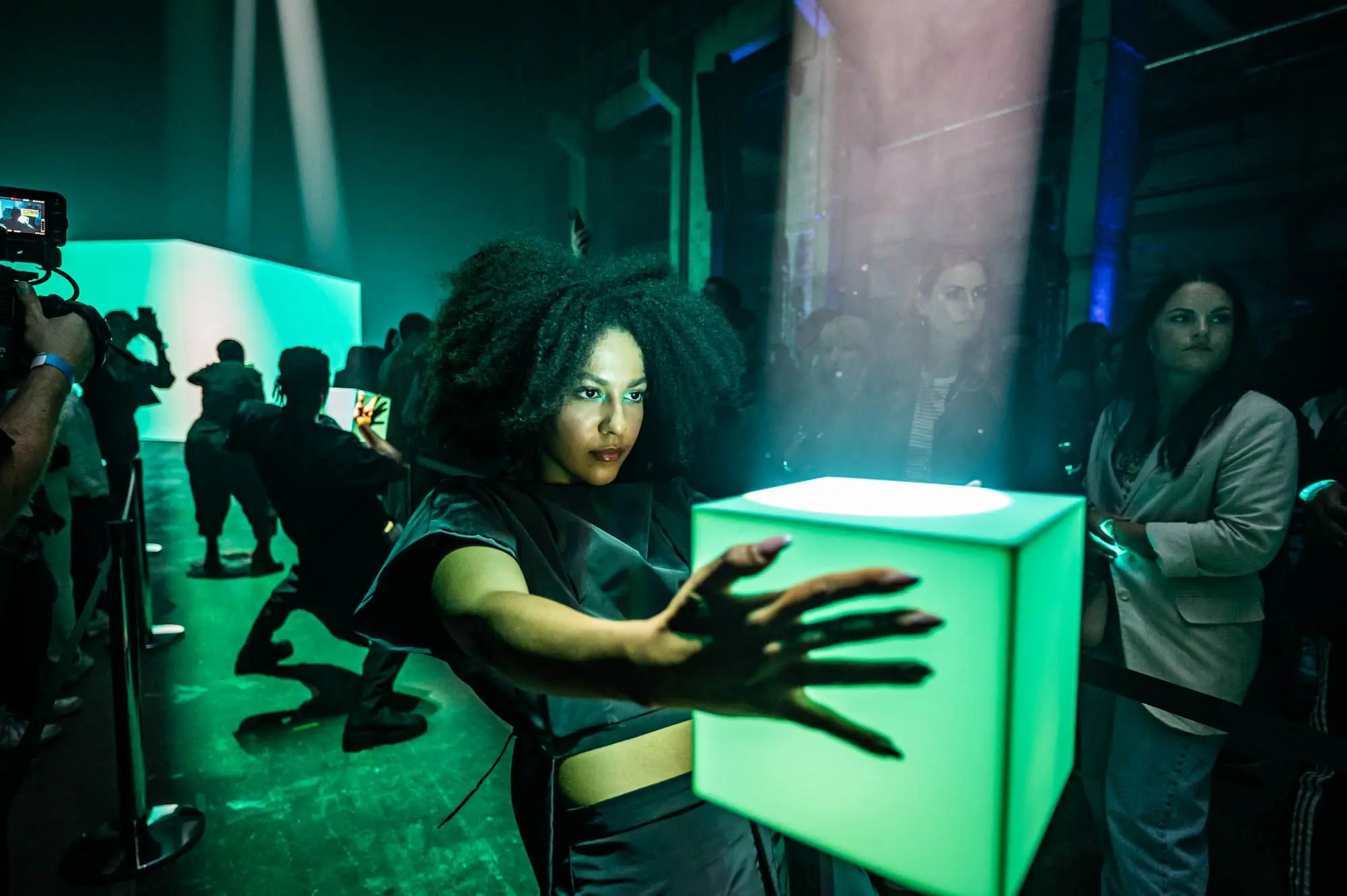
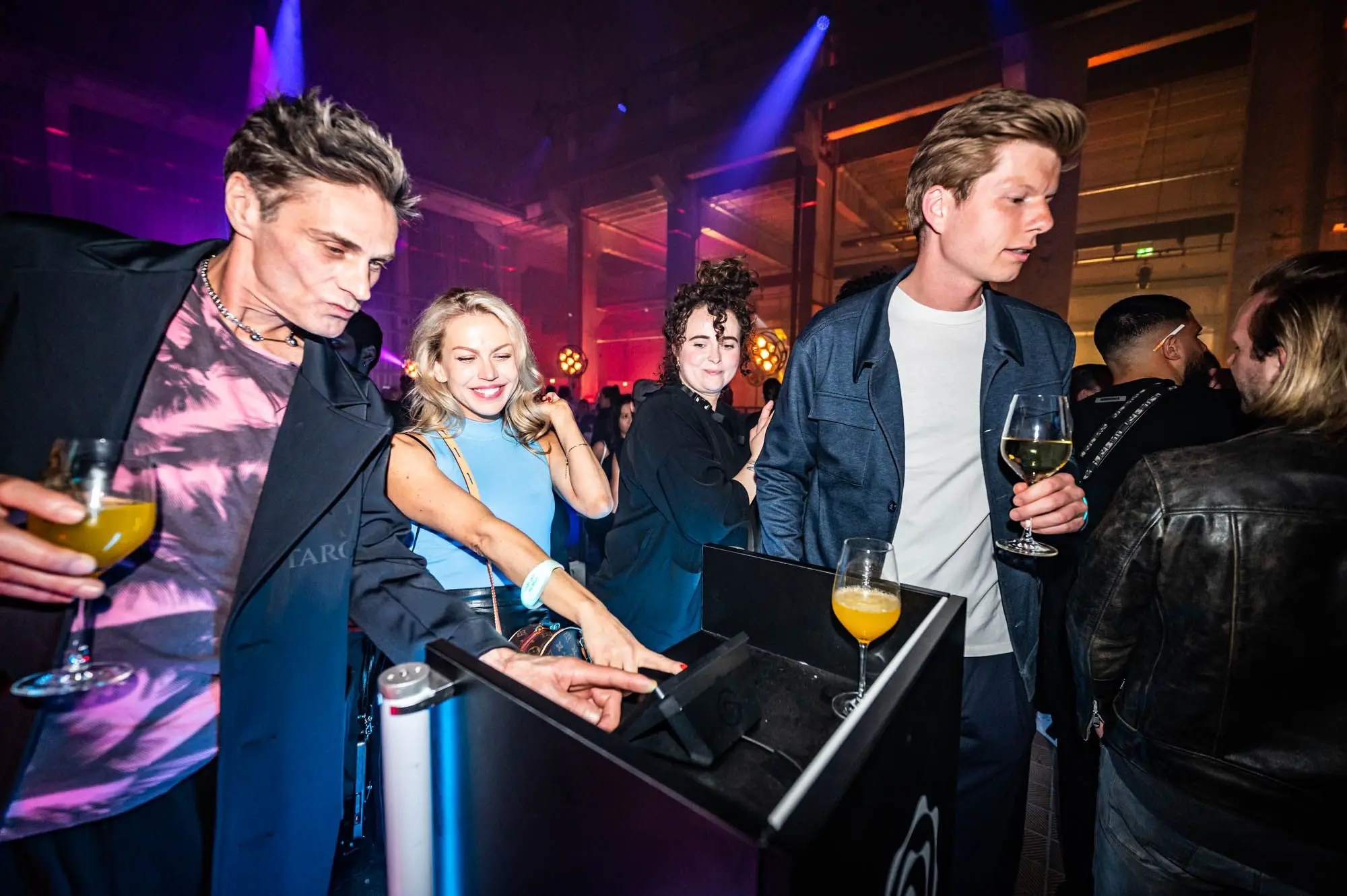
Over the past decade, we’ve excelled in creating award-winning events by embracing innovative formats and tailoring our approach to meet the specific needs of our clients.
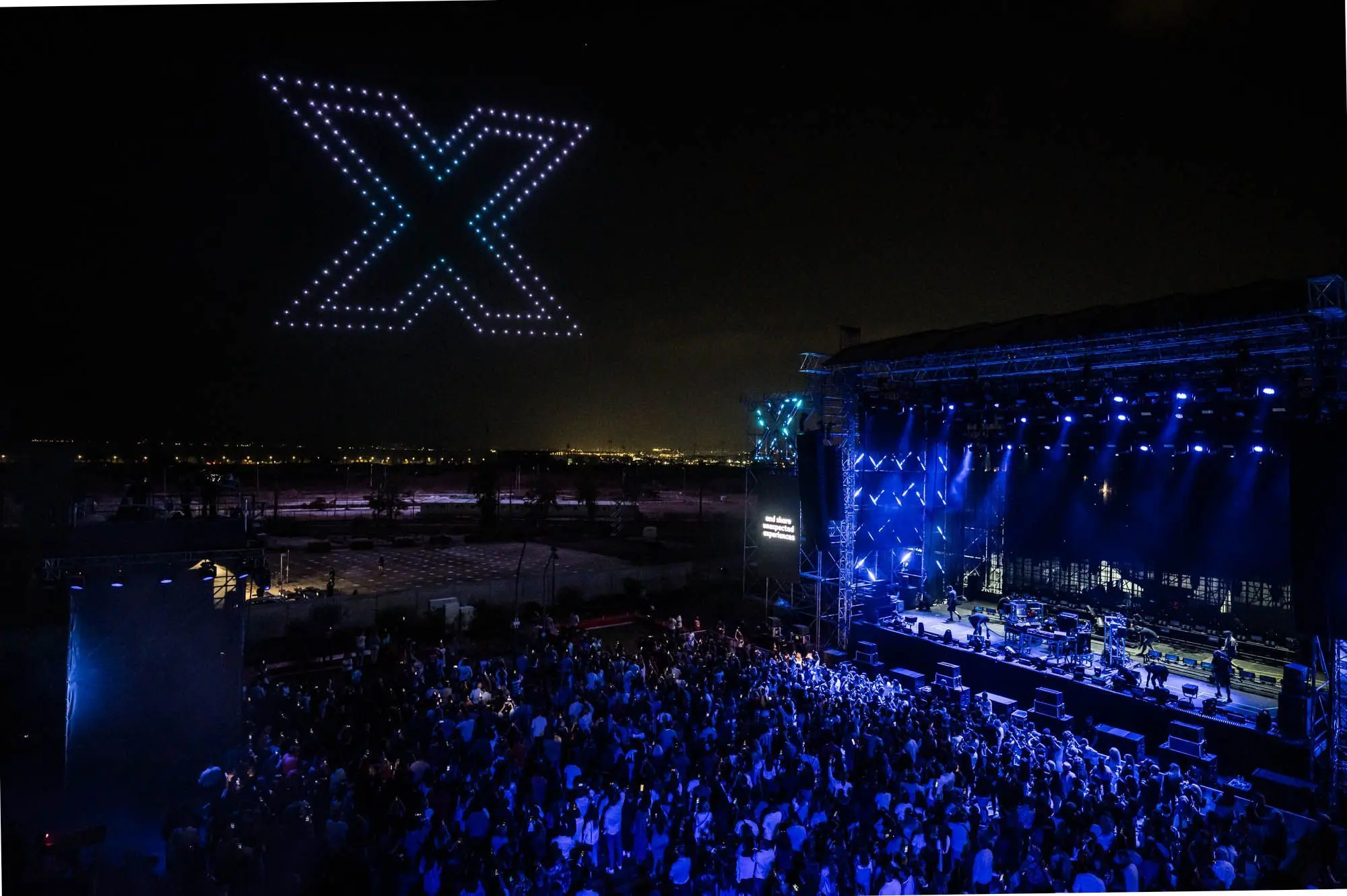
Specialising in demanding international activations, we understand the intricacies and high production standards our partners expect, ensuring each opening ceremony is both memorable and impactful.
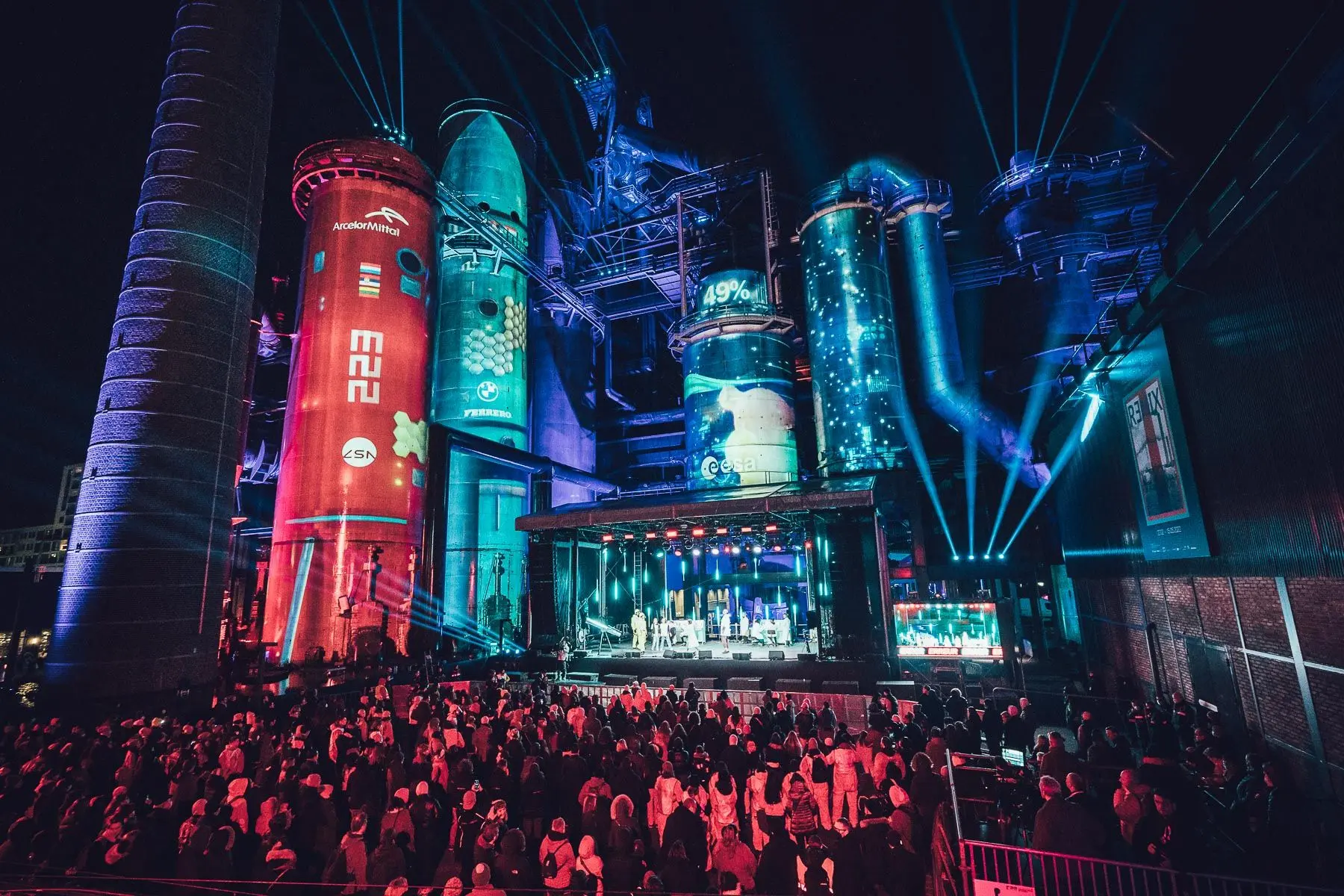
In a world longing for authenticity, immersive experiences offer a direct path to consumer hearts. Our bespoke activations are crafted to build deep, meaningful connections with your audience, making consumers take ownership of their experience and leave as vocal campaigners.
Housed in Berlin, with representation in key global cities, our team’s diverse background — from theatre to Olympic ceremonies — equips us with the unique ability to bring a wide range of visions to life. This global perspective, combined with local expertise, positions us as the ideal partner for international US brands venturing into the German market.
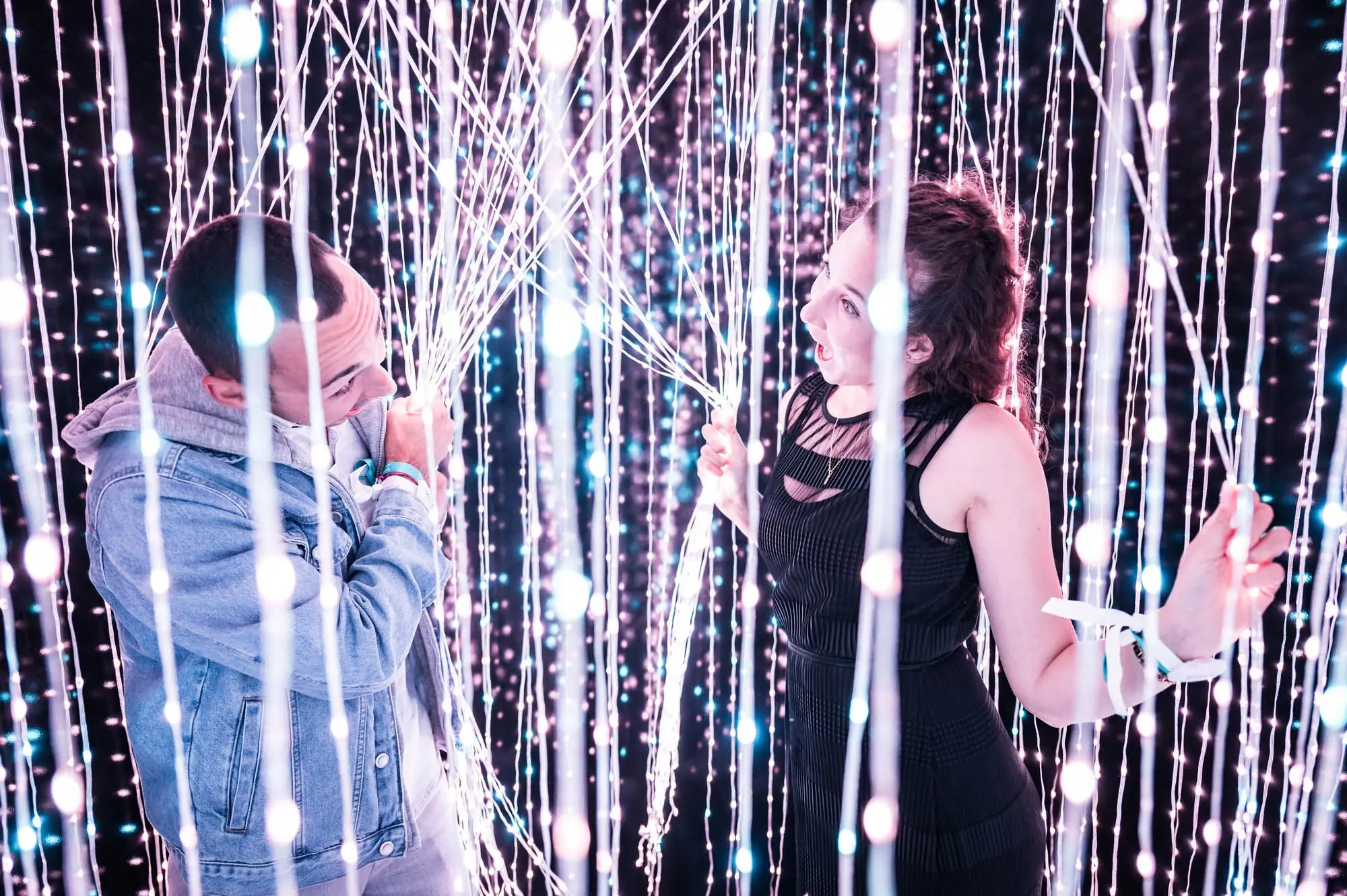
In a world where brand experiences have become oh so important, choosing the right partner can make all the difference. Our mission is to bridge the gap between global ambitions and local execution, transforming international brand visions into unforgettable experiences.
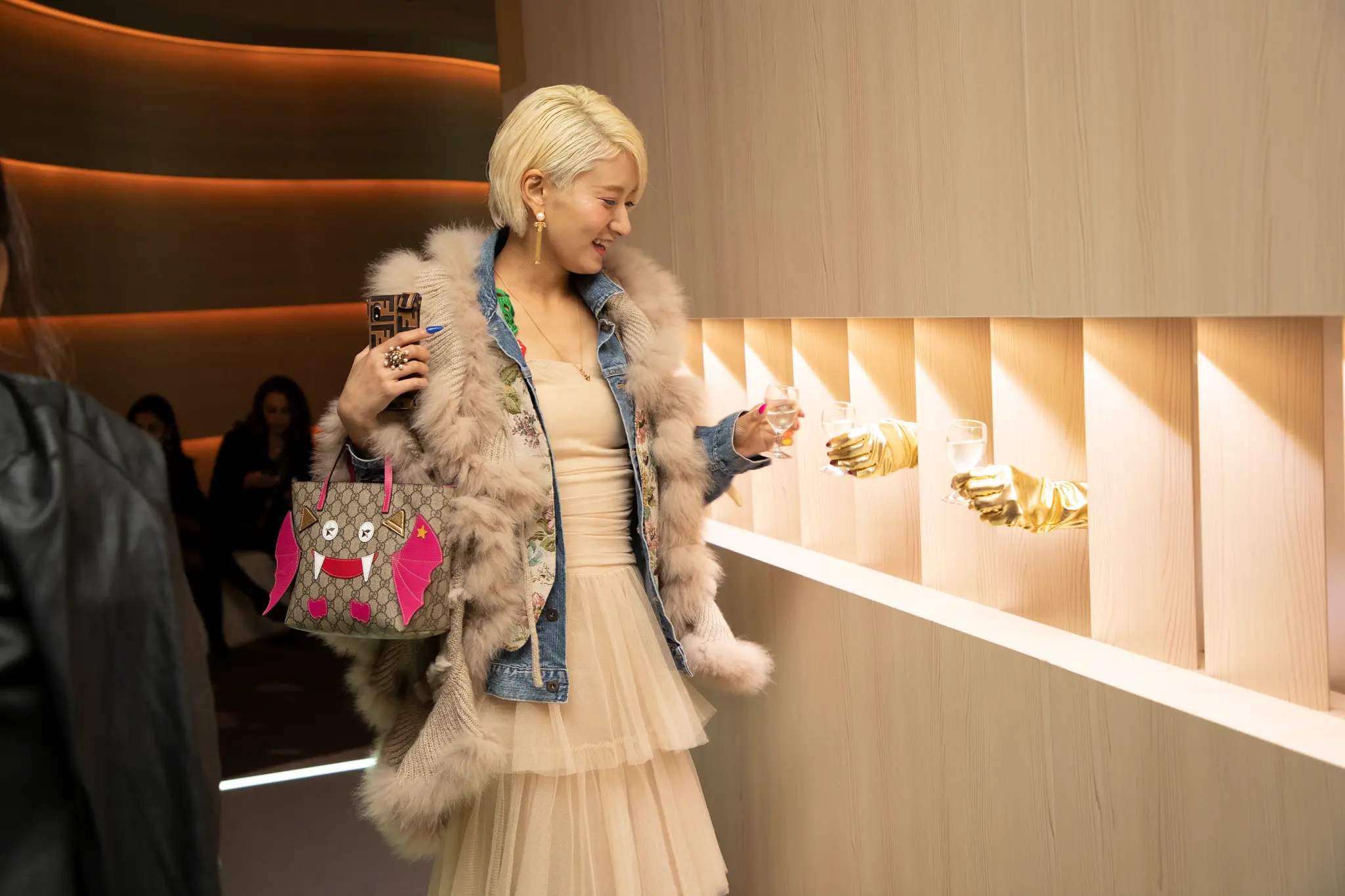
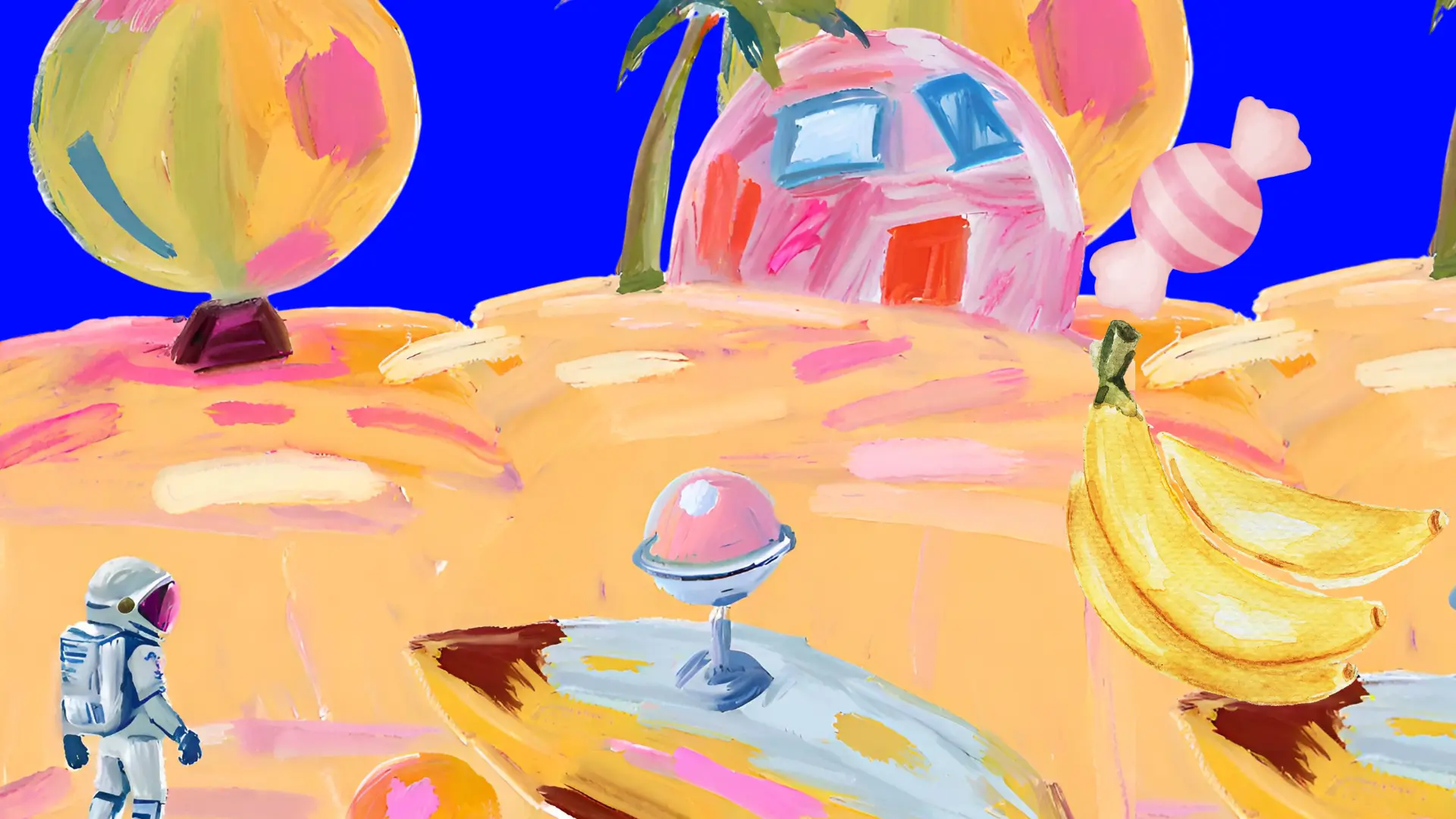

by Brendan Shelper
Credits ©
Artwork – Sofia Silva
Creating new ideas is a vital part of any agency’s growth and innovation. But let’s be honest, the path from an idea’s birth to its realisation is full of hurdles. The biggest challenge? Overcoming the scepticism it faces. To truly nurture and grow new concepts, teams and clients need to jump in, suspend their doubts, and believe in what could be. It’s truly about building belief and fostering collaboration.
One of the biggest hurdles we face as a creative agency is steering through the doubt that often clouds new ideas. It’s critical when presenting fresh, innovative concepts to connect with clients and decision-makers who really take the time to see the idea’s worth. Rush decisions, usually from not getting it, can kill what could have been a breakthrough idea.
The essence of our work involves not just creating but also effectively communicating our ideas, ensuring they are given the thoughtful consideration they deserve. It’s about finding those who are willing to pause, reflect, and delve deeper into the potential of an idea, rather than reacting based on surface-level impressions. This process is vital in ensuring that innovative ideas are not just heard but truly understood and appreciated for their potential to make a significant impact.
Suspending disbelief doesn’t mean ignoring the potential flaws or challenges an idea might face. Rather, it’s about giving the idea space to breathe and grow without being stifled by premature criticism. It’s about creating an environment where the question isn’t “Why?” but “Why not?” and “How can we make this work?”
I’m the worst at this, not because I don’t value others’ ideas, but because we’re always under time pressure to deliver and the fast-track solution is to go with something that is easily if not instantly understood. So, when a new idea is presented, the instinctive reaction is often to point out reasons it might not work. This scepticism can be a significant barrier to innovation. Instead, encouraging a mindset where team members explore solutions to potential problems fosters a more productive and creative atmosphere. It shifts the focus from why an idea won’t work to how it can be improved and refined.
Investing in the possibility of an idea means looking beyond immediate obstacles and envisioning the potential impact it could have. It’s about recognising that every great achievement starts with a single, sometimes fragile, concept that needs nurturing and support to grow.
For organisations looking to lead in innovation, fostering a culture where ideas are met with curiosity and a willingness to explore is key. It’s about building a team that’s not just quick to offer opinions or doubts but is eager to dive into the possibilities and work collaboratively towards solutions. This approach doesn’t just benefit the ideas themselves but also contributes to a more engaged and innovative team dynamic and can ultimately rub off on every future pitch you have with your clients.
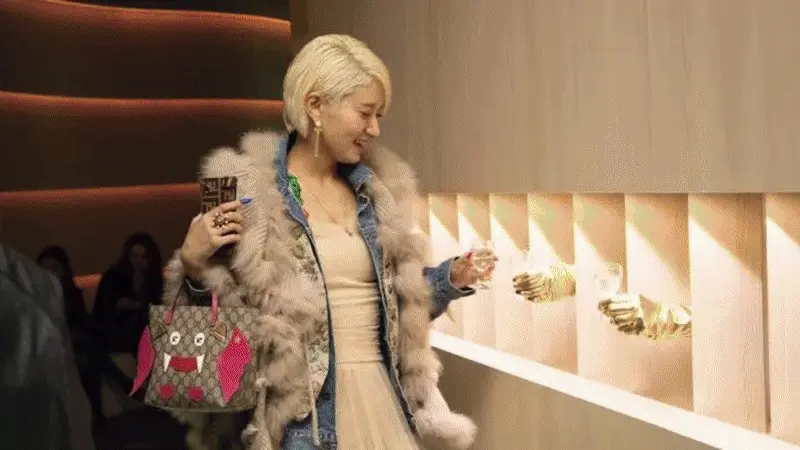

by Brendan Shelper
Credits ©
Photography – Marcus Zumbansen
Innovation and real brand experiences are merging, marking a departure from traditional transactions towards a more integrated, consumer-focused journey. It’s about creating a space where loyalty evolves into an organic, shared adventure, empowering consumers to become active participants within the brand’s narrative.
The result? An organic proliferation of user-generated content (UGC) that amplifies the brand’s message across multiple channels, courtesy of the most authentic brand ambassadors; consumers themselves.
In partnership with Loyalty and Reward Co, award-winning loyalty program consultants for global brands, we’re crafting a new frontier in loyalty schemes. This collaboration aims to rejuvenate a leading global brand’s loyalty strategy, infusing it with live activations and tiered rewards that strike a chord with consumers on an individual level.
Our approach intertwines digital tools with the essence of live events, designing the desired consumer journey together with our clients to highlight new products, build a knowledge base, or simply creating joyful engagement via immersive experiences with purpose.
Imagine an event location where every interaction offers a chance for deeper engagement and recognition. Our live activations are the key to unlocking this domain, providing members with opportunities to accumulate points or exchange them for exceptional VIP experiences within the event.
This requires simplifying the mechanics of the program and implementing intuitive new tools, but most importantly, generating a narrative which makes sense for each brand story.
Our key partner Philip Shelper, CEO of Loyalty & Reward Co will be presenting at the upcoming Talon.One conference INCENTIVIZE in Berlin on April 25th. We’ll be there, soaking up the latest in brand loyalty and live consumer engagement. It’s all about discovering new ways to bring brands and their fans closer, and we’re excited to be part of it. Hit us up!
INCENTIVIZE by Talon.One
The Loyalty and Promotions summit
Berlin, 25th of April 2024
Our philosophy extends points accumulation. We’re reimagining the gamification in loyalty program, focusing on premium touchpoints and meaningful rewards that celebrate consumer interaction. It’s about creating an engaging, fun, and value-rich experience that elevates the consumer-brand relationship. In a world where loyalty signifies paramount value, we’re setting benchmarks for others to aspire to.
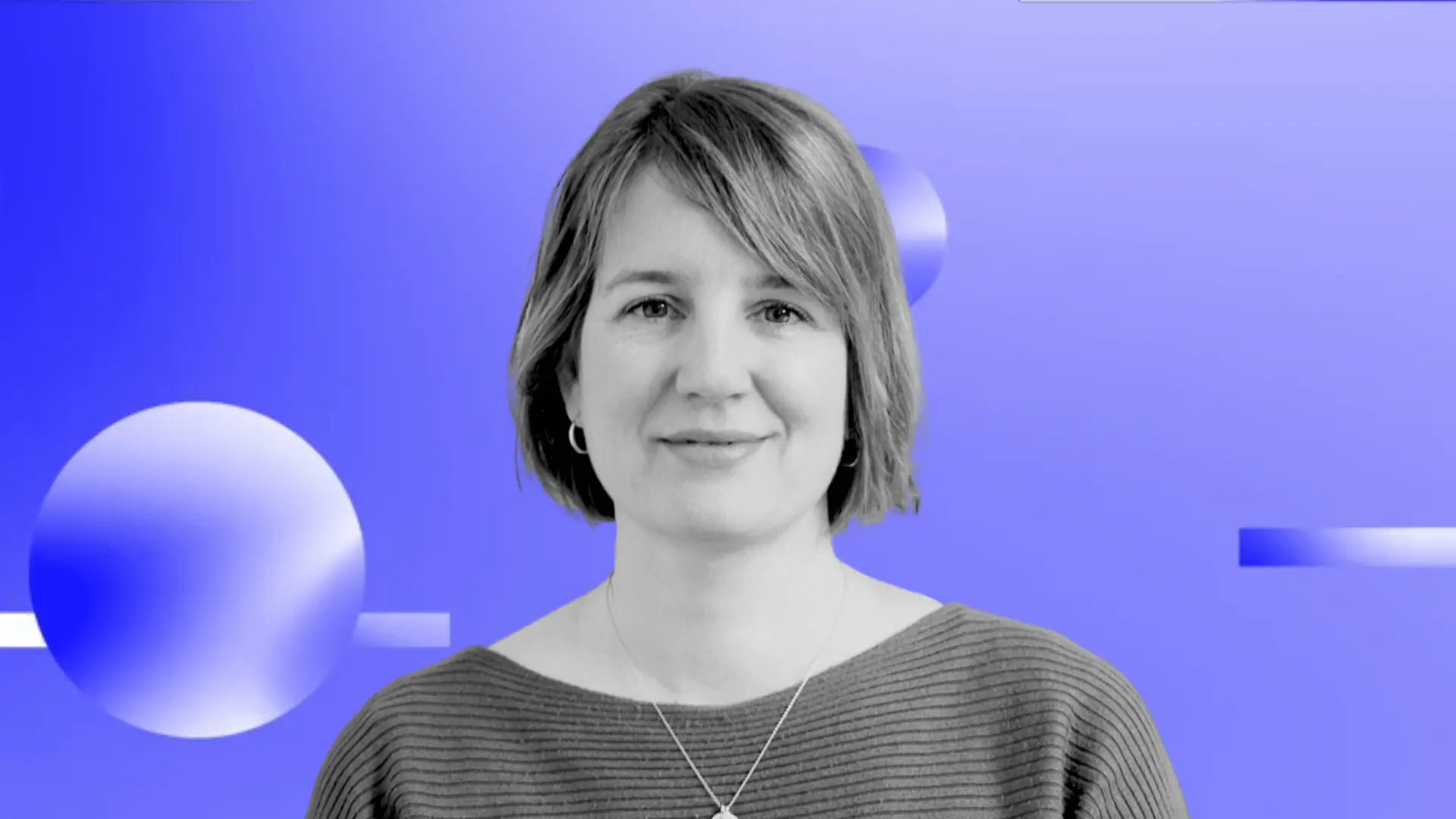

by Judith Hock
Credits ©
Artwork- Sofia Silva
Absolutely. We’ve mastered the art of balancing our dedicated core team with skilled freelancers. Each project teaches us more about foresight, strategic planning, and the importance of maintaining an agile workforce.
It’s all about early and strategic team planning. Freelancers offer us flexibility for last-minute projects, but aligning their part-time availability with our needs requires careful consideration. Our core team, on the other hand, provides stability and deep, company-specific knowledge that’s invaluable.
We leverage the niche expertise of freelancers alongside the deep knowledge of our core team. This mix allows us to stay agile and expand our capabilities, ensuring we can tackle any project with the right set of skills.
Our projects are fast paced, demanding quick adaptability. Our freelancers and core teams are adept at this, but it’s the brand knowledge and loyalty of our long-term team members that truly stand out, ensuring depth and understanding in our work.
Freelancers not only offer cost-effective solutions for short-term needs, allowing us to adapt quickly and efficiently to varying project demands, but they also form a crucial part of our extended BRS family. We cherish this vibrant community, regularly bringing them together to celebrate our collective achievements and milestones. It’s more than just collaboration; it’s about nurturing a supportive network that allows each member the flexibility to forge their own path while remaining closely knit to our core. This approach not only strengthens our bonds but also ensures we can scale our operations at a moment’s notice, seamlessly integrating with our fixed team to meet any challenge.
For longer projects, we still lean on the financial and operational stability provided by our core team, constantly fine-tuning our blend of fixed and freelance talent to maintain this equilibrium. It’s this strategic balance that enables us to navigate the complexities of project management with a personal touch, ensuring every member of our extended family feels valued and supported
As we grow, the dialogue between leveraging freelancers and investing in our fixed team’s size is crucial. We’re focused on anticipating scaling needs, nurturing our core team, and engaging freelancers in a way that aligns with our long-term vision.
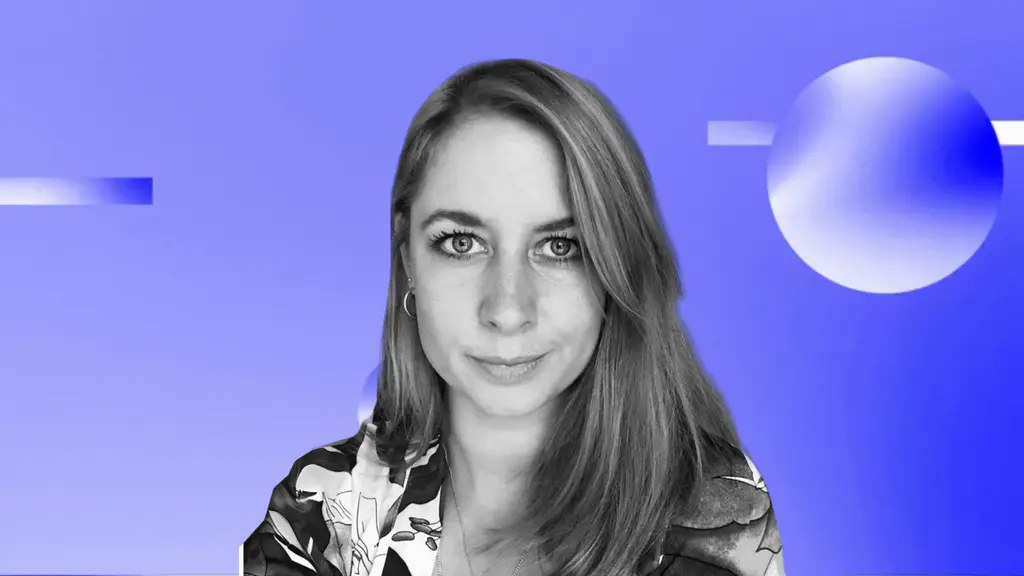

In my experience, a carefully selected catering partner plays a significant role in the success of an event. From attentive but discreet service to the experience of flavor itself and the selection of drinks. It’s not without reason that in German we say “love goes through the stomach”.
Over the last few years, we have seen a major change in trend regarding consumption. I have the feeling that people are consuming much more mindfully – whether it’s food and drinks or the general catering set-up. Much more attention is being paid to seasonality and regionality, as well as the reduction of (food) waste. People are generally thinking more sustainably and, as a catering partner, it is important to reflect these values.
The list is long! Berlin offers such a wide variety of great locations catering to all kinds of tastes! Personally, I love the small and humble spots like “Glasweise” on Reichenberger Straße or “Frau Luna” on Paul-Lincke-Ufer, which offer curated menus using selected, high-quality ingredients, as well as fine wines and great low ABV drinks. The best catering I had so far was from “Studio Schmaus”… 10 out of 10! A little insider: Also the “Lobb” Pop-Ups shouldn’t be missed!
I had the great honour of working with Stephan Hentschel at the end of 2023. I was asked to be the executive producer for “The Glow” dinner created by Chaos Director Ralf Schmerberg and him – an immersive 8-course menu at MaHalla Berlin. I will never forget working with him, as I have rarely experienced such a passion for flavor, ingredients, and the way he brings everything together. Apart from the fact that the menu itself was created with so much love, my highlight was the daily staff meal 🙂
I think anybody deciding on a career has this “big picture” of where they want to be one day. Whenever coming across BRS productions over the past few years, I was left with simply feeling impressed, and I got this vision of contributing here – feeling like this could be it. In the end, I think I was in the right place and at the right time, to apply, so I took my chance and here I am 🙂
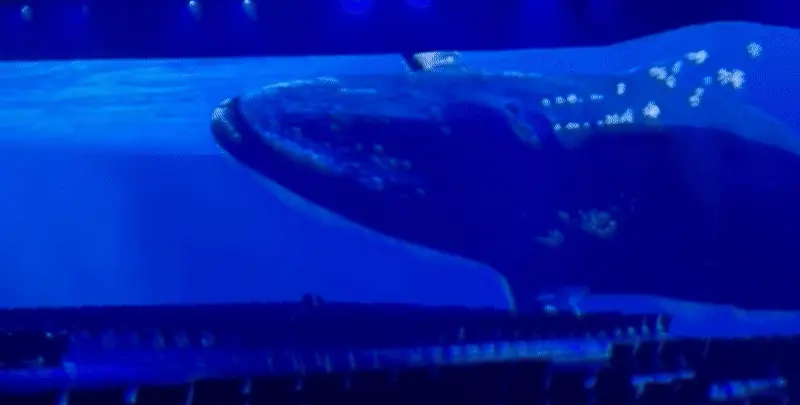

by Andy Machals
Credits ©
Video- Client
The ITB Omans Opening Ceremony’s in Berlin tagline was “Beauty has an address” and this is our mission, shining a spotlight on Oman’s diverse cultural blend at CityCube Berlin, offering a rich experience for 3,000 guests.
The concept was developed by our partners Jack Morton in collaboration with the client in Oman. BRS made us of the transformative feature of a more than 100m wide LED wall, turning the venue into an immersive canvas that displayed evocative visuals. This initiative set the stage for a spectacular show, where BRS’s expertise in artistic, staging, and show direction fused all elements seamlessly.
Accompanied by more than 50 performers in stunning costumes and a 3D immersive sound experience, the spectacle was further elevated by a dynamic aerial performance, adding an artistic and aerial dimension to the event.
In three segments, we showcased Oman’s natural beauty and cultural heritage, highlighting its modernisation while preserving its identity, and presenting its vision for sustainable tourism by 2040. Entertainment highlights included performances by Omani singers, folk groups, and the Royal Oman Symphony Orchestra, reflecting the country’s commitment to cultural preservation and international harmony.
This project was an exciting clash of performance cultures. Omani culture is hugely performative. From Hammasi (a traditional dance between men) and Al Rubooba (adding the women) to a traditional Kahwah tea ceremony, these get-togethers are a conglomeration of precise cultural gestures of gratitude, hospitality, and celebration. The gowns, the traditional props, each hand gesture and ornamented headpiece has a meaning. In rehearsal, we discussed these influences with our guests to craft a shared vision for our show.
It was my job as show director to embed these practices in a show and ceremony context. Jack Morton’s creative director Achim John provided the overall concept and visuals, while we crafted the scenes and show flow. The motivation for inserting our Western aerial performers and dancers was decorative and expressive, adding emotional depth to the traditional Omani performance worlds.
Our job was to sculpt these clashes as emotional stage moments that help overcome cultural distance, forming a slick and modern Opening Ceremony for a Middle Eastern country set in the heart of Europe.
Usually, in Middle Eastern shows and ceremonies you would implement a narrator’s voice to tell the stories of local histories and tribes. We accepted the challenge of creating an Opening Ceremony that would divert from this practice and implement a very Western style of visual storytelling over narrative. The result was a journey that was applauded by Europeans and representatives of Oman alike.
In the first show act, we had our dancers and aerialists dive deep into the Omani Sea. At the end of the act, the ocean darkened, and we heard sonar sounds through the 3D sound system as a 30m long whale floated across the more than 100m long LED in a breath-taking silence. Our dancers, slowly floating in front of the LED wall forming elegant silhouettes against the deep blue deep sea created a poetic conclusion of the first show act.
In the second act, our client wanted us to find a dignifying representation of Omani hospitality. So, we staged a traditional tea ceremony amidst the beautiful visuals of modern-day local architecture. Kahwah embodies a blend of warmth, hospitality, and tradition. Steeped in centuries-old customs, the ceremony is an intricate dance of aromatic spices and carefully brewed green tea, symbolising the essence of Omani hospitality. The ritual of serving multiple rounds of Kahwah underscores the importance of connection and community.
Set to a cosy soundscape with a subtle modern beat, the ceremony was led by an actor who was also a dancer, allowing us to meticulously time this ceremony on stage. While looking effortlessly at the broadcast camera, each hand gesture was planned and developed in accordance with local customs.
To us, it was important from the start to organise such a significant cultural moment in a way that functions with dancer-like precision – a kind of large-scale performance precision that Battle Royal Studios has been successful orchestrating since their early days.
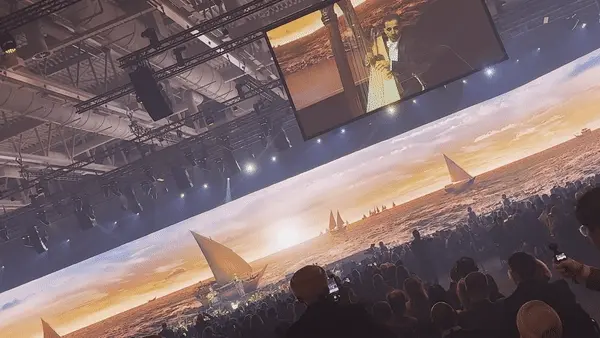
We thrive on collaboration, working with global agencies to devise concepts, stage experiences, and build teams. Our collaboration with Jack Morton for this production and the recent RIOT Games LEC 2022 Opening Ceremony are just a few examples of our adaptive approach. This journey of collaboration highlights our commitment to excellence and innovation in bringing unique experiences to audiences worldwide!
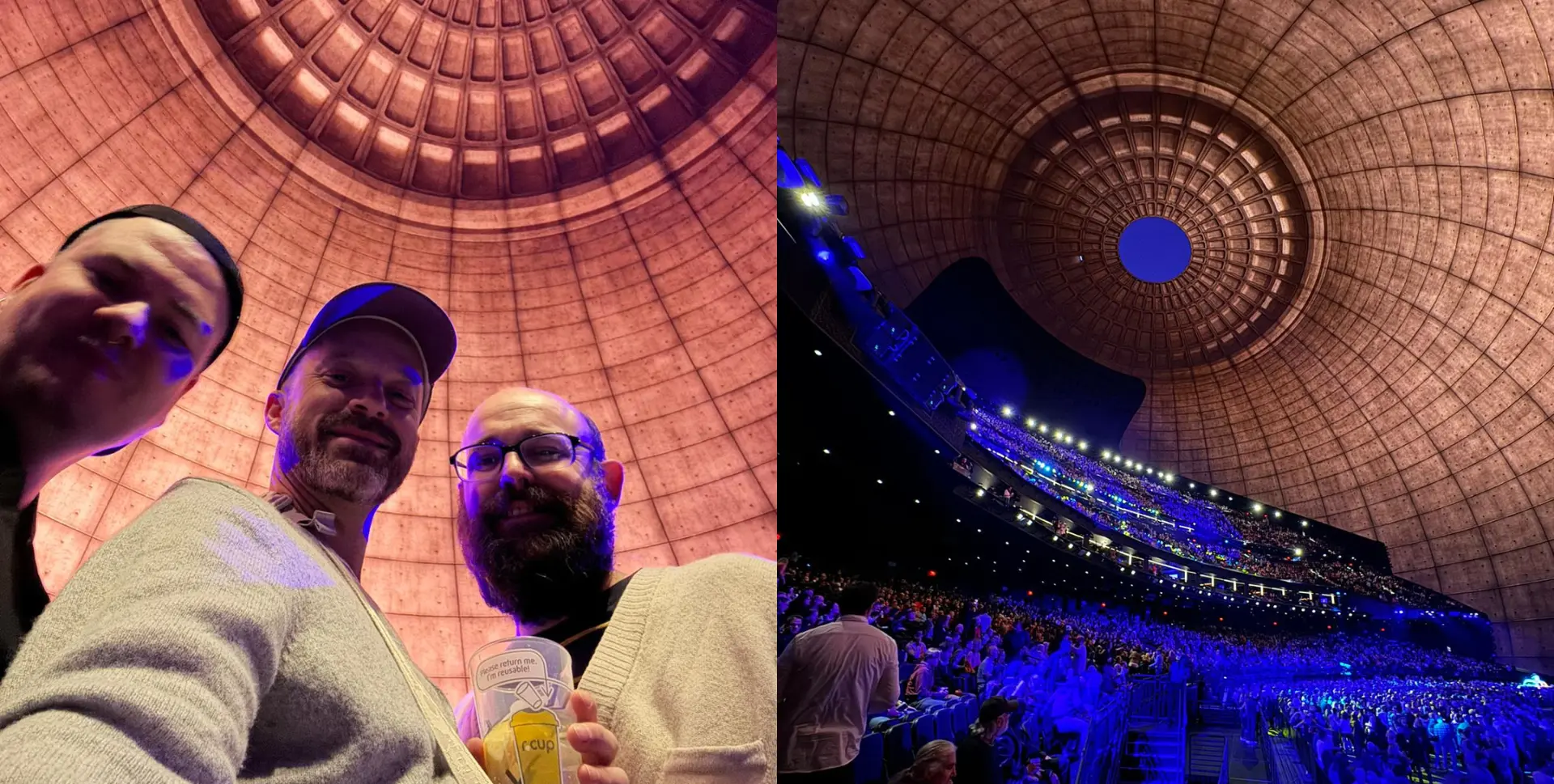

by Jonathan Buckles
Credits ©
Photography – Brendan Shelper
Over the last two decades, I’ve both participated in, and created, various immersive experiential works, ranging from dramatic introspective artworks for experienced theatre audiences to outlandish entertainment for corporate clients. But always aiming to captivate and transport audiences into new realms of imagination. So, when the opportunity arose to journey to Las Vegas with the creative team from BRS, I was excited to delve into what this iconic city had to offer in terms of cutting-edge entertainment and immersive experiences.
Honestly: Vegas isn’t really my scene. (Or perhaps it’s too much my scene for me to dare admit to myself? The jury is still out.) Its transient nature and overwhelming focus on catering to tourists can be off-putting. Under normal circumstances, it wouldn’t top my list of destinations. However, there were two new experiences there that drew me in irresistibly.
The first destination was the Sphere. It’s hard not to feel a mix of awe and uncertainty about it. Is this truly the future of entertainment? or another spectacle designed to dazzle that can’t possibly live up to the hype? As we ventured in to watch U2 play( or U2: UV Achtung Baby Live at Sphere, to give it its correct name) with the throngs of audience members, I was sucked into the excitement. The scale of this thing is incredible, once inside I found it hard to just enjoy and kept doing the maths on how many people x ticket prices + drink costs x thirst + merch… The resulting numbers were as staggering as the screen size. Once Bono and the boys started I couldn’t slip into the concert feeling, simply because it is not a concert. What it is I am not sure; the spectacle really is hard to describe.
The visuals are incredible, the impact breath-taking, the smart introduction of the venue capabilities was inspiring! Oh, and look there is also a live band down there on the stage! A fact that was easy to forget in amongst all the splendour. I couldn’t take it all in, so looked around at the predominantly older demographic that can afford the experience. This, all but stationary audience, were slack-jawed other than to sporadically take out their phones to try to capture the proceedings. Few on the dance floor even swayed, but this is not to say there was anything in the room but joy and appreciation. While some critique the Sphere, citing a disconnect between band and audience, you can’t deny the impact it had on the crowd; caught between contemplation and immersion. Yet, amidst this dichotomy, there was incredible beauty, but it still didn’t quite win my heart.
We were incredibly fortunate to get a behind-the-scenes tour which offered a glimpse into the intricate machinery behind the spectacle. It was humbling in scale and level of innovation required to bring the Sphere to life. And incredible built-for-purpose technical solutions not yet unveiled. The level of future proofing within the space is impressive, with innovations that have not yet been unveiled. As we explored the vastness and potential of the venue, I fell in love with the magnificence of the venue in a way the actual show hadn’t managed. Will this be a fleeting trend, or the new standard for pushing the boundaries of live performances? While uncertain, one thing is clear: The Sphere represents a bold step forward in entertainment, challenging conventions and sparking dialogue.
Area15 is a haven for a Vegas style of avant-garde nestled away from the neon-lit chaos of the Strip. Meow Wolf’s Omega Mart beckoned with its surreal blend of scale and detail, inviting guests to lose themselves in a world where the impossible feels tangible. As overwhelming as the Sphere, because it is a free roaming space, literally brimming with endless digital and tactile details to lose yourself in, it remained surprisingly relatable. The narrative is outlandishly bizarre, but you explore it via telephone booths, supermarket products, and email folders. I couldn’t wipe the smile from my face.
I was lucky to visit twice in the week and would have gone again if I had the chance. With the second visit, I took a different narrative, became a trainee at the store, and worked my way up the corporate ladder to uncover its sordid supernatural secrets. This new way to explore let me further surrender to the whimsy, relishing the freedom to explore without the pressure of understanding every intricacy of the world they have built.
It’s this world building within immersive experiences that the magic lies for me. As guests grapple with an overwhelming sensory onslaught, they’re discover that it’s okay to simply shift focus to the parts that bring joy and take all the time needed to explore what fascinates and inspires them. Just like the real world, it’s futile to aim for full understanding; maybe we should just give ourselves more often permission to simply revel in the wonder of the moment.
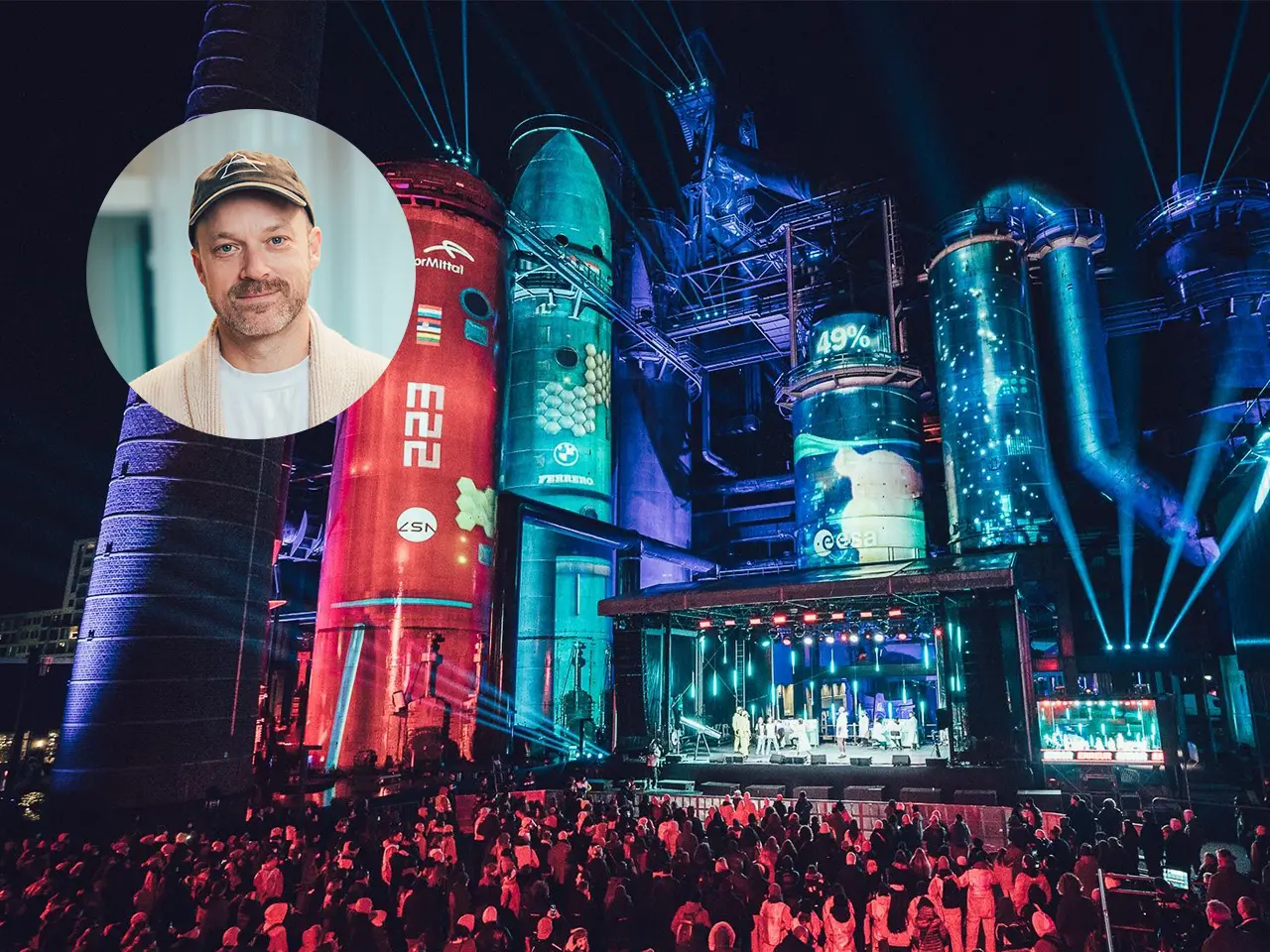

by Brendan Shelper
Credits ©
Photography – Paul Gärtner
For some, creativity flows as effortlessly as breathing, a natural talent to envision the world not merely as it is, but for its potential. Being inherently creative has always been a fundamental aspect of my identity, a seamless extension of my thoughts and perceptions. Yet, this limitless creativity is not without its challenges. The journey from initial inspiration to actual realisation is frequently marred by mental fatigue, doubt, and a ceaseless quest for perfection.
Occasionally, an innovative idea strikes the moment I’m briefed. This surge of insight is exhilarating, yet utterly beyond my control. Typically, the creative process involves collaborative brainstorming sessions, followed by a gradual piecing together of ideas—a method that requires patience. It’s a common misapprehension that a swiftly delivered idea implies another can be conceived with equal speed.
This overlooks the profound engagement the creative process demands. Deeply engrossed in ideation, the mind tirelessly operates, transforming even routine activities into backdrops for relentless thought. Switching off this continuous flow of creativity is a daunting task. Once an idea takes hold, my mind enters a state of hyperactivity, ceaselessly sifting through potential solutions until I’m convinced the outcome meets my stringent standards. This relentless pursuit, though exhausting, is also thrilling.
Doubt is a constant companion on this journey, challenging not just the quality of an idea but also its feasibility. These challenges are crucial, ensuring the eventual outcome is both innovative and achievable.
We create pieces reflective of who we are, and if insecurity is part of who we are, then our work will have a greater degree of truth in it as a result. The making of art is not a competitive act. Our work is representative of the self. You would be amiss to say, “I’m not up to the challenge.” Yes, you may need to deepen your craft to fully realize your vision. If you’re not up to it, no one else can do it. Only you can. You’re the only one with your voice.” – (Rick Rubin)
Interestingly, the pressure of an approaching deadline often acts as the greatest source of inspiration. It’s a peculiar phenomenon that the majority of our work materialises in the final quarter of the allotted time. This paradoxical relationship between time and creativity highlights how creatives thrive under pressure, delivering their most inspired work as the deadline looms.
“There’s a time for certain ideas to arrive, and they find a way to express themselves through us.” (Rick Rubin)
Meditation has proven to be an invaluable tool in my creative arsenal, not merely for inducing relaxation or enhancing focus but for navigating through a myriad of ideas to identify the most promising. Similarly, physical exertion, such as a brisk 3k run, significantly elevates my creative output. This synergy of meditation and exercise forms a potent duo for overcoming creative challenges.
Creativity is about finding answers and connections where others see none. It’s about bridging gaps, imagining the unimaginable, and bringing to life what previously existed only in the abstract. This ability to see beyond the horizon, to connect the dots hidden in plain sight, is what sets creatives apart. It’s a journey that is as personal as it is universal, with each creator navigating their unique path through the landscape of inspiration, and doubt, and the invigorating rush of creating.
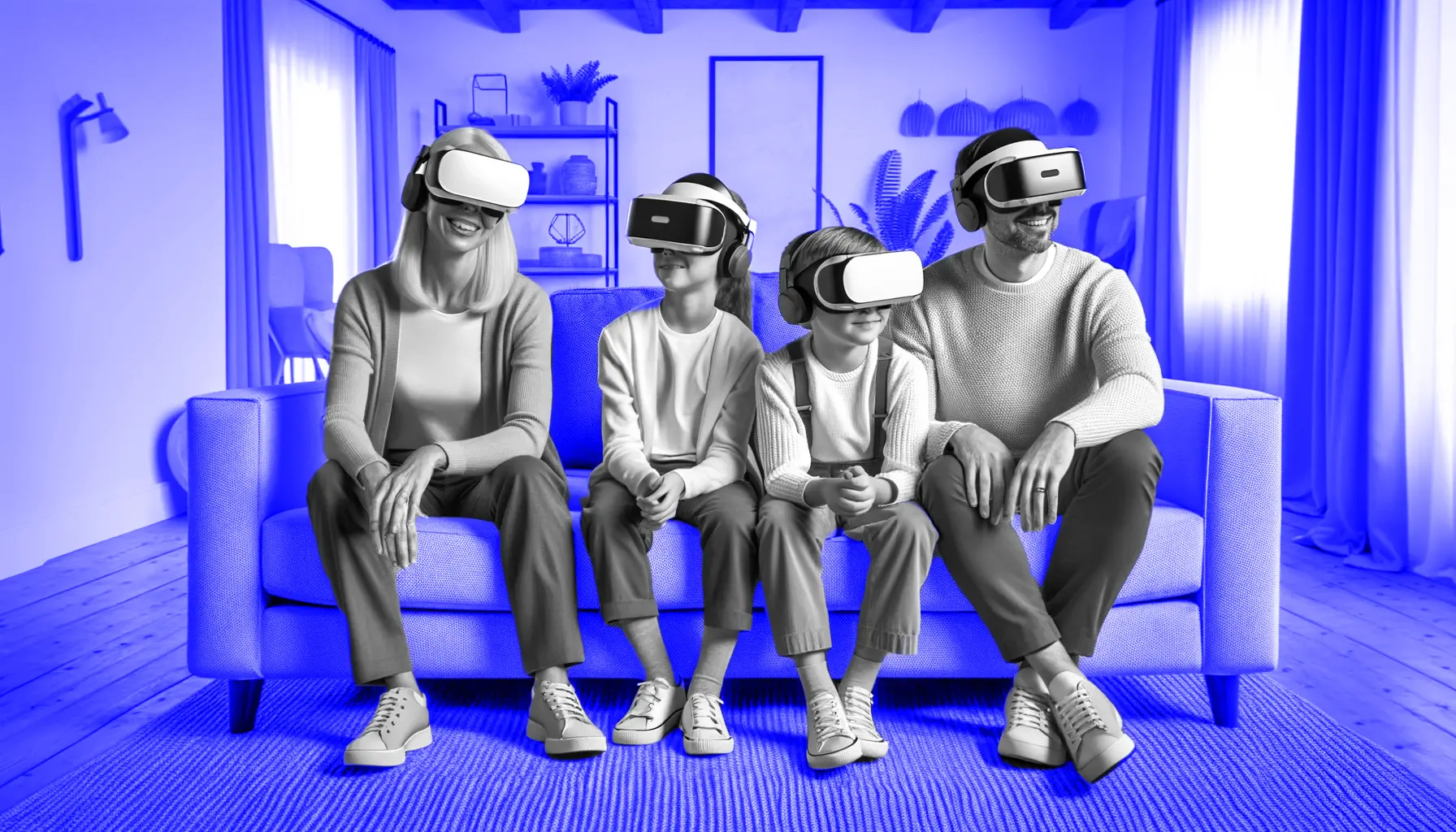

by Brendan Shelper
Credits ©
Artwork – Sofia Silva
The Apple Vision Pro, a pinnacle of virtual reality innovation, promises to immerse its users in experiences far beyond the capabilities of traditional media. It offers a gateway to being part of the story rather than merely observing it from the sidelines.
However, the immersive world comes at a significant cost, both financially and socially. With its high price tag, the Vision Pro might not be a feasible option for every household. Despite the lack of specific sales data in this initial offering (200,000 units in the first days of sales?), the industry is buzzing with speculation on its market penetration and impact.
The hype around the launch has me questioning. I am a devoted tech enthusiast but had to probe if such a device will change the way we experience togetherness, or simply isolate us further in our digital cocoons? For me, trying to imagine a scenario where each member of a family dons a $3,500 headset to watch a film or photo album in their living room is a bit of a stretch. Maybe an inaccurate scenario to be working with but this image forces us to confront the potential realities of our digital future outside the office, and what potential such VR devices (sorry, spatial computing devices) can offer us.
Financial and practical considerations aside, Vision Pro challenges our traditional notions of shared experiences. While it markets itself as a transparent window to the world, it serves as a barrier, isolating users in their own virtual spaces. This isolation raises questions about the device’s role in fostering genuine human connections.
As we delve into the possibilities that devices like Apple Vision Pro offer, we must also consider the broader implications of their use. How will these technologies affect our ability to connect on a human level? Is there a risk that the virtual experiences they provide could replace the warmth and spontaneity of real-world interactions?
At Battle Royal Studios, we’ve explored the utility of VR technology in creating immersive mock-ups and hosting public events. These experiences have proven VR’s value in bringing visionary projects to life and engaging audiences in new ways. Yet, they’ve also highlighted the technology’s inherent isolating nature, reminding us of the importance of maintaining a balance between digital innovation and human connection.
Particularly, talking about our youth, escapism, people diving into virtual realities to become someone they’re not, an avatar which ignores their physical self and disconnects them from their real selves is worrying. My last experience with family over the holidays was dominated with getting the kids off screens and out into the fresh air and physical activities, I can only imagine what it is like to deal with this every day as a parent. Let’s not kid ourselves, the addiction to such enhanced environments is enormous.
Despite its marketed transparency, the Vision Pro is undeniably a VR headset, designed to encase the user in a virtual environment. The external screen and glossy advert images may suggest a window to the outside world, but it’s very much a closed goggle system.
Here’s a full product breakdown video of Apple VP, very comprehensive and after a single day has close to 10m views at time of posting.
Coming back after Covid has shown us just how important and sacred shared moments are for the general well-being of society.
The goal should not be to replace the shared laughter, whispered comments, or telling your partner to get off their phone and watch the movie but to find ways to amplify these moments, ensuring that our journey into the virtual realm brings us closer, not further apart. We must carefully balance the allure of digital immersion with the timeless value of human connection.
A hilarious link to AVP use in the States.
Having just returned from Las Vegas, I can say there were no such user cases in public that I ran into.
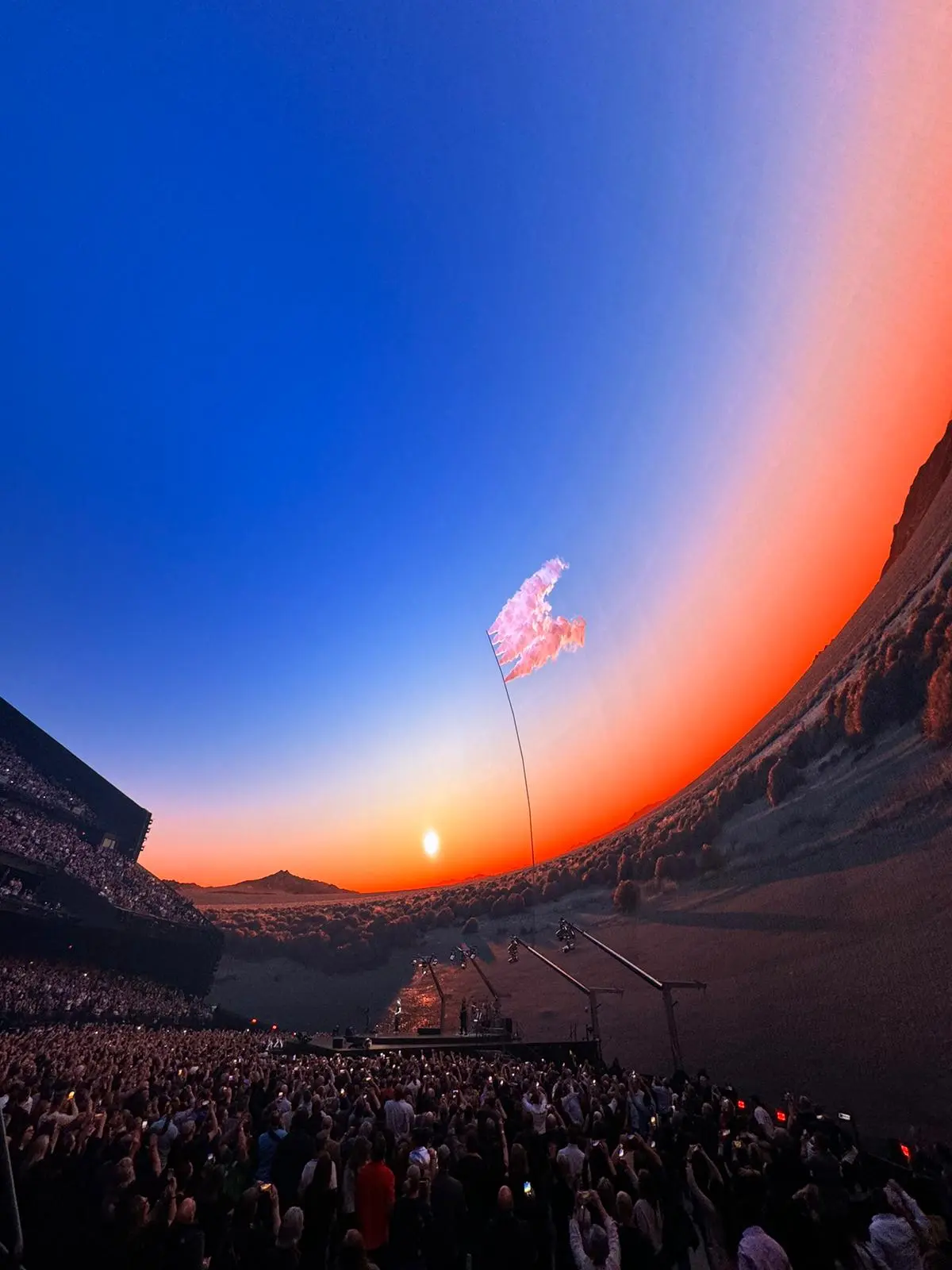

by Brendan Shelper
Credits©
Photography – Brendan Shelper
In the heart of Las Vegas, amidst the neon glow and the hustle, lies a new marvel not just in architecture but in the very fabric of live entertainment. The Sphere, a venue that has been the talk of the town for its exterior splendour and branding prowess, recently unveiled its true magic to me—and it was nothing short of transformative.
Our challenge was to facilitate a seamless check-in for The moment U2 took the stage, an electrifying wave of anticipation swept through the 18,000 spectators. As the giant spherical LED screen came to life, the collective gasp and roar of the audience embodied the shock and awe of witnessing something unprecedented. Glancing back, I caught the wide-eyed wonder of a fellow spectator, his silent “WTF” echoing the sentiment of all present. It was clear; we were part of a historic moment.
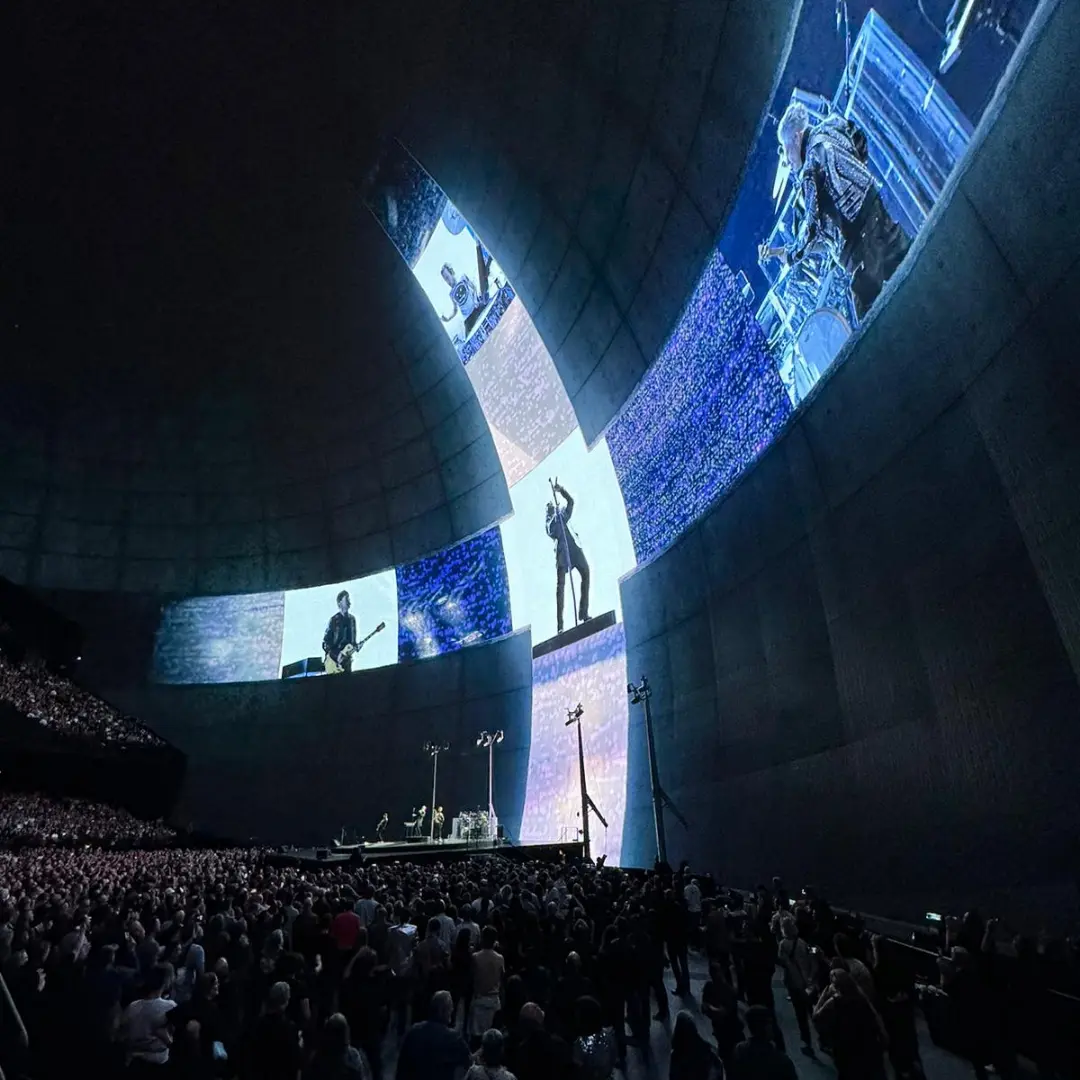
Bono’s mid-set public address that “our meeting was about the music” resonated deeply, The interlude, meant to anchor us in U2’s musical journey, ironically underscored the night’s revelation: The Sphere’s immersive visuals and technological grandeur far outshone the music. Despite U2’s iconic status and their music’s profound unifying power, the venue’s wizardry ensnared our senses, positioning the music to a secondary role. The Sphere had, perhaps unintentionally, eclipsed the performance, becoming the star of the show.
This evening was more than a concert; it was a demonstration of The Sphere’s transformative potential. The venue offered a mass communal experience unmatched by cinema or current virtual reality. Sharing this moment of visual euphoria with thousands, we stepped into a new dimension of communal entertainment—a seismic shift in the collective live event experience.
Behind the scenes, The Sphere’s technological prowess is equally astonishing. A personal tour revealed the meticulous detail that went into installing over 1.2 million LED components and an intricate custom-built speaker array. This was no small feat; the venue redefines the boundaries of technological innovation, with every element engineered from scratch to support the massive data requirements of its visual and auditory spectacle.
Witnessing The Sphere in action is to witness ambition realized. MSG’s bold vision to create, finance, and bring to life such a colossal project has not only altered the Las Vegas skyline but has also set a new benchmark in entertainment experiences. It prompts us to dream bigger, to look at the ordinary with extraordinary eyes, and to pursue visions with relentless ambition.
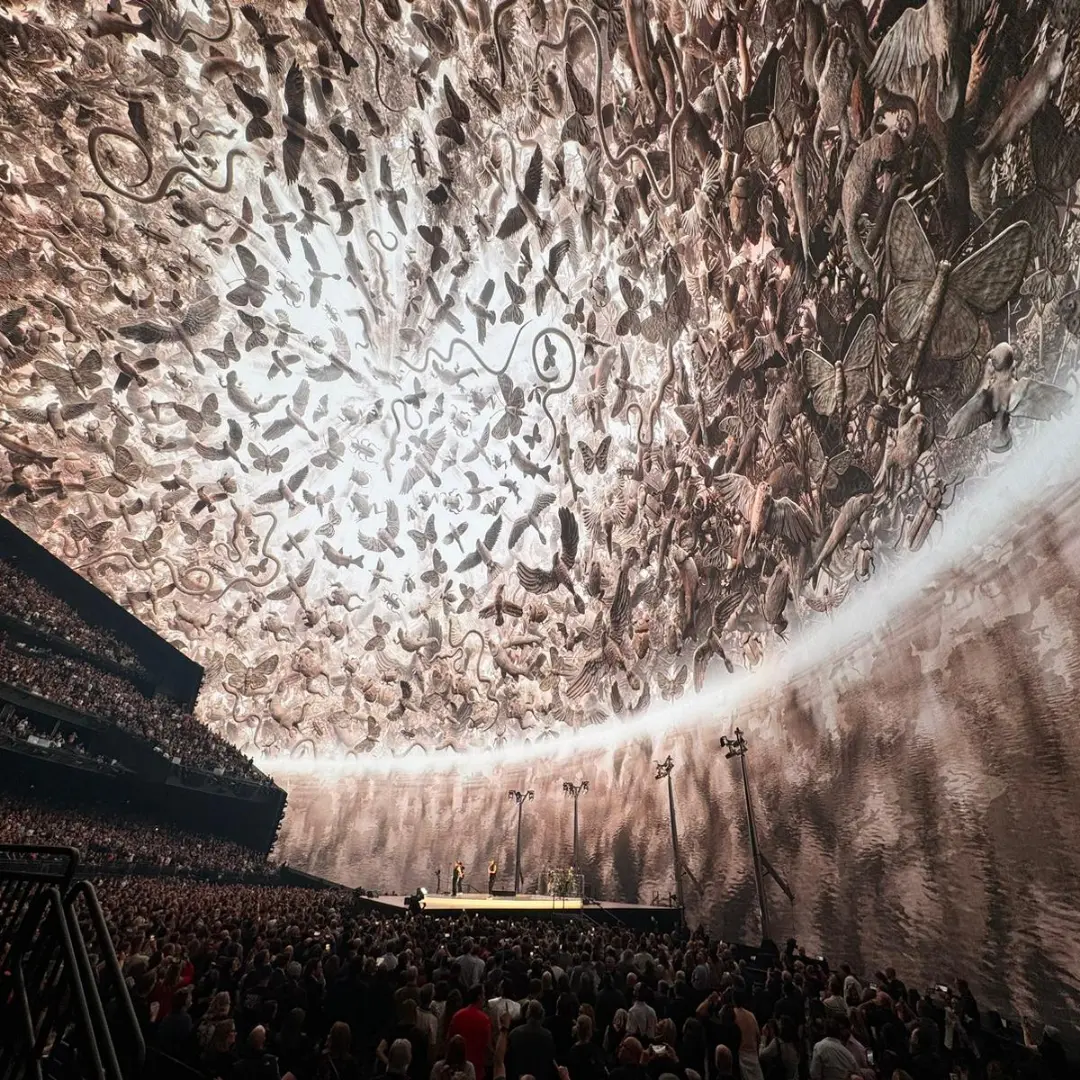
As the night drew to a close, the implications of what I’d experienced fermented. In a domain where technological spectacle can overshadow even the most revered music, we are prompted to question the future role of artists within such spaces. The Sphere beckons us to envisage a new era of live events, one where the venue itself emerges as the main draw, challenging artists and audiences alike to adapt to a mesmerizing new world of entertainment.
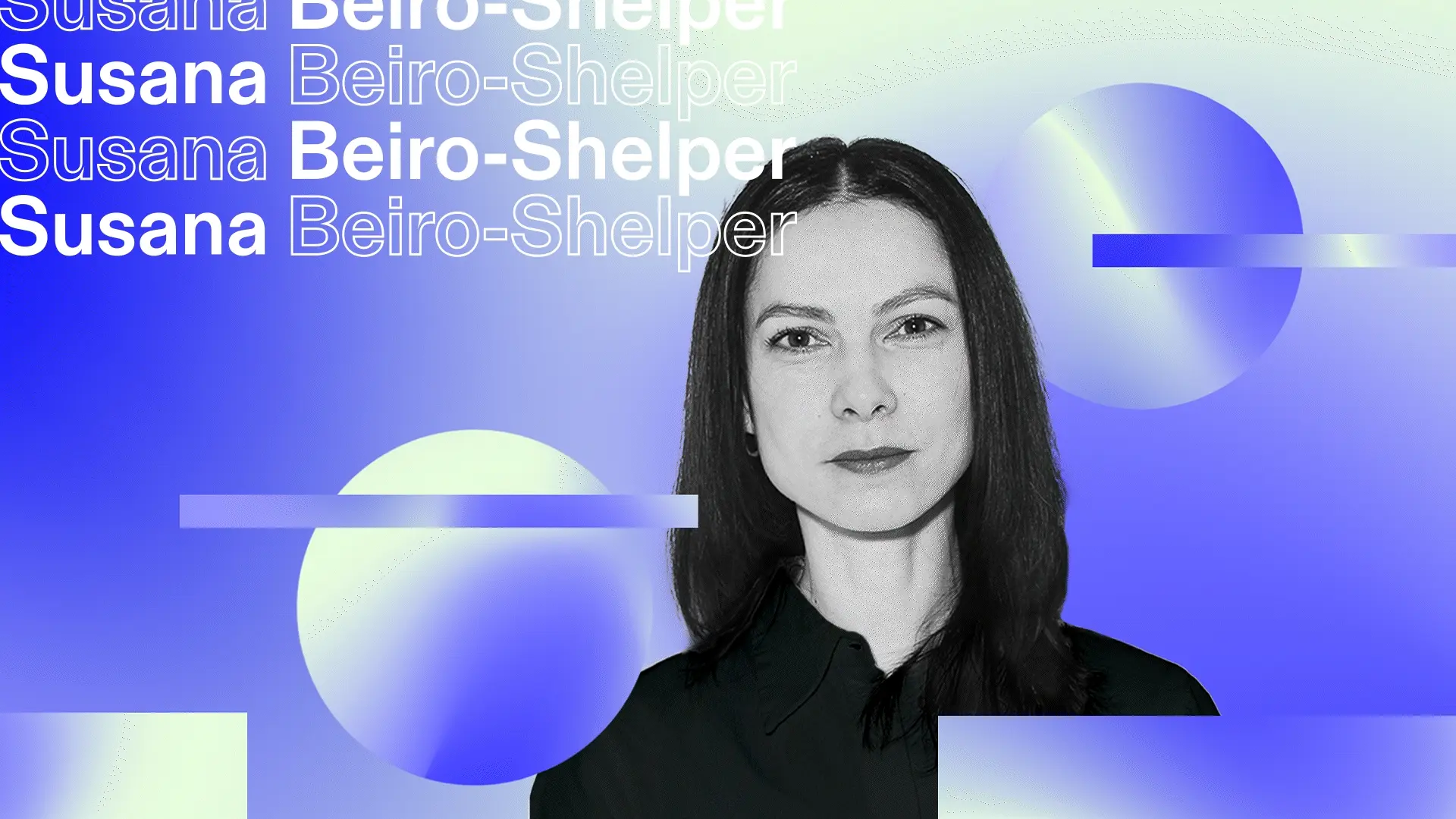

by Susana Beiro Shelper
Credits ©
Artwork- Sofia Silva
The role of nutrition in boosting workplace productivity and promoting employee well-being is crucial and diverse. A balanced and nutritious diet can positively affect both physical health and cognitive function. To initiate this positive change, focusing on snacking habits and educating the staff about the connection between food and behaviour is a good starting point.
Encouraging the team to make informed choices during snack times is key. While employers have a responsibility to provide healthy snacks to avoid unnecessary temptations, the approach should not involve deprivation. Instead, the emphasis should be on motivation and education. For instance, promoting options like a handful of nuts and a slice of apple during afternoon slumps rather than reaching for chocolate can contribute to better choices.
Importantly, the approach to educating staff should be informative rather than imposing. Topics such as Mood and Stress Management can be highlighted, explaining how certain nutrients, such as those found in omega-3 fatty acids, complex carbohydrates, and B vitamins, positively impact neurotransmitter function. This understanding can potentially reduce stress levels and enhance overall well-being.
By incorporating such strategies, we aim to create a workplace culture that values health and well-being while providing practical insights for making healthier choices.
This topic frequently arises during casual conversations near the coffee machine, often glancing at the fruit bowl on the table. The dialogue might shift from someone expressing a craving for chocolate to playfully deciding on the healthier choice, like opting for an apple—complete with a laughter-filled “haha!” It’s a laid-back atmosphere, but the available options are somewhat restricted.
In addition to the casual snacks, we’ve set up a fully equipped kitchen and fridge, complete with personalised containers for each team member. We actively encourage everyone to bring their own home-cooked meals or store ingredients in the fridge for a speedy and convenient cooking session. This way, we aim to strike a balance between the casual, fun moments and the practicality of having diverse food choices readily accessible.
Maintaining an ongoing dialogue and fostering a collective interest in stress management is particularly crucial. Frequently, we find ourselves slipping into unhealthy coping mechanisms during stressful periods. Our brains have their own strategies to maintain happiness and motivation in such times.
It is imperative to recognise these behaviours and enlighten the team about alternative approaches. For instance, when feeling stressed or fatigued, one might consider taking a brisk walk around the block instead of succumbing to emotional eating. This can be coupled with a walk-and-talk session with a colleague, creating an opportunity for both physical activity and quick catch up.
BRS provides flexible work arrangements tailored to each position. These arrangements typically include options for remote work, fostering a better work-life balance, and supporting childcare needs.
In the past, we successfully offered a meditation course, though we recognise the importance of keeping such practices current. Plans are underway to refresh this initiative for continued employee benefit.
Furthermore, we contribute to gym memberships, understanding the interconnectedness of physical activity and mental health. Our aim is to motivate our staff to prioritise time for these activities, recognising the positive impact on their overall well-being.
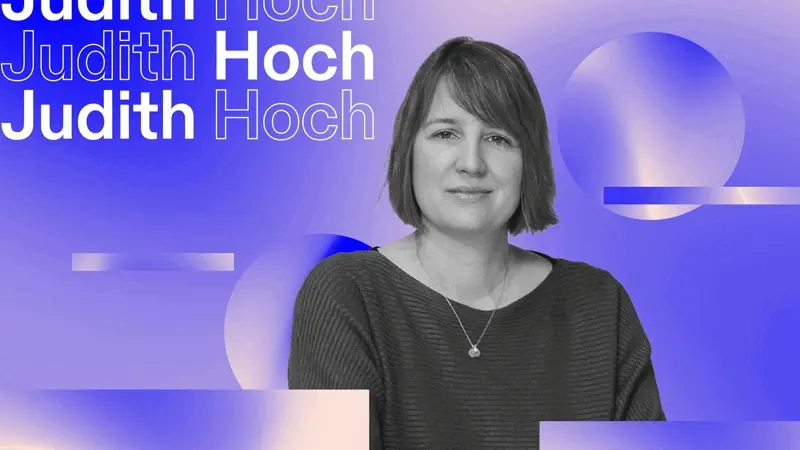

by Judith Hoch
Credits©
Artwork – Sofia Silva
We view creativity and profitability as complementary forces. Our strategy involves a careful balance of cultural and corporate projects, which has been key to our growth and resilience in a dynamic industry.
Pricing our services involves a thoughtful blend of valuing our creative work and understanding market dynamics. It’s about fair remuneration for the unique skills of our team while remaining competitive. This approach ensures we deliver value to our clients and sustain our artistic integrity.
Our longevity comes from staying open to new opportunities and embracing diverse talent. We bridge different sectors, like theatre and corporate, bringing unique perspectives to our projects. This has been essential for staying competitive and innovative.
Remain adaptable and open-minded. The creative industry is full of surprises, and success often hinges on the ability to embrace change. Also, diverse talents are invaluable; they bring new ideas and help craft innovative solutions for a broad client base.
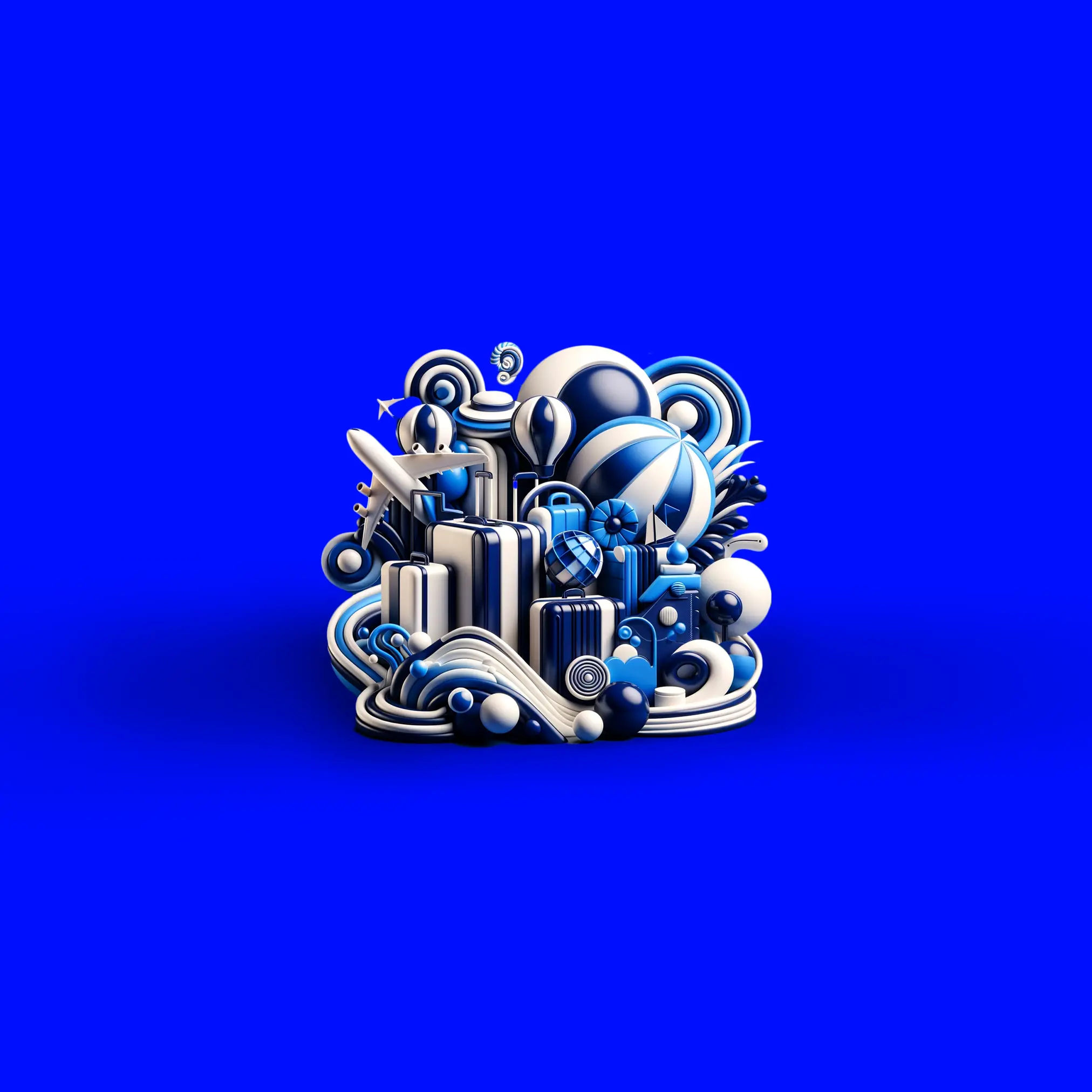

In an era marked by rapid technological advances, the emergence of GPT Agents stands as a testament to the transformative power of AI. These advanced chatbots, set to evolve into more intuitive, responsive, and interconnected entities, are leading to their widespread adoption across various industries. This significant uptake is forging a network of AI systems, revolutionising sectors like event planning and redefining operational frameworks with unparalleled efficiency and personalisation. Imagine chatbots communicating autonomously, orchestrating complex tasks without human intervention – the possibilities are thrilling.
ChatGPT, at the forefront of this AI revolution, has already made a significant impact as a guide and research tool in travel and vacation planning. With the imminent launch of OpenAI’s Store for GPTs, users will soon be able to purchase specialised GPT agents for highly specific tasks, such as finding unique tropical getaways.
Envision going a step further, where your GPT agent, armed with your credit card details, is prompted to “Plan me a unique summer vacation.” With one command, the bot would connect with Skyscanner’s chatbot and book flights, contact local transfer firms and handle your pickup, digest all Booking.com’s best prices and accommodation, book leisure activities attuned to your needs, and even make restaurant reservations based on your known tastes and preferences. This scenario isn’t just convenient; it represents a monumental leap in AI’s role in our lives.
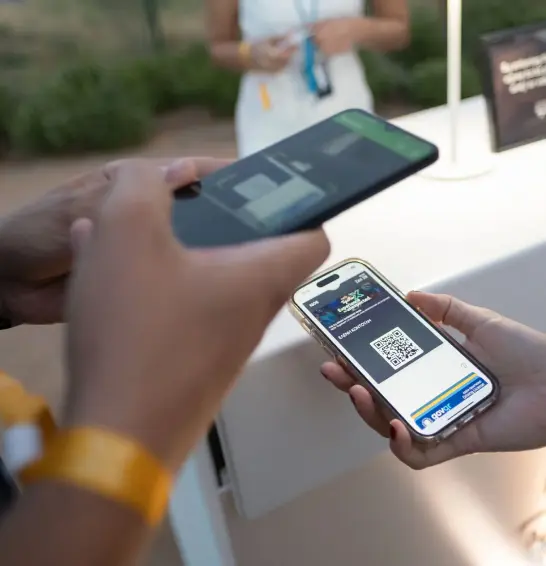
In the event planning sector, GPT agents will soon handle 90% of the pre-organisation tasks. They will negotiate with service providers, manage bookings, and ensure operations are executed efficiently and smoothly.
This interconnectedness will streamline event planning operations, handling everything from hotel bookings to talent acquisition, all with a level of precision and efficiency previously unimaginable.
If you’re struggling to imagine how this might function, check out this video I made demonstrating an existing agent tool completing such a task, it’s quite remarkable.
This evolution raises critical questions for the event planning industry, particularly for traditional agencies. How they adapt and integrate these AI tools will be crucial for their survival and growth in this new AI-dominated landscape. Not to mention all other industries that will be disrupted.
In the event planning sector, GPT agents will soon handle 90% of the pre-organisation tasks. They will negotiate with service providers, manage bookings, and ensure operations are executed efficiently and smoothly.
The potential of AI, as highlighted in The Coming Wave: Technology, Power, and the Twenty-first Century’s Greatest Dilemma by Mustafa Suleyman. He writes about the latest ‘litmus test’ for AI, which is to give it the instruction to “make me $1million selling stuff on Amazon”.
The AI bot will scan Amazon for the most profitable products, design something new, have it made in China, list it online, write all the ad copy, manage fulfilment and customer service with the goal of depositing $1million into your bank account. Underscoring the capabilities of these systems to autonomously perform complex, profitable tasks.
This article aims to illustrate the profound impact AI could have on industries like event planning, where tasks that require extensive coordination, but not necessarily high creativity levels can be efficiently managed by AI. This shift allows human planners to focus more on creative solutions and personalised experiences, enhancing the value they bring to the event planning process.


Warning! This article is full of aviation puns and references. Continue reading at your own peril.
Navigating the business world alone is a daunting task. It’s exciting, sure, but it’s also fraught with uncertainties and challenges. This is where the role of a co-CEO becomes a game changer. While consultants can fill gaps temporarily, these relationships are often transient and don’t offer the long-term growth and support a true business partner can provide.
My experience as co-CEO of Battle Royal Studios, alongside Judith Hoch, has highlighted a crucial truth: having a co-pilot in business is not just beneficial, it’s essential.
In aviation, the role of a co-pilot was instituted for a fundamental reason: to ensure that there is always someone capable and ready to take over control of the aircraft, should the need arise. This principle holds true in the realm of business as well. Having someone to share the cockpit of your enterprise means there’s always someone to help you navigate through turbulence and keep the journey on course.
In the play of decision-making and strategy in business, having someone who understands the nuances and shares your vision can make all the difference. This individual understands the granular aspects of your business that friends and family may not. They stand with you, aware of your biases, recognising your strengths, and lend a hand over hurdles when exhaustion or apprehension holds you back.
However, within a boutique creative agency like ours, the role of your business ally extends beyond major decisions. It involves continuously revisiting and adjusting the strategic roadmap, guiding each other’s choices to ensure moral integrity, detailed planning, and precise execution. This relationship often transcends the typical ‘team’ dynamic, evolving into a deep, intrinsic connection, often stronger than the bonds we share with family, given the significant time spent together in professional settings.
The ideal co-pilot isn’t necessarily someone you always agree with, but rather someone whose opinions you respect and whose ideals align with yours, even if they evolve over time. This person doesn’t have to be someone you love, but you’ll likely grow to respect and care for them deeply. Together, you’ll experience the highs and lows of business, forming a mutual support system whilst maintaining your individualism.
Finding someone who is ready to invest in you as you are in them can be transformative.
Together, you can face challenges head-on, seize life-changing opportunities, and provide each other with the security and encouragement needed to succeed.
As you navigate the business landscape, consider who might be your equivalent of a co-pilot. Identifying this person isn’t just about finding a business partner; it’s about discovering a collaborator who will share your journey, challenge you, and stand by you through the triumphs and trials of entrepreneurship.
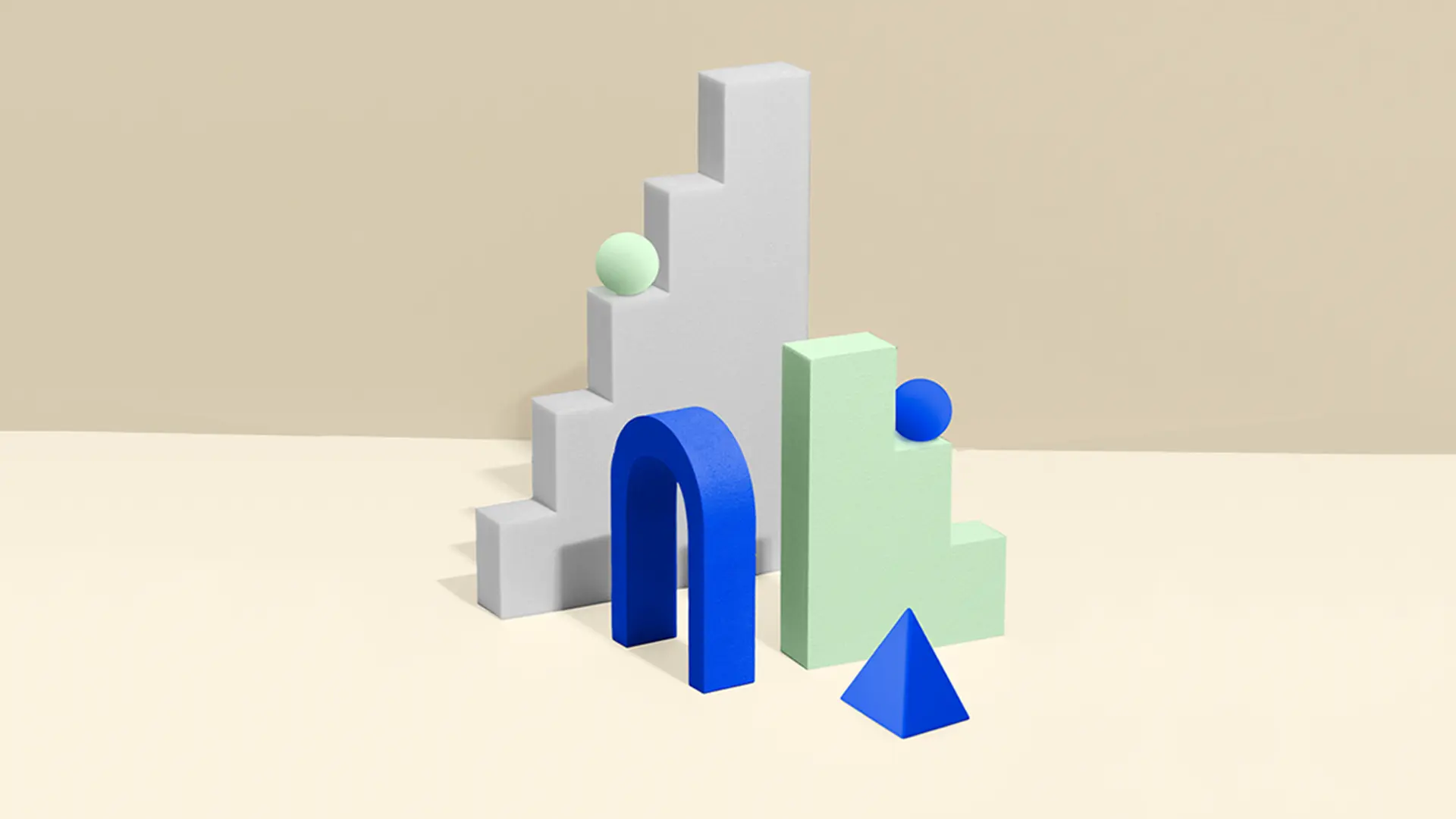

by Jon Buckels
Credits ©
Artwork- Sofia Silva
Convincing clients to gamify their event can be a difficult task, especially for brands scared it might not suit their messaging, or be too playful or seem childish or immature. Some believe it’s unsuitable for serious topics, while many sadly just don’t trust their guests will participate and are worried interactions could fall flat.
However, as someone who has worked on some truly impactful and bespoke events and attended even more, I found that even the most premium brands and serious subjects can be enhanced by the element of surprise and giving guests a sense of control.
For years now attendees are expecting more and more influence in entertainment, maybe spurred on by the two-way communication enabled by social media, they are no longer moved to just see a branded event backed by catering and some traditional show elements. The demand for near constant and personalised gratification has raised the bar, challenging creatives to design experiences that go beyond the conventional. Gamification can turn ordinary events into extraordinary memorable interactive playgrounds.
Designing gamified events is like orchestrating a symphony that resonates with a diverse audience on a spectrum that includes first-time attendees and seasoned participants. Understanding the varying levels of interaction is crucial to ensure everyone feels engaged throughout the event. And with most guests not being forwarded what lies ahead, the introduction of self-actualisation in events needs to be handled well.
The worse pitfall of gamification in events I have witnessed came when a hard-to-grasp or overly exerting user journey was forced too quickly on the guests. Bombarding the guests with rules and tools for their night ahead can put many on the backfoot and reduce instead of increase engagement.
To win over client during conception, and participates on the night, injecting gamification needs to be taken in baby-steps. Starting from registration and through each ongoing interaction needs to be crafted to match, and hopefully expand, their comfort level. And the investment in briefing all the staff to not break the momentum can really help the guests to get into the swing of the event and keep their suspension of disbelief intact.
While attending Secret Cinema’s Casino Royale, a beautifully complex immersive theatre show (which has the huge bonus of all the audience arriving with a very clear understanding of the event) our group had gotten a bit off track, and we ended up asking a normal security guard protecting the perimeter if he knew where our task should have taken us. Amazingly, he refused to help us until we realised, he was also keeping in character: We had to bribe him some play money we had received earlier to get him to give us advice. Simple, but our suspension of disbelief was reinstated, and we managed to dive back in.
Not all events would suit or need this level of immersion. But the more the whole environment can be maintained by keeping up the immersion, then the overall effect, and the guests’ willingness to get caught up in the moment will increase. Simple acts like gamifying elements of catering can change the pedestrian act of ordering a drink into a group activity, but we also make sure that those who are not yet ready to actively participate still feel accepted and enthralled. We always keep in mind that not every guest wants to be so active, but this level of gamification and choice gives everyone the chance to choose their level of engagement.
To engage with diverse attendees, it’s essential to deliver the brand message through different activation levels. Not everyone wants to play a major role, but knowing others of your peers have stepped-up creates a communal reward. When a headline performer bursts onto the stage, everyone is thrilled, but when the crowd feels they have somehow influenced this arrival they feel much more connected to the event.
For years, audiences have screamed out for encores. This might be the simplest version of the crowd action and reward, and we all know it works. If we are raising the interaction to growing tasks over the course of the night, those who want to play a bigger role have the opportunity, while those who choose to be bystanders do not feel excluded. We leave opportunities for anyone to step up to the next level of interaction if that would enhance their personal experience.
BRS created an interactive exhibition for a government taxation and importation agency in the Middle East. Not a topic that might scream “fun”. NTC tags were embedded in prop packages carried by guests.
Each one triggered unique video content on surrounding screens, surprising the guests as the packages were scanned and some reacting as if the package contained contraband, triggering sniffer dogs to burst into action while also triggering important facts and key aims of the agency. Even a seemingly serious topic became a thrilling experience, delivering the message of import security in a hands-on and share worthy installation.
Just as immersive theatre captivates audiences; we have infused that power of self-exploration into events. We took a Fortune 500 company’s launch of a ground-breaking and industry-changing product and created a free-roaming event designed to explain the company’s motivation for a huge pivot in purpose while also introducing the new product. But we did it in a fun way!
We broke the unsuspecting audience into small manageable groups to brief them that the night was going to be not quite what they expected. We divided the audience into three opposing teams and got our dozens of actors to try to get them to change alliances and tip the narrative of the event in their group’s favour.
The aim was to get them open to the experience of change, the willingness to understand why innovation is needed and why the strength to be flexible deserves a reward.
All without ever directly mentioning the product or client, instead infusing every step of the narrative with the company’s core pillars and the belief in a better future. The results were astonishing. Over 90% of 2000+ guests embraced the shift in the company’s paradigm by trading up to the new product, proving that gamification can change minds and attitudes.
While playfulness is at the core, staying aligned with the client’s branding and messaging is crucial. Each gamified element must be linked to reinforce the brand’s principles or highlight specific products/values. It’s a delicate dance between fun and meeting the client’s objectives.
Gamification is the secret sauce that transforms ordinary gatherings into extraordinary interactive playgrounds. Tales of tax agencies and tech giants embracing the playful side prove that even the most serious topics can benefit from a dash of excitement. Gamification allows each guest to forge their own unique experience, allowing them to choose their level of engagement, and the result will touch them more deeply and honestly than any one-size-fits-all experience ever can.
The goal is to create versatile events that cater to the varied expectations of each guest. These events are spaces where the adventurous can fully immerse themselves, engaging with performers, experimenting with technology, and delving into the intricacies of a complex story. Meanwhile, those who prefer a more observational role can enjoy the event without feeling left out.
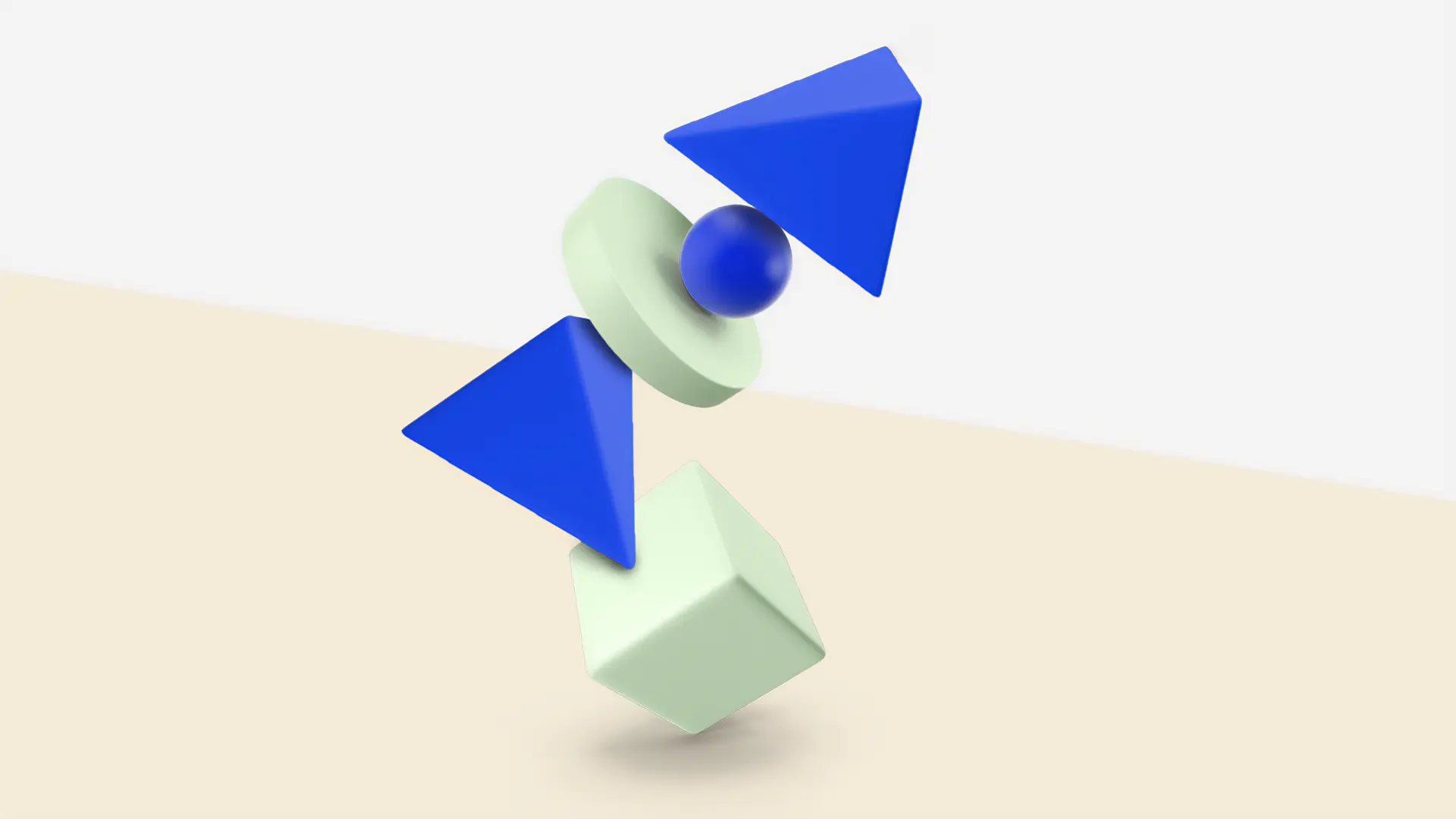

by Brendan Shelper
Credits©
Artwork- Sofia Silva
In today’s event landscape, there’s an increasing need to push the boundaries of creativity and engagement. Despite a significant return to in-person events, many brands and companies still hesitate to fully leverage the innovative tools at their disposal, leaving a wealth of untapped potential.
Brands and companies have the opportunity to redefine live events and connect authentically with consumers. By blending technology with physical activations, the only limit is creativity.
In the coming weeks, we’ll explore and advocate for the bold, innovative use of technology in live events. Our goal is to craft experiences that deeply resonate with audiences, using every available tool to elevate these moments and bring them closer to the brand or narrative.
It’s not always about complex systems and inventions. There’s a wealth of existing tools that most brands can use to draw guests closer to the content. This is where the magic happens.
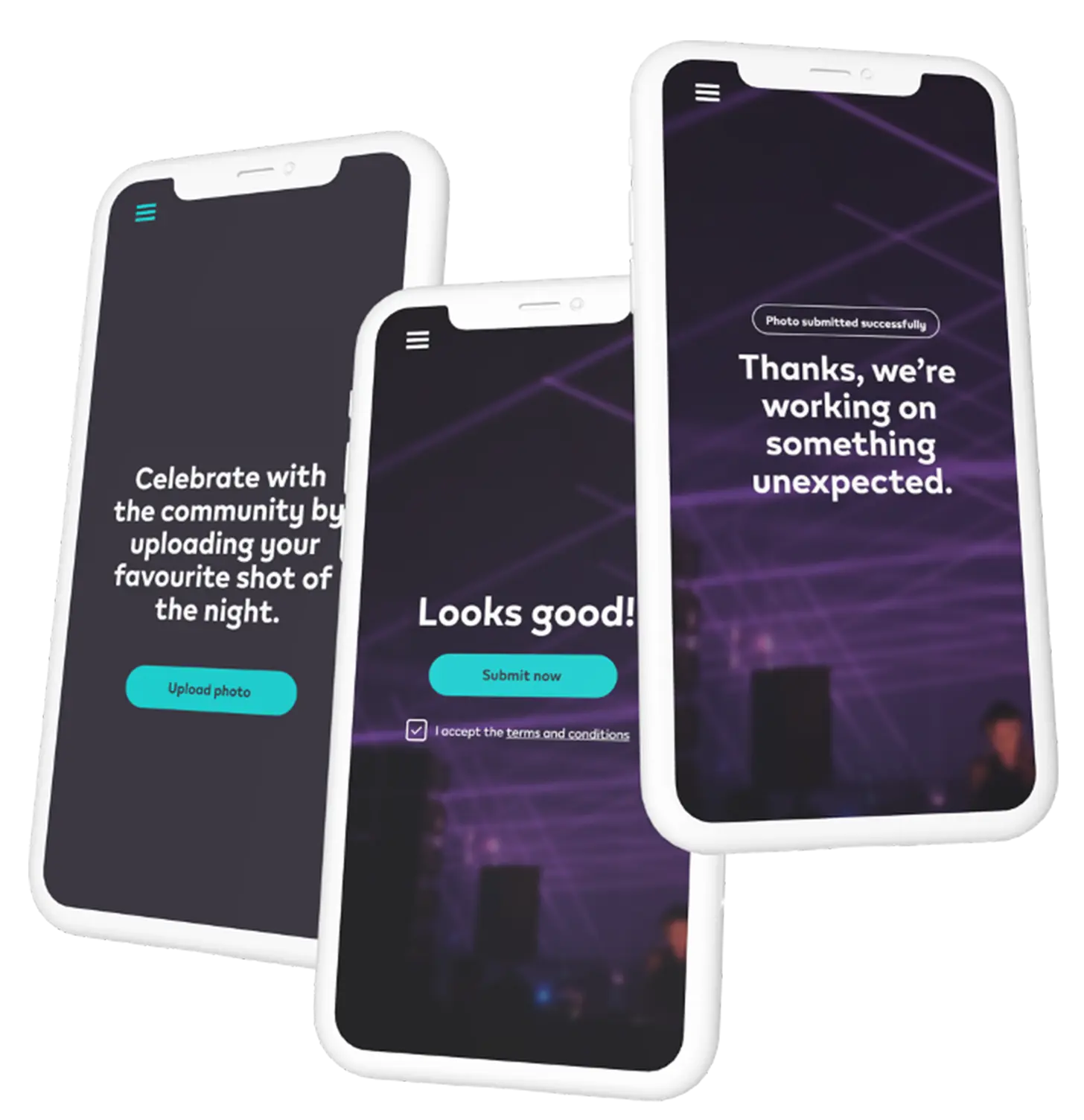
1. Put your guests in the driver’s seat
Transform standard events into memorable, immersive experiences by enhancing audience engagement. Give guests options to tailor their journey through web-based services or apps. Tactics like ‘choose your own adventure’ or QR code treasure hunts can ignite a flurry of activity around a basic event concept.
2. Get them creating
In a world where consumers constantly seek new experiences, keeping them creative is key. Mix user-friendly tech with fun prompts to stimulate imagination, ensuring your event remains relevant and captivating. User-generated content is an underutilised tool. With hundreds of minds in one place, leverage their participation to create bespoke, shareable content for your brand.
3. Enhanced interaction
As we embrace this new era of events, it’s crucial to stay hungry for innovative ways to leverage live audiences. We’re not just returning to live events; we are reimagining them. The underutilisation of current technologies is not a limitation but an opportunity to create, invent, and lead in the realm of hybrid event experiences.
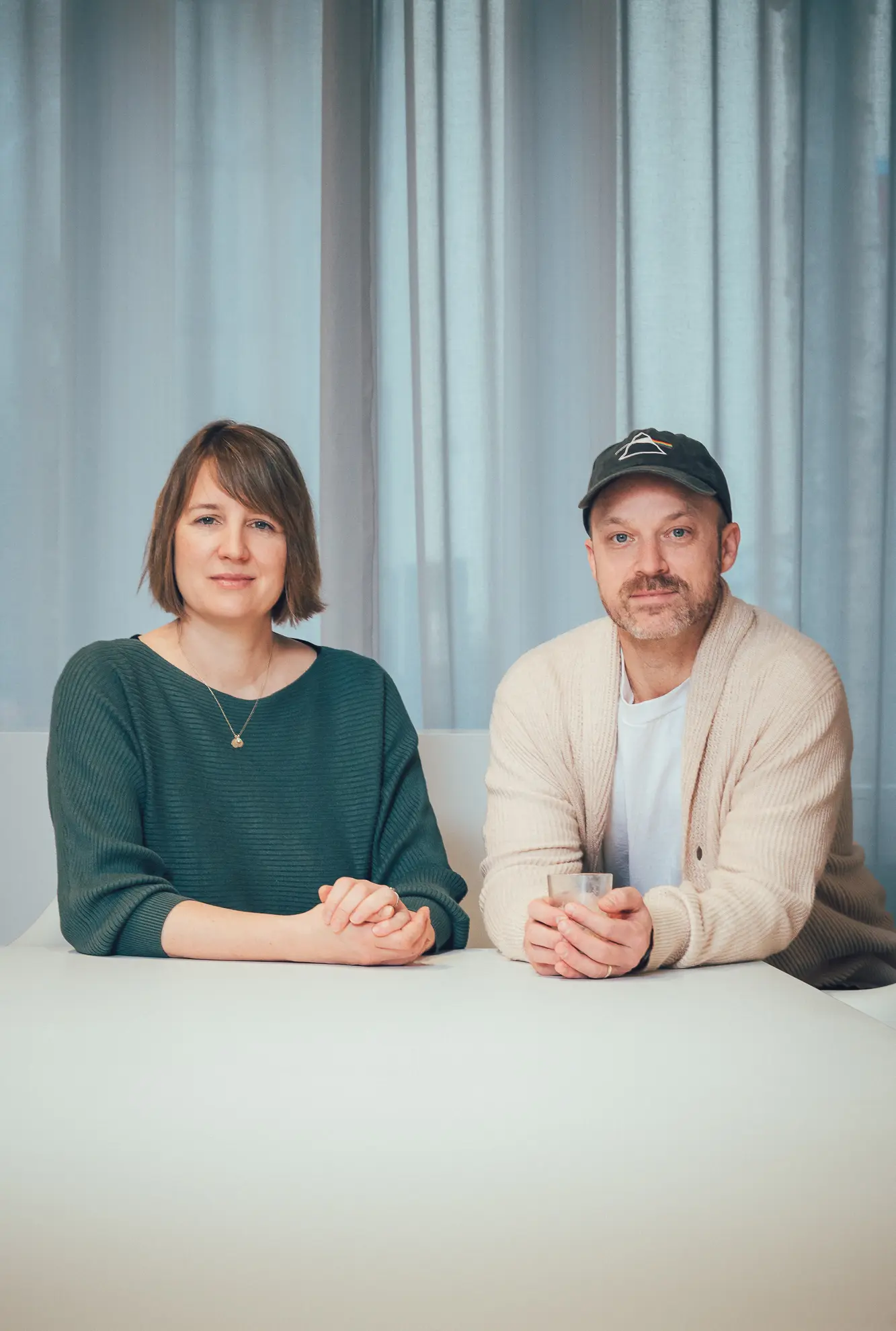

by Judith Hoch
Credits©
Photography – Chris Kuhnert, Brendan Shelper
In January 2022, I assumed the role of Co-CEO with existing CEO Brendan Shelper at Battle Royal Studios, embarking on a transformative journey that has profoundly influenced my perspective on leadership. This article delves into my experiences and insights since stepping into this role, addressing key questions about CEO transitions, the challenges every new CEO faces, and the dynamics of having two CEOs.
The transition to a CEO position signifies a pivotal moment for any organization. It involves more than a change in title; it’s a fundamental shift in responsibility and vision. In my case, the transition required a meticulous examination of our processes and the documentation of how we operate. While we had a well-functioning machine in place, my transition to Co-CEO underscored the importance of having these processes documented. This not only ensured continuity but also introduced a more structured and efficient approach.
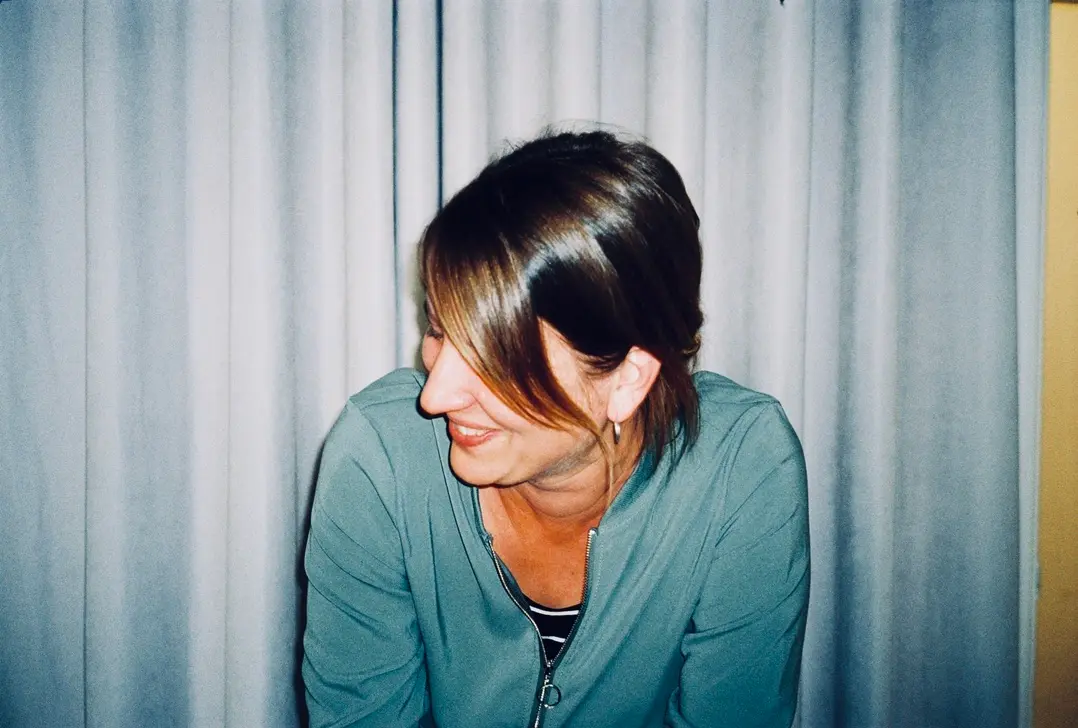
Whether serving as a solo CEO or sharing the role in a dual capacity, new CEOs commonly encounter three significant challenges. Firstly, they must establish a clear vision and strategy for the organization, defining long-term goals and the path to achieve them. Secondly, they must navigate the complexities of team management and cultivate a positive workplace culture.
Lastly, they need to adapt to the ever-evolving business landscape, making timely decisions to maintain the organization’s agility and competitiveness. My journey as a Co-CEO mirrored these challenges, demanding careful consideration and innovative solutions.
The idea of having two individuals sharing the CEO title may raise questions about decision making and leadership dynamics. At Battle Royal Studios, we’ve discovered that having two CEOs can be a clear strength. It allows for diverse perspectives and a more comprehensive decision making process.
Collaboration and alignment on core values and objectives are essential in this setup, as they help avoid conflicts and ensure a united front. Our successful experience revolves around playing to each other’s strengths and establishing a harmonious leadership structure.
Shifting my focus from operations (as former COO) to a broader perspective has been an enlightening experience. It’s not solely about managing the mechanics of the company but also about nurturing the heart of our organization – our team. In an ever-evolving world, the value of a dedicated and motivated team cannot be overstated.
Over the past years, we’ve taken pride in our exceptional team retention rates. This achievement has reinforced our belief that investing in our team is the right path forward. Our team members are not mere employees; they are the driving force behind our success. Their dedication, expertise, and unwavering commitment have played a pivotal role in helping us navigate through challenging times.
As the post pandemic world reshapes how people work and redefine their career aspirations, we recognize the importance of adapting to this new reality. It’s not only about retaining talent, but also about empowering our team to thrive in a changing landscape. We’ve emphasized flexible work arrangements, support for remote work, and fostering a culture of continuous learning.
Moreover, we realized that additional guidance and outside perspectives would be highly beneficial for our resilience strategy in order to make the best decisions for our future. This realization led us to establish an advisory board. We explored various types of boards and concluded that an advisory board was the ideal fit for us. This select group of individuals, with their wealth of experience and expertise, has provided invaluable insights and challenged our thinking. Our commitment to constructive criticism and continuous improvement is integral to their contributions. The insights from our advisory board and our dedication to our team serve as key elements of our resilience strategy.
As I reflect on my journey as a Co-CEO at Battle Royal Studios, I’m reminded of the importance of adaptation and evolution. CEO transitions, especially in a dual role, are complex but manageable. By addressing potential disadvantages, embracing challenges, and leveraging the strength of two CEOs, we’ve navigated this journey successfully. With a focus on future resilience, we’re well prepared to thrive in an ever changing business landscape. In this context, reading the article from Jason Cobbold about planning for uncertainty, I’m further convinced that our strategy for future resilience is the right way to go. It underscores the significance of adaptability and preparedness in a dynamic world.
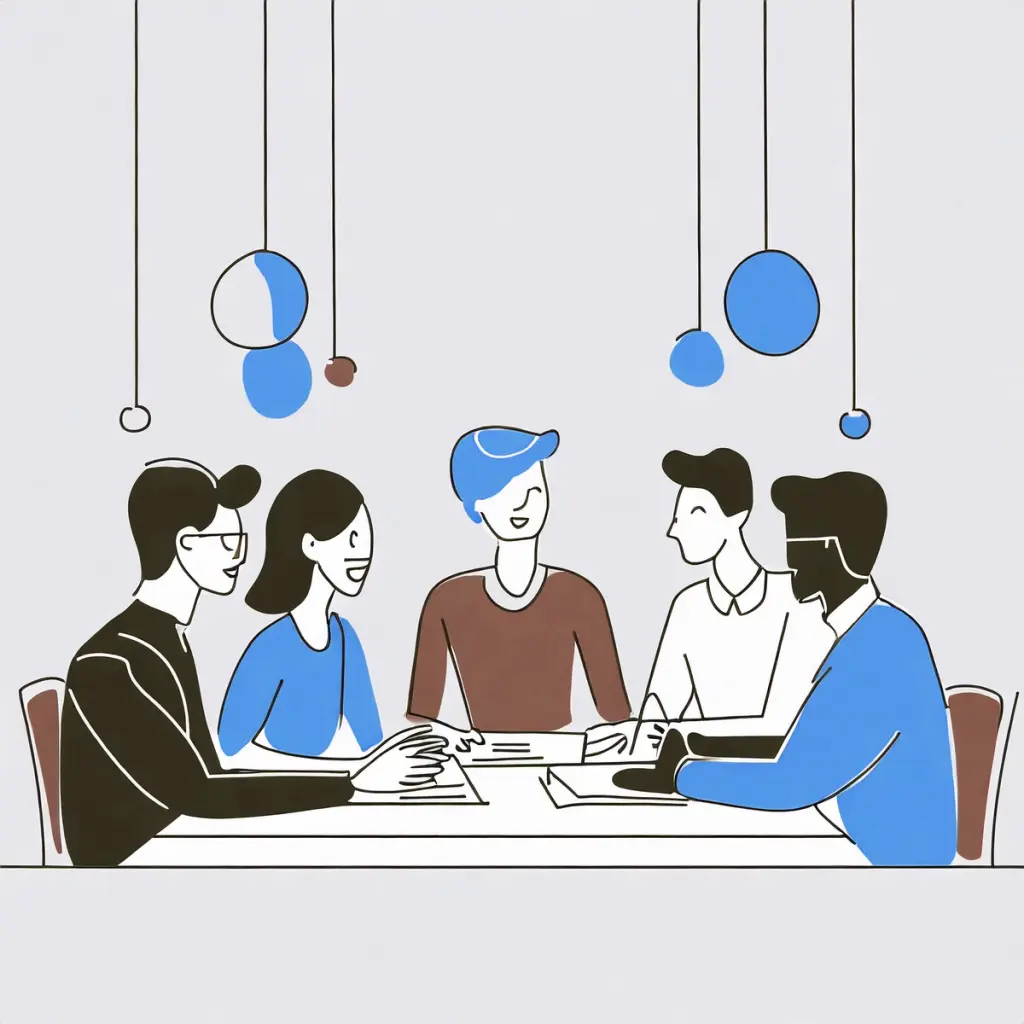

by Ky Lloyd
Credits © Artwork- Sofia Silva
The foundation of any high-performing team is the quality of relationships that its members share. These relationships are built over time, with a deliberate effort to set a tone of mutual respect, shared goals, and collective responsibility. Long-term relationships in a team setting are not merely about consistent collaboration, but about creating an environment where each member feels valued and invested in the team’s success.
This sense of belonging and purpose is often ignited at the leadership level. Leaders must be adept at not just assigning tasks but at genuinely engaging with team members, understanding their motivations, strengths, and areas for growth. It’s this personal investment that can transform a group of individuals into a cohesive and enduring unit.
Trust is the invisible thread that binds a team together. Establishing a safe space for communication is central to nurturing this trust. It’s about creating a team culture where feedback is welcomed, diverse perspectives are celebrated, and where speaking up is not an act of defiance but a valued contribution to the team’s mission.
A team that communicates effectively is like a well-tuned orchestra; each member knows when to play their part and when to listen. This harmony is achieved through transparency and consistent dialogue, ensuring that no member is left in the dark, and every voice can be heard. Trust is both the starting point and the ongoing process that fuels team cohesion.
The benefits of a positive working environment ripple outwards, affecting not just the morale of the team but the bottom line of the business. A positive environment acts as a catalyst for creativity, innovation, and risk-taking. It’s a space where mistakes are seen as opportunities for learning, where success is celebrated, and where the well-being of each member is a priority.
Research has consistently shown that employees in a positive working environment exhibit higher levels of engagement, greater job satisfaction, and a stronger commitment to the company. This positivity is infectious, often translating into superior customer service, a better product, and ultimately, a more successful business.
In an era where remote work has become ubiquitous, the unique value of onsite, in-person connections still holds significant weight. There’s a certain energy and immediacy that physical presence fosters, enhancing collaboration and fast-tracking productivity. The spontaneous conversations by the water cooler, the quick huddles to resolve an unexpected issue, or the shared celebrations of a team victory—these are the intangible benefits that are often lost in translation in a virtual environment.
Onsite interactions can boost productivity by streamlining decision-making processes and fostering a sense of camaraderie that can sometimes be diluted through a screen. This is not to downplay the efficacy of remote teams but to acknowledge that in-person connections have an irreplaceable role in building a dynamic team culture.
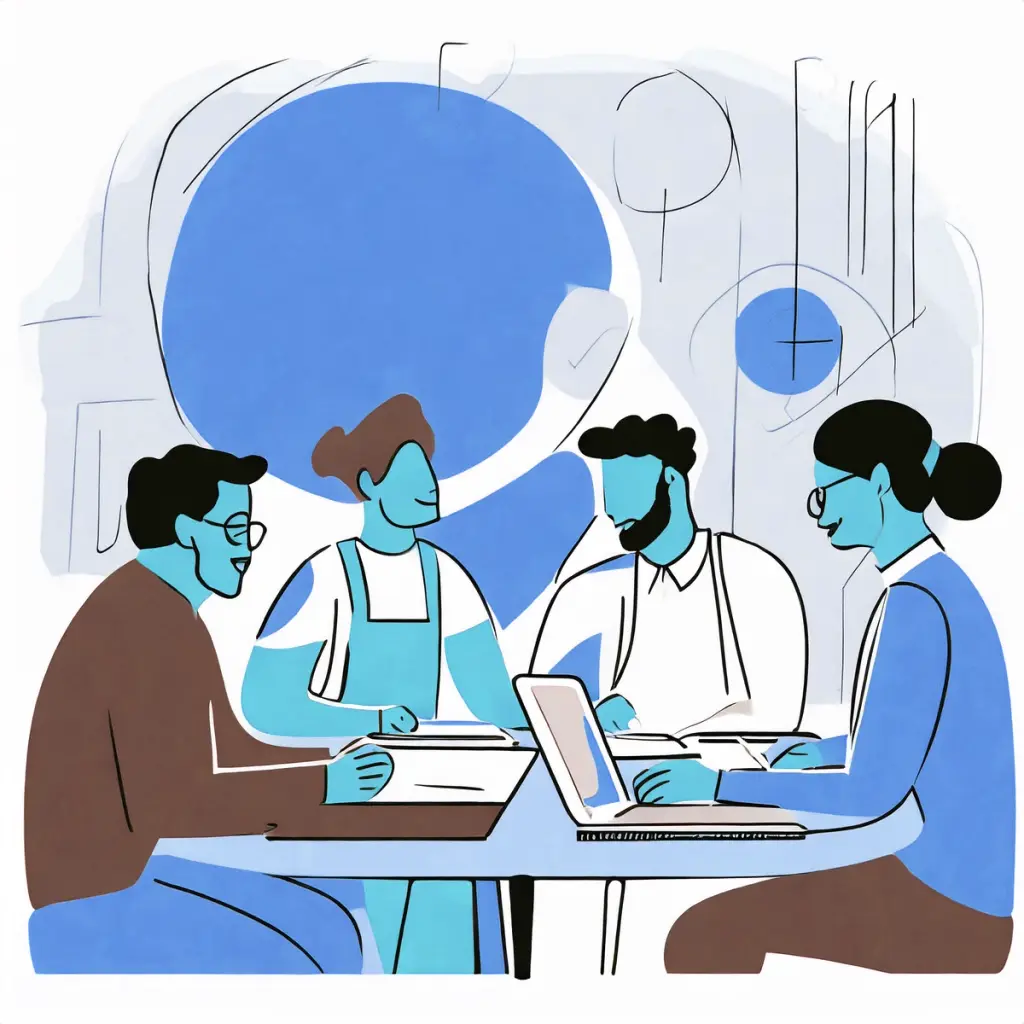
A productive team environment is the sum of many parts—relationships, trust, positivity, in-person interactions, and a constructive work ethic. Each element plays a critical role in forging a team that’s not just effective in the short term but has the resilience and adaptability to succeed in the long haul. As we continue to discover and integrate new ways of working, these foundational aspects of team dynamics remain as relevant as ever, guiding us towards building and maintaining productive environments that last.
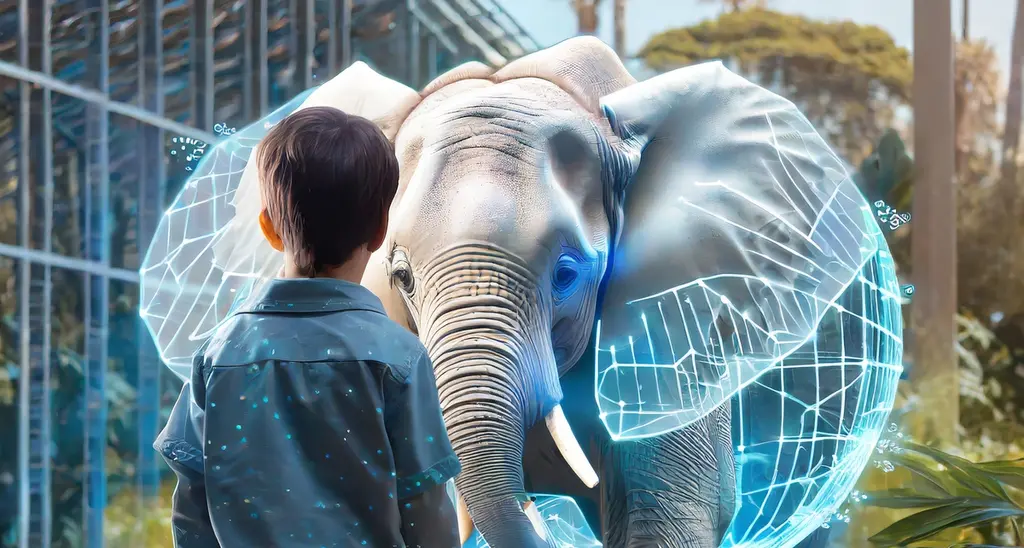

by Brendan Shelper
Credits ©
Photography – Marcus Zumbansen
The concept of holography has fascinated us for decades, ever since Princess Leia’s distressed holographic image implored Obi-Wan Kenobi for help in the classic Star Wars saga. Today, that once-fantastic technology is not just a figment of cinematic imagination; it’s a reality, and it’s evolving faster than ever before. From the mesmerizing displays at Australia’s Hologram Zoo to groundbreaking experiences inspired by hit TV shows like Stranger Things, we are witnessing the integration of holography into various facets of our lives.
For years, holograms were the stuff of science fiction, captivating audiences with their futuristic appeal. Fast forward to the present, and we find ourselves standing on the precipice of a holographic revolution. Phil Mercer’s article for BBC News paints a vivid picture of what’s possible today with a visit to Australia’s Hologram Zoo, where visitors can interact with 50 lifelike displays crafted meticulously from lasers. Here, technology previously unimaginable is used to project objects in the air, creating a tailor-made, immersive experience for each visitor.
The implications of such technological advancements extend far beyond entertainment. The automotive industry, for instance, is exploring ways to use holography to enhance driver safety and experience. Imagine a future where holographic displays replace traditional car dashboards, providing drivers with real-time, 3D information about their vehicle and surroundings.
Augmented reality (AR) glasses, too, stand to benefit immensely from holographic technology. Tech giants are investing heavily in developing AR glasses that could bring holographic displays right to our eyes, seamlessly integrating digital information with the physical world. Such advancements have the potential to revolutionize the way we work, communicate, and interact with our environment.
The potential of holography isn’t limited to practical applications; it’s also transforming the world of entertainment. Vicky Jessop’s article delves into the Stranger Things live experience, showcasing how 3D technology and hologram-like effects can be combined to create breathtakingly realistic worlds. Using an LED screen system and 3D eyewear, visitors are transported to the eerie, apocalyptic Upside-Down, proving that holography has the power to not just entertain, but to transport audiences to entirely new dimensions.
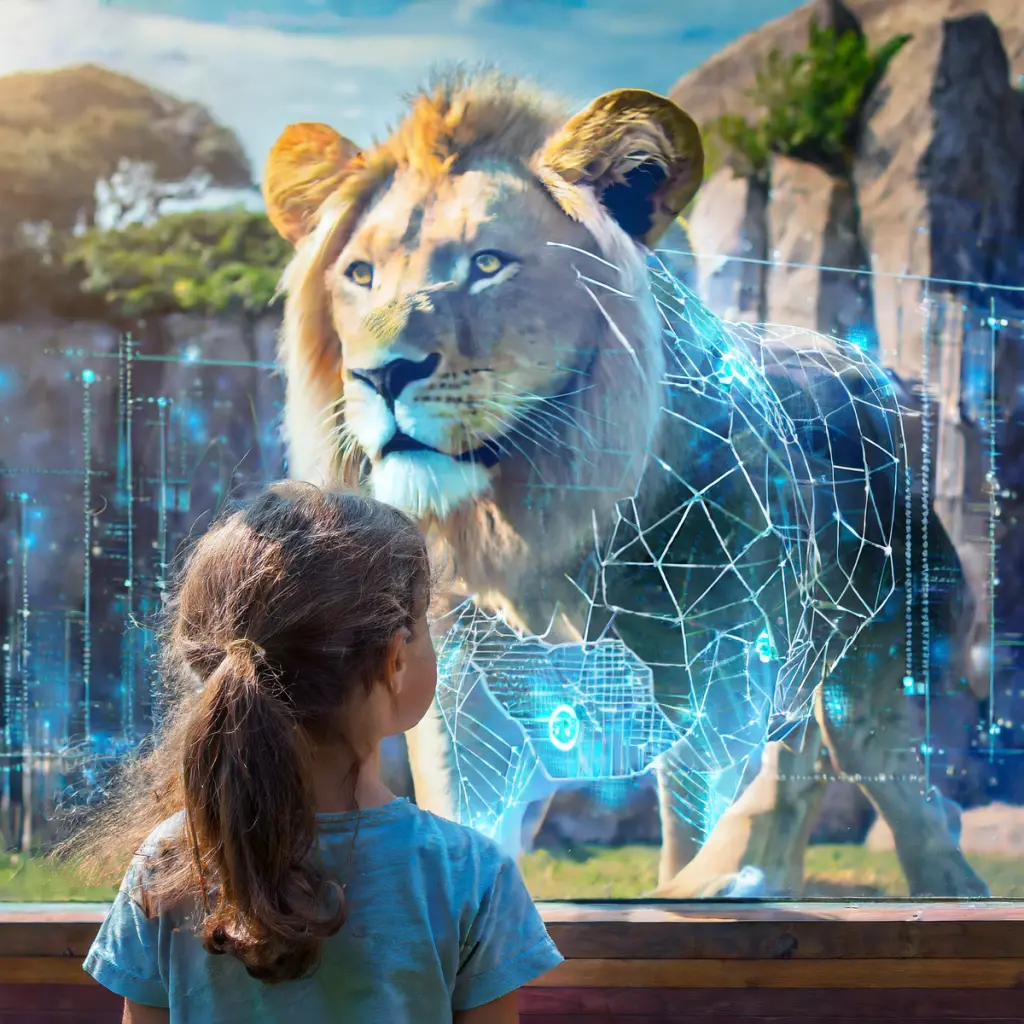
As we stand on the brink of this holographic era, it’s clear that the potential applications of this technology are vast and varied. From transforming the way we experience entertainment and interact with our surroundings to revolutionizing industries like medicine, communication, and transportation, holography is poised to become an integral part of our daily lives.
Bruce Dell, the mastermind behind the Hologram Zoo, believes that we are on the cusp of a “hologram revolution”. His vision, along with the work of countless other innovators around the globe, is making the dream of a holographic future more tangible with each passing day.
At BRS, we have been at the forefront of this holographic renaissance, working diligently with gauze and projection holograms for the past decade.
Our goal has been to blur the boundaries of reality for our audiences, seamlessly integrating them and our protagonists into the branded content and narratives we create. This journey has not just been about showcasing technology; it’s been about crafting unforgettable experiences that resonate on a personal level.
The journey of holography from the realms of science fiction to our everyday reality has been nothing short of extraordinary. With every advancement and every immersive experience, we are not just witnessing technology at play; we are experiencing the unfolding of a new age — a fully immersive, holographic age.
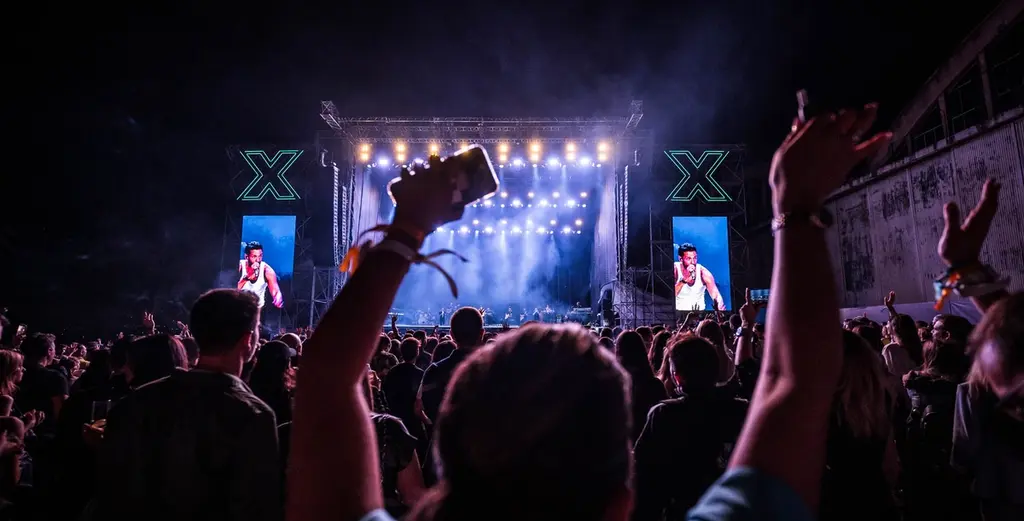

By Brendan Shelper
Credits ©
Photography – Marcus Zumbansen
Event planning is a multifaceted discipline, with each element demanding its unique focus. One such often-overlooked element is the check-in process, a pivotal touchpoint that can set the tone for the entire event experience. In a recent project, I deep dived into the nitty-gritty of optimizing this procedure, and the results were eye-opening.
Our challenge was to facilitate a seamless check-in for a large crowd arriving within an hour of each other. Here’s what we envisioned:
– 500 VIPs: Pre-registrated and fast tracked
– 3000 guests: We planned for 200 guests checking in at 30 booths per hour. This meant a rate of about 1.6 guests per booth per minute.
– Procedure: Showing QR code, ID, receiving wristbands and some event giveaways
Our ultimate objective? To streamline transport, queuing, and check-in, giving our guests the premium experience they deserve.

While this might sound straightforward, it’s astonishing how many times such details get lost in the larger scheme of things. A smooth check-in can be the difference between an excited guest and a frustrated one. Think about the last time you stood in a long, confusing queue – be it at an event or an airport. The pain of waiting, the uncertainty of the procedure, it all culminates in a less-than-stellar experience.
Having turned into somewhat of a ‘check-in aficionado’ during this project, I took charge to ensure that the experience was nothing short of stellar.
The Psychology of waiting is a fascinating topic that delves into how individuals perceive, react to, and handle waiting in various situations.Here are some key points I unearthed on this journey:
– Perceived vs. actual wait time: Often, the actual time spent waiting can feel longer based on certain factors. For example, unoccupied time feels longer than occupied time. That’s why some places provide magazines, television, or music to distract and entertain individuals during the wait.
– Fairness matters: People want the waiting process to be just. They become agitated if someone else who arrived after them is served before them.
– Unexplained waits feel longer: When people don’t know why they’re waiting or how long it might take, the uncertainty makes the wait feel longer.
– Start vs. end: Waits at the beginning of an experience are perceived as longer than waits at the end. For instance, people might tolerate longer waits after finishing a meal at a restaurant than before being seated.
– Memory of waiting: Our memories of waiting are not perfect recordings of the event. Two main moments define our memory of an experience: the peak (best or worst moment) and the end. If a long wait finishes on a positive note (like a friendly server or a discount), we might remember the experience more positively.
To my delight, our event’s queuing results were fantastic. With meticulous planning and an exceptionally briefed execution team, we witnessed negligible queues and a throng of pleased guests.
An essential part of our success was being on the ground when the setup was underway. It meant actively participating, tweaking, and even manually rearranging the queuing system at times. The hands-on approach was crucial to ensure everything went as per the detailed plan.
Often sidelined in such discussions, security personnel play a pivotal role in the guest experience. We ensured they were not just briefed but also empowered with a clear mission. Their role was not just about ‘security’ but about facilitating a positive guest experience. The result? The security team operated the system efficiently and interacted with guests warmly. When guests are happy, there’s reduced friction, making everyone’s job easier and more enjoyable.
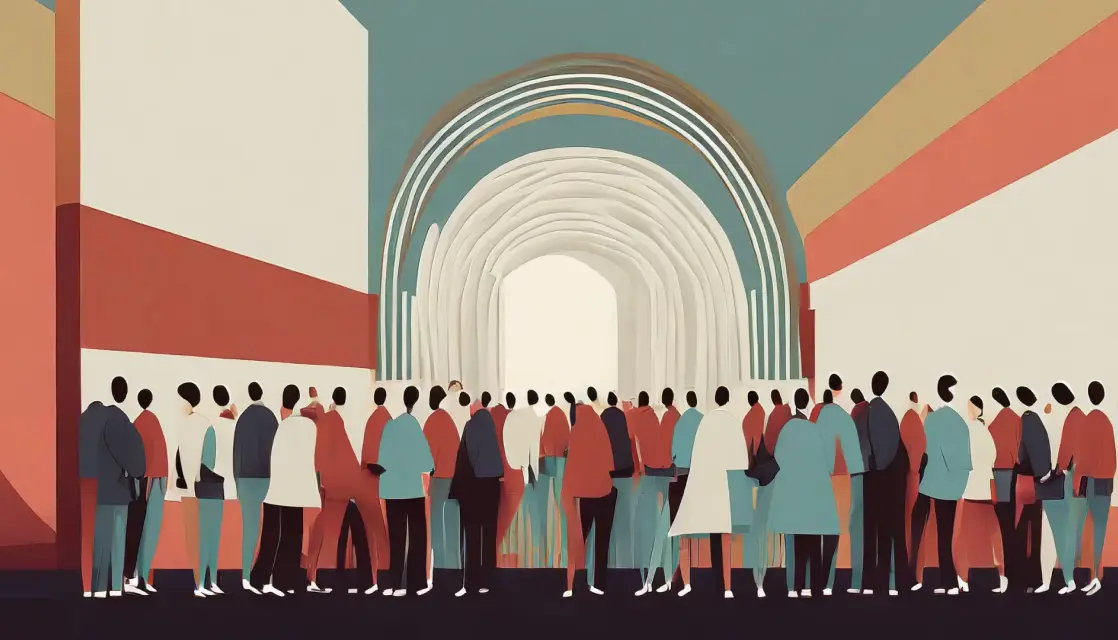
The next time you’re planning an event, I urge you to pay special attention to the check-in process and every touchpoint in the consumer’s journey. Resist the temptation of the “we’ve always done it like that” mindset. That’s often the first sign that a process is ripe for reinvention.
Consider some of the following points when designing your next check-in process:
– Anticipation effect: The end goal of waiting can affect our perception. If we’re waiting for something we’re excited about (like a concert or movie), we might be more tolerant of the wait compared to waiting for something neutral or negative.
– Setting expectations: When people have an estimate of how long they will wait, even if it’s a long time, they tend to be more patient. This is why many customer service phone lines inform you of your expected wait time.
– Progress matters: Seeing progress can reduce the stress of waiting. This is why some queues have markers, or software installations show progress bars.
– Lack of control increases anxiety: When individuals feel they have no control over the waiting situation, they’re more likely to feel anxious and frustrated.
– Cultural differences: If you’re working globally, like us, you need to consider attitudes toward waiting can vary across cultures. In some cultures, punctuality and efficiency are highly valued, while in others, time is seen as more fluid, and waiting is expected and accepted. And this helps calculate the peak time of arrival for your guests after an advertised start time. Very important!
by Brendan Shelper
Credits ©
Photography – Marcus Zumbansen
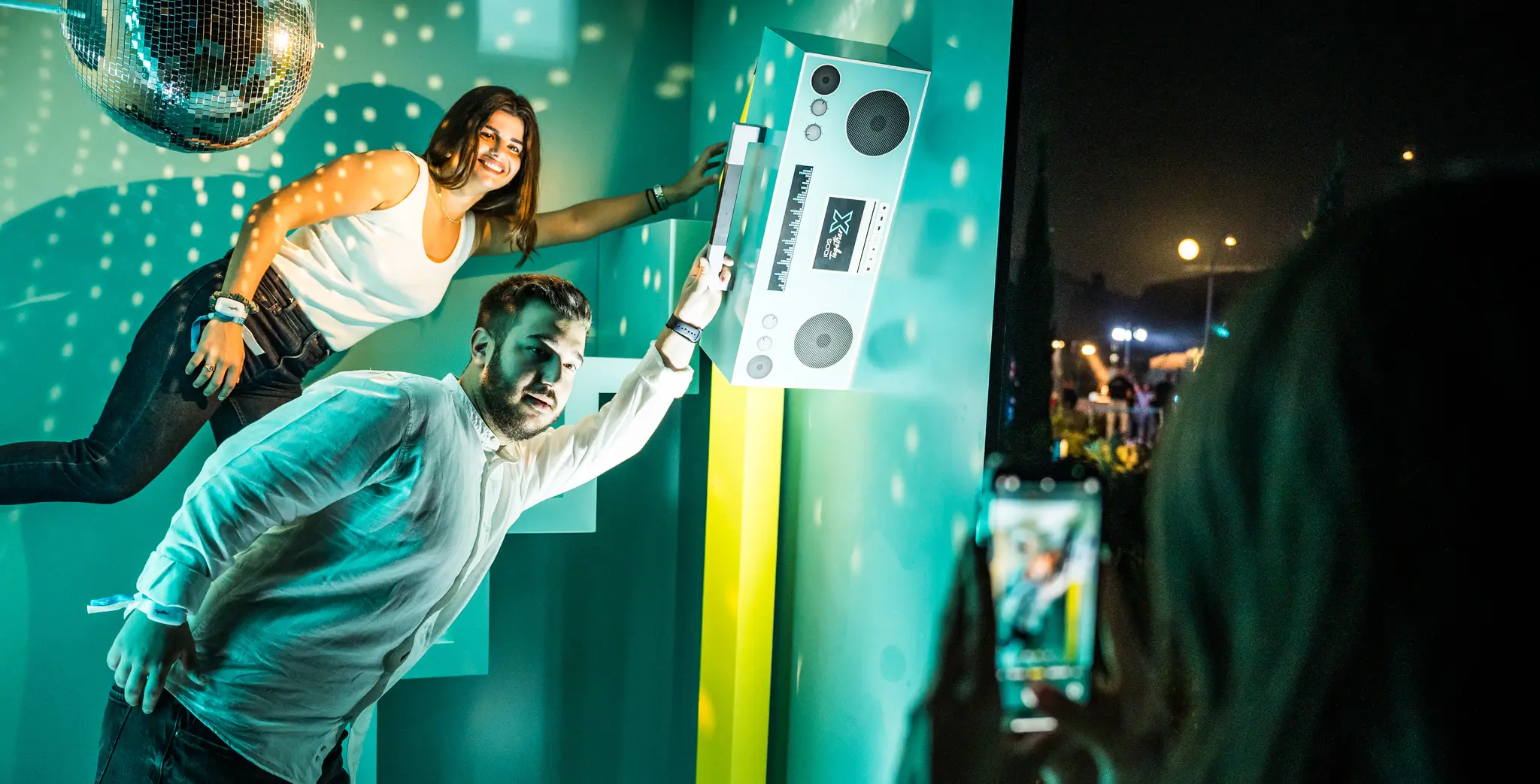

by Jonathan Buckels
Credits©
Photography – Marcus Zumbansen
When designing an immersive consumer event, there’s a fundamental principle we hold dear: ensure that every guest not only feels represented but also deeply respected by the brand they adore. It’s about going beyond the ordinary, making each guest an integral part of the experience rather than passive spectators. We believe that this approach fosters a genuine connection between the brand and its loyal supporters.
We understand that for marketers, capturing the attention of consumers requires a strategic balance. Simple, yet tinged with a hint of mystery, our approach is tailored to meet diverse consumer personas. Our belief in purposeful intrigue means we invite guests to be co-authors of their event experience, underscoring the brand’s value proposition in a subtle, yet powerful manner.
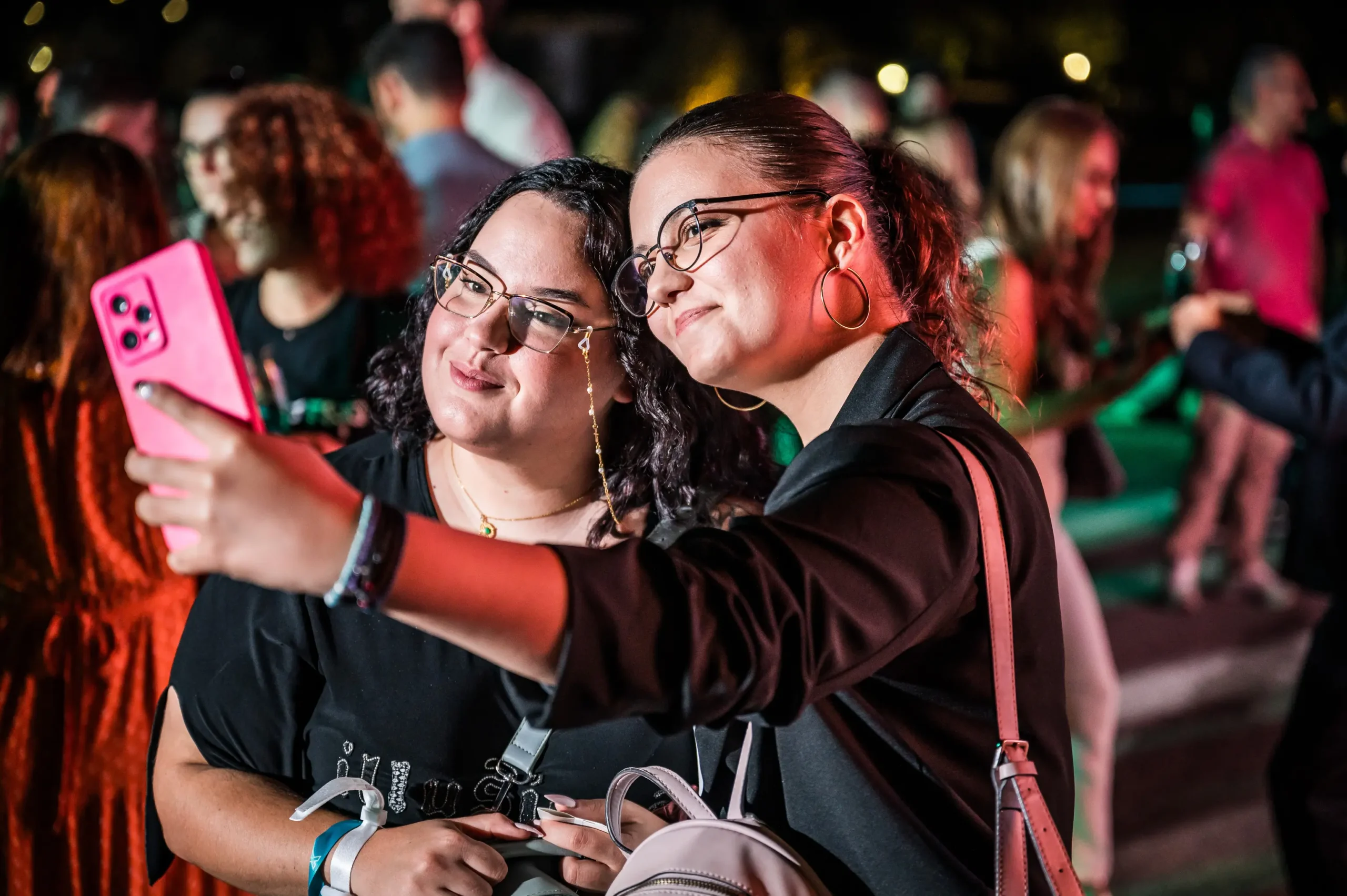
In our latest consumer event, we pulled out all the stops. With the help of our trained theatrical promoters, we encouraged nearly 4000 guests to dive into immersive installations, snap photos, and share their experiences live during the event. Nothing new, we know, but what happened next was proof-of-concept personified.
Via a purpose-built branded micro-site, optimised for easy uploads, we collected over 10,000 photos from our enthusiastic guests and our team of professional photographers within the first 2hrs of the event.
These photos were then lovingly curated, edited, and woven into a dynamic animation that placed the guests straight into the event’s beloved brand aesthetics.
From a backend solution that prioritized the brand’s aesthetics and compliance, to immersive installations that amplified the brand messaging—every element was crafted with purpose. Our tech-infused approach ensured real-time responsiveness, while our innovative onsite strategy like drone-led audience herding and well-rehearsed promoters bridged the physical and digital, ensuring the brand narrative was not just heard, but lived.
The true highlight of the evening came during the headline music acts when our guests saw themselves featured on the main stage’s LED screen. It was a moment of awe and wonder as they watched their snaped experiences from earlier in the evening being celebrated at this moment alongside the brand they love.
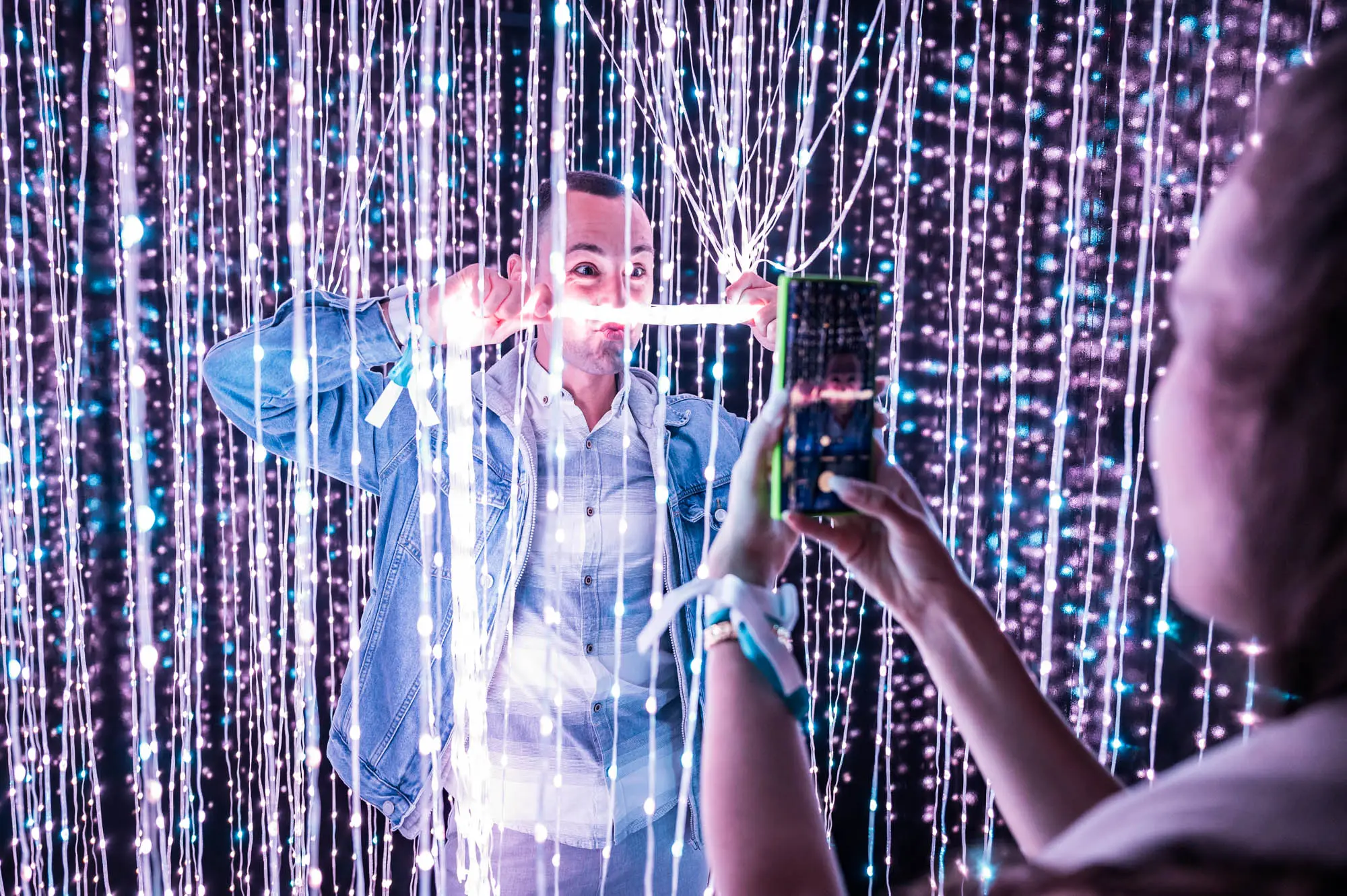
This magically connected the dots between the brand’s current global campaign and the real-life experiences of its dedicated consumers. It showed that the product isn’t just a distant concept but an integral part of their lives.
Plus, it created a treasure trove of user-generated content that the brand could use post event, making the bond between the brand and its audience even stronger.
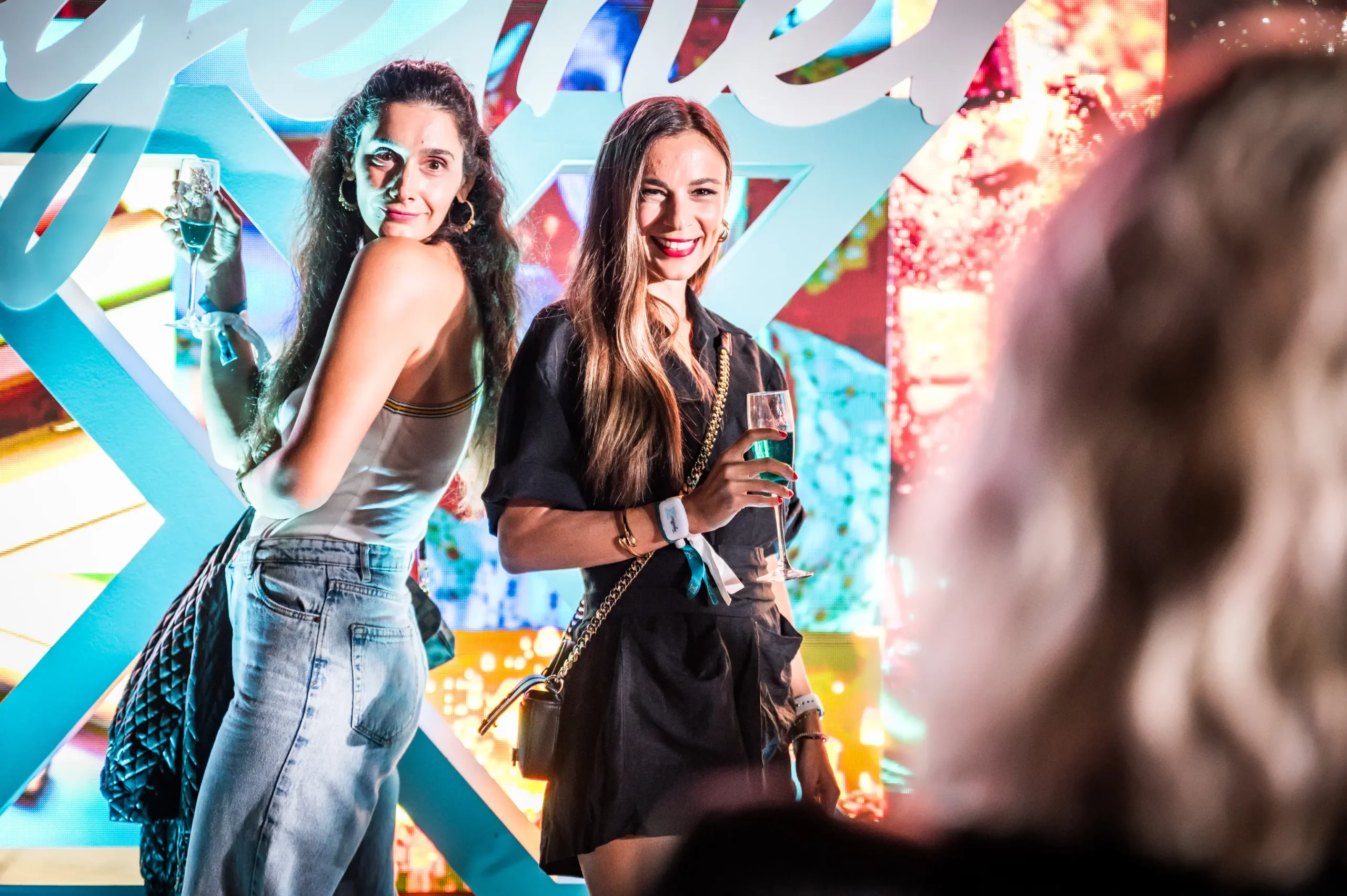
In essence, it’s not just about what we do but how we do it. Our commitment to meticulous planning, innovation, and the seamless integration of technology and creativity ensured that every guest didn’t merely attend the event but actively contributed to it, becoming part of its enchantment.
The event might have been a single night, but its reverberations are lasting. By immersing consumers in a brand experience they contribute to, you’re not just creating an event; you’re fostering a community. When they engage with your future campaigns, it’s with the knowledge that they’re not just consumers—they’re collaborators and passionate brand advocates.
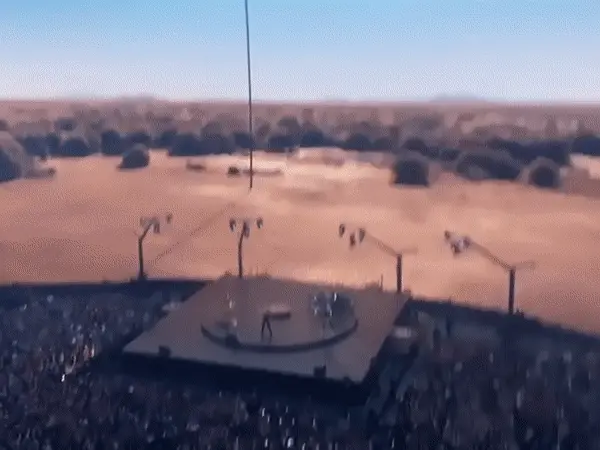

by Brendan Shelper
The Las Vegas skyline has a new jewel – the MSG Sphere. This mammoth LED spherical structure not only serves as a state-of-the-art concert venue but also as a high-profile advertising medium. But with its hefty price tag, is it a worthy investment for marketers?
We’ve seen a lot of chatter on the leaked costs of the daily advertising rates and whilst the costs are staggering, we thought it’s interesting to dive a bit deeper and look at other mediums and compare the related expenses.
For many, the price tag might induce a mild gasp, the Sphere’s advertising costs run at $450k per day or $650k per week. When considering traditional billboards in premium locations, which can range from $40k to 4M per month in cities like New York, the Sphere is substantially pricier. However, when compared to a 30-second Super Bowl commercial, which can cost upwards of $5 million (as of 2022), the Sphere offers seven days of exposure for a fraction of the cost. Let’s compare:
Traditional Billboards: In prime locations, these can cost between $1,500 to $30,000 per month, with millions potentially seeing the billboard, but without the precision of digital metrics.
Social Media Advertising: Major platforms like Facebook or Instagram can offer CPM (Cost Per Thousand Impressions) rates that vary between $5 to $15 for targeted ads. This means, at the higher end, you’re paying $15 for 1,000 impressions. (Source Business of Apps)
– Procedure: Showing QR code, ID, receiving wristbands and some event giveaways
Google Ads: The average CPM on Google’s Display Network is roughly $2.80.
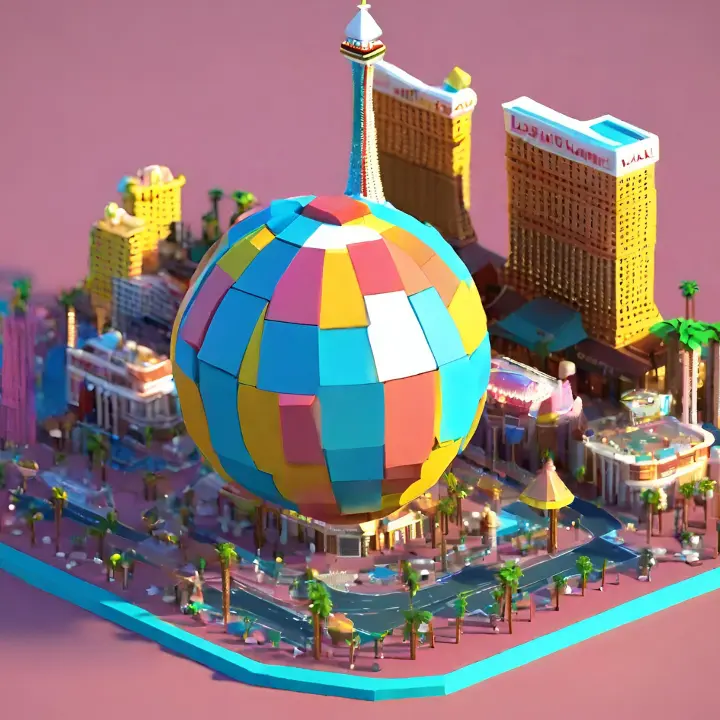
The Sphere claims 300,000 live views and a staggering 4 million online impressions for the investment. These numbers are significant. To put this in perspective, a popular TV show might draw 10 million viewers, but this is for a one-time, 30-second spot.
The Sphere offers continuous exposure, potentially multiplying its impression count, especially when considering the virality factor of such a unique advertising medium on social platforms.
The answer to this question depends on the marketer’s objectives. If brand visibility in a high-traffic, iconic location is a priority, and the budget allows, the Sphere could offer unmatched prominence. However, for those looking for more targeted, conversion-driven advertising, platforms like Google Ads or Facebook Ads, which offer detailed targeting and metrics, might be more cost-effective.
The MSG Sphere’s online CPM is significantly higher than these platforms. However, it offers something different: a blend of physical and digital presence, massive scale, and a unique viewer experience.
Not to mention The ‘Cool Factor’. Associating with a venue that’s at the pinnacle of modern entertainment? Priceless for brands seeking the ultimate buzz.
Brands must decide if the unique amalgamation of digital and physical advertisement, coupled with the iconic backdrop of Las Vegas, adds value beyond the raw metrics. For luxury brands or those launching a high-profile product, the Sphere offers unparalleled grandeur and spectacle.
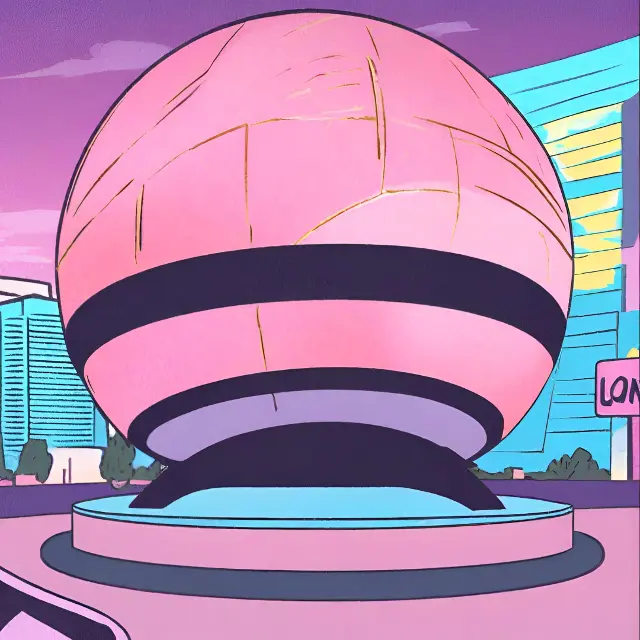
Marketers considering the Sphere could:
1. Leverage its Uniqueness: Creating content tailored to the Sphere’s unique structure can make ads more engaging and shareable, increasing the chance of virality. As time goes on, campaigns will need to be more and more inventive with the use of the spherical surface.
2. Combine with Digital Campaigns: Use the Sphere as part of a larger campaign, directing viewers to online platforms for more interaction.
3. Push interactivity: Our staple for everything ‘consumer engagement’, drive shareability with UGC and give the audience part-control of the campaign.
4. Utilize the in-house Creative Team: The Sphere’s offer to use their creative team is an added advantage, ensuring the content is optimized for the structure and not repetitive. Push this valuable resource to create something truly bespoke for your brand.
The MSG Sphere is undoubtedly a game-changer in the world of advertising. Its visibility and grandeur make it a tempting option for big brands looking to make a splash. While its cost is high, its potential reach, both live and online, can justify the investment for those looking to maximize brand visibility on a grand scale. As with all advertising mediums, strategy is key, and the Sphere is no exception.
The MSG Sphere is undoubtedly a game-changer in the world of advertising. Its visibility and grandeur make it a tempting option for big brands looking to make a splash. While its cost is high, its potential reach, both live and online, can justify the investment for those looking to maximize brand visibility on a grand scale. As with all advertising mediums, strategy is key, and the Sphere is no exception.
1. Death Star from Star Wars
2. Wilson from Tom Hanks Castaway
3. Indiana Jones Boulder Chase
4. 3D Pac-Man
5. Miley Cyrus’ Wrecking Ball
6. BB-8 from Star Wars
7. EPCOT Center Ball
8. The bowling ball Elon Musk used to smash the window of the Cyber Truck
9. The Magic 8-Ball
10. Fishbowl featuring Finding Nemo
Some of our favourite posts on the topic this week:
https://www.reviewjournal.com/entertainment/arts-culture/how-one-comedian-went-viral-with-a-las-vegas-sphere-filter-2875425/
https://www.instagram.com/p/CyEeNpwvcaB/
https://7thsense.one/story/sphere-and-7thsense-partner-power-content-spheres-interior-and-exterior-led-displays
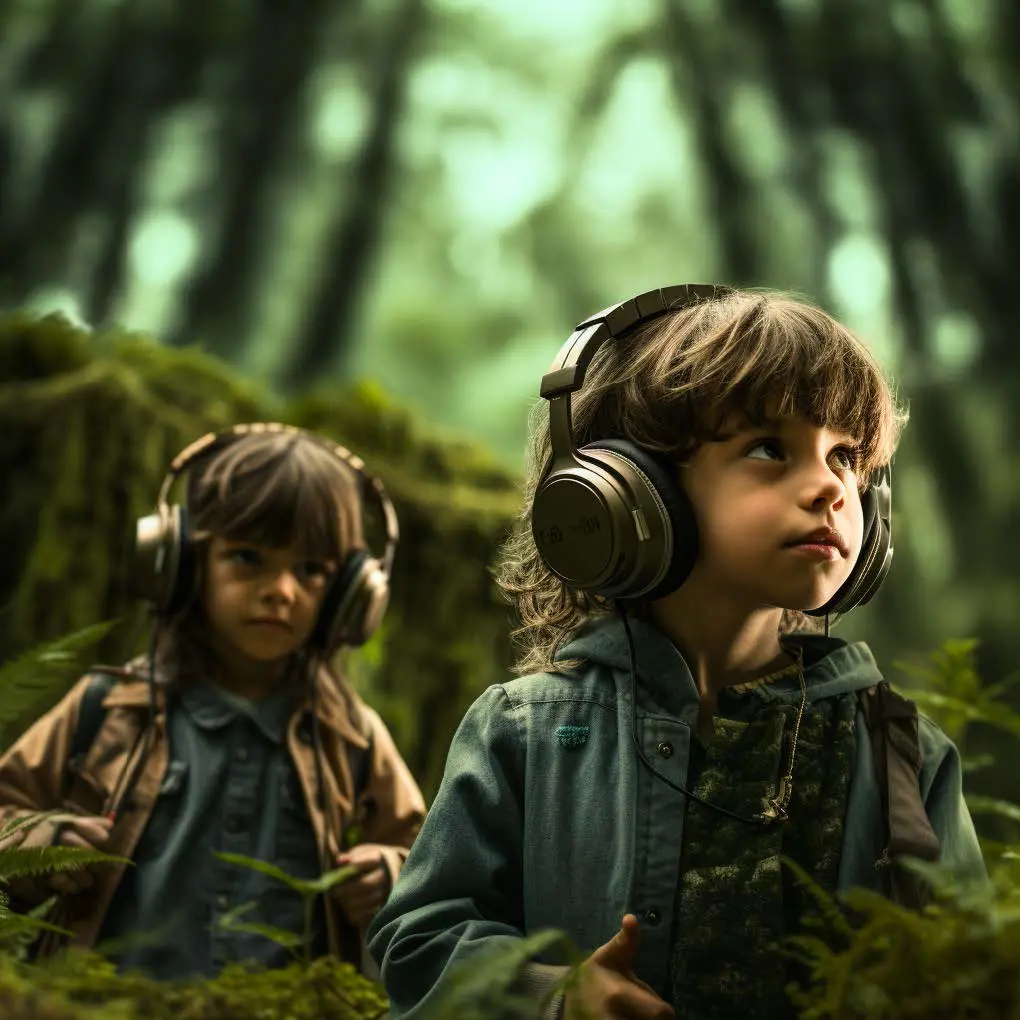

by Karla Menzel
Creative Producer Communications
The integration of environmental education with technological advancements is manifesting in unique ways. At the forefront are interactive experience installations, which merge the domains of science, nature, and art. By tapping into immersive digital landscapes, these setups craft experiences that immerse individuals in meticulously constructed natural worlds, challenging traditional methods of learning and interaction.
The power of sound as an immersive tool cannot be underestimated. The use of 3D audio systems in educational setups offers participants a chance to engage with nature in a deeply sonic manner. With every chirp and rustle amplified, the auditory landscape provides a holistic understanding of ecosystems and their intricate networks.
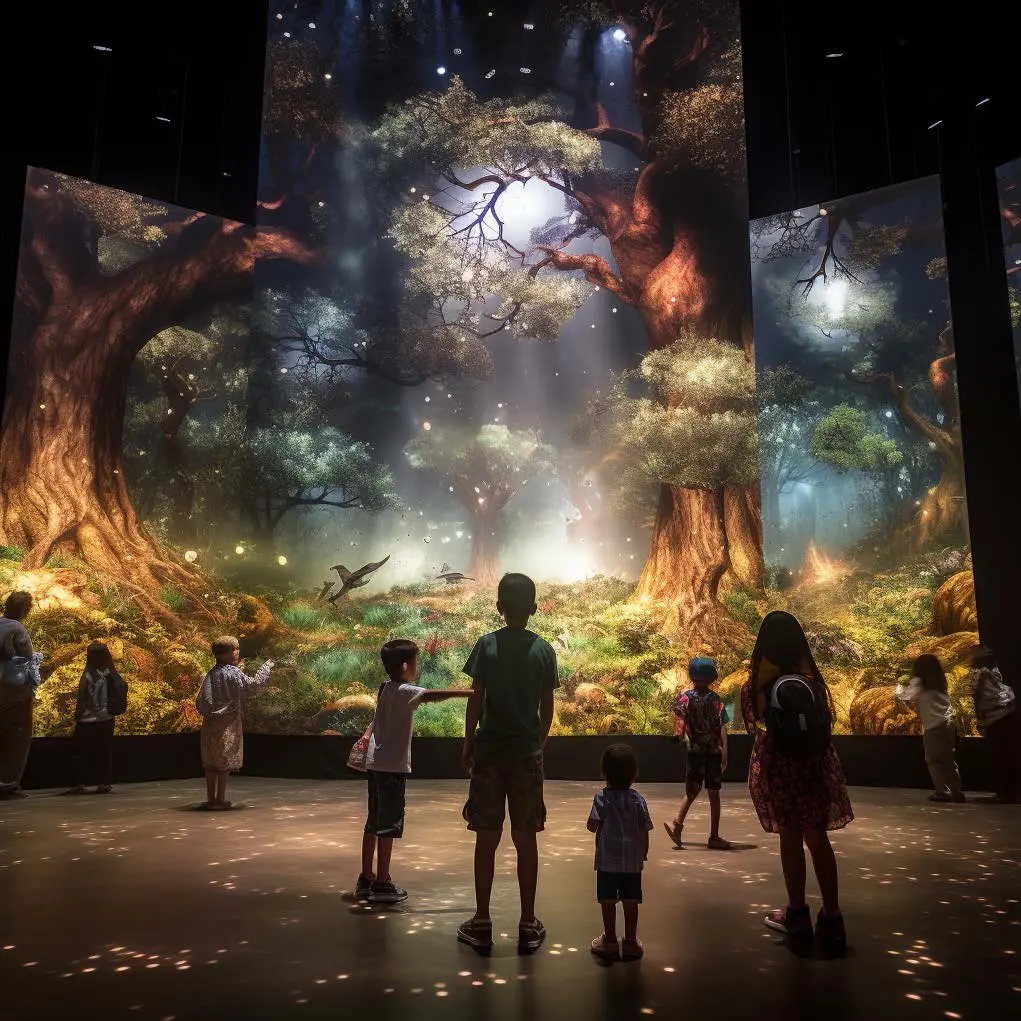
Virtual Reality (VR), often associated with gaming and entertainment, finds a transformative role in environmental education. Platforms, such as our Buddy Link app, reimagine the possibilities of remote collaborations.
Instead of solitary explorations, VR now fosters collective experiences where participants, even from distant geographies, can collaboratively interact with nature-themed challenges and scenarios directly on their phone of mobile device.
The concept of passive flora is being revisited. Installations are now being designed where plants and trees become part of the interactive experience, responding to human presence. This not only presents plants as sentient beings but also emphasizes the deep symbiotic relationship between humans and nature, blurring the lines between observer and participant.
Experiential ‘edutainment’ and marketing is evolving to engage more than just the visual senses. With installations featuring colour-changing flowers or scented sculptures, attendees are enveloped in multi-sensory experiences. These installations, reminiscent of nature’s vast sensory offerings, create a bridge between urban attendees and the wonders of the natural realm, appealing to all ages and demographics.
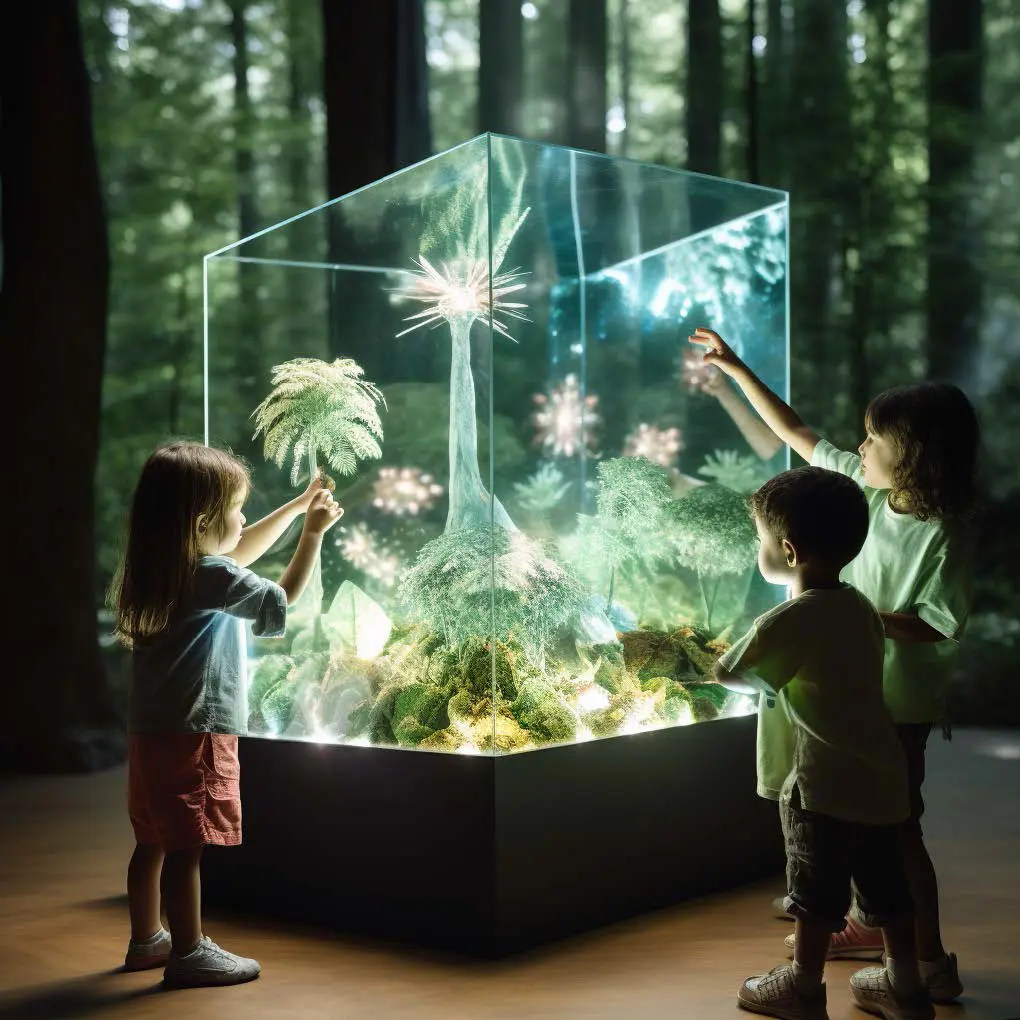
At Battle Royal Studios, we operate at this exciting intersection of technology and art providing environmental consciousness. Our endeavours in experiential marketing are redefining the paradigms of environmental education, transforming passive learners into active participants in the ever-evolving narrative of our planet.
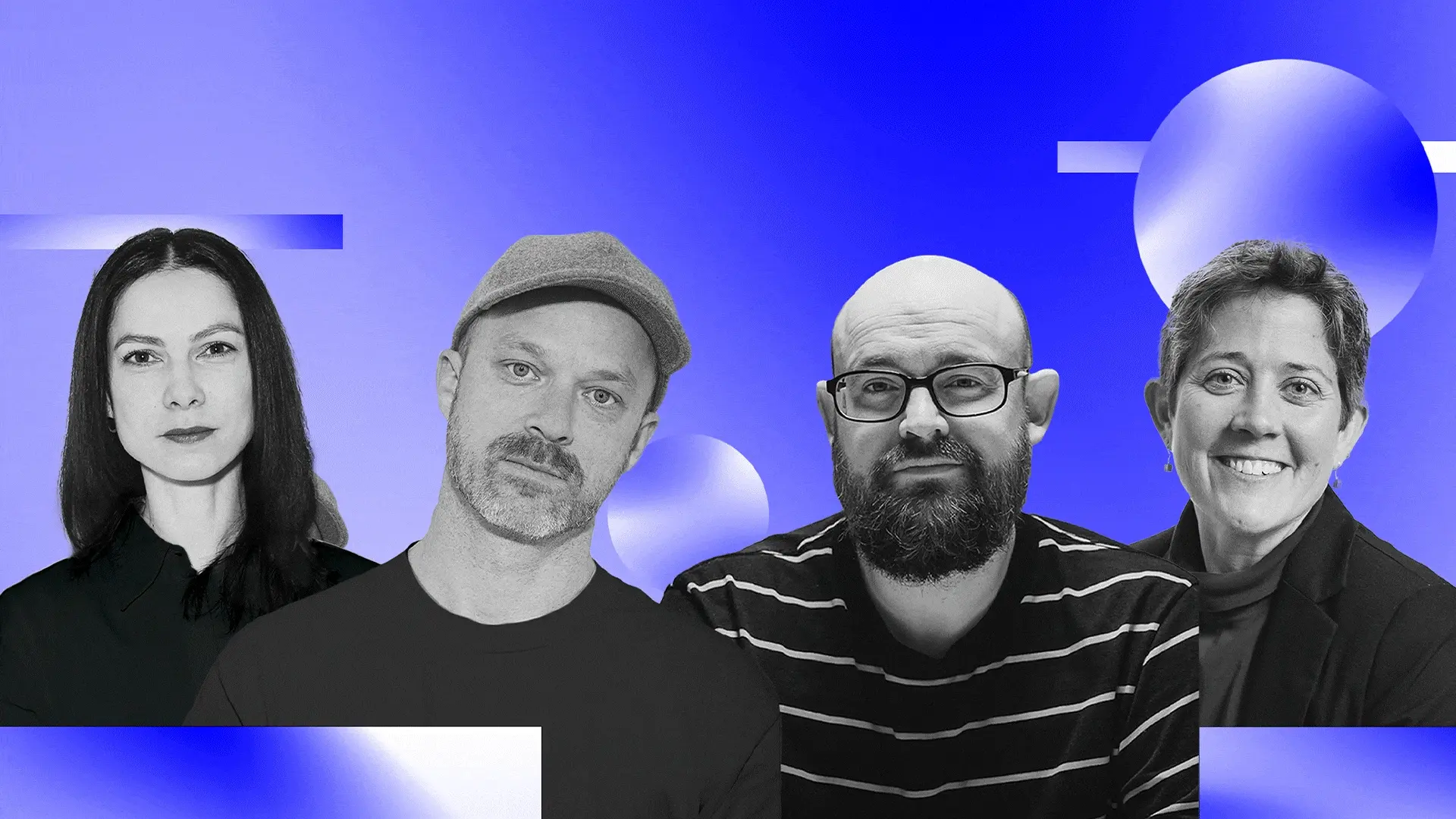

By Thao Tran
Credits©
Artwork – Sofia Silva
If you’re a creative talent, chances are you’ve been told that your passion for the arts is just a hobby and that you should pursue a more “stable” career path. But what if we told you that creativity is the key to innovation and new ideas? What if we told you that there’s a group of talented artists who have turned their passion into successful careers?
Enter Battle Royal Studios (BRS), a creative powerhouse that’s passionate about all forms of experiential innovation. Their team members come from theatre, concerts, ground-breaking events, and exceptional Olympic ceremonies. They’re dedicated to crafting bespoke concepts tailored to their audience’s needs and desires, using an unparalleled understanding to tell engaging stories.
But what does it take to become a successful artist in the modern world? What are the challenges that creative talents must overcome, and how do they navigate systemic and social structures to achieve their goals?
Let’s meet some of the talented artists behind BRS.
Brendan Shelper, the founder and CEO of BRS, started his creative journey at the age of ten when he studied acrobatics and theatre. He toured the world as a child performer, working on major stages and living life on the road. After falling into modern dance and dance theatre, he worked in major international festivals within the creative arts circuits and cultural programs. Eventually, he started to realize his own ideas and work with other huge companies around the world, which led him to event design and experiences. This led to the birth of BRS.
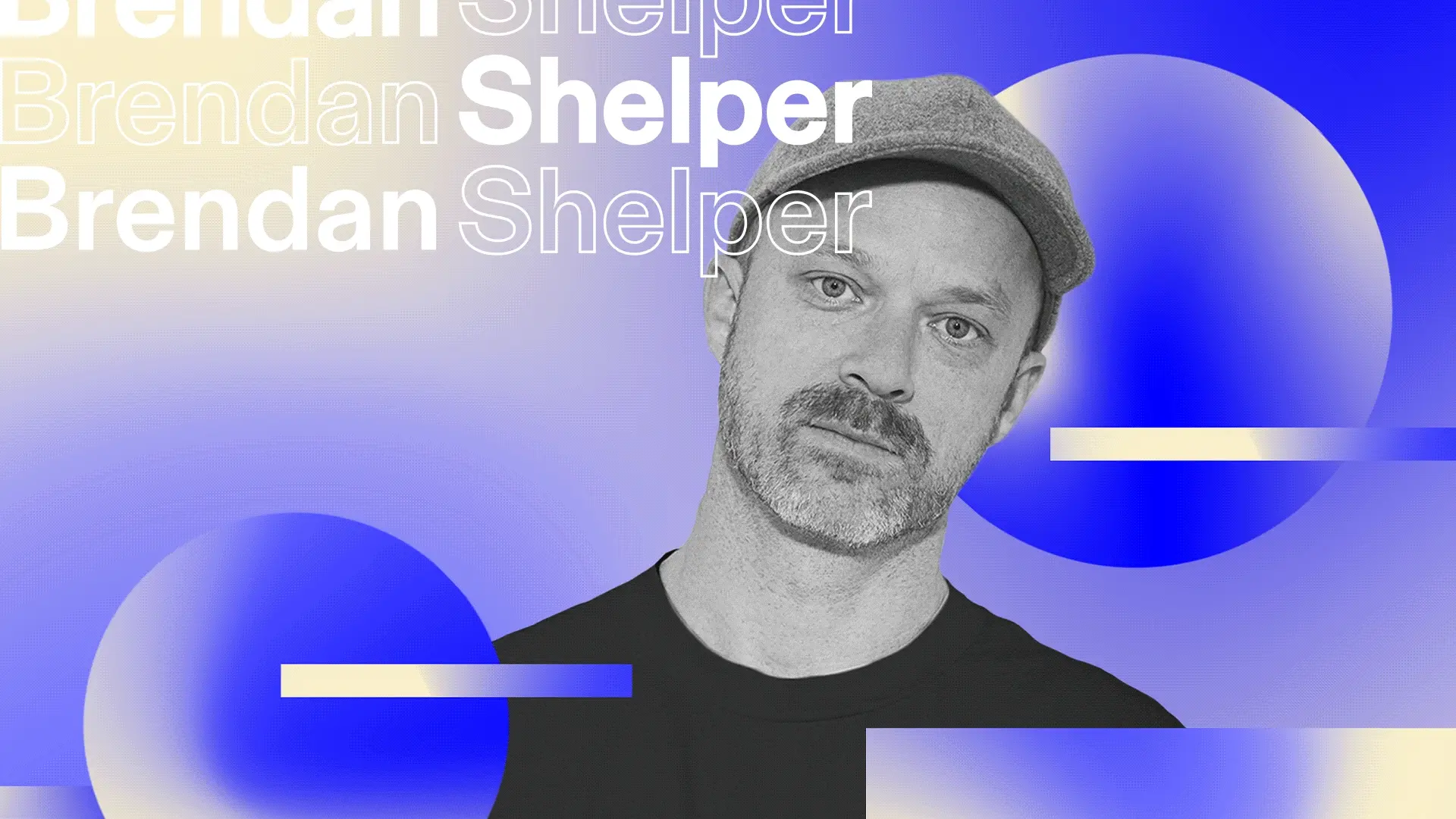
Jon Buckels, the Creative Production Manager, had a chance encounter with Perth City Ballet when he was just fifteen years old. He worked with them over the years, performing in and even choreographing one of their full-length seasons. After working in various contemporary performance groups in Germany, his focus shifted to storytelling through his own choreographies and productions, mainly focusing on human connection and experiences.
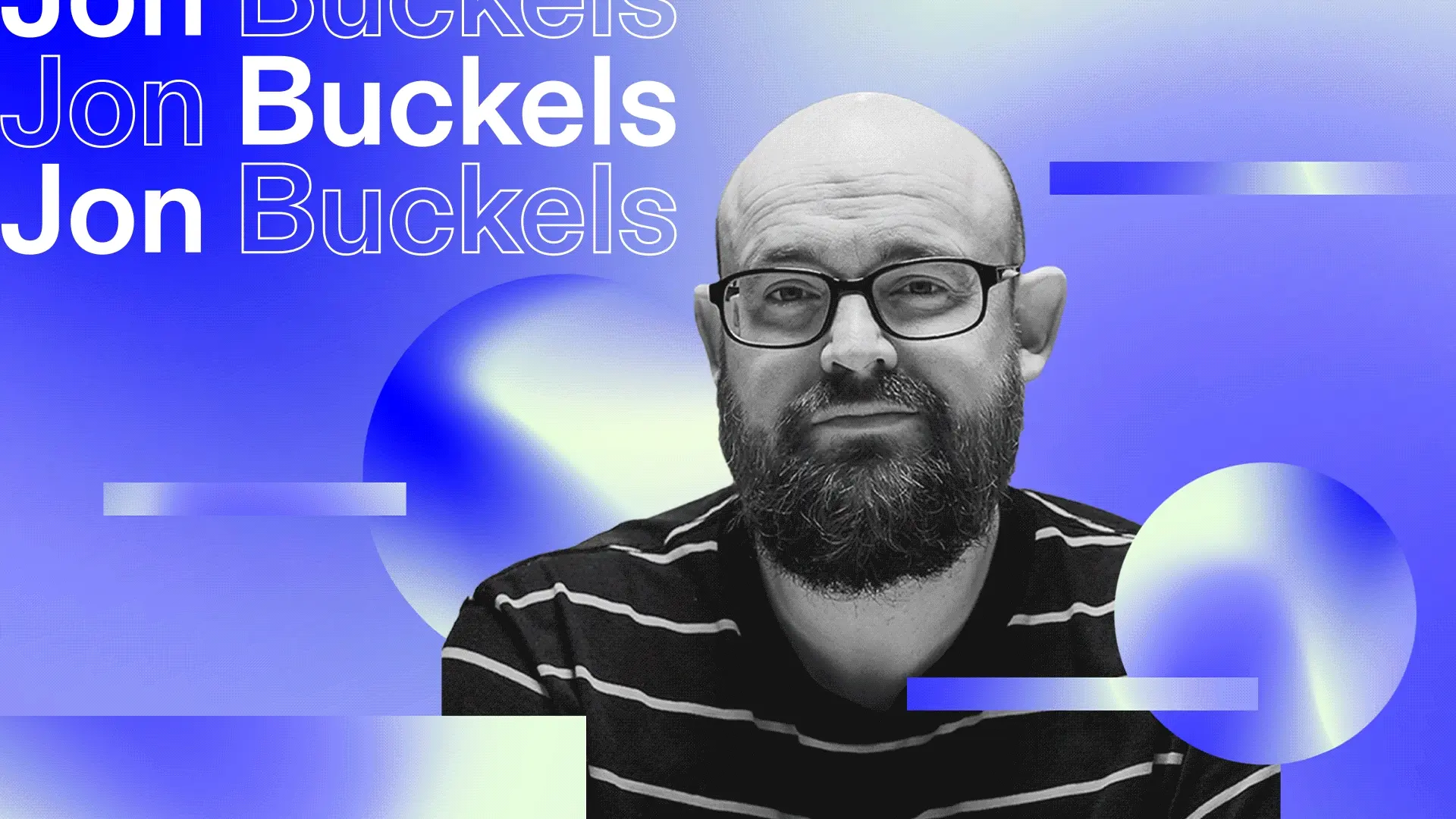
Ky Lloyd, the Production Manager, fell in love with backstage life at the age of sixteen while working in her high school stage crew team. She takes pride in working with the most capable people in her field and enjoys learning from them every day. Previously, she worked for Stage Entertainment as a caller for shows like Les Miserablés and Die Drei Musketiere.
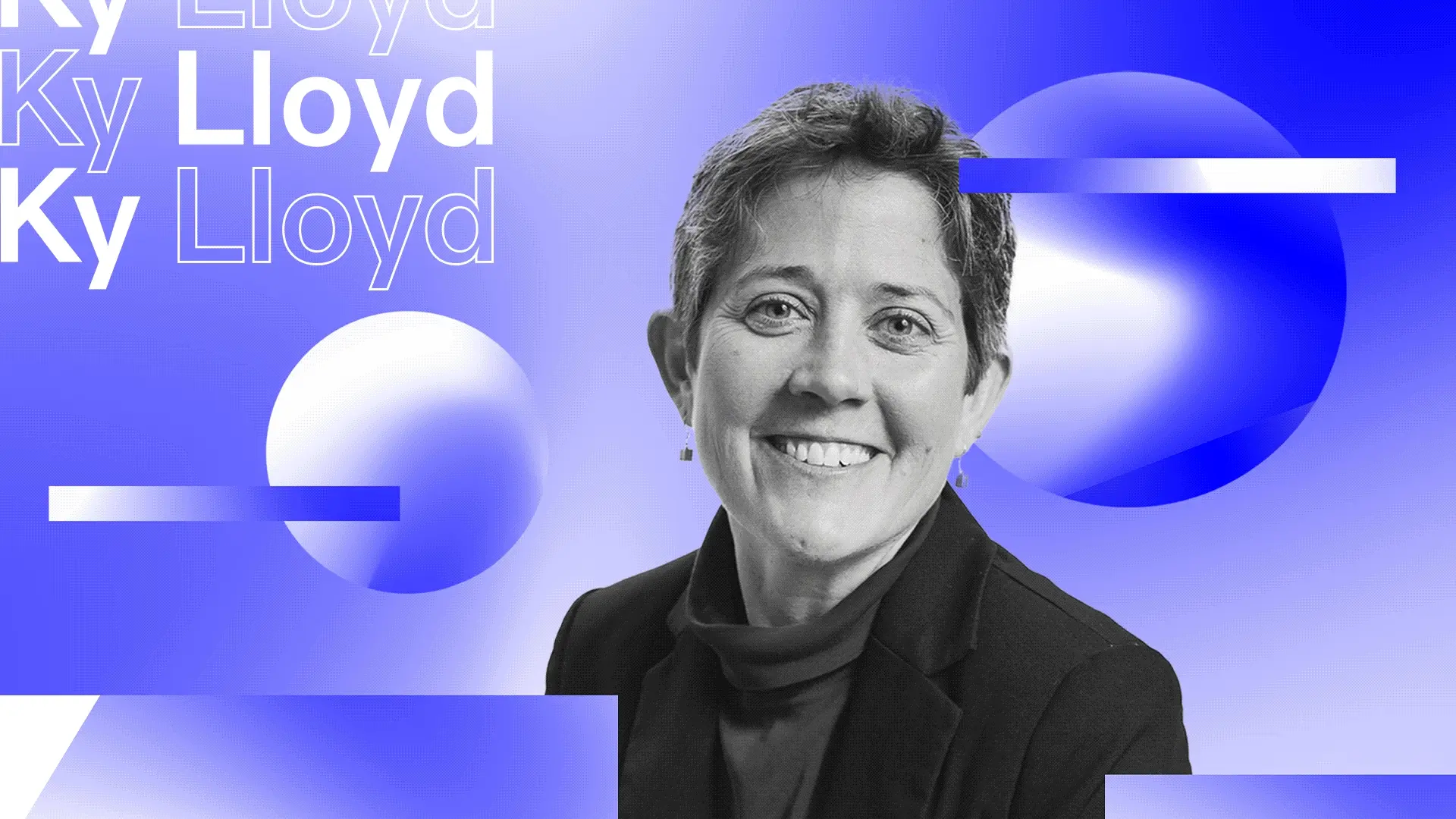
Susana Beiro-Shelper studied dance at the Univerity of Arts in Amsterdam before establishing herself in Berlin after several stops along the way. In 2008, she began working with Brendan Shelper, a collaboration that continues to this day. After joining Battle Royal Studios, Susana Beiro Shelper took on the role of managing the label SLIKK for several years. In addition to her work in artistic coordination, she regularly collaborates with pyro legends Groupe F as an aerial performer.
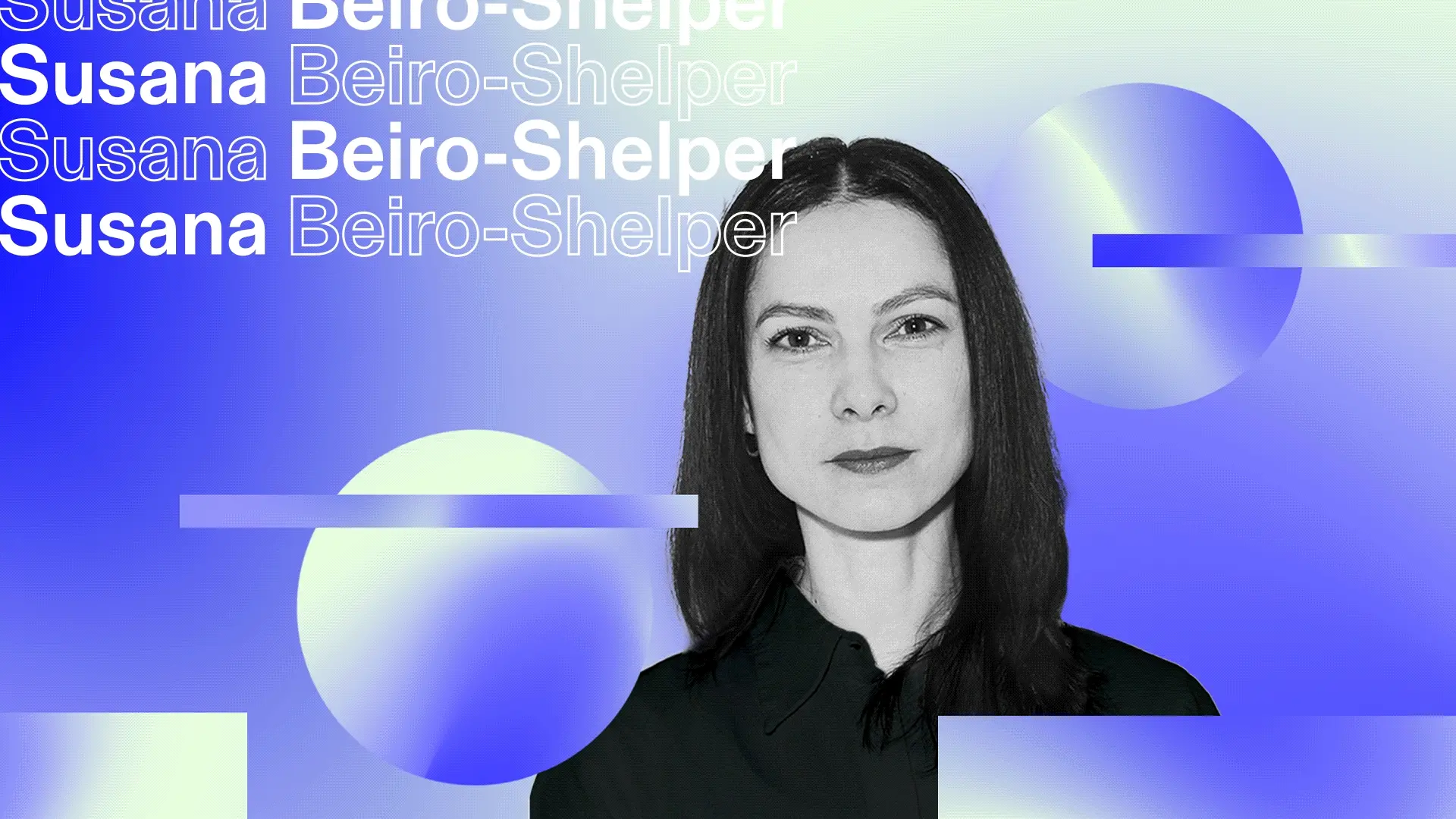
These are just a few of the talented artists behind BRS, each with a unique story to tell. Through their individual profiles and storytelling, BRS aims to inspire and empower creatives to pursue their passion, despite the challenges they may face.
So, if you’re a creative talent looking for inspiration, look no further than the artists at BRS. They’ve proven that with hard work, dedication, and a little creativity, you can turn your passion into a successful career.
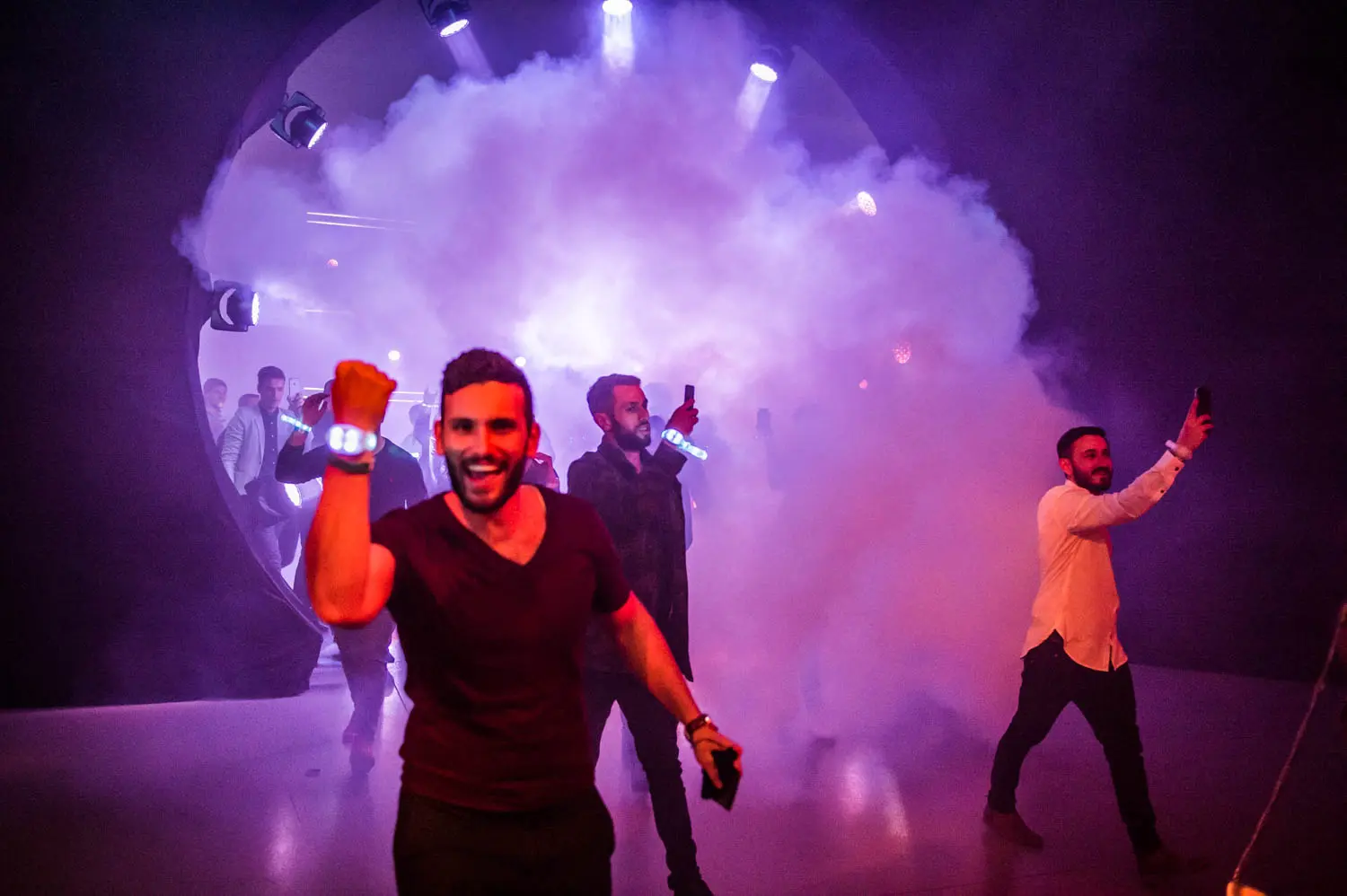

Companies spend endless amounts of time finding the right logo, building a corporate identity, and feeding social media with content on a daily basis. But what few companies have mastered is taking their customers on a journey that merges them with their brand identity or brand experience.
The marketing of our time no longer takes place two-dimensionally, linear from company to customer but lives from an exchange, a complex ecosystem and mutual enthusiasm.
Have you ever been to a show, event or concert that you still think back on years later, and all the emotions you felt in that moment come flooding back to you? Something happened in that moment that embedded itself deeply in your emotions; something that touched you profoundly.
We all know such experiences. But do you also remember a moment when you associated these feelings with a brand?
In recent years, many companies have followed the trend of branding events with their name, and to be associated with the corresponding emotions. For example, there is the Mercedes Benz Fashion Week, the Super-Bock-Festival or even entire sports arenas like the Allianz-Arena.
But linking emotions can go much further. The latest technologies can be used to build entire brand worlds that allow a journey to be explored within a strategically designed experience. We call this multidimensional possibility of immersing oneself in a brand world and experiencing real emotions – ‘experience marketing’.
Experience marketing can take place in both the physical and digital space. But how can you build the perfect experience for your customers? We’ve built this short guide to give you an idea.
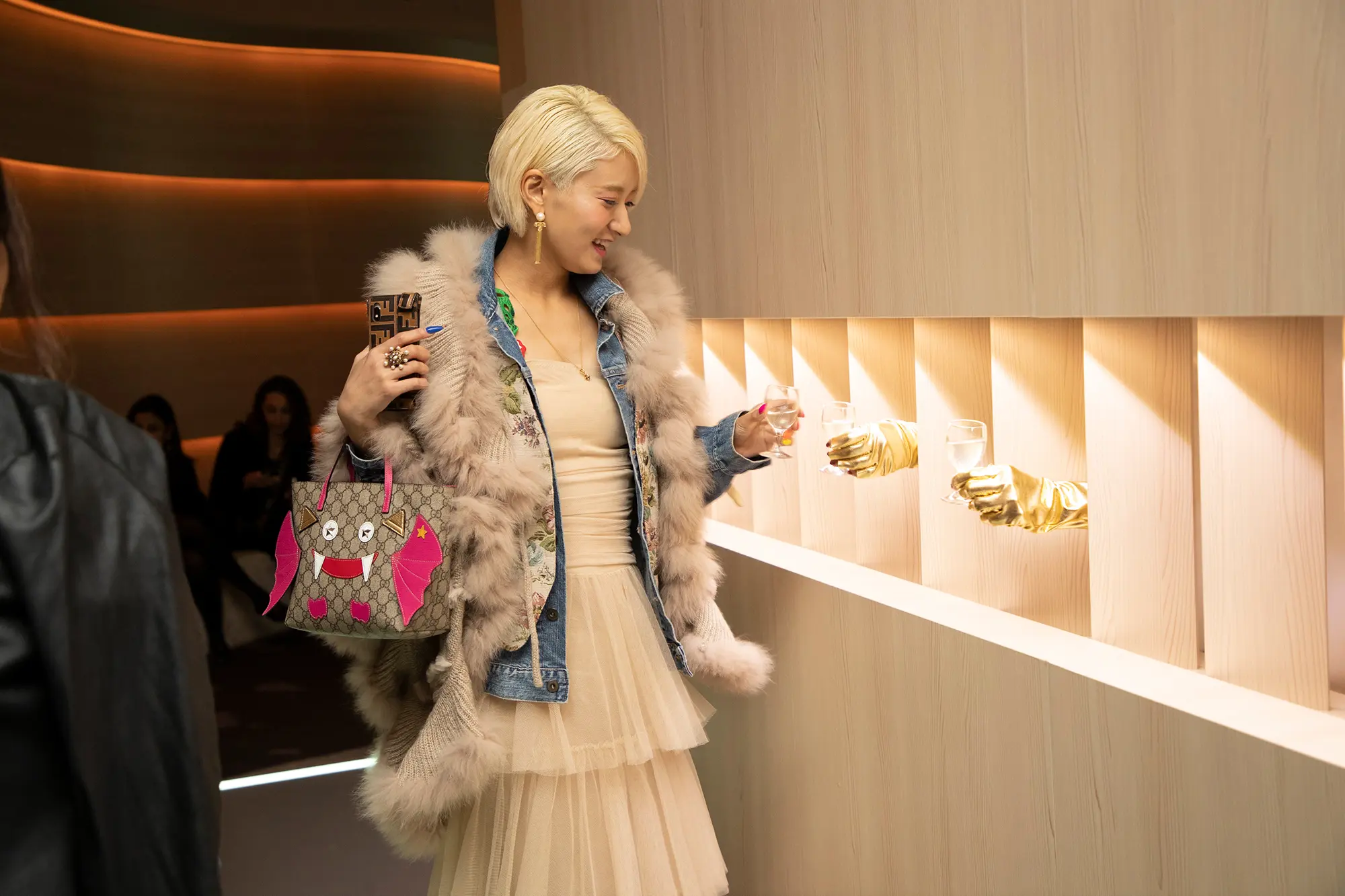
Experience marketing should inspire and be remembered long term. That’s why it’s especially important for us at Battle Royal Studios that at least 3 out of 5 senses are stimulated. Taste, touch, sight, sound and/or smell. A particularly good campaign encourages people to discover their own journey via participation and to immerse themselves deeply in the world they have created.
The marketing of our time no longer takes place two-dimensionally, linear from company to customer but lives from an exchange, a complex ecosystem and mutual enthusiasm.
Planning a great experience marketing campaign can present a whole new set of challenges. Here’s a small checklist that can help you to think of the most important points.
1. Why are you hosting this activation?
Quite simply, why do you want or need to have the experience? And, what is the desired result? This information is critical for sculpting the scale and direction of your entire production.
2. Know your audience
Who is the event catering for? Is there a strict target group or consumer that needs to be considered? What key interests do they have, and what are their tastes and expectations? Knowing all there is about your guests will help you provide them with an unforgettable experience. With this highly relevant info you can begin basic planning such as A. What you will do and B. Where you will do it? This will ensure you are doing everything you can to reach the right audience with your activation.
3. Create a milestone timeline At any level of event execution, planning is essential. Knowing what needs to be done by who and by when will help you make the right decisions. Starting with a top-level milestone plan working backwards from the event date is one of the easiest ways to start.
4. Set a budget
What is your focus? Is it more important for you to book the most extravagant venue or engage the astounding entertainment acts? Every event is unique. Therefore, it is especially important to set a target budget with a maximum spend in mind.
5. Develop a strategic partnership
What’s the best way to take all the insights you’ve gained about your audience and turn them into a unique creative concept? What does this look and feel like? Is it adaptable or scalable, what additional considerations can be made to give your guests a memorable experience? This is the perfect time to engage some help and where we normally step in. At Battle Royal Studios, we help mitigate all the research and accumulated information and spin an intriguing but relevant concept out of it all.
Storytelling
What are the points you absolutely want your audience to take away and how can you tell them in a way that they can be absorbed and enjoyed seamlessly?
Personalize
A singer calls you up on stage? Your own image is being projected to a surface via video mapping? The more personal something feels, the longer it stays in our minds. That said, it doesn’t always have to be the whole experience. Often small intimate moments are enough to convey the feeling. Think about what might excite your target audience and consider how you can creatively translate that to design a personalized experience.
Empower
Provide as many opportunities to participate as you can and encourage your audience to engage in different ways.
For us the concept includes the story or key communication of the event, it shows how the audience will be engaged, we demonstrate the potential for media and press, and what the related costs might be for the final experience. Once we’re done, you’ll have everything in one place with visual examples and room designs included.
6. Plan the execution
Who or what do you need to make your experience work? Do you have all the resources you may need? Don’t forget to regularly monitor and readjust the budget. We often use our resources to find relevant partners and suppliers to execute the ambitious or unique ideas we’ve come up with.
7. Marketing
Whether it’s a personal invitation or an ad, you need to make the people you want to come to your event know about it. We suggest creating an appropriate marketing plan during the concept phase and beginning to promote the event early.
7. Marketing
Whether it’s a personal invitation or an ad, you need to make the people you want to come to your event know about it. We suggest creating an appropriate marketing plan during the concept phase and beginning to promote the event early.
At Battle Royal Studios we develop novel and unexpected ideas and put them into practice through to their production. In addition to the latest technology, we rely on an inspired and highly skilled team. We are hungry for new experiences and ready to go. The most respected brands in the industry have trusted us with their most important events. Your next significant moment could be truly unforgettable. Making a mark has never been easier.
